This document is a biography of Hadhrat Mirza Bashiruddin Mahmud Ahmad, the second successor of the Promised Messiah, highlighting his significant impact on the Ahmadiyya movement and his leadership spanning over 50 years. It details his early life, education, contributions to the movement, and various challenges faced, including the political landscape during his leadership. The book aims to inspire readers, particularly the youth, to appreciate his legacy and contribute positively to their communities.
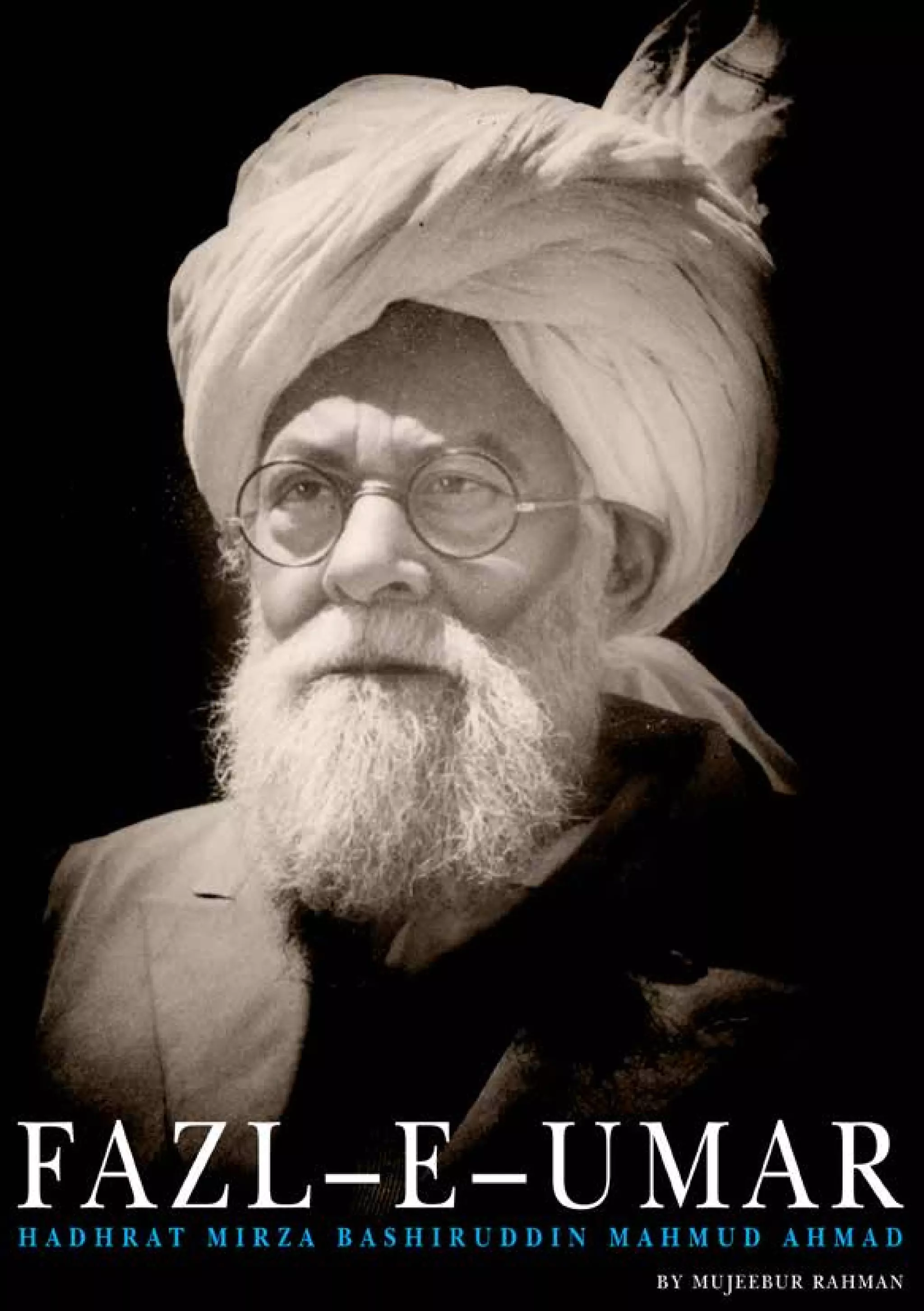

![FAZL-E-UMAR
The Life of Hadhrat Mirza Bashiruddin Mahmud Ahmad Khalifatul Masih II [ra]
First published in the UK in 2012 by Islam International Publications
Copyright © Majlis Khuddamul Ahmadiyya UK 2012
This book is sold subject to the condition that it shall not, by way of trade or otherwise
be lent, resold, hired out, or otherwise circulated without the publisher’s prior consent in
any form of binding or cover other than that in which it is published and without a similar
condition, including this condition, being imposed on the subsequent purchaser.
For legal purposes the Copyright Acknowledgements constitute a continuation of this
copyright page.
ISBN: 978-0-85525-995-2
Designed and distributed by Majlis Khuddamul Ahmadiyya UK
Author: Mujeebur Rahman
Printed and bound by Polestar UK Print Limited](https://image.slidesharecdn.com/fazl-e-umar-160102120102/85/Fazl-e-Umar-3-320.jpg)
![ii
Letter from Hadhrat Mirza Masroor Ahmad [atba] 1
Foreword 3
Comments by Sadr Majlis Khuddamul Ahmadiyya UK 5
Acknowledgements 6
Introduction 9
PART 1 15
Early childhood and parental training 17
Education 41
Public speaking and writing 55
Childhood interests, games and pastimes 63
Circle of contacts 75
Belief in the truth of his father and its consequences 80
Ever–growing faith in the Promised Messiah [as] 88
The death and burial of the Promised Messiah [as] 90
Historic pledge of Hadhrat Sahibzada Mirza Mahmud Ahmad 98
PART 2 103
Establishment of Khilafat in the Ahmadiyya Movement 105
Efforts to support and strengthen the institution of Khilafat 110
PART 3 143
Khilafat of Hadhrat Mirza Bashiruddin Mahmud Ahmad [ra] 144
Independence of India 153
The Shuddhi Movement 166
Trip to Europe 168
Holy Prophet’s [saw] Day and Religious Founders Day 177
Contents](https://image.slidesharecdn.com/fazl-e-umar-160102120102/85/Fazl-e-Umar-4-320.jpg)
![iii
The Kashmir issue 180
Tehrike Jadeed (the New Scheme) 208
Family Life 211
Children of Hadhrat Musleh Mau’ood [ra] 224
Consolidation of the Movement 226
The Promised Son 237
Ta’limul Islam high school 242
Partition 246
Rabwah 253
Qadian after partition 259
Hadhrat Musleh Mau’ood’s [ra] services for the Holy Qur’an 263
Efforts of Hadhrat Musleh Mau’ood [ra] to promote education 295
The forward march of Ahmadiyyat 313
Hadhrat Musleh Mau’ood [ra] and the system of Wasiyyat 316
The state of Jammu and Kashmir 322
The disturbances of 1953 329
Attempt on the life of Hadhrat Khalifatul Masih II [ra] 332
Trip to Europe for medical treatment 335
The Fazle Umar 338
The Electoral College 339
Waqfe Jadeed (The New Dedication) 340
The Auxiliary Organisations 345
Writings of Hadhrat Musleh Mau’ood [ra] 351
Services and contributions in the international arena 359
Illness and demise 380
Endnotes 386
Glossary of Important Terms 393](https://image.slidesharecdn.com/fazl-e-umar-160102120102/85/Fazl-e-Umar-5-320.jpg)
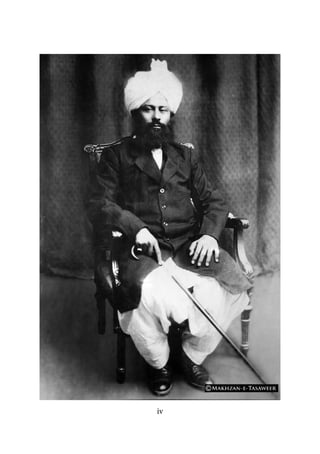
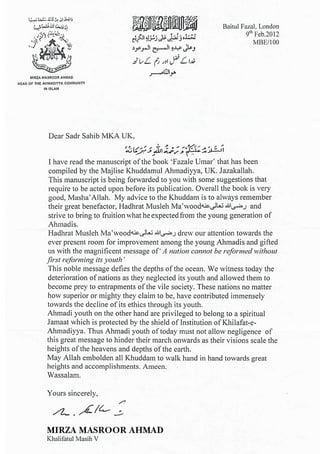

![Fazle Umar
3
Foreword
This book is the biography of Hadhrat Mirza Bashiruddin Mahmud Ahmad
[ra], the Promised Son of the Promised Messiah and Mahdi [as]; the manifest
Sign of Allah, the Almighty; the Word of God whose advent was prophesied by the
Holy Prophet Muhammad [saw] and the Promised Messiah [as] as well as the
past Prophets; a star in the spiritual firmament for the like of which the world had to
wait for hundreds of years to appear; the man of God, crowned with a spiritual halo
from which radiated such scintillating rays of light as would instil spiritual life into
his followers and captivate and enthral those who were not fortunate to follow him;
an orator of such phenomenal quality that his speeches would make his audience
stay put for hours on end, come rain or shine, deep into the late hours of the evenings
while words flowed from his tongue like honey dripping into their ears to reach the
depths of their souls to fill them with knowledge and invigorate their faith; the ocean
of Divine and secular knowledge; the Voice Articulate of the age; without doubt the
greatest genius of the 20th century; a man of phenomenal intelligence and memory;
an epitome of the qualities of leadership; the one whose versatility cannot be compre-
hended – Hadhrat Mirza Bashiruddin Mahmud Ahmad [ra] (1889–1965), Musleh
Mau’ood (the Promised Reformer) was the eldest son and the second successor of
the Promised Messiah [as]. He took charge of the Movement at the young age of 25
when the Movement was still in its infancy and nourished it to its maturity for more
than 50 years with his spiritual guidance, prayers, tears, toil and blood. Not only did
he fortify the foundations of the Community laid down by the Promised Messiah
[as], but expanded the structure of the Movement by initiating various schemes,
organisations, and programs taking his inspiration from the Promised Messiah [as]
and under Divine guidance1
.](https://image.slidesharecdn.com/fazl-e-umar-160102120102/85/Fazl-e-Umar-9-320.jpg)

![Fazle Umar
5
Comments by Sadr Majlis Khuddamul
Ahmadiyya UK
This wonderful book has finally come to completion from its inception in 2007
under the guidance of Mirza Fakhar Ahmad sahib, then steered through the following
two years by Tommy Kallon sahib and now with Allah’s Grace and Bounty it is ready
for presentation to a very eager audience.
The life and times of our beloved Hadhrat Musleh Mau’ood, a life spanning
seventy-six years, fifty-two of which were under the divine blessing of Khilafat, can
only be a joy to read and appreciate. This great man who pioneered the great institution
that is Majlis Khuddamul Ahmadiyya fulfilled every single iota of the Grand Prophecy
which foretold his coming and although it is virtually impossible to present a biogra-
phy that can truly measure up to Hadhrat Musleh Mau’ood, it has been through their
sheer love for Allah and His Khalifa that the Khuddam involved in this book have
endeavoured to do so. My thanks go to Mujeebur Rahman sahib, Daud Khan sahib,
Aziz Hafiz sahib, Muzaffar Bhatti sahib and Irfan Chaudhry sahib for their sincere
efforts in completing this publication.
Hadhrat Musleh Mau’ood once declared “A nation cannot be reformed without
first reforming its youth”. With this profound statement, one that reflects appropri-
ately in today’s society, I hope that the youth reading this great account are inspired
to such a degree so as to bring about a positive change in their own lives as well as in
the community around them [insh].
Fahim Anwer
Sadr Majlis Khuddamul Ahmadiyya UK
January 2012](https://image.slidesharecdn.com/fazl-e-umar-160102120102/85/Fazl-e-Umar-11-320.jpg)
![Fazle Umar
6
Acknowledgements
All praise to God Almighty whose boundless mercy and miraculous help has
enabled me to complete this project, started in February 2007 at the behest of Mirza
Fakhar Ahmad sahib, Sadr Majlis Khuddamul Ahmadiyya UK. I chose to undertake
this task though not without any misgivings about my own lack of ability as well as
the shortage of time in which to complete this monumental task.
I extend my gratitude to Hadhrat Khalifatul Masih V [atba]. Despite mul-
tifarious responsibilities and continuous preoccupation with problems of a baffling
variety, Huzur sacrificed his precious moments to read the manuscript. This project
would never have seen the light of day without Huzur’s prayers and guidance.
I am indebted to Mirza Fakhar Ahmad sahib, then Sadr Majlis Khuddamul
Ahmadiyya UK, who oversaw the lion’s share of this project for his full support,
guidance and most importantly his encouragement despite a very busy workload. I
am also indebted to the subsequent Sadr Tommy Kallon sahib and the current Sadr
Majlis Khuddamul Ahmadiyya UK, Fahim Anwer sahib for ensuring the project did
not lose momentum.
Furthermore, I am grateful to Mohammad Sadiq Nasir sahib, Head of the Khilafat
Library, Rabwah, Pakistan for combing the shelves of this great institution and going
out of his way to provide invaluable material for this work.
The purpose of this book is to provide a glimpse into the life of Hadhrat Musleh
Mau’ood [ra]. Many sources have been quoted verbatim throughout the major part
of this work however speech marks have not always been used.
Part One is mostly drawn from Swaneh Fazle Umar, a detailed biography of
Hadhrat Khalifatul Masih II [ra] compiled by various authors written in the Urdu
language. I am indebted particularly to my dear friend, the late Khaleelur Rahman
Mullick sahib of Reading, UK, for not only helping with the translation of some par-](https://image.slidesharecdn.com/fazl-e-umar-160102120102/85/Fazl-e-Umar-12-320.jpg)
![Fazle Umar
7
ticularly difficult parts but editing my translation, dotting the ‘I’s and crossing the ‘T’s.
Part Two has relied on various sources that are referenced throughout.
Part Three is again largely taken from Swaneh Fazle Umar unless otherwise
specified in the text. One cannot extend enough gratitude to the early scholars of the
Movement that have left us with a great treasure trove of knowledge and made this
task possible.
The chapter dealing with Hadhrat Khalifatul Masih II’s services for the Holy Qur’an
is based on a speech delivered on this subject in Urdu by Hadhrat Sahibzada Mirza
Tahir Ahmad [rh] during the 1974 Annual Gathering in Pakistan. I am grateful
to Syed Tanwir Mujtaba sahib of the Tasnif Dept., Rabwah, Pakistan for his helpful
suggestions which greatly increased the scope of the book.
The following helped me in various ways: Arif Khan sahib, Sheikh Basharat Ahmad
sahib and Tariq M Choudhry sahib. I thank them for extending a helpful hand to make
this publication possible.
Thanks must also be extended to Dr Aziz Hafiz sahib, Farooq Aftab sahib, Yusuf
Aftab sahib, Lord Tariq Ahmad BT sahib, Faez Ahmad sahib, Tayyib Hayat sahib,
Salim Ullah Kahlon sahib , Qudsi Rasheed sahib and particularly to Daud Khan
sahib for not only proof reading but also giving ideas that have added value to this
text. In addition one cannot forget Irfan Chaudhry sahib for completing the design
layout of the book and patiently working with many iterations we had to go through
before having it ready for print. The task of liaising with printers was left with Noman
Muhmmad sahib who made sure that all the print options were carefully considered.
Muzaffar Bhatti sahib, Mohtamim Isha’at, as well as Nadimur Rahman sahib, the
previous Mohtamim, along with their teams should be acknowledged for the proofing,
typesetting and design of the publication.
Mujeebur Rahman
Keighley, UK
January 2012](https://image.slidesharecdn.com/fazl-e-umar-160102120102/85/Fazl-e-Umar-13-320.jpg)

![Fazle Umar
9
Introduction
Towards the end of the 18th Century an extraordinary announcement caused a
mighty commotion throughout the religious world. The announcement written by the
Promised Messiah [as] was published in the Urdu and English languages.
The announcement was written in the form of a letter addressed to the religious
leaders throughout the world. It was also despatched to the religious leaders throughout
India in which the Promised Messiah [as]proclaimed that the fresh signs of the Living
God could only be experienced through Islam. Today Islam is the Tur (mountain) of
Prophet Moses [as] from where God is speaking. The letter read:
“I wish to bring before you the fact that the one true religion that has earned
God’s consent and pleasure is Islam and that the divinely protected and practical
Book from Him is the Holy Qur’an. If you are in doubt regarding this you are
invited to come to Qadian for a year and stay in my company and observe all
the heavenly signs with your own eyes. The only condition is that your intention
should be pure and that you are searching for truth.
“At Qadian you will certainly find the truth because this guarantee has been
given by God and that never fails. Moreover, if you come here and fail to discover
any sign of truth then I will exact on myself the penalty of 200 rupees a month.
This will be paid to you for wasting your time and for failing to provide what
we promised we would do. If you feel this amount is below your status then
we will pay you whatever amount you wish, provided it is within our means.”
This forceful proclamation was such that it caused a huge commotion throughout
the religious world. The announcement agitated the hearts of many. This restlessness
was also felt by the devout Hindu leaders and other prominent men in Qadian whose
sincere hearts were eager to seek the truth.](https://image.slidesharecdn.com/fazl-e-umar-160102120102/85/Fazl-e-Umar-15-320.jpg)
![Fazle Umar
10
In reply to the letter of the Promised Messiah [as] they requested that although
the people of all nations of the world (including Europe and America) have been
addressed in Huzur’s letter, being the residents of Qadian they had a greater right to
witness and testify to such Signs. This would also mean incurring less expense as well
as having such men who were eager to see the signs of the Living God.
These prominent men included Munshi Tara Chand, Lachman Ram, Bish Daaz,
Nihaz Chand and Beej Nath. The letter was witnessed by Lala Sharampat and Hadhrat
Maulvi Abdullah Sanouri sahib as well as some others. The Riyaz Hind Press in Amrit-
sar published the letter. In it the authors requested that the Sign be shown within one
year of its publication, between September 1885 and September 1886.
The Promised Messiah [as] accepted their request assuring them that there was
no reason why God Almighty Who Himself dictated the announcement should not
show a sign in response to their sincere request within this time period.
God Almighty develops a deep connection with the founders of new religious
orders from the very beginning. The means of the step by step strengthening of this
new order is also brought about through the help and support of the All-Powerful God.
Prior to this letter in around 1884, the Promised Messiah [as] resolved to
undertake chilla, as it is known in Islam, a period of 40 days of solitude, prayer and
contemplation in which communion is sought with God. He therefore endeavoured to
proceed to Suranjpur but received a revelation from Allah Almighty, the Knower of the
Unseen, in Urdu which translates, “Your purpose would be achieved in Hoshiarpur”.
The Promised Messiah’s [as] thoughts were directed to this revelation and he
migrated to Hoshiarpur in January 1886. He took up residence on the first floor of a
secluded house on the outskirts of the town. He spent fourty days in complete seclu-
sion and prayer. His food was placed outside the door of his room which he would
take when he could.](https://image.slidesharecdn.com/fazl-e-umar-160102120102/85/Fazl-e-Umar-16-320.jpg)
![Fazle Umar
11
The Promised Messiah [as] prayed for a sign of the truth of Islam. The result
was a series of magnificent revelations. When the forty days had been completed, the
Promised Messiah [as] published an announcement on 20 February 1886 in which
he stated that God had honoured him with the disclosure of many matters with regard
to the unknown. One of them, he stated, related to his own person and concerned the
advent of a son. The announcement states:
“God Almighty, the Lord of Honour and Glory, Merciful, Benevolent, Exalted,
Who has power to do all that He wills (glory be to Him and exalted be His
name) has vouchsafed to me the following revelation.
‘I confer upon thee a sign of My Mercy according to thy entreaties and have
honoured thy prayers with acceptance through My Mercy and have blessed this,
thy journey. A Sign of power, mercy and nearness to Me is bestowed on thee, a
Sign of grace and beneficence is awarded to thee, and thou art granted the key
of success and victory…
Rejoice therefore, that a handsome and pure boy will be bestowed on thee.
Thou wilt receive an intelligent youth who will be of thy seed and will be of thy
progeny… He has been invested with a holy spirit, and he will be free from all
impurity. He is the light of Allah. Blessed is he who comes from heaven. He will
be accompanied by grace which shall arrive with him. He will be characterised
by grandeur, greatness and wealth. He will come into the world and will heal
many of their ills through his Messianic qualities and through the blessings of
the Holy Spirit. He is the Word of Allah, for Allah’s mercy and honour have
equipped him with the Word of Majesty.
He will be extremely intelligent and understanding and will be meek of heart
and will be filled with secular and spiritual knowledge. He will convert three
into four [of this the meaning is not clear]. It is Monday, a blessed Monday. Son](https://image.slidesharecdn.com/fazl-e-umar-160102120102/85/Fazl-e-Umar-17-320.jpg)
![Fazle Umar
12
delight of the heart, high ranking, noble; a manifestation of the First and the
Last, a manifestation of the True and the High; as if Allah has descended from
heaven. His advent will be greatly blessed and will be a source of the manifes-
tation of Divine Majesty. Behold a light cometh, a light anointed by God with
the perfume of His Pleasure.
He will pour His spirit upon him and he will be sheltered under the shadow
of God. He will grow rapidly in stature and will be the means of procuring the
release of those held in bondage. His fame will spread to the ends of the earth
and people will be blessed through him. He will then be raised to his spiritual
station in heaven.
This is a matter decreed…’” 2
In an announcement some six weeks before the birth of this son, the Promised
Messiah [as] declared that he had been ‘given intimation of a son who was to be born
to him and he saw his name written on a wall as Mahmud’ (Green Announcement, 1
December 1888: Taryaqul Qulub, pg. 40).
Hence, within the period of nine years specified by the Promised Messiah [as]
for the fulfilment of the prophecy, this Bashir finally made his blessed appearance on
12 January 1889. He was named Bashiruddin Mahmud Ahmad. His birth was made
known the same day by means of a leaflet. It was also written therein that he had not
yet been informed as to whether this boy was the one who was to be the Promised
Son. Later on, however, the Promised Messiah [as] definitively declared in his books,
Siraje Munir, Taryaqul Qulub, Nuzule Masih, that he was the Promised Son.
Aside from the birth of the son within nine years of 20 February 1886, the real
test of its fulfilment was to be the possession of such distinctive characteristics and
also the accomplishment of such outstanding achievements as had been prophesied](https://image.slidesharecdn.com/fazl-e-umar-160102120102/85/Fazl-e-Umar-18-320.jpg)
![Fazle Umar
13
in the announcement of 20 February 1886.
The fulfilment of these prophecies was gradually unfolded over more than half a
century of the period of his Khilafat.
By the Grace of Allah, this biography will try to demonstrate how his whole life as
Khalifa, and all the series of great achievements in almost every walk of life, constituted
a fulfilment of those prophecies, which furnished irrefutable proof of the truth of the
Promised Messiah [as] and of the fact that Hadhrat Khalifatul Masih II [ra] was
the Promised Son, concerning whom the prophecies were made.](https://image.slidesharecdn.com/fazl-e-umar-160102120102/85/Fazl-e-Umar-19-320.jpg)



![Fazle Umar
17
Early childhood and parental training
A Precocious Child and a Patient Father
A phrase in the Arabic language says, “A child is a child even if he will become a
prophet.” But if you combine with it the Urdu phrase, “A precocious child shows the
man inside him” it makes the whole truth.
No matter what high positions a child is going to reach in view of his innate
powers, his childhood innocence and spontaneity remains intact, but at the same
time occasionally you do see some glimpses of his glorious future. Seeing such a child,
the perceptive mind soon realises that with the Grace of God one day this child will
become a great man.
During the childhood of Hadhrat Mirza Bashiruddin sahib (also referred to as
Hadhrat Sahibzada Sahib) we see a wonderful intermingling of these two aspects. To
illustrate this an incident of his childhood has been narrated by Hadhrat Maulvi Abdul
Karim [ra] – a noble companion of the Promised Messiah [as]:
“When Mahmud was about three years of age, the Promised Messiah [as] once
happened to be in Ludhiana and I too, was with him. There was a partition wall
between the male and female quarters of the house where we were staying. It
was summer and the weather was very hot. I happened to wake up once in the
middle of the night to hear Mahmud crying and the Promised Messiah [as]
talking to him gently to divert his mind. The Promised Messiah [as] seemed
to be carrying him in his arms, and pacing about to soothe him, but the child
continued to cry. After some time the Promised Messiah [as] said: ‘Look how
brightly that star shines Mahmud!’ This arrested the child’s attention evidently,
for he quietened down for a moment but started crying again with a new basis](https://image.slidesharecdn.com/fazl-e-umar-160102120102/85/Fazl-e-Umar-23-320.jpg)
![Fazle Umar
18
for his petulance. ‘I wish to go to that star!’ he now wailed over and over again.
But the loving patience of the Promised Messiah [as] was in no way ruffled by
this impossible demand. Instead, he was rather amused by it, and I heard him
saying softly to himself, ‘I had tried to divert his attention, but he has discovered
in that a new reason to continue crying.’ The child fell asleep only when he was
too tired to cry any more, however, throughout the whole episode there never
was a harsh tone in the voice of the Promised Messiah.” 3
Reflecting upon this child’s later life we learn that his longing wish to go to the
stars was certainly pointing to his high aims that continued to spur him throughout
his life on his inexhaustible power of effort and activity. Moreover, the incident sheds
light upon the Promised Messiah’s love, kindness and tolerance towards children.
He never thought himself too grand for any task even though his every moment was
filled with a crushing workload. One must bear in mind that apart from writing over
85 books, he replied to around 90,000 letters. This amounts to 35 letters per day! He
did this unaided without any secretaries or assistants. He also received around 60,000
visitors who gathered to hear his claim to be the Promised Messiah. Hence, during
those few precious hours of rest, he nurses a crying child by cradling him in his loving
arms until he falls asleep of his own will. This was an example of his very high moral
standard. This episode is from very early childhood. There is another similar incident
in later life that tested his patience and restraint still further. God Almighty had blessed
the Promised Messiah [as] with a huge amount of patience and forbearance. Allah
Almighty blessed him with an abundantly kind and affectionate heart making it difficult
for him to lose patience with children. Whatever the reason may be Huzur’s patience
and forbearance with this child was extraordinary as is manifest from the incident
below, also related by Hadhrat Maulvi Abdul Kareem [ra]:
“When in his fourth or fifth year, Mahmud one day came into the room where](https://image.slidesharecdn.com/fazl-e-umar-160102120102/85/Fazl-e-Umar-24-320.jpg)
![Fazle Umar
19
the Promised Messiah [as] sat writing. He had a box of matches in his hands
and he was followed by a troop of young friends. They played about in the room
for some time, talking and laughing and quarrelling among themselves. Then
a bright idea occurred to Mahmud to contrive a new diversion. He secured a
quantity of papers (pages of the valuable manuscript of a work the Promised
Messiah [as] had in hand), struck a match and set them ablaze. They crackled
and curled and in a moment there was nothing left of them but a heap of ashes,
or a charred bit or two, which the wind blew away. This pleasant pastime over,
the children trooped out of the room and busied themselves in other pursuits.
The Promised Messiah [as] remained absorbed in writing, undisturbed, and
unconscious of the noise and commotion that had occurred in the room. After
some time he felt the necessity to consult some back page to get the sequence of
ideas and he rose to get it. But the required page was nowhere to be seen and
in the room was a heap of ashes. Inquiries having been made and the truth
of the matter ascertained, the children were frightened and members of the
household too were apprehensive in view of the valuable nature of the papers.
The Promised Messiah [as] however, on being told only remarked smilingly,
‘that’s all right. It does not matter. The Almighty God it seems intends to give
me the power to write to much better effect than I had done previously so by
this means he has destroyed what I had written” 4
Parental Training
This tolerance and forbearance by no means meant that, God forbid, the Promised
Messiah [as] did not appreciate how to bring up children, or was like such mothers
who spoil their children out of unconditional love.
In fact, Huzur’s training of children was very unique and subtle. As will become](https://image.slidesharecdn.com/fazl-e-umar-160102120102/85/Fazl-e-Umar-25-320.jpg)
![Fazle Umar
20
apparent from the following incident, when it was appropriate Huzur was very strict
with his children. The difference was only that when Huzur personally felt the effect
of the incident, he never reproached Hadhrat Musleh Mau’ood [ra] no matter how
much discomfort his actions may have caused. But as far as religious matters were
concerned, or such mistakes were committed that posed a danger of affecting one’s
character adversely, he certainly reprimanded him gently or sternly as the occasion
demanded. This differentiation is most important and carries a deep lesson for those
who have the grave responsibility for moral training, as to where the limits of toler-
ance end and the requirements of strictness begin. To illustrate this differentiation,
two minor incidents are narrated here. Hadhrat Sahibzada Sahib himself has narrated
the first one:
National Sense of Honour
“Once a dog came to our door as I stood there. Huzur was in the room alone.
I beckoned the dog calling, ‘Teepu! Teepu!! Huzur came out in a distress and
said, ‘aren’t you ashamed? The English because of animosity have named their
dogs after the name of a sincere Muslim and you are copying them and call the
dog Teepu. Beware! Never repeat it again!’
“I was only eight or nine at the time and it was the first day when the love of
Teepu Sultan was established in my heart.” 5
While on the one hand we conclude from this incident that to tolerate every
action of a child without distinction does not fall under the definition of forbearance,
we can also guess to some extent, the limitless religious and sense of national honour
of the Promised Messiah [as]. He tolerated the action of this child when he set fire
and reduced in a moment to dust his priceless manuscripts prepared with hard labour
of, God knows, how many hours and how many nights and ignored the trouble of re-
writing, yet he could not tolerate the innocent disrespect of a Muslim King who was](https://image.slidesharecdn.com/fazl-e-umar-160102120102/85/Fazl-e-Umar-26-320.jpg)
![Fazle Umar
21
martyred defending national honour and with whom the Promised Messiah [as]
had no other connection besides Islam.
This incident also has a lesson for those who have the audacity to allege that the
Promised Messiah [as] was an agent of the English. A heart that was filled with a
sense of national honour and who respected so highly Sultan Fateh Ali Teepu only for
the reason that instead of submitting to the English, he heroically sacrificed his life.
How is it possible that one can entertain the least doubt for a man with such a keen
sense of honour of being an agent of a foreign power?
Importance of Performing Religious Duties
Despite being extremely kind and affectionate, the Promised Messiah [as] never
liked to leave a child who showed negligence in the performance of his religious obli-
gations without reprimand and expressing displeasure. Recalling such an incident,
Hadhrat Sahibzada Sahib observes:
“Once Huzur could not go to the Friday prayers because of ill health. At that
time I was not mature to the point where obligations that come with maturity
would apply to me. Nevertheless, I was going towards the mosque for the Friday
prayers when I met someone along the way. According to my age at the time,
I should not remember the man’s face but the incident had such a profound
effect upon me that I clearly remember the man’s face to this day. Mohammad
Baksh is the gentleman’s name… I asked him, ‘You’re coming back, have the
prayers finished?’ He said, ‘There were too many people, there was no room in
the mosque and so I came back.’ I also turned back upon hearing this and offered
my prayers at home. On observing this Hadhrat sahib enquired, ‘why did you
not go to the mosque to offer prayers?’ It was by God’s Grace that from a very
early age I used to greatly respect Huzur on account of him being a prophet. I](https://image.slidesharecdn.com/fazl-e-umar-160102120102/85/Fazl-e-Umar-27-320.jpg)
![Fazle Umar
22
noticed there was displeasure in his voice and his countenance reflected disaf-
fection. Huzur’s tone of voice affected me deep within. I responded that I had
gone but due to a lack of space I came back. He fell silent on hearing this. But
when Maulvi Abdul Karim sahib came to enquire about his health after the
Friday prayers, the first thing the Promised Messiah [as] enquired about was
whether there were many people in the mosque today. At that moment I became
very anxious because I had not gone there myself. I did not know whether my
informer had made a mistake or whether I had misunderstood what he had
said. I understood from him that there was no room in the mosque. I was
worried that if I misunderstood or the informant had misunderstood, in both
circumstances the blame will fall on me that I had told a lie. Maulvi Abdul
Karim sahib replied, ‘Yes Huzur! Actually, today there were many people.’ Even
to this day I do not know what the reality was. God provided this opportunity
to prove my innocence by Maulvi sahib’s own words that in actual fact, on that
day an extraordinary number of people came to the mosque. Anyway, this is
one incident that left a deep impression on my heart.” 6
Children normally possess a God-given skill that despite young age they become
quite aware of their parents’ inner leanings towards certain values. This general impres-
sion that children receive about their parents plays a major role in moulding their own
habits and character. Hence, as a result of the above two incidents, the importance of
a sense of national honour and the performance of responsibilities was so ingrained
on the heart of Hadhrat Mirza Bashiruddin Mahmud Ahmad sahib [ra] that they
became a distinctive feature of his temperament.
His Father’s Subtlety and Excellent Example
The manner of the Promised Messiah’s [as] training, as has been stated was very](https://image.slidesharecdn.com/fazl-e-umar-160102120102/85/Fazl-e-Umar-28-320.jpg)
![Fazle Umar
23
subtle. He generally persuaded him to accept things with gentle and loving words and
expressions of good expectations where the methods of harsh words or physical harsh-
ness mostly fail. At times a child picks up more food than necessary and the parents
scold him and become offended. They even try to take it away but instead of agreeing
the child continues to increase in his insistence and is defiant. On such occasions the
method of the Promised Messiah [as] was entirely different and the outcome was also
completely different. For instance, Hadhrat Syed Fazal Shah [ra]
– a sincere disciple
of the Promised Messiah [as] states:
“One day the Promised Messiah [as] was sat in the upper storey courtyard
with almonds in front of him. I was shelling the almonds when Hadhrat Mian
Bashiruddin Mahmud Ahmad who was 4 or 5 years of age at the time, came
and took all the almonds and put them into his lap. Observing this Huzur said,
‘Mian is very good; he will not take too many. He will only take one or two. He
will put all the rest back.’ When Huzur said this, Mian sahib quickly put all the
almonds in front of me and only took one or two for himself.”
An extremely important cause for the flaw in children’s character is that consid-
ering them ignorant, the parents do not deal with them with the same honesty, trust
and sincerity that they expect from them. For instance, even when the parents have
a sincere desire that the children should not develop a habit of telling lies, they lie to
them either as a joke or to shake them off for the time being. The faults and weaknesses
of parents are never hidden from the children. The result is that the admonitions of
such parents never influence the children whose words do not match their deeds. There
was never a question of any type of moral lapse on the part of the Promised Messiah
[as]. His children’s temperaments were definitely affected by the harmony between
his words and his deeds in his everyday life. He did not just deem this sufficient but
gave extraordinary attention to this aspect for the sake of training children.](https://image.slidesharecdn.com/fazl-e-umar-160102120102/85/Fazl-e-Umar-29-320.jpg)
![Fazle Umar
24
For example, once in the winter season, Mian Mahmud, who was then only a child,
put broken pieces of earthenware in the pocket of the waistcoat of Hadhrat Mirza sahib
[as] so that whenever he lay down on his side they poked into him. He mentioned
to his servant that recently he had been feeling some pain in his ribs. The servant then
passed his hand over that area only to discover the broken pieces of earthenware. The
Promised Messiah [as] smiled and said, “now I remember, Mahmud put this in my
pocket and asked me not to take it out for he would play with it later.” Hadhrat Mirza
sahib asked that it should be left there for when Mahmud wished to claim it back. 7
To fully appreciate the beauty and elegance of such an incident, a passing glance
is not enough. Its allure should stop a man of culture in his tracks and compel him to
pause a while. It is not possible that an eye familiar with beauty can pass here without
stopping to take in this scene in a state of fascination and absorption.
It is said that if a philosopher’s stone were to touch pebbles it would transmute
them into gold. This is only fictional but if we look through the spectacles of high
moral values, those few potsherds and broken bits will appear more priceless than
gold and glittering with more dazzle.
It seems that the Promised Messiah [as]did not let slip the least opportunity with
the help of which he could polish the character of this child with ever-new glitter. For
example Hadhrat Mirza Muhammad Ismail Beg [ra] mentions a similar incident:
“One day accompanied by his companions as the Promised Messiah [as]
went for a walk, they passed by a fallen Acacia tree. Some companions cut
thin branches and made toothbrushes. Someone gave a toothbrush to Hadhrat
Sahibzada Mirza Mahmud Ahmad who was very young and was accompanying
them. In his childish way he said to Huzur, ‘Father, take this toothbrush.’ With
a smile Huzur said, ‘my child first tell me with whose permission were these
toothbrushes obtained?’ Hearing this everyone threw away their brushes.” 8](https://image.slidesharecdn.com/fazl-e-umar-160102120102/85/Fazl-e-Umar-30-320.jpg)
![Fazle Umar
25
This incident carries a singular charm and is worthy to be written in gilded letters
among the principles of character development. To take a few twigs for toothbrushes
from a tree fallen by the side of a road is not deemed to be such a moral crime to be
considered as an act of stealing for which a religious or civil court would propose a
punishment or reprimand. Normally people make toothbrushes from the trees still
standing and to take prior permission is unheard of, although it is the right of the
owner if he so wishes he can prevent it.
On this occasion if the Promised Messiah [as] had stopped them, it would have
amounted to applying such a strict moral code on ordinary people that it would have
become an overwhelming responsibility. Despite that, the high moral station to which
Allah had appointed the Promised Messiah [as], this minor speck of dust would not
befit the shining face of his elegance.
This minor speck of dust which an ordinary man has no capacity even to see
with his naked eye, the Promised Messiah [as] liked to see neither on himself nor
on that Promised Son who in his own time would take on the responsibility to adorn
the morals of the whole world. However, he said nothing to his companions so that
their feelings were not hurt should they be stopped formally.
Thus the beauty of the incident lies in his remaining silent despite disliking it for
himself. His silence was subtle but irrefutable evidence that there was not the least trace
of pretence or conceit in this man, otherwise what a great opportunity it was to display
the high station of one’s piety. As long as the child did not compel him by repeating
his question he continued his walk hiding his noble decision from the admiring eyes.
Evenwhenhewascompelledtospeak,howlovingwashismannerofforbidding.Inanswer
he raised a small question. “Tell me child with whose permission were these toothbrushes
obtained?” There is no pretence of piety, no vanity. There is no unpleasantness in admonish-
ing,noharshness.Smiling,heraisesaquestionwrappedingentlewords,‘mychildtellme?’](https://image.slidesharecdn.com/fazl-e-umar-160102120102/85/Fazl-e-Umar-31-320.jpg)
![Fazle Umar
26
Scent-bearing morals spreading musk in the air are not weighed on large measur-
ing scales but on the measuring scales of such subtly felt tender and graceful incidents.
Although this incident relates to the Promised Messiah [as] , it demonstrates
the character of the father under whose training Mahmud was nourished and grew up.
The Most Effective Means to Aid Training
These are just a few examples of Huzur’s style of training. However, for the Prom-
ised Messiah [as] the best way to aid the training of children was through prayers. It
was impossible for the Promised Messiah [as] who offered fervent prayers with deep
humility for his children well before they were conceived, to neglect praying for them
after they were born. Not only in connection with his children but in every situation
and condition he gave prayers the highest precedence and proclaimed it as the most
effective tool when weighed against any other means. He sought means only because
Allah created them and to employ them was also according to His Will. Hadhrat
Maulvi Abdul Karim [ra] states:
“No matter how troublesome and naughty they are and however pressing may
be their unreasonable demands and however much they may insist on having
what is unprocurable, he never beats them or scolds them or shows any signs
of anger… I have often seen that nothing annoys him as much as to hear that
someone has beaten his child. A gentleman here one day beat his children, as
a matter of habit. This greatly moved the Promised Messiah [as] who sent for
him and delivered a highly touching discourse.” 9
“…Children should be guided by good example and they should not be punished
physically, he said. Fathers who beat their children were putting themselves
alongside God and so were guilty of a kind of polytheism, believing they shared
His attributes of being a true and absolute guide. Those who pushed their](https://image.slidesharecdn.com/fazl-e-umar-160102120102/85/Fazl-e-Umar-32-320.jpg)
![Fazle Umar
27
children unwillingly in a certain direction, believing they were masters of their
children’s destinies, were guilty of the same sin.” 10
These few incidents that have cascaded down to us are exemplary. They do not
cover the whole of the nineteen years of life during which Hadhrat Sahibzada Sahib
[ra] received instruction from his illustrious father. One of his sons, Hadhrat Mirza
Bashir Ahmad states that the Promised Messiah’s [as] personal spiritual influence
generated an electric current of high spiritual voltage in every person who approached
him. Everyone, according to their ability, therefore became a source of power almost
like a battery just as small pieces of iron are magnetised when they come into contact
with a large magnet. His own moral and spiritual example transformed the people
around him. To whatever degree the historical record around that period is secure, its
analysis leads us to the definite conclusion that the Promised Messiah’s [as] character
and qualities deeply affected the personality of Hadhrat Sahibzada Sahib.
Huzur continuously filled this child’s heart with the abundant love of humanity he
possessed in his own heart. He wanted this child to emanate the same miraculous and
merciful feelings that emanated from his own heart for the rest of humanity. His words
are simple and the manner of admonition is uncomplicated and loving but as a result an
impressionable child receives the blessing of a melting heart for the creatures of God:
“Once Hadhrat Sahibzada Sahib had trapped some parrots in the house by
shutting the doors. Huzur passed by there on his way to the Friday prayers. On
seeing this he admonished, ‘Mian! One must not catch the birds that frequent
the home. He who has no compassion has no faith.’”11
A Reflection of His Father’s Elegance and Grace
Hadhrat Sahibzada Sahib’s life of this period cannot be separated from his father’s
and one cannot be mentioned without the other. He made the personality of Hadhrat](https://image.slidesharecdn.com/fazl-e-umar-160102120102/85/Fazl-e-Umar-33-320.jpg)
![Fazle Umar
28
Sahibzada Sahib abound in his own morality. He not only taught his beloved son to
give precedence to the values that he himself gave precedence to but even taught him
the etiquettes of paying due regard in morals to the status of each individual.
Once the students of Ta’limul Islam school were given an assignment which was
to compare and contrast the importance of knowledge and wealth. Sahibzada Sahib
reflected on this a great deal but could not decide which was better. The family was sat
at the dinner table along with the Promised Messiah [as]. Amongst the conversation,
Sahibzada Sahib asked his younger brother, Hadhrat Sahibzada Mian Bashir Ahmad,
“Bashir! Which of the two is more valuable, knowledge or wealth?” He remained silent
but Huzur himself replied, “repent Mahmud! Repent! Neither knowledge nor wealth
is good unless there is the Mercy of God.” 12
It was the effect of this subtle mode of training that whatever boundless manners
the Promised Messiah [as] himself possessed, the same elegance fully pervaded
the character of Hadhrat Sahibzada Sahib. Subsequently, the memories of those who
watched him continued to remind them, especially to those who had seen the face
of his holy father, of the Divine promise that “he shall reflect you both in elegance
and grace”. This fact was not only recognised by friends but the eyes of the opponents
also kept recognising this reality. It is another matter however, if their tongues were
adulterated by bitterness when accepting this fact.
Hadhrat Sahibzada Sahib always recounted an incident from his childhood days
with humour. His paternal aunt (Punjabi, Tā’ī) was the widow of Mirza Ghulam Qadir
sahib, the older brother of the Promised Messiah [as]. She had not accepted Ahmadi-
yyat in the lifetime of Hadhrat Mirza sahib [as] or for some time after his death.
Whenever she laid eyes on Hadhrat Sahibzada Sahib, she would say with some bitter-
ness, “jaiho jiyā kān oho ja’ī koko.” As Hadhrat Sahibzada Sahib was not completely
aware of Punjabi idiom at the time, he asked his mother what this meant. She said, ‘it](https://image.slidesharecdn.com/fazl-e-umar-160102120102/85/Fazl-e-Umar-34-320.jpg)
![Fazle Umar
29
means the baby crow is just like the crow. The crow, God forbid, is your father and you
are the baby crow.’ The eyes of this foe had the good fortune to recognise this likeness
as the likeness in beauty and elegance. Hence, that Tā’ī whose pride and status would
not allow her to recognise the truth of her brother-in-law, accepted Ahmadiyyat at the
hands of her nephew. Hatred was replaced with love, and arrogance and pride with
humility to such a degree that upon this child’s arrival, she would stand in reverence
despite her old age and infirmity. She would lay down cushions for him and seat him
with honour. If he said, “you are weak, you are frail, do not move, do not overbear,”
she would say, “you are my sage.” 13
It would not be out of place to mention that Allah Almighty had revealed to the
Promised Messiah [as] this two-worded phrase, “Tā’ī Aai”. “Aai” means “came” in
Punjabi. For a long time the enemies of Ahmadiyyat mocked them over this revela-
tion. Finally, the meanings of this revelation were opened to the world when Hadhrat
Sahibzada Sahib’s Tā’ī failing to accept the Promised Messiah [as] during his life-
time, accepted Ahmadiyyat at the hands of his son, upon which the streets of Qadian
reverberated with the phrase “Tā’ī Aai! Tā’ī Aai!”
His Mother’s Role in His Training and Upbringing
The account of this part of Hadhrat Sahibzada Sahib’s life would be incomplete
if alongside the efforts of Hadhrat Mirza Ghulam Ahmad [as], we did not mention
the part played by his mother, Hadhrat Syeda Nusrat Jehan Begum [ra_ha]. Her train-
ing left a deep impression on his conduct during the formative years. Fortunate ones
are the few whose mother and father are patrons of such high attributes. Moreover,
their values, beliefs and outlook flowed into a single stream. They shared a common
purpose that was free from any trace of duplicity and contradiction.
Of all the different causes, this was one of the main influences that helped imple-](https://image.slidesharecdn.com/fazl-e-umar-160102120102/85/Fazl-e-Umar-35-320.jpg)
![Fazle Umar
30
ment the fulfilment of the prophecy made about Hadhrat Sahibzada Mirza Mahmud
Ahmad sahib’s glorious future. No matter how helpful all the other factors are in shap-
ing the child, if only this obstacle is present that the style of training of the mother
and father are at loggerheads with each other, then this single factor leaves a deep,
sore wound in the discipline of the child. This was Allah’s extraordinary favour upon
Hadhrat Sahibzada Sahib that his mother also possessed a high degree of virtue and
nobility in the art of discipline, and her objective was the same as that of Hadhrat
Mirza Ghulam Ahmad [as].
His mother, Hadhrat Syeda Nusrat Jehan Begum [ra_ha], was the paternal grand-
mother of Hadhrat Mirza Tahir Ahmad [rh], the Fourth Khalifa of the Ahmadi-
yya Muslim Community. He recalls that she admonished children in a very simple,
touching and effective manner. She was a stranger to affectation and artificiality
and portrayed sincerity and piety. Her every word was replete with loving sincerity.
Apart from anger, he never witnessed even the slightest suspicion of formality in her
character. Because she was so kind-hearted, she rarely lost her temper and even then
it was almost non-existent. Consequently, she would push herself to become angry
showing her dislike of some action. She would herself become upset at this show of
anger, which had no affect upon the children and tried to console them. To get a better
sense of the manner of her training and upbringing of Hadhrat Mirza Bashiruddin
Mahmud Ahmad [ra], who better to consult than her own children in this regard.
Hence, an excerpt from the writings of his sister, Hadhrat Nawab Mubaraka Begum
sahiba, is presented below in this connection. She states:
“By showing the child that you always have full trust in him, to inculcate a
sense of honour and respect for the trust of the parents was her main principle
of training. Aversion to lies, a sense of honour and self-respect used to be her
first lesson. She always told us that you should cultivate this habit in the children](https://image.slidesharecdn.com/fazl-e-umar-160102120102/85/Fazl-e-Umar-36-320.jpg)
![Fazle Umar
31
that they should obey you, thereafter even if they behave with childish mischief
there is no fear. Hadhrat Ummul Momineen [ra_ha] would always say that my
children do not tell lies. It was this trust that saved us from lies rather it made
us averse to lies… And I remember that respect for my mother would increase
further in my heart.
“Another principle for the training of children that she used to state was that you
should do your utmost to train the first child, then seeing this example others
will automatically be good.” 14
His Capacity to Accept Moral Training
No matter how pretty, strong and permanent a dye is, a cloth cannot be dyed as
long as its material lacks the quality to accept that colour. The hue of training also
depends on similar requirements. If we study the life of Hadhrat Sahibzada Mahmud
Ahmad [ra] from this point of view, we find this quality in him to its utmost
degree. He was bestowed the capacity to accept good advice and beautiful colours at
their most excellent level. Besides this he possessed perfectly the quality of rejecting
wrong impressions. As a result of prolonged training by the Promised Messiah [as]
not only did he accept good advice that was given gently but he would also accept
without hesitation or confusion advice that was apparently bitter but was justified in
its own right. In this regard an incident is especially worth considering when he not
only accepted good advice given in bitter tone but felt throughout his life indebted to
the one who gave him that advice:
“I cannot forget the favour of a friend throughout my life. Whenever I see his
children in some difficulty I feel shooting pain in my heart and I pray for their
welfare… The incident occurred in 1903 when the Promised Messiah [as]
was staying in Gurdaspur for pleading the lawsuit instigated by Maulvi Karam](https://image.slidesharecdn.com/fazl-e-umar-160102120102/85/Fazl-e-Umar-37-320.jpg)
![Fazle Umar
32
Din. The friend I am talking about hailed from Muradabad U.P. and was a
Squadron Leader Major in the army. His name was Mohammad Ayyub. He
came to Gurdaspur to pay a visit to the Promised Messiah [as]. He said two
things to me which were a means of my guidance.
“In Delhi it was customary for children to address their father as ‘TUM’ (an
impolite form of ‘you’). Likewise a wife addressed her husband with the same
impolite form. In Lucknow, however, they addressed with ‘AAP’ (a polite form).
Hearing constantly the word TUM I had developed the habit of addressing
people as TUM. Although as a custom I mostly avoided addressing the Promised
Messiah [as] but when the need arose and I was compelled to address I used
the word TUM. For some reason in the presence of that friend I had to address
the Promised Messiah [as] and used the word TUM. Hearing this word that
friend held me by the arm and took me away from the gathering and said, ‘I
have great respect for you in my heart and that very respect demands that I
should warn you of your mistake. When addressing the Promised Messiah [as]
you must never use the word TUM. Instead you must address him as AAP.
Otherwise if you ever use this word again I will apprehend you.’
“Because I had regularly been using the word TUM I could not see any dif-
ference between these two words. Rather, instead of AAP, I preferred the word
TUM. In fact as I was not accustomed, I used to perspire with embarrassment
whenever I said AAP since I considered it a crime to say AAP. However, after
the explanation from this friend I began to use the word AAP and the impact
of his advice is still felt in my heart.”
Appropriate Mode of Dress
“Once I visited Lahore and saw some boys wearing neckties. I fondly purchased](https://image.slidesharecdn.com/fazl-e-umar-160102120102/85/Fazl-e-Umar-38-320.jpg)
![Fazle Umar
33
one and started wearing it. The next incident also happened in Gurdaspur.
“The same late friend took me aside and said, ‘today you are wearing a tie then
tomorrow we will watch shows of dancing girls because we have to learn lessons
from you. Whatever steps you take we will follow you.’
“He said this and asked me for the tie. I took it off and gave it to him.
“So I can never forget these two admonitions by him. I feel this is how a sincere
disciple should be. If a member of our family fails to realise his responsibility
then you must not spoil him by calling him Sahibzada Sahib! Sahibzada Sahib!
Rather you should say that you used to be Sahibzada (son of a respectable
person) no doubt but now you look worse than a Ghulamzada (born of a slave).
Therefore, you should reform yourself.” 15
While we learn many lessons from this report, an interesting fact also comes
to light. The intense love for the Promised Messiah [as] had so overwhelmed the
hearts of his companions that they had no care for such love that was in conflict with
it. It is true that the companions of the Promised Messiah [as] had great love for
his children. And we find much evidence that they treated his children with intense
love and affection but their love was not the result of some blind conformity. It was
because of their deep understanding that the Promised Messiah [as] was the source
of all blessings and all noble values. They were well aware of the fact that a branch is
only worthy of the degree of love based on its proximity to its source.
A question arises here. Does Islam specify some outward dress, the discarding
of which can make a man accountable and whether a Shalwar Qameez alone is an
Islamic dress?
To draw such a conclusion from the above report is not right. As a matter of fact,
the English came to India as rulers and the Indians did not adopt their dress, manners
and customs because they were somewhat superior but this copying started as a result](https://image.slidesharecdn.com/fazl-e-umar-160102120102/85/Fazl-e-Umar-39-320.jpg)
![Fazle Umar
34
of a slavish mentality. The companions of the Promised Messiah [as] had such high
expectations from his children that they would not tolerate even a minor slip from
them, although in principle the role model is the Imam alone and to take his children
as models is an improper and unfair method. The Holy Qur’an has elucidated it fully,
however, this fact cannot be denied and it is pointed out in the Holy Qur’an that the
common run of people who do not understand this principle fully, often follow the
example of those who are close to the Imam even when their example is wrong. In any
case, as far as the members of the family of the Imam are concerned their responsibility
is to be doubly careful. From this point of view when at the time Western culture was
attacking our old cultural traditions not just by means of their dress but with it many
other evils of morality were spreading rapidly in India, there was certainly a danger
for the section of society described above, that they would, together with the English
dress become tainted with other evils. This threat was pointed out clearly by the late
Squadron Leader Major Mohammad Ayyub Khan [ra]. He realised the danger and
decided to discard that dress for good.
Returning to our main subject once again we present here another incident of
Hadhrat Sahibzada Sahib [ra] being influenced by advice and accepting it cheer-
fully. He says:
“I notice that training during my childhood by some people still has an influ-
ence over me. Whenever I recall such an incident, prayer for the person rises
automatically from within my heart. Once I stood supporting my elbow on the
shoulder of another boy when Master Qadir Buksh [ra] – father of Maulvi
Abdul Rahim Dard [ra] dissuaded me and said it was not the right thing to
do. At the time I was twelve or thirteen but whenever my mind pictures that
scene, prayer for him rises from within my heart.” 16
This incident also sheds further light on the fact that he was naturally inclined to](https://image.slidesharecdn.com/fazl-e-umar-160102120102/85/Fazl-e-Umar-40-320.jpg)
![Fazle Umar
35
accept good training. Not only did he not mind being admonished, he developed so
strong a passion for gratitude that after a passage of several years, entering youth and
then becoming old, its intensity did not wane. This sentence makes one deeply anxious:
“When I recall that incident, prayer for him rises automatically from within
my heart.”
His Own Efforts to Improve Himself
A large part of one’s training is played by the admonition that he hears from his
well-wishers. A part is played by the taunts and criticism unleashed by his antagonists,
not with any good intention but only to inflict wounds. Another part is played by the
follies committed by the fools around him. Yet another part is played by one’s own
mistakes after which an immediate or delayed feeling of regret begins to probe one’s
heart and mind. In addition to all these agents, man’s general habit of pondering over
his surroundings also plays an important role in his upbringing. The verse of the Holy
Qur’an “They ponder over the creation of the heavens and the earth” (3:192) refers
to this very habit. Such a line of thinking has two aspects. Firstly, as a result of this
habit of reflecting over his surroundings, man dives into his own self and continu-
ously searches for ever new pearls of knowledge and wisdom. Secondly, he should not
accept whatever ancestral beliefs, customs and practices he has habitually received
as heritage. He should not adopt them until they appeal to his intellect and become
instilled in his heart.
For the one who develops this practice, it is as though he has been granted an inner
counsellor that stays with him throughout his life and continues to be his helper in the
development of his noble thoughts. Such line of thinking also needs mental integrity
without which it is not possible to reach the right conclusions.
Hadhrat Sahibzada Sahib [ra] was also granted this counsellor, as he was accus-](https://image.slidesharecdn.com/fazl-e-umar-160102120102/85/Fazl-e-Umar-41-320.jpg)
![Fazle Umar
36
tomed to ponder over all matters big or small and to chew over them in his mind. As
an example two instances are prestented here. Firstly, he says:
“In my childhood I heard an objection raised by the Hindu Aryas that God
was unable to create anything. He depends upon a supply of soul and matter to
create anything. I was in the habit of pondering over such statements that went
against logic and reason. I remember it well how one night I was sat leaning
against a wall reflecting on the stars. I started to wonder if there was anything
beyond the stars. I thought if there was nothing then space is impossible. And if
one were to suppose there was something more beyond them then there must be
something beyond that also. After pondering I began to see that man could not
even solve the riddle of what is observable. This question has only two outcomes
and both are impossible.” 17
On another occasion Hadhrat Sahibzada Sahib [ra] says:
“… I did not believe in the Promised Messiah [as] on the grounds that he was
my father. When I was nearly eleven years old I made a firm resolution that if
in my research, God forbid, I found him to be false, I would run away. However,
I appreciated his honesty and my faith kept growing to the point where when
he died my faith increased even more.” 18
In this connection this third incident also points to his mental transformation.
He says:
“The year 1900 was the time when my attention was drawn to the teachings
of Islam. I was then eleven years old. Someone had presented the Promised
Messiah with a robe made of a material like chintz. I had asked the Promised
Messiah for his robe, for no other reason except that I liked its colour and the
design of the material. I had taken it but I could hardly wear it because it was
cut too long for my size: if I wore it, it trailed on the ground.](https://image.slidesharecdn.com/fazl-e-umar-160102120102/85/Fazl-e-Umar-42-320.jpg)
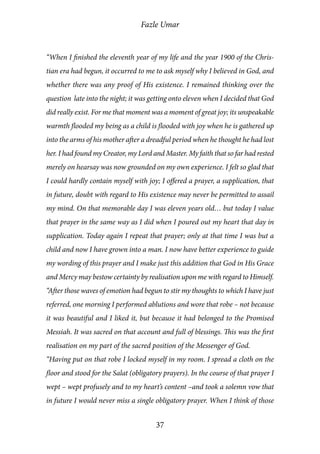
![Fazle Umar
38
days I am amazed to find what an unshakeable power of resolve I possessed at
the time. I was only eleven, and there were yet a few years left of my childhood,
but I kept that vow and I am keeping it still…
“I do not know why I wept that day. A philosopher and a sceptic would say
that my mood was brought on by some nervous breakdown – a religious man,
on the other hand, would attribute it to the fear and love of God – but I, who
passed through that experience am unable to assign any cause to it. I can only
remember that I repeated my vow more and more fervently each time and
wept more and more. But indeed how full of blessings has been that weeping
of mine, and what abiding comfort has come to me from that grief to which I
can assign no cause!
“When I think of those tears I am convinced that they were not the result of
hysteria. Then what were they? I am inclined to believe that they were the result
of some rays of light from the sun of the spiritual world that had penetrated my
heart: I believe they were the result of some words that fell from the lips of the
Promised Messiah [as], or perhaps they were due to some look from his eyes
which fell on me. But if they were not due to these two things, I am unable to
say where that flood came from.” 19
Profound Love for the Companions of the
Promised Messiah [as]—The Death of Hadhrat
Maulvi Abdul Karim [ra]
It was the nature of Hadhrat Sahibzada Sahib [ra] that if he loved someone, he
also loved those who adored and served that person. His profound love for the Prom-
ised Messiah [as] is evidenced by the fact that he was increasingly drawn towards
those companions of the Promised Messiah [as] who were imbued with the love of](https://image.slidesharecdn.com/fazl-e-umar-160102120102/85/Fazl-e-Umar-44-320.jpg)
![Fazle Umar
39
the Promised Messiah [as]. The following description, in his own words, uncovers
this aspect of his personality:
“Then came the year 1906, and Maulvi Abdul Karim [ra] fell ill. I was only
seventeen years old, which is a stage of life that usually flies past in no more
serious occupation than amusement and play. While Maulvi sahib lay ill we
spent the day in our usual round of games. Once I took him a bowl of soup;
apart from that I do not remember I ever went to enquire after his health. To
my childish mind it seemed that he could not yet die: it never occurred to me
that he could die before the Promised Messiah [as]. Maulvi Abdul Karim
[ra] was of a rather quick temper and my only contact with him had been
during some lessons of learning the alphabet. Beyond this there had not existed
any bond between us.
“I remember in those days we sometimes had heated debates about who was
the ‘Angel’ of the ‘Right-hand’ side of the Promised Messiah [as] and who was
of the left. Some of us said that Maulvi Nooruddin stood on the right, while
others would say that that position belonged to Maulvi Abdul Karim. It was
beyond the power of our childish minds to estimate and compare their worth
and the extent of their learning but on account of the great love, I believe, with
which Maulvi Nooruddin always treated me, I was one of the Nooruddinis. We
of this party even ventured once to ask the question of the Promised Messiah
[as] himself and he confirmed our view.
“In short there had been no deep bond between Maulvi Abdul Karim [ra]
and myself except that I was greatly impressed by his powerful sermons, and by
the devotion and love he had for the Promised Messiah [as]. But the moment
I heard the news of his death, there came a most unusual change over me. The
voice that conveyed this news to me went through my being like some electric](https://image.slidesharecdn.com/fazl-e-umar-160102120102/85/Fazl-e-Umar-45-320.jpg)
![Fazle Umar
40
current of extraordinary strength. The deep sense of loss and heavy grief that
suddenly came over me was more than I could bear and I rushed blindly to my
room and locked myself in. I flung myself on the bed and lay like a lifeless log
of wood, an uncontrollable storm of tears flowing from my eyes. These tears
were no ordinary tears: a raging flood of grief lay behind them. The transitory
nature of this life on earth, the boundless love which Maulvi sahib had for the
Promised Messiah [as], and the untiring devoted service he rendered him – my
mind went over these things, lingering over many scenes that one after another
rose before my eyes. But over and over again I reverted to the thought: Maulvi
sahib rendered valuable help to the Promised Messiah [as], but now that he
is no more it would mean so much more pressure upon the Promised Messiah
[as] and the strain would increase. Then my thoughts again drowned in my
grief and tears flowed with added vehemence. I was so overcome that I took no
food that day and even the Promised Messiah [as] was struck by the change
that had come over me. ‘I wonder what has come over Mahmud,’ he remarked.
‘The bond between him and Maulvi sahib was not so very great: if he goes on
like this he will fall ill.’
“Thus with the death of Maulvi Abdul Karim sahib there opened a new chapter
in my life, and I began to take a deep interest in the needs and affairs of the
Community…I felt as though his soul had descended upon me.” 20](https://image.slidesharecdn.com/fazl-e-umar-160102120102/85/Fazl-e-Umar-46-320.jpg)
![Fazle Umar
41
Education
The birth of Hadhrat Sahibzada Sahib had been the source of enormous universal
contention. The truth of the claim of the Promised Messiah [as]depended on the long
and successful life of Hadhrat Sahibzada Sahib. Hence, this child certainly deserved
that his father should leave no stone unturned for the provision of his health, security,
education and training. But it is astonishing that no such step was taken by the Prom-
ised Messiah [as]. He did not pay any special attention to the health and protection
of the child, nor were any special arrangements made for his education and training.
Neither was it the case that the child was healthy and strong nor was he clever in
class, requiring no special attention. On the contrary, this was a weak and feeble child
whose health in no way could be considered enviable. Before his birth all other chil-
dren born to his mother had died in their infancy. The malady he suffered of a chronic
inflammatory eye infection was not only a physical problem but was also creating
difficulty in his education. Because of the eye infection he often missed school. Even
when he did attend, he was unable to give proper attention to his lessons. As a result his
childhood education cannot be called satisfactory according to any worldly standard.
It is an important psychological question that a man who makes a prophecy of
the birth of a son that he will have a long life and great scholarship, if he had contrived
it and it had nothing to do with divine glad tidings, then what should be his course
of action for the arrangement and supervision for the education of his children. It
was no ordinary matter, as the eyes of all friends and foes were focused upon this
child. However, it is astonishing that Hadhrat Mirza Ghulam Ahmad [as] showed
no anxiety over this. Other than his rejoicing greatly at the completion of reading the
Arabic text of the Holy Qur’an by Hadhrat Sahibzada Sahib [ra] we see no specific
interest in his education shown by the Promised Messiah [as].](https://image.slidesharecdn.com/fazl-e-umar-160102120102/85/Fazl-e-Umar-47-320.jpg)
![Fazle Umar
42
As was customary at the time, the education of Sahibzada Sahib at home was to
familiarise him with the alphabet and teaching him the Arabic text of the Holy Qur’an.
The Promised Messiah [as] appointed Hafiz Ahmad Naghpoori for this purpose.
One can deduce something of the great love the Promised Messiah [as] had for the
Holy Qur’an when Hadhrat Sahibzada Sahib finished the first reading of the Arabic
text. The Promised Messiah [as] organised a large function for this occasion and to
show his gratitude rewarded Hafiz sahib with Rs.150, which in those days was a large
sum of money. The gathering not only comprised those living in Qadian. Many other
people who Huzur was acquainted with were invited. They came from near and they
came from afar. It was a very blessed gathering.
Apart from this Huzur wrote a benedictory comprising prayer, ‘Ameen’ that was
read during a Jalsa (Gathering). The study of this Ameen is very enlightening. Some
verses from it are presented below:
All Praise be unto Him Who is the everlasting.
None is His equal, nor is anyone like unto Him.
He remains for ever, the rest is transient
To love others than Him, is a mere fantasy,
He alone is my heart’s desire, I know none other,
My heart exclaims: Holy is He Who keeps me in sight.
No way can I thank Thee
All that is mine is Thine
You have filled my abode with all Thy favours
With the advent of Thy light, gone is all darkness
Bless this day Ye Who keeps me in sight
Oh Ye All-Powerful protect us from all catastrophes.
We have come to Thy abode. We have pledged faith in Thee](https://image.slidesharecdn.com/fazl-e-umar-160102120102/85/Fazl-e-Umar-48-320.jpg)
![Fazle Umar
43
Our hearts are free of all others since we came to know Thee.
Bless this day Ye Who keeps me in sight
Grace with acceptance all my prayers Lord
I am all for Thee, help us my Lord we have come to Thy abode with great expecta-
tions.
Bless this day Ye Who keeps me in sight. 21
Hadhrat Musleh Mau’ood [ra] was enrolled into school for formal education
after the first reading of the Holy Qur’an. Along with this he was provided Urdu and
English tuition at home. Hadhrat Pir Manzoor Muhammad sahib [ra] taught him
Urdu and thereafter Hadhrat Maulvi Sher Ali sahib [ra] taught him English. We
can better gauge the circumstances in which all this took place from Hadhrat Musleh
Mau’ood [ra] himself.
Poor Health and Poor School Attendance
Hadhrat Musleh Mau’ood [ra] states that regarding his education he owes the
greatest debt to Hadhrat Khalifatul Masih I [ra]. He was only too aware on account
of being a physician, that due to the poor health of Hadhrat Sahibzada Sahib, it was not
possible for him to look at a book for any length of time. Hence, Hadhrat Khalifatul
Masih I [ra] would sit him down next to him and instruct him to listen while he
read aloud. From an early age Hadhrat Sahibzada Sahib continuously suffered from
an eye infection, a condition he endured for almost four years. At one point this had
become so chronic that the doctors predicted complete loss of sight.
In this state of affairs Hadhrat Mirza Ghulam Ahmad [as] began to offer special
prayers for his son’s health and complemented these with voluntary fasting. Hadhrat
Musleh Mau’ood [ra] could not recall whether he kept three or seven fasts. When
he put a morsel of food in his mouth to break his final fast, Hadhrat Musleh Mau’ood](https://image.slidesharecdn.com/fazl-e-umar-160102120102/85/Fazl-e-Umar-49-320.jpg)
![Fazle Umar
44
at once opened his eyes and shouted, ‘I can see!’ However, he lost most of the sight
in his left eye due to the intensity of this ailment and its immutable presence. He was
unable to read with this eye and could recognise only a familiar face at a distance of
four feet. Only his right eye functioned but even that developed infection and became
so severe that it kept him awake night after night.
The Promised Messiah [as] had instructed his teachers to let him study on his
own volition without any compulsion because his fragile health would not tolerate the
burden. The Promised Messiah [as] kept reminding him to study the translation of
the Holy Qur’an along with Bukhari from Hadhrat Maulvi Nooruddin sahib [ra].
He also advised him to study some medicine, as this was the family pursuit.
Master Fakir Ullah sahib was his mathematics teacher. He used the blackboard to
write and explain the sums to the children. Hadhrat Sahibzada Sahib thought it was
useless to sit in this class, as he was unable to see the board and his sight tired quickly
from staring. He attended the class as and when he felt like it. Once Master Fakir Ullah
sahib complained to the Promised Messiah [as] about his poor attendance. Hadhrat
Sahibzada Sahib hid in fright but the Promised Messiah’s [as] reaction was very calm.
He thanked the teacher for showing such deep concern for his son. He was very pleased
to hear that Mian sahib managed to attend school sometimes because in his mind,
he was completely unfit for study. Then the Promised Messiah [as] remarked with
a laugh, that he did not expect him to run a grocery store for which he would need
arithmetic. It did not matter whether he could or could not do mathematics. What
mathematics did the Holy Prophet Muhammad [saw] or his companions learn?
It was good if he went to school but he was not to be forced.
Hadhrat Musleh Mau’ood [ra] states that upon hearing this he took full advan-
tage of the situation and almost stopped attending school; he was only seen in class
once or twice a month. Hence, this was how he received his education. However, there](https://image.slidesharecdn.com/fazl-e-umar-160102120102/85/Fazl-e-Umar-50-320.jpg)
![Fazle Umar
45
is no doubt he was constrained by poor health. Apart from his eyes, he also suffered
from liver complaints because of which he had to eat Mung dal or spinach leaf stock
for six months at a time. He also developed an enlarged spleen. Red iodide of Mercury
was massaged in the area of the spleen. It was also rubbed into his neck because he had
scrofula; a form of tuberculosis affecting the lymph nodes, especially of the neck most
common in children. He developed fevers that would not subside for up to six months.
One can imagine the state of his education from these circumstances along with his
father’s instruction to give him complete freedom with regard to school attendance!
It seems his natural inclination was towards a different kind of study altogether.
When he was about ten years of age, the Promised Messiah [as] on going home after
he had delivered his lecture at the Jalsa Salana (Annual Gathering) of that year, asked
Mian sahib if he retained any part of the lecture. In reply Hadhrat Mian sahib at once
recounted a summary of the lecture, and the Promised Messiah [as] was greatly
pleased to find that he had listened with such attention as to be able to give off-hand,
such a good summary. 22
This incident demonstrated the kind of study in which his interest laid, and his
subsequent life furnished an eloquent testimony as to his marvellous scholarship and
attainment.
Poor Handwriting
Hadhrat Mir Nasir Nawab [ra]was the maternal grandfather of Hadhrat Musleh
Mau’ood [ra]. Once, he asked Hadhrat Sahibzada Sahib to write a few sentences in
Urdu to check his standard. Hadhrat Musleh Mau’ood stated that his handwriting was
always poor but in those days it was so poor that one could hardly read it. He states:
“most of my children’s handwriting is better than mine. Only my daughter,
Amtur Rashid writes like me. Her writing is so bad that we once offered her a](https://image.slidesharecdn.com/fazl-e-umar-160102120102/85/Fazl-e-Umar-51-320.jpg)
![Fazle Umar
46
prize of one rupee if she could read her own handwriting. This was my condi-
tion at the time that sometimes I could not even read my own handwriting!”
His grandfather became quite cross as he was quick-tempered. He tried his best
but could not make head nor tail of it remarking that it was a scribble. Enraged, he
stormed off to see the Promised Messiah [as]. His grandfather admonished the
Promised Messiah [as] saying he did not have even the slightest care for Mahmud’s
education. He presented the Urdu writing of Hadhrat Sahibzada Sahib as proof of his
claim. He continued to admonish the Promised Messiah [as] claiming the boy’s life
was being ruined.
Observing Hadhrat Mir sahib in this angry state the Promised Messiah [as]
called Maulvi sahib.
Whenever the Promised Messiah [as] was presented with some difficulty he
would always call for Hadhrat Maulvi Nooruddin sahib. Hadhrat Maulvi Nooruddin
sahib had great love and affection for Hadhrat Sahibzada Sahib. He came into the room
and as was his way, stood to one side with his head down. The Promised Messiah [as]
explained, ‘Maulvi sahib! I have called you for this purpose that Mir sahib claims it is
not possible to read Mahmud’s handwriting. I wish that he be tested.’
Upon saying this, the Promised Messiah [as] lifted his pen and wrote two or
three lines of text and asked Hadhrat Musleh Mau’ood to copy it. This was the simple
test devised by the Promised Messiah! Hadhrat Musleh Mau’ood copied the writing
with great care and attention. It was not a long piece of writing and it simply had to
be copied which made it even easier. When the Promised Messiah [as] examined
it he said, ‘I became quite concerned by Mir sahib’s statement but his handwriting is
quite similar to my own.’ Hadhrat Maulvi Nooruddin sahib was already in support of
Hadhrat Sahibzada Sahib. He stated that Mir sahib had lost his temper without reason
otherwise his handwriting was very good.](https://image.slidesharecdn.com/fazl-e-umar-160102120102/85/Fazl-e-Umar-52-320.jpg)
![Fazle Umar
47
Religious Education under Hadhrat Maulvi
Nooruddin
Hadhrat Maulvi Nooruddin sahib advised Hadhrat Sahibzada Sahib not to read by
himself. He encouraged him to come to him for lessons. Hence, with great determina-
tion Hadhrat Maulvi Nooruddin sahib read the whole Qur’an to him with translation
followed by Bukhari. He did not go through the Qur’an slowly; he would only elaborate
on the odd occasion, otherwise he would quickly read through the chapters. He was
able to read the whole Qur’an with Hadhrat Sahibzada Sahib within three months.
Thereafter absences started to creep in.
After the death of the Promised Messiah [as], Hadhrat Maulvi Nooruddin sahib,
Khalifatul Masih I [ra] again urged him to finish the whole of Bukhari with him.
Although there were absences from time to time they persevered in fulfilment of the
promise they made to the Promised Messiah [as] to complete both the Holy Qur’an
and Bukhari with Hadhrat Khalifatul Masih I [ra].
He learned medicine in addition to the commentary of the Holy Qur’an. He was
able to complete the commentary within two months. He would sit Hadhrat Sahibzada
Sahib next to him. Sometimes he would read a full part of the Holy Qur’an with transla-
tion and on other occasions only a portion of it. In the same way he covered the whole
of Bukhari within two to three months.
Once during Ramadan, Hadhrat Khalifatul Masih I [ra] gave commentary
(Dars) that covered the whole Qur’an. Hadhrat Sahibzada Sahib had the good fortune
to be in attendance for every lesson. He was also able to read some Arabic magazines
with Hadhrat Khalifatul Masih I [ra]. Hence, this was the sum total of his education
and it was during these days that Hadhrat Sahibzada Sahib had a vision. 23
On another occasion, commenting upon the teaching technique of his revered teacher,
HadhratAlHajjHakeemMaulviNooruddin[ra],HadhratMuslehMau’ood[ra]states:](https://image.slidesharecdn.com/fazl-e-umar-160102120102/85/Fazl-e-Umar-53-320.jpg)
![Fazle Umar
48
“The biggest lesson Hadhrat Khalifatul Masih I [ra] taught me was this that
whenever I would raise a question while reading, he would state, ‘Mian keep
reading. Deeply ponder this question yourself at home.’”
Hadhrat Hakeem Maulvi Nooruddin [ra] was the first elected Khalifa of the
Ahmadiyya Muslim Community after the demise of the Promised Messiah [as]. He
was renowned for his knowledge and excellence throughout the whole of India. Where
he would permit others to ask questions, giving them detailed replies, he would not
permit Hadhrat Sahibzada Sahib the same right. One reason for this may have been
that he considered Hadhrat Sahibzada Sahib to be so brilliant that with some thought
he could arrive at the answer by himself.
The second reason seems to be that Hadhrat Khalifatul Masih I [ra] considered
attainment of Quranic knowledge to depend more upon God’s Grace than mere effort.
Hadhrat Khalifatul Masih I [ra] was convinced that this child would learn the Holy
Qur’an under God’s own stewardship and guidance.
Initially Hadhrat Sahibzada Sahib felt that Hadhrat Khalifatul Masih I [ra]
treated him harsher than the other students. However, the reason for this distinction
slowly began to dawn on him. Hadhrat Sahibzada Sahib himself recalls:
“…Hence, teaching me in this fashion, he stated, ‘whatever knowledge Noorud-
din possessed he has taught it.’ There was a subtle point hidden in this statement.
A Muslim is only required to read the translation and understand it thoroughly.
The rest of the knowledge comes through God-given insight. For that one must
make the necessary effort and seek it from Allah. If I had written down all I
was taught by Hadhrat Khalifatul Masih I [ra] then where would I have
found the answers to all these objections that are being raised against Islam?
Was he to live forever? No! For this reason he taught me this formula which
was to prove useful even after his death.” 24](https://image.slidesharecdn.com/fazl-e-umar-160102120102/85/Fazl-e-Umar-54-320.jpg)
![Fazle Umar
49
On another occasion he stated:
“Allah Almighty has now blessed me with so much knowledge …but it was he
who created a relish and craving for this Book (Qur’an) and he set me on the
right course concerning its commentary. And He laid such foundations upon
which I was able to build a structure. For this reason I always consciously pray
for him.” 25
Strong Affinity for Religious Education
Hadhrat Musleh Mau’ood’s [ra] interest and inclination towards religious
knowledge appears to have been completely different and distinguished from his
interest in worldly knowledge. His interest in his maths class was non-existent, which
he stopped attending altogether due to poor health. He did not show much interest
even in the other subjects. Attendance at school became scarce. Contrast this with
his interest for religious knowledge. Sometimes he would sit and wait all day in the
anticipation that Hadhrat Khalifatul Masih I [ra] may be able to spare him a few
moments from his busy schedule to teach him something new. He possessed such
fervour for religious knowledge that there was no question of his physical ailments
being a hindrance. In fact, the extraordinary difficulty he had to endure in this regard
resulted in him being affected by further illness. Hence, he states:
“No one else could learn in the way that I learned from Hadhrat Khalifatul
Masih I. He would read half a part of Bukhari and in certain places he would
elaborate on a point. Sometimes I would wait a whole day to receive tuition
from him. I was unable to eat on time. This affected my digestive system. Once
I had a headache after returning from study. Mother asked me, ‘what have you
been reading?’ I replied that I do not read. Only Maulvi sahib reads. My mother
reported this to Maulvi sahib. Hadhrat Maulvi sahib said, ‘Mian! You should](https://image.slidesharecdn.com/fazl-e-umar-160102120102/85/Fazl-e-Umar-55-320.jpg)
![Fazle Umar
50
have told me! What was the need to tell your mother?” 26
In this connection, the following account is worthy of attention as it reflects the
innate affinity and high regard Hadhrat Sahibzada Sahib had for religious education.
Huzur relates:
“Once Hadhrat Khalifatul Masih I [ra] became upset with me during the
lifetime of the Promised Messiah [as]. The reason for this was that Hadhrat
Khalifatul Masih I [ra] had offered a prize for an article to be written on a
subject that was not considered by some to be worthy of an award and I con-
curred with them. One individual harshly criticised it and someone conveyed it
to Hadhrat Maulvi sahib attributing the harsh remarks to me. Maulvi sahib fell
out with me. I was studying Bukhari with him in those days. I at once picked
up the Bukhari and went to study with him. This was despite suffering fevers
in those days, fevers that had kept me from study for many months. However,
in these circumstances I thought if I do not go today a barrier will develop and
I shall be bereft of knowledge.” 27
This incident reflects another aspect of Hadhrat Sahibzada Sahib’s insight and
sagacity. It is the realisation that in these circumstances a barrier can develop between
the sage and the pupil, which can be a hindrance in the path to education. Not every
child is blessed with this kind of insight. This anxiety echoes his powerful intellect
and wisdom.
Apart from learning the Holy Qur’an and Bukhari lesson by lesson, Hadhrat
Sahibzada Sahib had the good fortune because of being in close proximity, morning
and evening, to the Promised Messiah [as], of learning religious knowledge to a very
reputable standard. However, this was verbal and general in its nature. It was a house
in which the only topic under discussion night and day was God and His Prophet
[saw]. As he grew older under the blessed influence of the Promised Messiah](https://image.slidesharecdn.com/fazl-e-umar-160102120102/85/Fazl-e-Umar-56-320.jpg)
![Fazle Umar
51
[as], so did the number of those who came to Qadian for various needs. It reached
the point at which Qadian became a special resort for all. Those who came included
friends as well as foes but both were interested only in religious matters.
Hence, in those days for a child to be raised in the company of the Promised
Messiah [as] was synonymous with enrolling at a distinguished religious training
institution. Hadhrat Mirza Bashiruddin Mahmud Ahmad sahib [ra] commenting
upon this period states:
“Till this day the sound of the Promised Messiah’s [as] voice is reverberating
in my ears. I was young but my preoccupation was always to sit in the company
of the Promised Messiah [as] and listen to his discourses.” 28
Hadhrat Musleh Mau’ood [ra] describes the benefits derived from such ency-
clopaedic discourses:
“We heard so many issues being discussed in these gatherings that thereafter
whenever we read a book of the Promised Messiah [as], it seemed as if we
had heard all these things from him before. The Promised Messiah [as] had
the habit of discussing in the gatherings of the morning and evening, whatever
he had written during that day. For this reason we remember all his words
and we clearly understand their meaning which are completely in line with the
Promised Messiah’s [as] desire and are based on his teachings.” 29
Impressions of His Teachers
Finally, we will bring this account to an end by briefly outlining the impressions of
two venerable teachers of Hadhrat Sahibzada Sahib. One important aspect of study-
ing the life of a person is to see the student through the eyes of his teachers. Hadhrat
Maulvi Sher Ali sahib [ra] was Hadhrat Sahibzada Sahib’s English teacher. He taught
him at home as well as at school. Giving his impressions he states:](https://image.slidesharecdn.com/fazl-e-umar-160102120102/85/Fazl-e-Umar-57-320.jpg)
![Fazle Umar
52
“…Hadhrat Sahibzada Sahib [ra] began to learn English from me at the
age of 10 years. I was living in a house adjoining the Darul Masih Mau’ood…
Hadhrat Musleh Mau’ood [ra] attended English lessons for all the time I lived
in this house. And I provided this service continuously over the last 10 years
of the Promised Messiah’s life. This practice continued during six blossoming
years of the Khilafat of Hadhrat Khalifatul Masih I… Although Huzur’s grow-
ing and blossoming into a fruit bearing tree happened in front of my very eyes,
he was like a very fragile plant with the most tender and delicate leaves when
I first saw him…
“From his early childhood I observed nothing but praiseworthy attributes and
laudable traits of character in Huzur’s personality. From the beginning, he
possessed the lustre of piety and showed signs of righteousness that became
more and more prominent as he grew older. It is possible that some may think
I am biased towards him, therefore, I shall cite an incident from his early life
by which people can judge for themselves what the truth is. In Huzur’s child-
hood the Promised Messiah [as] instructed him not to take any food or drink
from anyone. Now observe how this child of tender age acts upon the Promised
Messiah’s [as] guidance.
“As I have stated earlier, Huzur would come to my house for tuition. This house
was adjoining the house of the Promised Messiah [as]; in fact it was a part
of the Promised Messiah’s [as] house. Hadhrat Khalifatul Masih II came to
study there for three years. Whenever Huzur became thirsty, he would get up
and go to his own house and return after having a drink. No matter how pure
the water, no matter how clean the glass being offered to him, he would not
drink it only because it was the instruction of the Promised Messiah [as].
This incident appears to be a small trifling matter but it reflects like a mirror](https://image.slidesharecdn.com/fazl-e-umar-160102120102/85/Fazl-e-Umar-58-320.jpg)
![Fazle Umar
53
through which we can observe the true picture of Hadhrat Musleh Mau’ood
[ra] at that time.
“Firstly, one can see how completely Huzur obeyed the instructions of the Prom-
ised Messiah [as] from an early age. Secondly, we see the care he took to obey
the instruction. In my opinion it was not the instruction of the Promised Messiah
[as] that Huzur rejected even the water offered to him at someone’s house.
However, Huzur was so obedient that apart from his own house, he would not
take water from the pitcher or goblet of any other house in Qadian. This is the
level of care, which in other words is called righteousness (the fear and love of
Allah). Hence, just this example of conformity is proof that Huzur [ra] was
treading along the subtle paths of obedience and righteousness. And this was the
seed that kept growing with age and became more and more prominent until it
reached the final stage of perfection. This incident with the water happened on
numerous occasions and each time Huzur was steadfast in showing obedience.
It is possible that some may think Huzur abstained due to shyness but this was
not the case. Huzur was very informal in our house to the point where, to this
day, we recall his cheerful and polite conversation with great fondness.
“There is another incident from the student days of Hadhrat Sahibzada Sahib
that reflects his moral condition. One day it was raining, though not heavily,
when I arrived at Huzur’s house at the agreed time. I knocked on the door with
the steps leading to it. Huzur [ra] opened the door. I entered the house and
sat myself down in a chair on the veranda. Huzur went into another room. I
assumed he would come out onto the veranda with his books. But when he did
not come out of the room I peered into it and what do I see? Huzur is prostrate
in prayer. I thought that Huzur might have assumed I would not turn up
because of the rain and now that I came Huzur felt the need and was offering](https://image.slidesharecdn.com/fazl-e-umar-160102120102/85/Fazl-e-Umar-59-320.jpg)
![Fazle Umar
54
prayers for me. Huzur stayed in prostration offering prayers for a long time.” 30
Similarly, another teacher, Hadhrat Mufti Muhammad Sadiq sahib presents his
impressions in these words:
“Because I accepted Bai’at at the hands of the Promised Messiah [as] at the
end of 1890, and because I continued to visit, I have been observing Hadhrat
Musleh Mau’ood [ra] from a young age; how he was always modest, well-
mannered and sincere and always inclined towards the spiritual. And from a
very young age he was interested in the religious affairs of the Promised Mes-
siah [as]. Often Huzur would accompany the Promised Messiah [as] for
the obligatory prayers in the Jamia Mosque and would listen to the sermon.
Once, I recall when Huzur was about ten years of age, Huzur was stood in
prayers next to the Promised Messiah [as] in the Aqsa Mosque and then
crying profusely in prostration. By nature he possessed the love of Allah and
was fond of His prophets.” 31](https://image.slidesharecdn.com/fazl-e-umar-160102120102/85/Fazl-e-Umar-60-320.jpg)
![Fazle Umar
55
Public speaking and writing
Tuition by Hadhrat Maulvi Nooruddin
An important aspect of Hadhrat Musleh Mau’ood’s [ra] education was public
speaking and writing. In this discipline it was again Hadhrat Khalifatul Masih I [ra],
who by taking a keen interest in his training, became his teacher and counsellor. The
strictness with which he assessed Hadhrat Sahibzada Sahib’s essays and speeches
sometimes caused heartbreak even though the reason for this harshness was purely
because Hadhrat Khalifatul Masih I [ra] had such high expectations. It was to fulfil
the criteria upon which these high expectations were based that he scrutinised Hadh-
rat Mirza Bashiruddin Mahmud Ahmad sahib [ra]. In this connection Hadhrat
Sahibzada Sahib states:
“I remember it well. When I wrote the first article for the journal Tashheezul
Azhan, it received a lot of praise. The Promised Messiah [as] also liked it.
Hadhrat Khalifatul Masih I [ra] himself showed it to many people but he said
to me, ‘Have you heard the saying – the camel is forty but the toda is forty-two?
What does this mean?’
“I admitted that I did not know what a ‘toda’ was. He said that someone asked
a camel owner how much he wanted for his camel. He replied, ‘I will take forty
rupees for the camel and forty-two for the camel’s baby.’ He enquired why that
was so. The camel owner replied, ‘this is because it is a camel as well as the
baby of a camel.’
Hadhrat Khalifatul Masih I [ra] stated, ‘I am well versed with your father’s
writing. This article is not up to Hadhrat sahib’s standards. I will only be happy](https://image.slidesharecdn.com/fazl-e-umar-160102120102/85/Fazl-e-Umar-61-320.jpg)
![Fazle Umar
56
when you can write better than him.” 32
Hadhrat Mirza Bashiruddin Mahmud Ahmad sahib [ra] states:
“We once created an association to enable its members to become good speakers
and debaters and the best speakers were awarded prizes. Whenever I delivered a
speech, I would always be cross-examined and criticised by Hadhrat Khalifatul
Masih I [ra]. This practice continued for some time. My mind deceived me
as I began to believe that Maulvi sahib was too harsh with me. Hence, I wrote
an article for a schoolfellow who was a novice speaker and gave it to him to
read out. When he had finished reading it, Hadhrat Maulvi sahib was full of
praise for him. Upon this my feelings that Maulvi sahib was strict with me
were reinforced.” 33
This was Huzur’s own impression. A young class fellow of Hadhrat Sahibzada
Sahib, the respected Sheikh Abdul Aziz sahib gives his own impressions on this issue:
“Hadhrat Maulvi Nooruddin sahib [ra] in the days of his Khilafat stayed
behind in the Aqsa Mosque after leading the Friday prayers. A few students
typically delivered their short speeches. Thereafter, Hadhrat Maulvi sahib [ra]
gave his remarks on each speech but he was especially critical of Hadhrat Mian
sahib’s speech. And informed him about what he should have included in it.
He also pointed out some of his qualities with much love and affection. From
all this I for one at least thought that Mian sahib’s speech was the worst with
too many mistakes. But I was not aware that he was actually training Mian
sahib. Later I saw Hadhrat Musleh Mau’ood [ra] deliver such mind boggling
lectures that I was amazed to think he was the same person who lagged behind
all the other speakers.”
When the teacher has such a relationship with his student then sometimes instead
of concentrating on the teacher’s best intentions, his outward severity begins to be](https://image.slidesharecdn.com/fazl-e-umar-160102120102/85/Fazl-e-Umar-62-320.jpg)
![Fazle Umar
57
felt more intensely by the pupil. In such circumstances the response of most students
either manifests itself as hatred for the teacher and also for the subject or such students
become disheartened, and fade away from a lack of fervour. Contrary to this, Allah
Almighty has blessed certain students with such a nature that this treatment acts like
a whip, whereby they courageously take up the challenge to rid themselves of their
weaknesses and try to make their abilities more manifest and luminous.
It had the latter effect upon Hadhrat Mirza Bashiruddin Mahmud Ahmad sahib
[ra] and this was the expectation of Hadhrat Khalifatul Masih I [ra]. As a result
of this the new heights his speeches and writing had attained can be gauged here, there
and everywhere throughout the rest of his life.
Public Speech After a Football Game
During the period from early childhood to the death of the Promised Messiah
[as], apart from this training, Hadhrat Sahibzada Sahib sometimes had to deliver
speeches in public.
In 1908, there was a football match between the Ta’limul Islam High School
Qadian and the Amritsar Khalsa College in which, by the Grace of Allah, the Ta’limul
Islam High School was victorious. Hadhrat Sahibzada Sahib [ra] was suddenly
approached after the football game to speak at a gathering organised by the Muslims.
Prior to this Hadhrat Sahibzada Sahib had never made a public speech to an audience
that not only included prominent Ahmadis but also some revered guests from the
local town. For this reason Hadhrat Sahibzada Sahib offered his apologies and said he
had not made any preparations. However, upon the wishes of the audience he obliged
them with a very impressive speech and presented such new insights that they were
amazed to hear words of great wisdom emanate from an adolescent student. In this
speech Hadhrat Sahibzada Sahib stated:](https://image.slidesharecdn.com/fazl-e-umar-160102120102/85/Fazl-e-Umar-63-320.jpg)
![Fazle Umar
58
“God Almighty teaches us a prayer in Surah Fatiha and that is: O Lord, guide
us not along the paths of those who have incurred displeasure (Arabic Magh-
doob) nor of those who have gone astray (Arabic Dhalleen)… From Hadith it
is apparent that by ‘Maghdoob’ are meant the Jews and by ‘Dhalleen’ are meant
the Christians… On the other hand, everyone is in agreement that this Surah
(Chapter) was revealed at Mecca. Now this is a strange thing that when this
Surah was revealed the Jews were not opposed to the Holy Prophet nor were the
Christians opposed to him [saw]. His enemies were only the polytheists of
Mecca…What is the significance of this? Why is it that Allah failed to mention
the polytheists who severely opposed the Holy Prophet [saw] in Mecca and
instead mentioned the Jews and Christians that were there in a tiny, insignificant
minority? This points to the fact that Allah, Who revealed the Holy Qur’an, is
the Knower of the Unseen. Allah was aware that according to His destiny, the
religion of Mecca was to be destroyed and annihilated forever, …there was no
need to teach a prayer concerning them. A prayer was taught relating to those
religions that were to survive and with whom Islam was to clash either spiritu-
ally or materially.” 34
First Speech at an Annual gathering
From his earlier speeches, the most important and worthy of consideration is the
speech delivered during the Jalsa Salana (Annual Gathering) eighteen months before
the death of the Promised Messiah [as], held in December 1906. On this auspicious
occasion apart from the organisation’s finest scholars and nobles there were many men,
women and children from the surrounding communities. Huzur was very anxious
because this was his first speech in front of a large public gathering and also because
of the importance of the occasion. Despite this Hadhrat Sahibzada Sahib’s speech was](https://image.slidesharecdn.com/fazl-e-umar-160102120102/85/Fazl-e-Umar-64-320.jpg)
![Fazle Umar
59
extraordinarily successful. He presented the commentary of the second Ruku of Surah
Luqman. The speech being full of new insights and subtle points became the talk of
the town. Fingers began to be raised in surprise and amazement that this youngster
had excelled great scholars when expanding the hidden meanings of the Holy Qur’an!
Hence, this speech was published in the ‘Al-Badr’ magazine, published from Qadian,
and its study leaves one spiritually gratified. Hadhrat Mirza Bashiruddin Mahmud
Ahmad [ra] describes his own condition during the speech:
“The first speech that I made in a public gathering – was after reading this
paragraph of the Holy Qur’an in this very Mosque…My knowledge has greatly
increased since then and my thoughts and ideas have changed, but even now I
become amazed when I read this speech. How did those ideas come out of my
mouth? And if I spoke those words now, I would think they were explained to
me through the special Grace of God. Because of my youth and speaking for
the first time in an important assembly, my nerves were so badly affected that
I could not make out people’s faces, it seemed dusky and gloomy. And I did not
know what I was saying. I only realised what I had said when I later read the
speech in the newspaper. This Ruku served as a seed in helping me preach Islam
and I benefited from it very much.” 35
One can get some idea of the state of the listeners on this occasion from an impor-
tant companion of the Promised Messiah [as], who was also a skilful poet, Hadhrat
Qazi Muhammad Zuhoor Uddin Aqmal sahib [ra] in these words:
“The shining star of the minaret of prophethood, the glittering gem of the summit
of apostleship, Mahmud in the protection of the Loving God, stood to speak on
idolatry. I listened to his speech with rapt attention. I am lost for words! It was
a flood of eloquence that was flowing with full force. Definitely, to possess these
mature ideas at such a young age is no less than a miracle. In my opinion this](https://image.slidesharecdn.com/fazl-e-umar-160102120102/85/Fazl-e-Umar-65-320.jpg)
![Fazle Umar
60
is also a sign of the truth of the Promised Messiah [as]. And this is apparent
from the lofty heights achieved by this pearl that is the focus of attention of
the Promised Messiah’s training. He (Hadhrat Musleh Mau’ood) presented an
amazing discussion on spiritual excellence.” (Al-Hakam 10th January 1907).
Writings – The Tashheezul Azhan
As far as an opportunity to exercise his pen, the first cogent manifestation of this
that came into public view was in a religious journal for the youth. Hadhrat Sahibzada
Sahib founded an association in1906 when he was no more than 15 years of age for
which the Promised Messiah [as], at his request chose the name of Tashheezul Azhan,
meaning, ‘the sharpening of intellect’ He states:
“There were seven of us students who founded the Tashheezul Azhan journal.
We did not seek help from anyone else. We did not ask for a penny towards
its cost, and financed it ourselves. However, later we did not refuse if someone
offered a voluntary donation. Otherwise we bore the burden ourselves and did
not even ask anyone for an article. We were its editors, we were its publishers
and we were its distributors. We did everything ourselves.” 36
The journal published first-rate articles. It provided them an opportunity to exer-
cise their pen for the defence of Islam. Hadhrat Sahibzada Mirza Bashiruddin Mahmud
Ahmad [ra] was not only its founder but also the Chief Editor of the journal. Hence,
the first introduction outlining the reasons for this publication spread over fourteen
pages, was of such high rank that Hadhrat Maulvi Hakeem Nooruddin [ra] praised
it in emphatic words. Thereupon, Hadhrat Maulvi sahib’s high expectations with
regard to public speaking and writing began to manifest themselves in this student.
But Hadhrat Maulvi Nooruddin sahib’s compliments were those of a teacher, of a
loving friend and well-wisher. Strangely even Khawaja Kamal Uddin sahib and Maulvi](https://image.slidesharecdn.com/fazl-e-umar-160102120102/85/Fazl-e-Umar-66-320.jpg)
![Fazle Umar
61
Mohammad Ali sahib M.A. were fluent in their praise. These were the two gentlemen
who were extremely proud of their religious knowledge even in those days. Later this
pride grew to the point where Hadhrat Mirza Mahmud Ahmad sahib’s marvellous
scholastic and mental attainments, and the fame of his learning and excellence began
to hurt them rather than please them. This is the same Maulvi Mohammad Ali sahib
who after reviewing the Tashheezul Azhan in the March 1906 issue of the Review of
Religions (Urdu), of which journal he was the editor, was compelled to write:
“The Tashheezul Azhan, a quarterly journal, has started publication from
Qadian and its first issue has just become available. It is an example of the
high resolve of the young men of this Movement. May God bless it. Its annual
subscription is 12 annas (5 English pence). The editor of this journal is Mirza
Bashiruddin Mahmud Ahmad, son of the Promised Messiah [as]. This issue
of the journal carries an introduction from his pen extending over 14 pages. It
will in any case be read and appreciated by the members of the Community,
but I wish to draw the attention of the opponents of the Movement to it as a
clear proof of the truth of the Movement.
“The Sahibzada is only 18 or 19 [actually 17] years old. Everyone is aware of
the thoughts and ambitions that inspire the minds of youngsters of that age. If
they are college students, their minds are occupied with eagerness for higher
education and freedom. Such zeal for the faith and such eagerness in support
of Islam as are manifested in these simple words are something out of the ordi-
nary. Not only on this occasion but, as I have observed, on every occasion this
sincere eagerness of his comes to the surface .... It is not a casual matter that
the heart of a youngster in his teens should be inspired by such eagerness and
ambitions, because that is the age of sports and games, etc. Now inquire from
those black-hearted people who call Hadhrat sahib an impostor whence has](https://image.slidesharecdn.com/fazl-e-umar-160102120102/85/Fazl-e-Umar-67-320.jpg)
![Fazle Umar
62
this true eagerness entered the heart of this young man? Falsehood is utterly
foul, its effect should have been also foul and not so pure and bright as has no
equal. If a person perpetrates an impostor, he might conceal it from outsid-
ers, but cannot conceal it from his own children, who are in his company all
the time and observe every movement of his, listen to every word of his and
observe the manifestation of his thoughts on all occasions. Thus where there is
imposture, it must become manifest sometime or other to the wife and children
of the impostor. O ye unfortunate ones, do reflect whether the children of an
impostor brought up during the period of his imposture can be like this. Are
your hearts not human that they cannot understand such a verity and are not
affected by it? What has happened to your understanding? Do reflect, can one
whose instruction produces such a fruit be false in his claim? If he is false then
what is a sign of a true one?” 37
In those days his religious activities were growing at a frightening pace. He
matured mentally and spiritually at such an amazing speed that one’s mind is drawn
towards those words of the prophecy, ‘he will grow rapidly in stature’.
The Promised Messiah [as] also noticed his religious fervour in the following
words: “Mian Mahmud possesses such religious zeal that I sometimes especially pray
for him.” 38
ThissubtledemonstrationofpleasureanddelightbythePromisedMessiah[as]also
reflectshisponderousattitude.Thisisastrangewaytoexpresshisjoyatwitnessinghisson’s
exceptionalqualities.Insteadofprideandboastfulnesshesaysthatheoffersferventprayers
for his son. It is obvious that realising Mian Mahmud sahib [ra] to be the Promised
Son, his attention turned to heartfelt prayers, beseeching, O Allah Almighty! Enable him
to become that Promised Son in the prophecy and shower him with Your Grace so that
all the glad tidings concerning him are fulfilled to the highest degree.](https://image.slidesharecdn.com/fazl-e-umar-160102120102/85/Fazl-e-Umar-68-320.jpg)
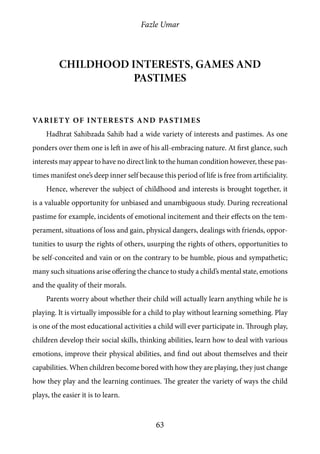
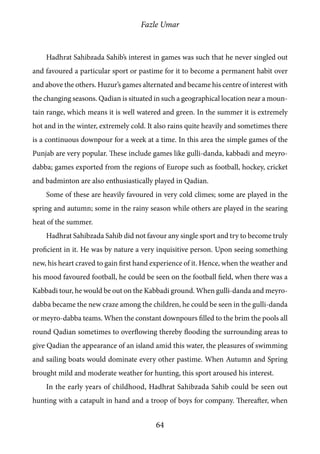
![Fazle Umar
65
he acquired an air gun he would set off to hunt with his friends in the neighbouring
villages around Qadian.
A Hunting Trip
Let us take a closer look and assess to what degree they help illuminate his per-
sonality. Since we were considering hunting, it may be appropriate to commence with
an incident related by Hadhrat Sahibzada Sahib that involved hunting:
“I remember an incident early in my childhood. There was no limit to my
astonishment, I was amazed and thought a lot about it. However, I could not
understand anything. Finally, by the Grace of Allah I understood the wisdom
that lay inside this incident. This incident is related to my hobby of shooting
small birds with an air gun. Once I set off towards a village that may have
been Nathpur. There were one or two other boys accompanying me. When I
reached there, some local Sikh youths came to us and said, ‘come we will show
you the prey.’
“Hence, they took us close to the village and pointed us to the prey. They kept
us company wherever we went. They were enjoying the hunt as much as we
were and enjoyed finding the prey as much as we were. At one time we spot-
ted a dove perched in a tree. I took aim, fired and she fell to the ground. The
Sikh boys showed as much pleasure in this as we did. In the meantime an old
woman passed from there. As soon as she spotted the dove tossing and rolling
restlessly, she started shouting. She told the Sikh youths that they ought to be
ashamed! They had become so shameless that people from neighbouring vil-
lages were coming to destroy life in their village.” [Huzur says the Sikh youths’
complexion changed from the outburst of the old lady and they told us not to
hunt there anymore]. 39](https://image.slidesharecdn.com/fazl-e-umar-160102120102/85/Fazl-e-Umar-71-320.jpg)
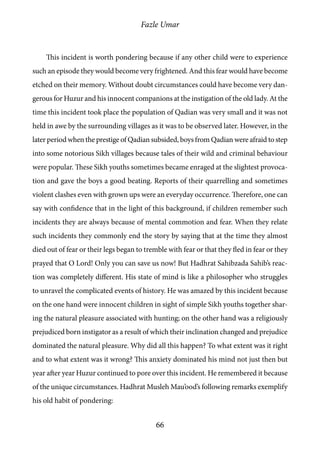
![Fazle Umar
67
“At the time there was no limit to my amazement and I was very surprised and
was thinking deeply about it but I could not make head nor tail of it. Finally,
by the grace of God, this incident was solved for me and I understood what
wisdom lay within it…”
From a young age, Hadhrat Sahibzada Sahib was an excellent shot. Hakeem Deen
Mohammad sahib [ra], who had played with Huzur in his childhood states:
“He was a very good shot with the air gun. It was so good that Huzur was able
to shoot down hornets sitting on top of mangos one by one. He would often hunt
small birds and doves. We would be with him and would proceed to slaughter
them in the name of Allah as we went along. When he was older, he took rifles
with him and everyone knows he shot wild ducks on the river Byaas.” 40
Advice on the Choice of Prey
Hunting helped him to develop in many different ways. There is a large amount of
cognitive development as one focuses greater attention on fundamentals and strategies
to hit a target. It helped him concentrate on his surroundings and it was his habit to
learn from small incidents. Hadhrat Sahibzada Sahib also learned because he was in
the habit of relating the details of the hunt to the household. Hence, where they deemed
appropriate, Hadhrat Amma Jan and the Promised Messiah [as] gave advice, which
was always full of wisdom and sagacity.
At one time Hadhrat Sahibzada Sahib went out shooting and returned with a
parrot. The general Muslim public in India and Pakistan considers the flesh of the
parrot unlawful and many scholars disapprove of eating it but do not consider it
unlawful. However, as far as the Shariah is concerned no proof can be found of it
being considered unlawful nor does it disapprove of eating it. Certainly, our dispo-
sition definitely testifies that this animal is not for consumption. Instead of delving](https://image.slidesharecdn.com/fazl-e-umar-160102120102/85/Fazl-e-Umar-73-320.jpg)
![Fazle Umar
68
into these apparent technicalities, the Promised Messiah [as] explained the matter
to Hadhrat Sahibzada Sahib in such a loving manner that not only solved the issue of
the parrot but also easily solved numerous other complicated issues. The Promised
Messiah [as] explained:
“It is flesh, so morally it is not forbidden to eat it. But God has not created all
birds for eating. Some beautiful birds are there for us to see and enjoy while
other birds are gifted by nature to delight us with their song. The parrot is one
among them.” 41
In this way the Promised Messiah [as] took a constant interest in his educa-
tion. This episode appears trifling but a child who was taught with such understand-
ing and wisdom was surely to possess subtle insight and a diverse, clear-sighted and
discriminating mind.
Horse Riding
Apart from shooting, Hadhrat Sahibzada Sahib enjoyed horse riding. He states:
“I remember just before his death, the Promised Messiah [as] bought me a
mare. In fact, it was not bought but was sent to us as a gift. The details are thus
that I saw some boys riding bicycles and I also wanted to ride one. I mentioned
this to the Promised Messiah [as]. He commented that he did not like riding
bicycles but rather considered horse riding a more manly pursuit. In that case
he ought to buy me a horse I suggested. He then stated that he liked strong and
firm horses. In all probability his intention was that I become a good rider. He
wrote to Abdul Majeed Khan sahib of Kapurthala to buy and send him a fine
horse. He wrote to Khan sahib because his father was in charge of the State
stables and his family was well acquainted with horses. Khan sahib bought a
mare and sent it as a gift. When the Promised Messiah [as] died, it was inevi-](https://image.slidesharecdn.com/fazl-e-umar-160102120102/85/Fazl-e-Umar-74-320.jpg)
![Fazle Umar
69
table that his demise would affect our expenditure. For this reason I decided to
sell this mare so that its burden of expense would not fall on my mother. One
of my friends who knew of my intentions sent a message that this mare was a
gift of the Promised Messiah [as] and it must not be sold. At the time I was
19 years of age. I remember the place where I was stood when I received the
message. At that time I was stood at the edge of the pool facing southeast from
the Tashheezul Azhan office…All of a sudden the words that emanated from
my lips were that no doubt this mare is a gift of the Promised Messiah [as]…
but I do not want to burden my mother, Hadhrat Ummul Mommineen [ra_ha]
for the sake of this mare. Therefore, I sold the mare.” 42
The reasons for presenting this incident verbatim is to give the readers the true
sense of the Promised Messiah’s [as] inclination, that he possessed the spirit of a war-
rior. For this reason he gave priority to the manly pursuit of horse riding over bicycles.
Moreover, he did not want any ordinary horse but one that was strong and firm.
Although this incident throws light upon the life of the Promised Messiah [as],
without doubt this very manly quality was also found in great measure in Hadhrat
Mirza Bashiruddin Mahmud Ahmad [ra]. As a matter of fact, the attributes we
observe after the maturation of a person’s qualities, if we go back and search for them
in the person’s childhood, this tree would appear as a small and fragile plant whose soft
and tender roots are embedded in the soft and fertile soil of these types of incidents.
The other noteworthy point is in the last part of this incident. He sold the mare despite
having such a love for horses and having kept numerous horses throughout his life in
accordance with his circumstances, despite even encouraging his children, both boys
and girls to ride horses. His love for horses in general was in its own place, but above
and beyond this the mare was special because it was a memorable gift from his dear
father, the Promised Messiah [as]. The mare was very special in view of the intense](https://image.slidesharecdn.com/fazl-e-umar-160102120102/85/Fazl-e-Umar-75-320.jpg)
![Fazle Umar
70
love that Huzur possessed for the Promised Messiah [as]. But the unambiguous sense
of responsibility, thoughtfulness and mental aptitude allowed him to place different
values at their appropriate times. These three qualities ensured that he never went to
extremes because his decisions were not based on mere emotional sentiments. It was
absolutely the correct decision to accept the sacrifice of his own sentiments but not
to pay the price of putting even the slightest burden on his mother.
His Informality, Humility & Love for Children
There are two further incidents in connection with horse riding that are interest-
ing in their own right. Allah Rakhi, was a well known old midwife, the widow of Fazl
Deen Qasaab. His family were not Ahmadis but he did render service to the Promised
Messiah [as]. Allah Rakhi presents this incident from her childhood:
“When Huzur returned home on his mare after a ride, despite the fact that we
were not Ahmadis we stood together holding hands and requested Huzur to give
us a hair or two from the mare’s tail. Huzur smiled and asked what we were
going to do with it. We replied that we would catch hornets, make aeroplanes
and fly them. Huzur teased that the mare would find this painful, it would
weep and wail and blood would be shed. He would say come let me catch the
hornets for you. Once Huzur dismounted from the mare and tied it to a tree in
front of our house. He slowly removed one or two hornets from their hive and
handed them to us. This incident was repeated many times.”
It is apparent from this incident that from a very young age Hadhrat Musleh
Mau’ood [ra] was informal, unceremonious, humble and cheerful with a natural
love for children. This is evident from the way he spoke to the little girls who from a
family perspective held the position of servants and maids. In a bid to please them he
dismounts from his ride and ties it to a tree. Above and beyond this he goes to the point](https://image.slidesharecdn.com/fazl-e-umar-160102120102/85/Fazl-e-Umar-76-320.jpg)
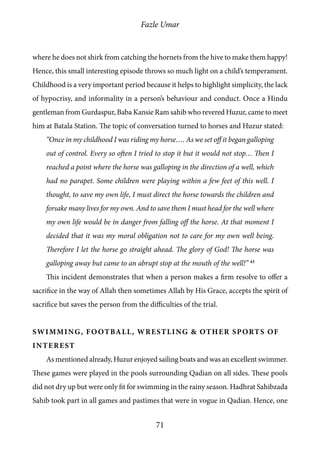
![Fazle Umar
72
of his childhood companions, Mirza Ahmad Beg states:
“When he grew up Huzur enjoyed playing football and meero-dabba. I often
had the opportunity to play football and meero-dabba with him. From the
beginning Huzur was physically weak. In this connection there is an incident
that once in a gathering where the Promised Messiah [as] was present, this
subject was broached and in all probability Hadhrat Khalifatul Masih I pre-
scribed Cod-liver oil for him.
“Huzur [ra] also learned some aspects of wrestling. He learnt these from a
young man by the name of Muhammad Hussain – children called him Baba
Fazal Hussain. Fazal Hussain was the young man’s paternal grandfather.
“Huzur ordered a small boat from Jehlum. Huzur used to take this out on the
water in the rainy season.
“Before Khilafat, Huzur played badminton at the back of Zia Al-Islam press with
Hadhrat Maulvi Sher Ali sahib [ra]. Once I also participated in the game.” 44
Reliance on Prayers as a Means of Success in Sports
About reliance on prayers by Hadhrat Sahibzada Sahib as a means to attain suc-
cess in every endeavour Mirza Ahmed Beg states: “in this connection a statement by
the editor of ‘Al-Hakam’ is worthy of note:
“It is worth noting that children at one stage are very keen on watching sports.
Often we observe that children, neglecting that which may benefit them, thereby
suffering loss, travel long distances to watch such displays. However, I am cer-
tainly aware of some other boys who are students of Madrassa Ta’limul Islam.
They can be found, away from the playing field, weeping and wailing before
their Lord in some quiet corner upon seeing the weakness of their own team and
the strength of the opposition. This is not a small thing that may be overlooked.](https://image.slidesharecdn.com/fazl-e-umar-160102120102/85/Fazl-e-Umar-78-320.jpg)
![Fazle Umar
73
A ponderous soul can conclude as to what these children believed to be the key
to their success. From this one can contemplate their heart’s desire and belief,
which was a result of the high level of education and training they had received…
“Somehow or other the game reached halftime with the scores level. There was a
five minute break, or for some, a chance to pray. The match commenced again
and everyone played his heart out to try and win. The Glory of God! About 15
to 20 minutes into the second half, Ta’limul Islam School Qadian Football Team
scored a goal against the Khalsa Collegiate. There was no doubt about the goal
and everyone accepted it without a murmur. Allaho Akbar! The minute the goal
was scored, all the boys no matter where they were stood and whatever direction
they were facing collectively fell into prostration with the words Allaho Akbar!
The Ahmadiyya Community present all fell into prostration to show their grati-
tude to God for this favour. Upon seeing this all the other Muslims also followed
suit and fell into prostration. It was a strange sight and a strange atmosphere!
Those present were deeply moved for instead of celebrating the goal with cheers
and hoorrahs, instead of shouting and jumping, all fell to the ground to praise
their Lord. Everyone was moved by this spectacle and everyone praised it.
At this stage I cannot keep myself from bringing to light an amazing fact, which is
second nature in the education of the Ahmadiyya Community. However, because
of the circumstances and the time in which this took place it is worthy of praise.
Hadhrat Sahibzada Mirza Bashiruddin Mahmud Ahmad sahib [ra] who was
a player in this game, rose from prostration and said, ‘I have only made the
supplication, ghairil maghdubi ’alaihim (guide us along the path of those who
have not incurred displeasure, The Holy Qur’an 1:7). The minute he said this I
understood the whole import of it and the full philosophy of the prayer dawned
on me. And I greatly admired Hadhrat Sahibzada Sahib’s discernment, sagacity](https://image.slidesharecdn.com/fazl-e-umar-160102120102/85/Fazl-e-Umar-79-320.jpg)
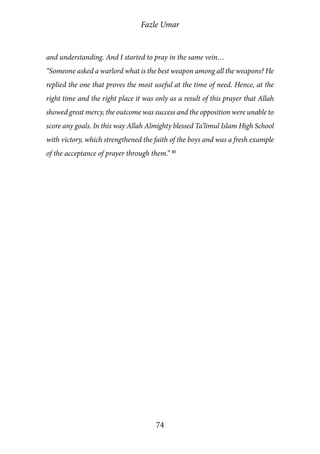
![Fazle Umar
75
Circle of contacts
In his childhood days his relationships extended to friends, brothers and sisters,
teachers, with his revered mother and father, and also extended to the Imam of Imams
Hadhrat Muhammad Mustafa [saw]. There was no opportunity to have direct
contact with opponents because circumstances never arose to bring about such an
encounter. His treatment of children younger than him has been glimpsed in the small
incident involving his horse. It demonstrated his bid to please the poor little girls who
requested hair from the horse’s tail.
Some of the impressions of his childhood friends have been given here and there
and no doubt some will be related in the future. However, a study of how he treated his
own brothers and sisters and their developing impressions of him is quite revealing.
Impressions of His Sister Hadhrat Mubaraka [ra_ha]
It is fortunate that Hadhrat Nawab Mubaraka Begum sahiba [ra_ha] who was
his younger sister, by the Grace of Allah has captured her memories of childhood in
print. She states:
“I heard Hadhrat Ummul Momineen [ra_ha] (Hadhrat Amma Jan, mother of
Hadhrat Sahibzada Sahib) relate a dream several times. She stated, ‘When your
older brother was about to be born I saw in a dream that I was being wed to
Mirza Nizam Din. This dream had a terrible affect on my heart because of Mirza
Nizam Din’s staunch opposition. Why did I see my wedding with an enemy? I
remained sorrowful for three days and wept quite frequently. I did not mention
this to your father, the Promised Messiah [as]. But upon his persistence to
know what was wrong and what pain I was suffering, I hesitantly related the](https://image.slidesharecdn.com/fazl-e-umar-160102120102/85/Fazl-e-Umar-81-320.jpg)
![Fazle Umar
76
dream to him. The Promised Messiah [as] became ecstatic upon hearing it and
said you had such a blessed dream and kept it hidden from me all this time! You
shall have a boy from this very pregnancy; concentrate upon the name Nizam
Din. Its meaning is not this Mirza Nizam Din, you have suffered for so many
days and you did not relate this good news to me.
“Hadhrat Sahibzada Sahib loved and cared a great deal for his brothers and
sisters. He particularly loved me a great deal. He bore my whims and caprices.
I never remember him being displeased and angry.
“From the very beginning he was always very informal with me. He could
always tell me everything and I was the same with him. I was very open with the
Promised Messiah [as] and with my older brother, Hadhrat Musleh Mau’ood
[ra]. The Promised Messiah [as] also knew that there was greater love and
informality between us so on three or four occasions he said Mahmud is very
reserved in speech, he never declares his requirements nor does he ask for any-
thing. Ask him what he wants. I asked him and he told me. Once he requested
the complete set of Bukhari. On another occasion he wanted to subscribe to
a newspaper. Once his sister-in-law had gone to Lahore. He said ‘I do not like
her being gone for long to Lahore, call her back.’”
First Marriage to Hadhrat Rashida Begum
The Promised Messiah [as] preferred to get his sons married as soon as they
came of age. Hence, Hadhrat Sahibzada Mirza Bashiruddin Mahmud Ahmad sahib
was thirteen years of age in 1902 when he requested one of his disciples, Dr Khalifa
Rashid Uddin [ra] to ponder over the idea of the engagement of his oldest daughter
Rashida Begum (who Hadhrat Amma Jan named Mahmuda Begum and who later
became popularly known as Hadhrat Umme Nasir) to Hadhrat Sahibzada Sahib. The](https://image.slidesharecdn.com/fazl-e-umar-160102120102/85/Fazl-e-Umar-82-320.jpg)
![Fazle Umar
77
Promised Messiah [as] wrote the following to Dr. Rashid Uddin sahib in connec-
tion with this:
“Mahmud appears to be happy over this engagement and although I have not
received any revelation concerning this, however it is my wish to have some
knowledge concerning it so that none of our actions are contrary to Divine
Will. However, Mahmud’s willingness is a proof that God Almighty, inshallah,
overwhelmingly approves this matter. Therefore, I am informing you that if this
be the Will of God Almighty and it meets no opposition in defence of which
all intentions become null and void, so in this circumstance with this in mind
please remain ready and prepared so that when you are formally approached
for Nikah in writing offer Istikhara prayers for a couple of weeks as whatever is
done by Istikhara and according to the Will of Allah is always blessed.
“Secondly, it is my intention that everything is done according to the practice
of our beloved Prophet [saw]. There should be no innovation and frivolous
expenditure and foolish customs in this Nikah. On the contrary, it should
be conducted in such a straight forward and simple blessed manner as to be
approved by the Holy Prophets of Allah.” 46
Respected Dr. Rashid Uddin sahib’s relatives who were non-Ahmadis opposed
this engagement but despite this Doctor sahib showed his willingness for this blessed
union. In those days Doctor sahib was stationed in District Saharanpur (UP). The
Nikah ceremony was held there. Hence, Sahibzada Mirza Mahmud Ahmad sahib,
Hadhrat Maulvi Nooruddin sahib [ra], Hadhrat Mir Nasir Nawab sahib [ra],
Hadhrat Mir Mohammad Ismail sahib [ra] along with a couple of other revered
elders and friends reached there on the night of 2 October 1902. They were received at
the station by Doctor sahib along with his many friends. Hadhrat Maulvi Nooruddin
sahib [ra] performed the Nikah and the Haq Mehr was set at Rs.1000. On 5 October](https://image.slidesharecdn.com/fazl-e-umar-160102120102/85/Fazl-e-Umar-83-320.jpg)
![Fazle Umar
78
1902 after the Asr prayers the party returned safely to Qadian. After Maghrib prayers
Hadhrat Maulvi Nooruddin sahib [ra] congratulated the Promised Messiah [as]
upon the Nikah and praised the sincerity of Doctor sahib. Huzur [as] expressing
his pleasure stated that Allah Almighty had blessed Doctor sahib with great sincerity,
possessing great aptitude, wisdom and the light of perception. 47
The Rukhstana ceremony was held in the second week of October 1903 in Agra.
In those days Dr. Rashid Uddin sahib was a professor in the Agra Medical College.
The wedding entourage returned to Qadian on 11 October 1903. The next day Huzur
[as] distributed sweets in celebration of this event. 48
From Bombay, Seth Muhammad Ismail Adam sahib [ra] despatched a gift of
a cap and a shawl on the occasion of the wedding. The Promised Messiah [as] sent
a thank you letter to respected Seth Muhammad Ismail Adam sahib [ra] in which
he stated:
“Your gift that you despatched with love and sincerity for my beloved sons
Mahmud and Bashir on the occasion of their wedding namely a cap and shawl
have been received. I am most grateful for this gift and pray for you that Allah
Almighty reward you for this in spiritual and worldly terms. Ameen.” 49
In 1906, Allah Almighty blessed Hadhrat Sahibzada Sahib with his first child who
was named Naseer Ahmad. Sahibzada Mirza Naseer Ahmad died in childhood and
was buried in Lahore. 50
In November 1909 another boy, Sahibzada Mirza Nasir Ahmad was born. Allah
Almighty had already given Hadhrat Sahibzada Sahib [ra] the glad tidings that this
birth would be blessed. Hence, he stated in one of his letters of 26 September 1909:
“I have also been given the glad tiding by God Almighty that I will bless you
with such a son who will be a helper (Nasir) of the faith and shall be ever ready
to serve the cause of Islam. 51](https://image.slidesharecdn.com/fazl-e-umar-160102120102/85/Fazl-e-Umar-84-320.jpg)
![Fazle Umar
79
This glad tiding was fulfilled in full splendour fifty–four years after this vision,
in 1965 when Hadhrat Sahibzada Mirza Nasir Ahmad sahib [ra] was elected to the
office of Khilafat.](https://image.slidesharecdn.com/fazl-e-umar-160102120102/85/Fazl-e-Umar-85-320.jpg)
![Fazle Umar
80
Belief in the truth of his father and its
consequences
There were many factors helping to establish the path Hadhrat Mirza Bashiruddin
Mahmud Ahmad’s [ra] life would take. Some were visible and some were hidden;
some were specific while others were general. There are certain general factors that
have a definite effect on building the child’s personality. We will examine a very criti-
cal factor, which played an unforgettably important part in building his personality.
When a child is born its mind is almost like a clean slate on which very little
has yet been written. Children usually cannot dictate the choices their parents make.
As they grow up, it is the choices made by the parents and others around them that,
increasingly and progressively, differentiates them from their fellows; in this process,
a ‘personality’ emerges and we begin to take on responsibility for our actions.
A potter moulds a vase from clay on his turning wheel. At the beginning of the
process, he has a shapeless lump of clay. During the creative act he fashions a recog-
nisable image by giving it form. When it has form it has identity, it has a ‘self’.
Once a strong sense of self has developed during the later years of childhood and
teens, the new and mostly unimportant day-to-day experiences of life usually serve to
reinforce or at worse only slightly modify the status quo structure of the personality.
Unless the child is a simpleton, a mother or father cannot hide his or her personal-
ity and inner leanings from the child no matter how tightly they wrap them in deceit
and deception. This plays the most prominent part in establishing the direction of a
child’s thoughts by creating and developing the features of his inner self. The fact that
the picture of the psyche of the mother and father is gradually painted on the child’s
heart and mind is absolute and cannot be refuted. As a result of this, psychological](https://image.slidesharecdn.com/fazl-e-umar-160102120102/85/Fazl-e-Umar-86-320.jpg)
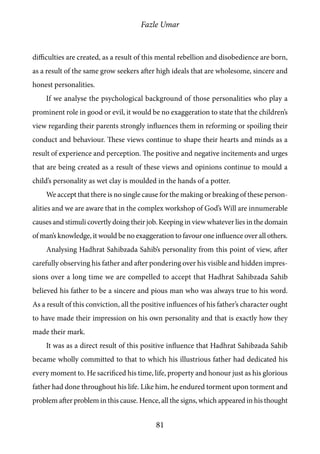
![Fazle Umar
82
and actions, could not have appeared unless he had full conviction and perfect faith.
First Incident: Does Hadhrat Gabriel Still Descend
It is true that different narrators as well as writers, who were childhood friends,
have presented various accounts from different periods of his life. However, they were
not in contact with Hadhrat Mirza Mahmud Ahmad sahib [ra] throughout his early
life nor could their memories manifest everything anew. To overcome this deficiency
we have relied on Hadhrat Mirza Mahmud Ahmad sahib’s [ra] own testimonies
made in connection with various issues during his adult life. There is no question of
anyone who possesses insight and perception raising doubt over the incidents because
they testify to their own truth. Two incidents are presented below as examples. One
is a small and simple incident maybe from early childhood, the other when he was
in his prime.
The first incident is prominent for its simplicity; it is an innocent account free from
any artificiality. The second is significant because it relates to a dangerous, unexpected
incident and the spontaneous and inimitable actions of Hadhrat Mirza Mahmud
Ahmad sahib [ra]. Even more thought provoking are his thoughts regarding the
event. The first incident is as follows:
“When I was about nine or ten years of age, I was playing at home with a fellow
student. There was a book lying in the cupboard wrapped in a green cloth (similar
to the way the Holy Qur’an is sometimes wrapped). It was from the time of our
paternal grandfather…. When I read this book, it stated that Gabriel (Arch angel)
no longer descends. I said that this was wrong because he descends on my father.
The boy stated that he does not descend as it is written in the book. We had an
argument.IntheendwewenttoHuzur(thePromisedMessiah)andbothpresented
our cases. He stated the book is incorrect, Gabriel still descends.” 52](https://image.slidesharecdn.com/fazl-e-umar-160102120102/85/Fazl-e-Umar-88-320.jpg)
![Fazle Umar
83
Second Incident: Efforts to Protect the Promised
Messiah [as] from Lightning
The second incident is presented below:
“From the archive of foolish incidents I remember my silly incident. Many
times I have laughed upon recalling this incident and sometimes my eyes have
also filled with tears. However, I look upon it with great reverence. And from
the incidents of my life that fill me with pride there is one among them that is
foolish. That incident took place one night in the time of the Promised Messiah
[as] when we were all sleeping in the courtyard. It was summertime and rain
clouds suddenly appeared in the night sky accompanied by roaring thunder.
During this, lightning fell somewhere close to Qadian. However, its blast was so
loud that every household in Qadian thought this lightning might have struck
their house….Owing to the blast and some rainstorms everyone went into their
rooms. When the lightning struck, those of us sleeping in the courtyard also
got up and went inside. I remember that scene to this day. When the Promised
Messiah [as] was going to go inside, I covered his head with both my hands.
So that if lightning struck it would strike me, not him. Later when I returned
to my senses, I laughed at my actions. It was because of him that we were to
be saved from the lightning not that he could be protected by us! I think that
action of mine was no less than the act of a madman. However, I am always
happy because this action made manifest to me my love for the Promised Mes-
siah [as]. Sometimes a person is unaware of how much he loves someone.
When this type of incident occurs, he can estimate how deep and profound his
love is. So when the feelings of extreme love are roused the intellect fails at that
time. Love tosses wisdom to one side; love rejects all fear. And it comes to the
fore by itself.” 53](https://image.slidesharecdn.com/fazl-e-umar-160102120102/85/Fazl-e-Umar-89-320.jpg)
![Fazle Umar
84
Reading this incident along with his comments one is left in no doubt about
Hadhrat Sahibzada Sahib’s deep and strong belief in the truth of his father. His deep
love for the Promised Messiah [as] and his magnificence were indelibly etched
onto his heart. One is hard pressed to find its equal. Although children naturally love
their parents and some children are aware of their parents’ magnificence but for such
powerful feelings of extreme love, glorification and magnificence to be portrayed all
at once is not an everyday occurrence in human experience.
Great Passion for Prayer & Worship
The outcome of this faith and love was that he too started to walk in those footsteps
with full sincerity, which the Promised Messiah [as] deemed as a prerequisite for the
victory of Islam. He dedicated all his strength and vigour from his childhood to this
cause. Compared with secular knowledge, he had a distinct inclination towards the
attainment of religious knowledge that was born out of this belief. However, as far as
the Promised Messiah’s [as] personal involvement is concerned, he was unable to
give time to any of his children because of his very busy schedule. The second deep
effect of this faith became apparent in his worship where right from a young age he
developed great fervour for prayer and worship. From childhood he was in the habit
of waking in the middle of the night for prayers. It is clear from many accounts that
apart from the five daily prayers, he also took upon himself Tahajjud prayers (voluntary
prayers before Fajr). His prayers were not for show, offered like an empty ritual but
were offered with fear and humility, bearing a depth of feeling and intensity.
For a child or youth to shed tears in prayers and fall prostrate for a long time is
a cause of amazement for adults, especially at a time when the child has not suffered
any misfortune or injury and there is no reason for discontentment. This amazement
increases and questions are raised. What has come over this child that he gets up](https://image.slidesharecdn.com/fazl-e-umar-160102120102/85/Fazl-e-Umar-90-320.jpg)
![Fazle Umar
85
unseen in the middle of the night, weeping bitterly and wetting the prayer mat with
his innocent tears!
Sheikh Ghulam Ahmad sahib Wa’az [ra] was also amazed. He had just con-
verted to Islam at the hands of the Promised Messiah [as]. He progressed in faith and
sincerity to such a degree that he was considered among those people who are godly,
devout and recipients of visions and revelations. He used to relate:
“Once I resolved to spend the night in the Mubarak Mosque and in solitude
I shall ask for whatever my heart desires. But what do I see when I reach the
mosque. Someone is lying prostrate and praying with imploration. I could not
offer my prayer because of his beseeching and was quite moved by his supplica-
tion. And I too became engrossed in prayer. I prayed that O Allah! Please grant
this man whatever he is requesting from You. And I became tired from standing
and waiting for this man to lift his head so that I could see who it was. I cannot
say how long he had been there before I arrived. But when he lifted his head,
what do I see! It was Mian Mahmud Ahmad sahib. I said ‘peace be upon you’,
shook his hand and asked, ‘Mian! What have you acquired from Allah today?’
He replied that I have only asked that O Lord! Please revive Islam in front of
my very eyes. And upon saying this he went inside.” 54
This anxious wish at that young age to witness the victory of Islam also began to
bear fruit in his youth. It seems that Allah viewed his pure supplications rising from
his innocent heart with mercy and kindness and Himself made arrangements to con-
sole him. This consolation was given through true dreams, visions and revelations.
Dreams, Visions & Revelations from a Young Age
Hadhrat Syed Sarwar Shah sahib [ra] was an outstanding companion of the
Promised Messiah [as] and a brilliant scholar, whose reputation for knowledge and](https://image.slidesharecdn.com/fazl-e-umar-160102120102/85/Fazl-e-Umar-91-320.jpg)
![Fazle Umar
86
excellence had spread far and wide. He was one of the teachers of Hadhrat Sahibzada
Sahib. He states:
“Hadhrat Khalifatul Masih II [ra] was taught by me and so one day I asked
him, Mian! Your father receives revelation in abundance. Do you receive
revelation and dreams etc.? Mian sahib replied: Maulvi sahib! I have many
dreams and there is one dream I see nearly every day. From the moment my
head touches the pillow to the moment I wake up in the morning I dream that
there I am leading an army. And sometimes I see us crossing oceans to fight
an adversary. And many times it has happened that if I have nothing to make
the crossing with, I make a boat out of reeds etc. and with it make the crossing
to attack the enemy. When I heard this dream from him, the thing imprinted
on my heart since then was that this man will lead the Jama’at (Ahmadiyya
Community) some time in the future. From then on I stopped teaching him
while sitting in the classroom. I would sit him in my chair while I sat in his
place and began to teach him. Upon hearing the dream I also requested him
that Mian! Please do not forget me when you get older, please keep me in your
loving sight.” 55
On the subject of receiving revelation in his childhood, one of his old playmates
states:
“Maybe this fact has been recorded or has been printed somewhere, but I feel
it important to mention that when he was studying with me in the Ta’limul
Islam school, he stated that he had received the following verse in revelation:
‘I will place those who follow thee above those who disbelieve until the Day of
Resurection’.
“And he also stated that he had mentioned it to the Promised Messiah [as]
that I have received this revelation.” 56](https://image.slidesharecdn.com/fazl-e-umar-160102120102/85/Fazl-e-Umar-92-320.jpg)
![Fazle Umar
87
In his young days he had the honour of receiving visions. Hence, during a Friday
Sermon in which he launched a scheme to raise funds for the building of the London
Mosque, elaborating on this vision he stated:
“To this day I have received visions about three important affairs. Firstly, it was
during my childhood days. At that time my attention was diverted towards
learning about religion and serving the faith. At that time I saw God and I was
shown the entire scene of the resurrection. This was a great change in my life.” 57
It seems that the Promised Messiah [as]himself felt that his connection with God
Almighty had begun already in his young days. Hence, Hadhrat Mirza Bashiruddin
Mahmud Ahmad sahib [ra] himself states:
“In the days during the Clark case, the Promised Messiah [as] requested people
for prayers and he also requested me to pray and do Istikhara. At that time I saw
in a vision that there are guards surrounding our house. I entered the house by
the steps where there used to be a basement. I saw that they made Huzur stand
and in front of him they raised a screen of dung cakes over which they poured
petrol and are trying to set it alight. But as they strike the matches it does not
light. They try it time and again but are unsuccessful. I became very worried
at this spectacle. However, when I looked towards the doorsill it was written:
‘No fire can burn the men of God.’” 58](https://image.slidesharecdn.com/fazl-e-umar-160102120102/85/Fazl-e-Umar-93-320.jpg)
![Fazle Umar
88
Ever–growing faith in the Promised
Messiah [as]
A picture of the atmosphere and environment in which Hadhrat Mirza Bashirud-
din Mahmud Ahmad [ra]spent his childhood has been outlined briefly. He observed
his father from two contrary and opposing points of view. On the one side was the
enmity of abundant enemies and bitter foes, on the other was an ever-growing loving
and devoted Community armed with conviction and unshakeable belief that gathered
around him like moths enticed to a flame.
From one point of view, in the eyes of the world he had not only incurred their
displeasure and wrath but was also subject to God Almighty’s wrath and hatred. From
another angle he was a beloved Messenger of Allah who was bestowed a godly com-
munity of saintly men and women, forever ready to lay down their lives in his cause.
Let us consider which of these two opposing views became prominent in his
mind. Which one did he consider to be based on absolute fact and which one did
he consider from an unbiased view to be a fabrication. This decision was not very
difficult for him. He witnessed a few weak human beings that surrounded him grow
into a large, strong, pressing crowd of hundreds of thousands who claimed Allah was
fully supporting them. But every time the enemies tried to wipe Hadhrat Mirza sahib
[as] and his handful of companions off the face of the earth they failed miserably. To
say what of annihilation, they did not even have the power to bring the slightest grief
and uneasiness upon this Community. On the contrary, after every assault and every
incursion, the power of Hadhrat Mirza sahib [as] and his followers, both in number
and quantity grew stronger than ever. And every time after his father had dispersed
the marshalled troops of the enemy in clouds of dust, he witnessed this apparently](https://image.slidesharecdn.com/fazl-e-umar-160102120102/85/Fazl-e-Umar-94-320.jpg)
![Fazle Umar
89
weak and powerless Community gleaming on the highest rank of eminence and
distinction. One after the other in quick succession Hadhrat Sahibzada Sahib saw his
father’s enemies depart from this world with the regret of ruin. Whether it was Maulvi
Muhammad Hussain of Batala, or Dowie, or Lekh Ram, one after the other they all
claimed to bring him low in defeat. Each stood up claiming to have the help of God
Almighty. One after the other, bearing the failure of his efforts and unaccepted prayers,
each adversary was ejected from this great arena of religious contest. Each one was out-
rivalled and thrown into the shade while Hadhrat Mirza sahib [as] basked in glory.
Then came the day when Hadhrat Mirza sahib [as] had to appear before his
Lord. He had been blessed with an organisation, which was growing, progressing,
spreading, blooming and blossoming day by day into a ripe Community that was
unfamiliar with decline or decay. With high spirits and courage reaching for the stars
it only knew how to move forward. Hadhrat Sahibzada Mirza Mahmud Ahmad sahib
witnessed this day. This was the day eleven years after the death of Pundit Lekh Ram
who having died without any offspring, had prophesied its ruin and destruction. Who
was God with and whom did He oppose? Could this question have been difficult for
this intelligent young man or for any right-minded perceptive person?
In the face of this severe religious opposition God Almighty’s complete and undy-
ing support left a strong, firm and unshakeable belief of the truth of his father on the
heart and soul of Hadhrat Sahibzada Sahib [ra] that no power, no storm and no
earthquake could shake. Therefore, standing at the head of his father’s sacred corpse,
he moulded his lava of emotion into a strong determination and made a historic
resolution that was also well connected with history! This was a great promise that he
bound with the ropes of commitment to the rest of his life. And with a special power,
a special feeling and with a strong longing desire, he moved it in a particular direction
on a particular path forever and ever.](https://image.slidesharecdn.com/fazl-e-umar-160102120102/85/Fazl-e-Umar-95-320.jpg)
![Fazle Umar
90
The death and burial of the Promised
Messiah [as]
The blessed early period of Hadhrat Mirza Bashiruddin Mahmud Ahmad’s [ra]
training came to an end with the demise of the Promised Messiah [as]. He stepped
into a new phase in which he faced many trials to test his pledge. However, before we
undertake a deeper analysis of this phase, it seems necessary to mention some major
occurrences at the demise of the Promised Messiah [as]. A cursory glance over this
historic event will not quench the thirst of the reader nor of the writer.
The Promised Messiah [as] laid the foundations of the Ahmadiyya Muslim
Community in 1889 for the revival of Islam. According to his proclamation, this was
not a human movement but according to the Will of Heaven, that movement whose
glad tidings were given by Hadhrat Muhammad Mustafa [saw] sometimes as the
descent of Hadhrat Masih [as] (Messiah) and sometimes as the appearance of the
Mahdi. This organisation as has become apparent, grew from a very weak state when
only a handful of righteous people from the whole of India became initiated at the
hand of the Promised Messiah [as]. It was a very vulnerable period in the history
of the Movement. In comparison the opponents collectively enjoyed such power and
dominance which they never attained again.
We shall briefly consider whether the repeated attacks and onslaught of the
enemies increased the weakness of this Community or on the contrary increased its
strength.
The Promised Messiah [as] died in Lahore on 26 May 1908. He undertook this
journey to Lahore for religious reasons and to spread the message of Ahmadiyyat.
Prior to this journey Allah Almighty repeatedly informed him of his impending death.](https://image.slidesharecdn.com/fazl-e-umar-160102120102/85/Fazl-e-Umar-96-320.jpg)
![Fazle Umar
91
However, because of overwhelming love for him, his followers could not imagine that
their spiritual father was to scar them with his imminent departure.
The time of his death was approaching and the Promised Messiah [as] received
revelations about it one of which was (in Arabic):
“The time of departure will be faced during a journey.” 59
As a result of such clear revelations or maybe because of his love and deep spiritual
attachment, Hadhrat Sahibzada Mirza Bashiruddin Mahmud Ahmad [ra] became
anxious during this trip. He became uneasy, irritable and downhearted as is apparent
from the following remarks:
“Prior to the death of Huzur [as], every evening, Malik Mubarak Ali Tajir
sahib visited the house where Huzur [as] was staying. And when Huzur
[as] started out on his daily outing, he would follow in his horse drawn car-
riage. I used to join them while riding my mare that was procured for me by
Huzur [as] and conversed with him as I rode along the carriage. But on the
night when his illness deepened and he was to die the next day, my heart felt
somewhat heavy. I did not ride my mare for this reason. Malik sahib asked me
to join him in his carriage. Hence, I sat with him but as I sat my heart fell into
deep despair and involuntarily I uttered this line of poem:
‘We will be content with whatever is Your Will.’ 60
“Malik sahib tried to engage me in conversation. I replied to him now and then
between pondering this line of poem. He fell seriously ill during that night and
died in the morning. It was a Divine decree, which prepared me before time to
cope with this unbearable loss.” 61
Besides this, when he went to his in-laws’ house to collect his wife, Hadhrat Umme
Nasir [ra], he was overwhelmed with the same fear that the Promised Messiah [as]
may pass away in his wife’s absence.](https://image.slidesharecdn.com/fazl-e-umar-160102120102/85/Fazl-e-Umar-97-320.jpg)
![Fazle Umar
92
Anyhow, the Promised Messiah [as] died exactly according to the revelations
during his journey when he was staying in Lahore at the house of Dr. Muhammad
Hussain Shah sahib.
Despite the above mentioned expectation, this death was sudden and unexpected
for his relations and strangers alike. The news of his demise fell like a lightning bolt for
his friends and followers. His Community was deeply saddened by this news. One is
hard pressed to find its match in any worldly relationship. The death of mothers and
fathers, sons and daughters are soul wrenching but onlookers state that the anguish
portrayed by his followers at his departure, they had never seen its equal in any worldly
relationship. Prominent with this sadness was anxiety and questions were arising in
many minds as to what will now happen and what will become of the Community.
Contrary to this there was much rejoicing in the opponents’ camp and the ordi-
nary simple people, misled by the Mullahs, imagined that a great enemy of Islam has
died and they thronged the streets. They clapped, chanted and danced to celebrate
his death as a great festival.
Their happiness just like the sadness of his friends was twofold because not only
did the enemies perceive the death of the Promised Messiah [as] but also waited
hopefully for the early collapse of the Community and its funeral procession within
days of his death.
The State of the Community after the death of
the Promised Messiah [as]
Visitors to Qadian & the spread of Ahmadiyyat
What was the state of the Community at this stage of its short history? The Com-
munity was established at Ludhiana, in March 1889 when only forty people took the](https://image.slidesharecdn.com/fazl-e-umar-160102120102/85/Fazl-e-Umar-98-320.jpg)
![Fazle Umar
93
covenant of allegiance to the Promised Messiah [as]. At the time of his death, this
number had grown not in hundreds or thousands but into hundreds of thousands of
devoted adherents. At times the rich and the poor, the high and the low joined the
Movement in such numbers that the courier of the completed initiation forms could
not carry the bundles at one time. He had to make two or three trips to deliver the
sack loads of forms to the Promised Messiah [as]!
Day by day the number of pilgrims increased ultimately leading to the creation
of a guesthouse and hospitality centre. Numerous guests resided here on their arrival
from many lands to meet the Promised Messiah [as], though Qadian was still an
isolated village, which could be reached only along a rutted dirt track after leaving
the town of Batala. In those days travellers could make the 12-mile trip from Batala
to Qadian by a cart drawn by oxen and the journey was slow, dusty, uncomfortable
and occupied most of a day.62
When transport was unavailable, the pilgrims preferred
to walk to Qadian in their eagerness to meet the Promised Messiah [as] instead of
waiting in Batala.
The trickle of people coming to Qadian to listen to him became a flood. This
caused such worry and anxiety for his opponents that whenever the opportunity arose,
Maulvi Muhammad Hussain of Batala made it his habit to deter visitors to Qadian as
they arrived at the Batala Railway Station. Nevertheless, the influx of pilgrims eager to
meet the Promised Messiah [as] continued to grow and no opposition could deter the
crowds of people, some days numbering a hundred people, from having access to him.
In this regard it is worth mentioning a convert’s testimony who gave this very
reason for his conversion that it was being a witness to this support of Allah Almighty
of Hadhrat Mirza sahib [as] that he came to believe in him. On the one hand was
Maulvi Muhammad Hussain who had worn out many pairs of shoes deterring people
from the pilgrimage to the Promised Messiah [as]. On the other hand people had](https://image.slidesharecdn.com/fazl-e-umar-160102120102/85/Fazl-e-Umar-99-320.jpg)
![Fazle Umar
94
worn out many pairs of shoes pounding the streets of Qadian untiringly in the service
of the Promised Messiah [as].
The numbers kept on increasing day by day so much so that the Divine prophecy
vouchsafed to the Promised Messiah [as] through revelation many years ago that
the road to Qadian would be worn into ruts by the people coming to see him was
fulfilled literally. 63
The multitudes of visitors were not limited to the Punjab. They came from the
north and the south, from the east and the west, in fact they hailed from every corner
of India to present themselves before the Promised Messiah [as]. This was not lim-
ited to the borders of India. Even the distant inhabitants of the Middle East, Europe
and America began to appear in this unknown little village. Referring to these vast
multitudes the Promised Messiah [as] says in one of his poems:
I was resourceless, helpless,
Unknown, without expertise
No one knew where Qadian stood
None had a cause
To turn towards me
Few were aware that I lived
Now you see
How the world
Has turned towards me
Qadian has now become
The focal point
For the chosen people of God.
Before his demise a branch of the Movement had been established in every nook
and corner of India. People had believed in the truth of his claim even in the far](https://image.slidesharecdn.com/fazl-e-umar-160102120102/85/Fazl-e-Umar-100-320.jpg)
![Fazle Umar
95
reaches of Southern India. In certain Arab countries they believed him to be an Apostle
commissioned by God. A community of his followers had also been established in
America. And on the rocky land of Afghanistan not only had there been a community
established, but some of his most devoted followers had put an indelible stamp on the
truth of his claim and the sincerity of their faith.
Religious school & college, publications, donations & Wasiyyat
The Promised Messiah [as] had established the organisation along strong lines
thereby catering for the varied affairs of the Movement. A religious Madrassa and the
Ta’limul Islam School had been started for the education of children up to the age
of 18. A guesthouse had been erected where 50 to 60 volunteers cooked and cleaned
for the guests and for the 150 boys who were now enrolled in the school. Numerous
newspapers and journals were being published and a financial institution had been
established to collect and manage donations helping implement the grand objectives
of the organisation. Under this financial scheme every member of the Community
was expected to set aside a certain amount of his income and regularly contribute to
aid the propagation of the message of Islam.
Apart from financial sacrifices, members were also encouraged to dedicate their
lives for the propagation of the message of Islam. Hence, many blessed souls presented
themselves in Qadian in response to this call.
Another revolutionary institution left behind by the Promised Messiah [as] for
his Movement was the institution of Wasiyyat. God Almighty showed him a plot of
land in a vision that was called Bahishti Maqbara. It was shown to him that it con-
tained the graves of such select members of his Community who were destined to be
in heaven. Such of his righteous and pure followers were to be buried there whose
faith was perfect. For the worldwide propagation of Islam they would demonstrate](https://image.slidesharecdn.com/fazl-e-umar-160102120102/85/Fazl-e-Umar-101-320.jpg)
![Fazle Umar
96
the spirit of sacrifice by contributing at least one tenth of their income in the service
of their faith. They should make a testamentary disposition that one tenth of their
property after their death shall, under direction of the Movement, be devoted to the
propagation of Islam, and carrying out the teachings of the Holy Qur’an. Hence, in
fulfilment of this divine wish the Promised Messiah [as] laid the foundations for
the institution of Wasiyyat.
All these aspects reflected great expectations and in this tender blossoming plant
every perceptive mind could see the twinkling of an extraordinary fruit-bearing tree.
Another comforting aspect from the viewpoint of the Movement was that the Promised
Son, whose progress was connected to the progress of Ahmadiyyat and Islam, was
alive, safe and well. Having received the proper training, he was set on a predestined
path of high aims and objectives.
When the Promised Messiah [as] died, Ahmadiyyat was passing through this
difficult phase. According to the demands of nature most if not all of the devout fol-
lowers, as a result of this sudden blow, were feeling nervous, out of heart and downcast.
After the separation from this extraordinary heavenly mortal what was to become of
the Movement he nurtured under his wing. This was the time when a new lease of life
ran through the vile expectations of the opponents of the Community. However, with
deeper reflection it became self-evident that even though the sentiments of the two
camps were poles apart, both concluded that as long as Hadhrat Mirza sahib [as] was
alive his mission could not receive the slightest injury because of his great leadership
and guidance. However, after his death his enemies could harm the Movement and
create dangers for his friends.
In contrast to the vulgar delights of the mob who danced outside his house on
news of his death, the worldwide obituaries by friends and foes painted a different
picture of Hadhrat Mirza Ghulam Ahmad, the Promised Messiah and Mahdi [as].](https://image.slidesharecdn.com/fazl-e-umar-160102120102/85/Fazl-e-Umar-102-320.jpg)
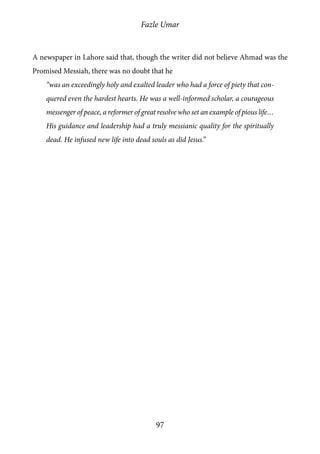
![Fazle Umar
98
Historic pledge of Hadhrat Sahibzada
Mirza Mahmud Ahmad
After the burial of the Promised Messiah [as], Hadhrat Sahibzada Sahib returned
to his empty house with dignified patience and resolve, that house which had become
empty of his beloved father and holy Imam, in which there was no religious leader-
ship to inherit neither were there worldly goods and provisions or the luxuries of life.
However, his revered mother told her sons and daughter that in actual fact this house
was not empty. Hadhrat Amma Jan [ra] (mother of Hadhrat Sahibzada Sahib) said:
“Children! Looking at the empty house, do not imagine that your father has left
you nothing. He has laid up for you a great treasure of prayers in Heaven which
will continue to yield its beneficence to you all in time to come.” 64
Hence, the testament of time following that day is the history of the distribution
of that vast treasure which descended in the form of God’s Grace particularly upon
this young man and upon his brothers and sister according to their capacity.
A new phase began in the life of Sahibzada Mirza Bashiruddin Mahmud Ahmad
sahib. It was the beginning of the journey he had to undertake by himself under the
influence of the prayers of his deceased Master. It was a journey towards a special sta-
tion and a set objective, which Hadhrat Sahibzada Sahib embodied in the resolve he
made whilst standing at the head of the bed of his father’s sacred body. It was a sacred
pledge he made with his Lord, to which he remained firmly committed till death with
faithfulness, resolve and determination. In relation to the moments when he gave
expression to this high resolve, he states:
“It was the last moment in the life of the Promised Messiah [as] and many
men were gathered round his bedside, the women had moved away from there.](https://image.slidesharecdn.com/fazl-e-umar-160102120102/85/Fazl-e-Umar-104-320.jpg)
![Fazle Umar
99
Men on three sides surrounded the bed. I made some room and stood at the
head of the bed…
“I saw that the Promised Messiah [as] opened his eyes, looked here and
there and closed them. Again he opened his eyes, his pupils moved around and
they closed from fatigue. He repeated this many times. In the end he mustered
his strength one last time because one does not have the strength in the final
moments, he opened his eyes, glancing around the room he looked towards the
head of the bed. Looking around when his gaze fell upon me, it seemed to me
as if he was trying to find me. And he felt relieved upon seeing me. Thereafter
he closed his eyes, took his last breath and died. At that moment I felt as if his
gaze was only trying to find me. And I imagined this was the result of my prayers
to look into those eyes for the last time.
“Straight after his death some people were apprehensive about the future. Men
focus upon other men thinking this person being of great service has died,
what will become of the Community? …I observed some others in a similar
depressed state and heard them saying what will become of the Community.
Even though I was only nineteen years old at the time, I remember standing
at the head of the bed on which lay the sacred corpse of the Promised Messiah
[as] and proclaiming:
‘My Lord, believing You to be Omnipresent and Omniscient I make a solemn
pledge that even if the entire Jama’at were to forsake Ahmadiyyat I will convey
the message that You have revealed through the Promised Messiah [as] to
each and every corner of the world.’
“One passes through many phases in one’s life. There are phases of laziness, of
activity, phases of knowledge, phases of ignorance, of obedience to God and
of negligence. But to this day I feel that was a phase of such alertness and of](https://image.slidesharecdn.com/fazl-e-umar-160102120102/85/Fazl-e-Umar-105-320.jpg)
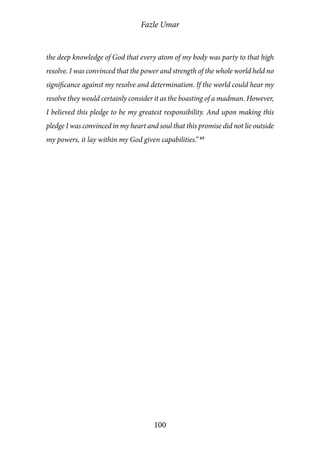




![Fazle Umar
105
Establishment of Khilafat in the
Ahmadiyya Movement
The Election Procedure – Through Inheritance,
Democracy, Dictatorship or along the lines of
Movements Established by God Almighty
After the death of the Promised Messiah [as] his enemies were hopeful that
the Movement he had founded would now disintegrate as he was no longer there to
lead and guide it. Let us now consider what course of action the Movement decided
to take at this critical point.
What would be the shape of the future leadership of the Movement? Would it
proceed along the lines of Sainthood among whom the spiritual inheritors of the
saints (Pirs) are perpetuated generation after generation from within the family of
the deceased.
If the Movement decided that under no circumstances could leadership be inher-
ited, would it the take the path of democracy where the source of power lay with the
masses. Therefore, in matters of religion also the will of the masses would prevail. Along
democratic lines such leadership would be created who would not only be accountable
to the masses but also fulfil their desires and demands. The people would keep the
leader in office as along as they deemed him able. They would remove him from office
if he were judged incompetent and unable to fulfil their demands.
The third question was would this leadership follow the example of those Move-
ments who are nourished by the Prophets [as] of Allah. This was the example fol-
lowed by the companions of the Holy Prophet, Hadhrat Muhammad [saw]. The](https://image.slidesharecdn.com/fazl-e-umar-160102120102/85/Fazl-e-Umar-111-320.jpg)
![Fazle Umar
106
philosophy of this school of thought is that when religious leadership is corrupted, it
cannot be reformed through democracy or dictatorship. Moreover, in this situation,
it is always God Almighty that chooses a leader from among men and under His
guidance enables him to create, educate and train a new movement. After his demise,
this educated and well-trained Movement elects a pious person from amongst its
members, according to the Will of God to become a Successor of the deceased Mes-
senger of God. In this way, once he is appointed their Imam according to the will of
Allah Almighty, he remains their Imam till his death. No worldly power can take this
mantle of leadership from him.
The successor of the Prophet of Allah, referred to as Khalifa, is not accountable to
any human being but is only answerable to God. However, as far as religious democracy
is concerned the masses definitely become the tools of the will of God Almighty but
the supreme authority remains in the hand of God. Although the Khalifa is appointed
through elections, in fact, God Almighty is guiding the members towards the election
of a righteous and able person. This is precisely the institution of Khilafat that the Seal
of the Prophets, Hadhrat Muhammad Mustafa [saw] left behind and in which
Hadhrat Abu Bakr, Hadhrat Umar, Hadhrat Usman and Hadhrat Ali, may Allah be
pleased with all of them, occupied the seat of Khilafat one after the other.
Hence, the question was which of these three systems would prove appropriate
and beneficial for this Movement, which the Promised Messiah [as] established by
treading in the footsteps of the Holy Prophet [saw] for the revival of Islam.
The manner in which the Movement unanimously elected the Khalifa to succeed
the Promised Messiah [as] was akin to the example of the Guided Khilafat (Khilafat-
e-Rashida). The Movement rejected the outmoded systems of sainthood (Pirs, Gaddis)
and monarchy as well as secular democracy – born out of Western Philosophy.](https://image.slidesharecdn.com/fazl-e-umar-160102120102/85/Fazl-e-Umar-112-320.jpg)
![Fazle Umar
107
Election of Hadhrat Khalifatul Masih I [ra]
The details of the election are such that after the demise of the Promised Messiah
[as], before his burial when his sacred remains were transported to the Bahishti
Maqbara in Qadian, leading members of the Movement including the members of Sadr
Anjuman Ahmadiyya through consultation began to ponder for a possible successor.
Khawaja Kamal Uddin sahib had a vision a few days before the death of the
Promised Messiah [as] in which Hadhrat Maulvi Nooruddin sahib became the
successor after the death of the Promised Messiah [as]. The family of the Promised
Messiah [as], the elders of the Movement along with the members of the Anjuman
were naturally inclined to the election of Hadhrat Hakeem Maulvi Nooruddin sahib
as Khalifa. It was obvious that among all the members of the Movement there was no
one better suited than the outstanding personality of Hakeem sahib. Hence, everyone
agreed unanimously in favour of Hadhrat Maulvi Nooruddin sahib. However, when
Maulvi Muhammad Ahsan sahib was asked, he suggested it was essential to consult
Hadhrat Mirza Bashiruddin Mahmud Ahmad sahib. Hence, when he was consulted,
he agreed with the nomination without any reservation stating:
“There is none superior to Hadhrat Maulana (Hadhrat Maulvi Nooruddin
sahib) and it is essential to have a Khalifa. And Hadhrat Maulana ought to
be the Khalifa otherwise a difference of opinion is likely to develop. There is a
revelation of Hadhrat Aqdas [as] (the Promised Messiah) that this Movement
shall split into two groups. God will be with one of them.” 27
The leading personalities of the Movement requested Hadhrat Maulvi Noorud-
din sahib to undertake the heavy responsibility of leading the Community as the
First Khalifa through a document, which bore the signatures of all of them. After this
formal request was read out in the gathering, Hadhrat Maulvi Nooruddin sahib gave
the following response:](https://image.slidesharecdn.com/fazl-e-umar-160102120102/85/Fazl-e-Umar-113-320.jpg)
![Fazle Umar
108
“Look at my past life. I have never desired to become the leader. I am well aware
of my own condition, and my Lord is even better aware of it. I have not the
slightest desire of occupying a place of honour in the world. My only desire is
that my Lord and Master may be pleased with me. I supplicate for the fulfilment
of this desire; and it is out of this desire that I took up my residence in Qadian
and will continue to reside here. I have spent many days considering anxiously
what would be our situation after the death of Hadhrat Sahib. That is why I
have endeavoured that Mian Mahmud’s education might be completed….If
you insist on pledging your allegiance (bai’at) to me then bear in mind that
bai’at means to be sold.”
Finally, Huzur [ra] reminded them:
“Now whatever may be your individual inclinations you will have to carry out
my orders. If this is acceptable to you I shall undertake this responsibility will-
ingly or unwillingly. The ten conditions of the pledge laid down by the Promised
Messiah [as] shall continue in force. I shall include among them and would
emphasise the teaching of the Holy Qur’an, the collection of Zakat, the training
of preachers and such other projects as Allah may be pleased to inspire me with.
Religious instruction and the courses of study in the theological seminary will
require my approval. I undertake this responsibility solely for the sake of Allah,
Who has ordained: Let there be from among you a body of persons who should
enjoin good and forbid evil (The Holy Qur’an Ch3.:V.105). Remember, all good
proceeds from accord. A leaderless people are dead.” 68
As soon as he finished speaking, all present, who had arrived from far and near
and who numbered about 1200, urged him with one voice, `We offer you our pledge.
We shall obey your orders. You are our Amir and the Successor of our Messiah.’
All of them swore allegiance to him in his capacity as Khalifatul Masih. After the](https://image.slidesharecdn.com/fazl-e-umar-160102120102/85/Fazl-e-Umar-114-320.jpg)
![Fazle Umar
109
bai’at ceremony, the Khalifatul Masih [ra] led the funeral prayers of the Promised
Messiah [as] and thereafter led the Asr prayer. The burial was completed by 6pm on
27 May 1908. To Allah we belong and to Him shall we return. 69](https://image.slidesharecdn.com/fazl-e-umar-160102120102/85/Fazl-e-Umar-115-320.jpg)
![Fazle Umar
110
Efforts to support and strengthen the
institution of Khilafat
The greatest single event of the period of the Khilafat of Hadhrat Khalifatul
Masih I [ra] was his courageous and valiant defence of the institution of Khilafat,
and the upholding of its dignity and authority. In the circumstances in which he
was confronted this was without a doubt a unique achievement. Let us consider the
part Hadhrat Sahibzada Mirza Bashiruddin Mahmud Ahmad played in offering his
unconditional and unwavering support to Hadhrat Khalifatul Masih [ra] and to
the institution of Khilafat.
Hadhrat Hakeem Maulvi Nooruddin [ra] was by the united will of the whole
Community elected to succeed the Promised Messiah [as] as his Khalifa. The total
membership of the Movement speedily and eagerly took the pledge of allegiance to
Hadhrat Khalifatul Masih [ra] and within a very short period the whole Commu-
nity was once more gathered under one standard. However, rumblings and creakings
became audible almost immediately after the election when some of those very gentle-
men who had unconditionally supported Hadhrat Maulvi Nooruddin’s appointment
as Khalifatul Masih to become the Head of the Movement and had announced that
in such an event his orders would be as binding upon the members as had been the
orders of the Promised Messiah [as] himself, began to have second thoughts about
the wisdom of the step they had taken. The most prominent of those who felt uneasy
in the situation they had helped to create, were Khawaja Kamal Uddin and Maulvi
Muhammad Ali.
At this time in the Community there were many persons gifted with vision,
discernment and insight, who in the young Mian Mahmud saw the great man that
it was his destiny to become, but Hadhrat Khalifatul Masih I [ra] saw the seeds of](https://image.slidesharecdn.com/fazl-e-umar-160102120102/85/Fazl-e-Umar-116-320.jpg)
![Fazle Umar
111
this greatness beginning to bloom within him as no one else did. Accordingly this
venerable head of the Community, who was made in a mould that towered so high in
personality as to overawe the most stubborn, and to subdue the bold look of princes
and kings, treated this beard-less youth with a solicitous and tender regard, and deep
respect, which those who could not see with his eyes naturally could not understand.
Many could not stomach it who deemed themselves better qualified to be treated
with respect.
Hadhrat Maulvi Nooruddin’s [ra] Love for
Hadhrat Sahibzada Sahib
Hadhrat Maulvi Nooruddin [ra], a faithful, obedient and loyal devotee of the
Promised Messiah [as]had a very special regard for Hadhrat Mirza Mahmud Ahmad,
the eldest son of the Promised Messiah [as]. He had a special insight about him due
to the prophecies granted by God to the Promised Messiah [as]. He had realised
that this is the son who is being raised for a very special status and rank in the future.
This was the reason that we find a number of such events in the life of Hadhrat Mirza
Mahmud Ahmad while Hadhrat Maulvi Hakeem Nooruddin [ra] lived whether
they were prior to his becoming Khalifatul Masih or after.
A deeply devoted follower of the Promised Messiah [as], Hadhrat Mufti Moham-
mad Sadiq [ra] relates that once they were travelling in a train. The train stopped
at a station and Sahibzada Mirza Mahmud Ahmad got off and had a little walk. (The
Promised Messiah [as] was not a member of the party). When he came back into
the compartment, before someone else vacated a seat for him, it was Hadhrat Maulana
Nooruddin [ra] who vacated his own seat for Sahibzada Sahib and sat down on
the floor. One can imagine the true regard and respect he had for Sahibzada Mirza
Mahmud Ahmad.](https://image.slidesharecdn.com/fazl-e-umar-160102120102/85/Fazl-e-Umar-117-320.jpg)
![Fazle Umar
112
Another companion of the Promised Messiah [as], Mr. Shauq Mohammad
[ra] of Lahore relates that in 1903, while he was in Qadian for studies, he knew that
Sahibzada Mirza Mahmud often suffered from eye sore. Hadhrat Maulvi Nooruddin
[ra] would himself put eye lotion in Sahibzada Sahib’s eyes and would lovingly kiss
his forehead and tenderly pat his cheeks. Then he lovingly addressed him and said,
‘Mian! Truly you are the great Mian. O my Lord God, make him the Imam of the
whole world.’
Mian Shauq Mohammad says that one day I asked Hadhrat Maulvi sahib, ‘You
only pray for Mian sahib for such a grand status and position, why not for others?’ To
this he replied, ‘I have no doubt that he is going to become Imam, but I merely pray
for spiritual reward.’
Another gentleman, Syed Sadiq Ali Shah, a non-Ahmadi who remained in Qadian
from 1908 to 1911 for education, relates as follows:
“Another respectable gentleman, Sahibzada Saifur Rahman of Bazeedkhel took
Bai’at in 1910 at the blessed hands of Hadhrat Maulvi Nooruddin [ra]. He
relates that once Huzur was explaining about revelation. His talk was going
on and during the discussion Mian Mahmud came in. Huzur hugged him and
asked him to sit by him. Continuing his discussion, he said that Allah speaks
to him and asked Mian sahib whether Allah spoke to him too. To this Mian
sahib replied in the affirmative. Hearing this, Huzur addressed the audience
and said, ‘See! Allah talks to our Mian as well’”
Maulana Zahoor Hussain, who was a missionary in Bukhara, Russia, has related
the following incident:
“Hadhrat Khalifatul Masih I started Darsul Quran especially for Hadhrat
Mirza Bashir Ahmad sahib, the younger brother of Hadhrat Mirza Mahmud
Ahmad. Taking advantage of this, some other people also joined in the lesson.](https://image.slidesharecdn.com/fazl-e-umar-160102120102/85/Fazl-e-Umar-118-320.jpg)
![Fazle Umar
113
Sometimes, Hadhrat Mian Mahmud Ahmad also came to listen and sat in the
back rows. But when Hadhrat Maulvi sahib saw him, he would invariably call
him and vacate half of his own seat and request Mian sahib to sit with him.
“Maulvi Zahoor Hussain also relates that once Hadhrat Maulvi sahib [ra]
gave him a letter to deliver to Hadhrat Mian Mahmud Ahmad in which he had
respectfully and lovingly requested him to pray for him. At that time, Maulvi
Zahoor Hussain thought how much Hadhrat Maulvi sahib respected Hadhrat
Mian Mahmud.” 70
The Crisis over the Khilafat
This then was the position of high esteem, deep respect and great love which
Hadhrat Khalifatul Masih I [ra] accorded to Mian sahib. However, there were
people in Qadian who clearly perceived the favour that Hadhrat Khalifatul Masih
[ra] accorded to Mian sahib and the increasing esteem and affection in which the
members of the Community at large held him. They had begun to apprehend that after
the death of Hadhrat Khalifatul Masih I [ra], the Community, with few exceptions,
would manifest its preference for Mian sahib as the next Khalifa. However, in their eyes
Mian sahib was no more than an ordinary young man, or rather a young man, whom
the accident of birth had put in a position that he really did not deserve. It seemed
to them that he had not the capabilities of even a man of ordinary intelligence. Had
he not left school without as much as a Matriculation Certificate to his credit? What
greater proof was required to show that he was only a worthless sort of young man
with no promise in him of anything greater? Of course he was the son of the Promised
Messiah [as] but that was all.
The weight of responsibility for proper conduct of the affairs of the Community
was on their shoulders; and it was they who toiled day and night: yet, in the eyes of](https://image.slidesharecdn.com/fazl-e-umar-160102120102/85/Fazl-e-Umar-119-320.jpg)
![Fazle Umar
114
the Khalifa the dull and easy going youth, who did not possess sufficient energy or the
intelligence to get through the ordinary course of a secondary school, was deserving
of better regard than fell to their share. What were these men to do in this situation? 71
On the sixth day after allegiance had been sworn to the Khalifa, Khawaja Kamal
Uddin happened to arrive in Qadian. In the course of a conversation with Hadhrat
Sahibzada Mirza Bashiruddin Mahmud Ahmad he observed, as if casually:
“Mian, we have slipped into a mistake, which can be corrected only by our
somehow defining the authority of the Khalifa. He should take the pledge of
allegiance from new members, should lead the Prayer services, should perform
marriages and lead funeral prayers and no more.”
This was a sounding to which the Hadhrat Sahibzada Sahib’s reaction was:
“It is too late for the entertainment of any such notion. You should have thought
of it before taking the pledge of allegiance. The Khalifa had made it quite clear
that the pledge would involve complete obedience. We took the pledge on this
understanding. Our relationship with the Khalifa is now of master and servant.
We have no right to define the authority of our master.”
Khawaja sahib realised that his approach was misconceived and did not pursue
the matter. 72
The Sadr Anjuman
The Promised Messiah [as] set up the Sadr Anjuman Ahmadiyya (Central body
of Ahmadiyyat), in 1906 to look after the administrative affairs of the Movement. All
the different Anjumans, working under different names, were placed under the super-
vision of this central body. Hadhrat Maulvi Nooruddin was appointed the president
of this Anjuman by the Promised Messiah [as]. 73
Simultaneously with the institution of Khilafat currency began to be given to](https://image.slidesharecdn.com/fazl-e-umar-160102120102/85/Fazl-e-Umar-120-320.jpg)
![Fazle Umar
115
the notion that the office of the Khalifa was purely spiritual and for the purposes of
regulation of the Community and the administration of its affairs, the Sadr Anjuman
was the real Successor of the Promised Messiah [as].
The Sadr Anjuman was a self-renewing body. By its rules, which were approved
on the recommendation of Khawaja Kamal Uddin, a vacancy among the members
of the Anjuman, arising from the death or resignation of a member, was filled by
nomination by a majority of the remaining members. So that, once as many as eight
members, out of a total of fourteen, found themselves in accord with each other, they
formed a majority which could perpetuate itself by filling every vacancy by nominat-
ing a like-minded person.
At the time of the demise of the Promised Messiah [as], there was such a group
in the Anjuman, the prominent ones in which were Maulvi Muhammad Ali, Khawaja
Kamal Uddin, Shaikh Rahmatullah, Dr. Syed Muhammad Husain and Dr. Mirza Yaqub
Beg, the last four belonging to Lahore. The President was Hadhrat Maulvi Noorud-
din and some of the other members were Syed Muhammad Ahsan, Sahibzada Mirza
Bashiruddin Mahmud Ahmad, Nawab Muhammad Ali Khan and Khalifa Rasheedud-
deen, Khawaja Kamal Uddin was Secretary. 74
Hadhrat Maulvi Nooruddin, Khalifatul Masih I [ra], continued as president of
the Sadr Anjuman even after his election as Khalifa. Maulvi Muhammad Ali, Khawaja
Kamal Uddin and several others, a solid block of their bent of mind, took advantage
by boosting the presidency of the Anjuman as the real source of authority rather than
the Khalifa. They began to refer in their speeches to the Khalifa as the Chief President;
thus subtly giving currency to the notion that the Head of the Movement exercised his
authority by virtue of his office of president of the Sadr Anjuman, the central body and
not in his capacity of Khalifa. Some of them had recourse to this device during their
speeches in the Annual Conference of 1908 by stressing the need of perfect obedience](https://image.slidesharecdn.com/fazl-e-umar-160102120102/85/Fazl-e-Umar-121-320.jpg)
![Fazle Umar
116
to Sadr Ala (Chief President) and full conformity to his wishes.
This propaganda was continued, especially in Lahore, to undermine the author-
ity of the Khalifa. Maulvi Muhammad Ali even made his views known to Hadhrat
Khalifatul Masih I [ra]. When Huzur received his comments, he was amazed at their
purport, which revealed that he was in accord with the dissentients, who were seeking
to put an end to the institution of Khilafat. For instance, he had written:
“It does not appear from the Al Wasiyyat (Testamentary Direction) of the
Promised Messiah [as] that the Khalifa must be an individual, though that
can happen in special circumstances, as is the case just now. Indeed, Hadhrat
sahib appointed the Anjuman his Khalifa. It is not necessary that a single
individual should be Khalifa.”
Hadhrat Khalifatul Masih I [ra] realising that the matter was serious and the
malady deep, directed that representatives of all branches should convene at Qadian
on 31 January 1909 for consultation.75
Consultation on the institution of Khilafat
The summoned delegates arrived in Qadian on 30 January and were advised to
spend the night in prayer seeking Divine guidance on the matters to be discussed the
next morning. They were approached en route by agents of the ‘Lahore Group’ (dis-
sentients) to influence their minds in favour of the view that the final authority in the
affairs of the Community was vested by the Promised Messiah [as] in the Anjuman,
not in the Khalifa.
The delegates gathered in the Mubarak Mosque for the morning service. The
mosque was soon full, but Hadhrat Khalifatul Masih had not yet arrived. The uphold-
ers of the supremacy of the Sadr Anjuman, taking advantage of the interval before his
arrival, urged the validity of their proposition upon the waiting worshippers. Shaikh](https://image.slidesharecdn.com/fazl-e-umar-160102120102/85/Fazl-e-Umar-122-320.jpg)
![Fazle Umar
117
Rahmatullah addressed the gathering to sway it in favour of the rebel view. “God’s
wrath!” he declared with well simulated fervour, “a few designing men are out to ruin
the Community by raising a stripling to the Khilafat.”
The “stripling” in question too, heard this remark and was greatly mystified by
it, never dreaming that he himself was being referred to. The doors open into the
mosque from the house of the Promised Messiah [as]. In one of the rooms behind
these doors Mian Mahmud, in an agony of suspense over the crisis, was pacing up and
down, praying to God to guide the delegates to the right decision and the right attitude
of mind. He, evidently, did not know at the time, as he came to know later, that these
decorous gentlemen never tired of contemptuously alluding to him as a “stripling”.
Thus the dissentients had explained every aspect of the question to the congregation
before Huzur’s arrival. 76
Hadhrat Khalifatul Masih I [ra] arrived to lead the Morning Prayer service
and in the course of it he recited the eighty-fifth chapter of the Holy Qur’an. He was
deeply moved when he recited the verse, “Those who have involved the believing men
and the believing women in doubt and confusion, and do not repent, will surely suffer
the chastisement of hell and the chastisement of burning.” (Ch.85:V.11). He repeated
this verse two or three times in tones that betrayed grief and sorrow and the heart
of every worshipper was filled with the fear of God. In spite of the utmost efforts to
control, such loud sobs and moans involuntarily escaped many worshippers that per-
haps, never had a mother wept more bitterly over the death of an only son. Save the
few recalcitrant spirits that were there, all felt a softening of the heart and a renewal
of faith and a complete absolution from selfish thoughts. 77
The consultative body, approximately two hundred and fifty persons, was sum-
moned to meet on the sunlit roof of the mosque. When they had all arrived Hadhrat
Khalifatul Masih came and stood in that portion which had been constructed under](https://image.slidesharecdn.com/fazl-e-umar-160102120102/85/Fazl-e-Umar-123-320.jpg)
![Fazle Umar
118
the directions of the Promised Messiah [as].
Some years later, Hadhrat Khalifatul Masih II [ra] described the scene in these
terms:
“In the eyes of a worldly person that gathering of two hundred and fifty persons
seated on the bare brick floor may have appeared bizarre and inconsiderable, but
their hearts were full of faith and they believed firmly in divine promises. They
felt that they had met together to determine the future of Ahmadiyyat, on which
depended the peace and progress of the world. That day would decide whether
Ahmadiyyat would prove to be just one of many worldly associations or the
association of the true followers of the Holy Prophet [saw], through whom
Islam was to be revived. On that day the fate of mankind was to be determined.
Today it may not be realised, but before long it will be appreciated that this
obscure religious Movement will be much more effective in compassing a peace-
ful and holy revolution in the world than formidable political movements.” 78
Hadhrat Khalifatul Masih [ra] pointed out that Khilafat was a religious concept,
and the Community could not possibly make any progress without it. He said:
“God has told me that if any of you deserts me, He will bestow upon me a large
party in his place. So I do not depend upon any of you. I have full reliance upon
Allah’s Grace that He will help me.”
Then referring to the views on the status of a Khalifa given by Maulvi Muhammad
Ali and Khawaja Kamal Uddin, he said:
“I am told that the only business of the Khalifa is to lead the Prayer services
and funeral prayers, and to perform marriages and accept pledges of allegiance.
Whoever says this is ignorant and impertinent. Such a one should repent or
he will harm himself.’”
He admonished, “you have by your conduct hurt me grievously and have been](https://image.slidesharecdn.com/fazl-e-umar-160102120102/85/Fazl-e-Umar-124-320.jpg)
![Fazle Umar
119
guilty of contempt of the office of Khalifa.” He expatiated on the status of the Khalifa
and the nature and quality of the obedience due to him, so that no doubt was left in
anyone’s mind with regard to what the pledge of allegiance entailed.
The speech opened the eyes of the delegates. The conspirators had the disap-
pointment of seeing their clever scheme swept away like fortifications built in sand
by children at play on a beach.
Hadhrat Khalifatul Masih [ra] then called upon Maulvi Muhammad Ali and
Khawaja Kamal Uddin to renew their pledge of allegiance. He suggested that they
should go apart and consult with each other whether they were willing to do so. He
also called upon one or two others to renew their pledge. 79
All of them complied and
the meeting came to an end.
But Maulvi Muhammad Ali and Khawaja Kamal Uddin bubbled with suppressed
rage. They took the pledge of allegiance only outwardly because they stood fully
exposed. 80
Clash over THe house of Maulvi Hakeem Fazal Din
Khawaja Kamal Uddin learnt a deep lesson from these two mistakes. After this
greater reverse he called off the publicly exposed campaign altogether and devoted
himself to a task comparable to running a tunnel under enemy lines to blow them up
with dynamite.
Maulvi Muhammad Ali, however, with a more irritable temper and a sensitive skin
that felt even the casual caress of the wind as a deliberate pinprick continued to clash
with Hadhrat Khalifatul Masih [ra]. He could not forget an injury to his vanity how-
ever slight and knew not how to bide time as his friend did. In his capacity as secretary
Majlis-i-Motamadeen Sadr Anjuman, he began to obstruct Hadhrat Khalifatul Masih
[ra] in the affairs of the Community. The clash over Maulvi Hakeem Fazal Uddin’s](https://image.slidesharecdn.com/fazl-e-umar-160102120102/85/Fazl-e-Umar-125-320.jpg)
![Fazle Umar
120
house is only one example of his obstinate opposition to the wishes of the Khalifa.
Hakeem Fazal Uddin of Bhera, a close relation of Hadhrat Khalifatul Masih, had
left a certain property in Bhera, which he had purchased very cheap from a Shia who
had sold it under some temporary stress, as a legacy to the Sadr Anjuman by his will.
The Anjuman decided to sell the property. When its original vendor came to know that
the property was for sale, he wrote to the Khalifatul Masih, setting out the background
of his sale of the property to Hakeem Fazal Uddin, and requested that the property
may be sold to him on somewhat favourable terms. The Khalifatul Masih forwarded
his request to the Sadr Anjuman and directed that it should be considered favourably.
The response of the Anjuman was that the property would be put up to auction and its
former owner could bid for it at the auction. They were not willing to extend a favour
to him, which might occasion loss to the Anjuman. Hadhrat Khalifatul Masih [ra]
conceived that this attitude not only lacked beneficence but was an affront to him, and
he expressed his annoyance by minuting, “do as you please; I will not concern myself
any further with the matter.”
When the question came up again in a meeting of the trustees of the Anjuman
the Secretary reminded the trustees of their responsibility to God and enquired what
should be done. Hadhrat Sahibzada Mirza Bashiruddin Mahmud Ahmad suggested
that as Hadhrat Khalifatul Masih [ra] desired that some concession should be made
to the former owner of the property, his wishes should be complied with. The Secretary,
Maulvi Muhammad Ali, said that Hadhrat Khalifatul Masih had left the decision to
them and read out his minute; whereupon Sahibzada Sahib pointed out that the minute
was expressive of displeasure and not of permission and that they must comply with his
wishes. A long discussion ensued during which Hadhrat Sahibzada Sahib was repeat-
edly urged to keep in mind his responsibility to God as a trustee, but he adhered to
the view that he had expressed. Finally a majority took a decision contrary to his plea.](https://image.slidesharecdn.com/fazl-e-umar-160102120102/85/Fazl-e-Umar-126-320.jpg)
![Fazle Umar
121
When the matter was reported to Hadhrat Khalifatul Masih [ra], he summoned
the trustees who urged that the decision was taken after full discussion and consulta-
tion in which Hadhrat Sahibzada Sahib also participated. Hadhrat Sahibzada Sahib
was sent for and when he arrived Hadhrat Khalifatul Masih enquired from him, “how
is it Mian that my express directions are contravened?”
He replied, “Huzur, I do not recall any such default on my part.”
Huzur asked, “I had given a direction concerning the sale of Hakeem Fazal Uddin’s
property in Bhera. Why has it been contravened?”
“Huzur, I was no party to the contravention. I had repeatedly urged compliance
with your direction and had urged that your minute was expressive of displeasure and
not of permission.” Hadhrat Sahibzada Sahib replied.
Huzur then turned to the others and said, “you say he is only a stripling, and yet
he understood my minute aright and you failed to comprehend it.”
He admonished them at some length that obedience was a source of blessings,
and they should mend their ways else they would disentitle themselves to Allah’s Grace.
Hakeem Fazal Uddin’s younger brother had been ready to pay a good price for
the property, but when he learnt of the difference between Hadhrat Khalifatul Masih
and the Anjuman, he drew back, and the Anjuman was left no choice but to comply
with the wishes of Hadhrat Khalifatul Masih. The obdurate trustees submitted profuse
apologies to Hadhrat Khalifatul Masih, but there was no change in their attitude and
their propaganda against him went forward apace. 81
In September 1909 he announced that if there was no real improvement in their
attitude by Eidul Fitr, they would be expelled from the Community. In this situation
the leaders of the group submitted a sort of apology, but their attitude did not exhibit
any real improvement. In his sermon on the occasion of Eidul Fitr, 19 October 1909,
Hadhrat Khalifatul Masih admonished them once more at length.](https://image.slidesharecdn.com/fazl-e-umar-160102120102/85/Fazl-e-Umar-127-320.jpg)
![Fazle Umar
122
Appointment of Hadhrat Sahibzada Sahib as
president of Sadr Anjuman
Sometime in 1910, Hadhrat Khalifatul Masih [ra] resigned the presidency of
the Sadr Anjuman on the grounds that the two offices were incompatible and directed
that Sahibzada Mirza Bashiruddin Mahmud Ahmad, who was then only 21 years of
age, should be president of the Anjuman. But by that time the question of supremacy
between the Khalifa and the Anjuman had already come to the surface. 82
Pony Accident of Hadhrat Khalifatul Masih I [ra]
On Friday, 18 November 1910, Hadhrat Khalifatul Masih [ra] fell while riding
a pony and received injuries of which one, on his right temple, was serious. For some
days his condition was considered grave. While he was in this condition he said one
day to Dr. Mirza Yaqub Beg, his principal physician: I am not afraid of death. If in your
judgment my condition is serious, you may tell me so frankly, so that I may dictate
certain directions. He assured him that he was in no danger, but that if his illness took
a turn for the worse he himself would warn him. Yet as soon as he left him and joined
his colleagues in Maulvi Muhammad Ali’s room, they put their heads together and
despatched him to invite Sahibzada Mirza Bashiruddin Mahmud Ahmad sahib to join
them. When he arrived, Khawaja Kamal Uddin explained the situation to him in the
words, “We have troubled you to come over as we are told that Hadhrat Maulvi sahib
is very ill and weak. Those of us who are from Lahore cannot afford to stay here longer,
as we must return to Lahore. We desire that we should consult together and agree upon
some plan that should obviate any risk of trouble in case of an emergency. We wish
to assure you that none of us desires to be Khalifa, nor does Maulvi Muhammad Ali.”
On this Maulvi Muhammad Ali made an affirmation to that effect, and Khawaja
Kamal Uddin proceeded, “We do not consider anyone beside you worthy of being](https://image.slidesharecdn.com/fazl-e-umar-160102120102/85/Fazl-e-Umar-128-320.jpg)
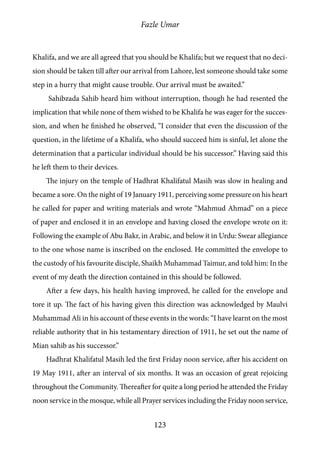
![Fazle Umar
124
continued to be led under his direction, by Sahibzada Mirza Bashiruddin Mahmud
Ahmad. On one occasion Maulvi Muhammad Ali suggested to Hafiz Raushan Ali
to enquire from Hadhrat Khalifatul Masih [ra] why, in the presence of older and
more learned divines, he had directed that the young Sahibzada should lead the Prayer
services. Hafiz Raushan Ali made the enquiry, without mentioning who had inspired
it, and received the reply, “The Holy Quran says, ‘The most honoured among you
in the estimation of Allah is he who is the most righteous among you’ (Ch.49:V.14).
Name from among the whole Community one as righteous as Mian Mahmud Ahmad.
Then shall I appoint Maulvi Muhammad Ali to lead the Prayer services and deliver
the sermon?”
Efforts of Conspirators to Gain Popularity among
Orthodox Muslims
These two men under the stunning impact of the sudden death of the Promised
Messiah [as] had committed themselves too far to leave room for a barefaced U-turn
on the institution of Khilafat. They had themselves tied their own hands too tightly.
They soon realised that they had made a mistake, and began to cast about for devices
to help them pull back from a difficult situation with the minimum loss of face.
They had miscalculated with regard to the character of the Khalifa. Time after
time their tricks and devices were frustrated by the firmness, farsightedness, cour-
age and high resolve of the Khalifa and by his complete trust in God. They dared not
come out into the open in their opposition and hostility to the Khalifa, as fairly early
they had begun to perceive that the Khalifa enjoyed tremendous prestige among the
Community and if a situation was brought about in which the Community might be
forced to make a choice between the Khalifa and the Anjuman, at least ninety percent
of it would support the Khalifa rather than the Anjuman.](https://image.slidesharecdn.com/fazl-e-umar-160102120102/85/Fazl-e-Umar-130-320.jpg)
![Fazle Umar
125
They were convinced that after the death of Hadhrat Khalifatul Masih I [ra],
the Community, with few exceptions, would manifest its preference for Mian Mahmud
sahib as the next Khalifa. He had given early proof of a very keen intelligence, a very
just appreciation of spiritual values and a highly developed faculty of giving expression
to his thinking in speech and writing. His loyalty and devotion to Hadhrat Khalifatul
Masih [ra] was exemplary. He was inspired by great zeal in support of the ideals
and principles of the Movement. What were these men to do? 83
The main effort of the dissentients was therefore directed towards winning
popularity among the orthodox Muslims through propagating the philosophy of
Islamic values as expounded by the Promised Messiah [as] without mentioning his
name, and gradually toning down the differences of doctrine, teaching and practice
that distinguished Ahmadis from non-Ahmadi Muslims. This formula would not
only make them popular with the orthodox Muslims but would also put them in the
forefront of all Islamic movements and win them credit for whatever progress was
achieved by Islam and the Muslims. It would take them some time to discover how
sadly mistaken they had been.
Lectures by Khawaja Kamal Uddin
A series of lectures were delivered in various places by Khawaja Kamal Uddin,
always taking care to omit the name and the claims of the Promised Messiah [as] but
drawing freely upon the storehouse of the rare knowledge of Islam made accessible to
him through the Promised Messiah [as]. These lectures were naturally well received
by the Ahmadi as well as the non-Ahmadi public. He pushed himself even more to
the forefront by himself writing eulogistic reports of these lectures and sending them
to the press in the name of other people, or he got his friends to write such reports.
As a result of this campaign, in the course of a year or two, he made a name for](https://image.slidesharecdn.com/fazl-e-umar-160102120102/85/Fazl-e-Umar-131-320.jpg)
![Fazle Umar
126
himself. There developed quite a demand for his lectures sometimes attended by thou-
sands of non-Ahmadis. Many Ahmadis took his increasing popularity as a sign that the
non-Ahmadis were rapidly coming nearer to Ahmadiyyat and from this mistaken view
began to copy his method. The propagation of the message of the Promised Messiah
[as] thus came to a halt. The danger, towards which the Community was marching,
though unconsciously and in ignorance, was on that very account the greatest that
so far had ever risen in its path. Khawaja Kamal Uddin then left for England on 7
September 1912, in connection with some legal business. Though he left primarily for
this purpose, he had it mind too to try and see what could be done by way of Islamic
missionary effort in England.
The Anjuman Ansarullah
The mature minds in the Community like Hadhrat Sahibzada Sahib were alarmed
by the policy of Khawaja Kamal Uddin. They knew that numerically small commu-
nities could not merge into larger ones and keep their characteristic features intact.
Fundamental and revolutionary changes in beliefs, outlook, standards of conduct and
national characteristics do not take place silently and quickly like clouds changing
colour at sunset.
At this time we find Hadhrat Sahibzada Sahib in a position of great and peculiar
difficulties. Gifted with an extraordinary solicitude for the welfare of the Community
and its preservation on the path chalked out by the Promised Messiah [as], he began
to feel, as though by instinct, the dangers piling up fast on the horizon like dark and
ominous clouds. The propagation of Ahmadiyyat was practically at a standstill. The
Kamal Uddin-Mohammad Ali clique controlled the funds of the Community so that
even Hadhrat Khalifatul Masih [ra] had to look to them when he wanted anything
done.](https://image.slidesharecdn.com/fazl-e-umar-160102120102/85/Fazl-e-Umar-132-320.jpg)
![Fazle Umar
127
As this clique was preparing the ground for a silent amalgamation with non-
Ahmadis, propagation of the message of Ahmadiyyat obviously was not among its
plans. Here let us return for a moment to the day the Promised Messiah [as] passed
away. As we observed earlier, on that day Hadhrat Sahibzada Sahib had taken a silent
but stupendous vow that even if the whole world forsook the Promised Messiah [as]
and forgot the purpose which it was his mission to fulfil, he, for one, would never
forsake him or lose sight of that purpose.
When these tendencies, of which we have been trying to pick up the thread, began
to manifest themselves to his discerning eye, he must have been haunted by thoughts
of the responsibility that devolved upon him from that vow, and his helplessness to
do anything. But he was not made in a mould that throws up his hands in despair and
sinks without striking a blow. Driven on by an inner fire that would not let him rest, he
decided on a course of action, which in its intrinsic possibilities was little better than a
drowning man clutching at a straw. But God, who sees what is inside the heart rather
than the volume of achievement, prospered the venture and it became the prelude to
bigger and ever bigger things. In 1911 he started an association to which the name
Anjuman Ansarullah was given.
The idea to form this Anjuman came to him in a dream and it was formed after
Hadhrat Khalifatul Masih [ra] had approved of the idea. Its membership was open to
everybody, the only condition imposed being that one should apply for admission after
performing Istikhara for seven days. Obligations which membership imposed were to
strive for the propagation of Islam, to try to carry the message of Ahmadiyyat to the
world, to study the Holy Qur’an deeply and intensely, regularity in Tahajjud (prayers
before Fajr), endeavour to compromise any differences arising between Ahmadis in
the course of social contacts and loyalty to the Government. 84
These were very laudable aims, and there was nothing either in the conception or](https://image.slidesharecdn.com/fazl-e-umar-160102120102/85/Fazl-e-Umar-133-320.jpg)
![Fazle Umar
128
execution of the idea to which objection could be taken. Nevertheless, certain people
from the very outset frowned upon the Anjuman. A barrage of criticism was directed
against it. To begin with it was suggested that its name was ridiculous, it was meaning-
less, it was in fact, much worse; it was mischievous and a libel against Ahmadis who
were not members but who, nevertheless, were better Ansar (helpers of the cause of
Islam) than the members of this new fledged Anjuman. Some suggested he set up the
Anjuman in rivalry to Khawaja Kamal Uddin. Others went a step further and said
that its originator was only sowing a crop of dissentions. These voices babbled end-
lessly. Before long it began to be whispered in select circles that the Anjuman was but
a conspiracy hatched by Hadhrat Sahibzada Sahib to encompass his own election to
Khilafat, and soon afterwards this preposterous accusation was flung about openly.
When the crisis developed over Khilafat, it became one of the main items in the
indictment against him.
It is not necessary here to attempt a serious refutation of this criticism because
it is palpably absurd. As Hadhrat Mian sahib wrote in the article referred to, when a
man named his son Muhammad, did it mean that he took all others to be no better
than Abu Jahl? As for creating a separate Anjuman, Hadhrat Maulvi Nooruddin
[ra] had once created a society of which the condition for admission was that the
candidate undertook not to indulge in suspicions with regard to his brethren. This
was in the time of the Promised Messiah [as]. Even then it was urged by some that
to permit such an association to be formed would mean by implication that those who
did not join it, were prone to indulge in suspicion. But the Promised Messiah [as]
approved of the idea.
Hadhrat Sahibzada Sahib’s plan of work for the Anjuman Ansarullah in addi-
tion to creating an organisation for Islamic missionary work abroad, embraced the
following items:](https://image.slidesharecdn.com/fazl-e-umar-160102120102/85/Fazl-e-Umar-134-320.jpg)
![Fazle Umar
129
1. In view of the general sloth and inactivity in the Community, to rouse by means
of a series of lectures those who were sinking into sleep.
2. To publish tracts with the same end in view.
3. To send workers into different towns to stay there for periods long enough to
create an impression.
4. To appoint touring wa’azzin to inspire the Community. 85
Revitalisation of the propagation of Ahmadiyyat
Khawaja Kamal Uddin had cast a spell over a large portion of the Community
with his peculiar method of preaching that omitted mentioning the distinctive claims
of the Promised Messiah [as]. Many felt it was necessary to copy his method to gain
success. Even those who mistrusted this approach were undergoing a strange probation.
On the one hand they knew that if they persisted in this policy the Movement would
soon come to an end. On the other hand, after the success of Khawaja Kamal Uddin,
they felt afraid that people would refuse to attend any lectures bearing on the distinc-
tive claims of the Promised Messiah [as], or if they attended, the numbers would
be so small, giving the rival party ground for claiming theirs was the right method.
If others could not rise above those difficulties and dangers, Mian Mahmud was
made in a different mould. For him there was danger of the central purpose of the
message of the Promised Messiah [as] being lost and face to face with this danger
he made a resolute stand, leaving the result to God.
In 1912, when Hadhrat Khalifatul Masih I [ra] sent him on a tour as the head of
a delegation to visit the various Arabic Madrassas in India and abroad, he began battling
the odds in the face of great adversity. During this tour he utilised every conceivable
opportunity to preach the claims and the message of the Promised Messiah [as]. So
completely was the Community overcome by apathy brought on by the pernicious](https://image.slidesharecdn.com/fazl-e-umar-160102120102/85/Fazl-e-Umar-135-320.jpg)
![Fazle Umar
130
drug administered by Khawaja Kamal Uddin (in a painless injection nobody knew
was given) that letters of protest from some Ahmadis, of the places he visited, began
to pour in upon Hadhrat Khalifatul Masih [ra]. Mian sahib was young, said these
letters, and his way of saying things was raw and inexperienced. His lectures would
raise a storm of opposition that might well prove fatal to the interests of the Com-
munity. Huzur read these letters and left them at that hence approving of the course
Mian Mahmud was pursuing. 86
On 26 September 1912, Hadhrat Mirza Bashiruddin Mahmud Ahmad, with the
permission of Hadhrat Khalifatul Masih [ra], set off on a tour of the educational and
religious institutions of Egypt and the Middle East as the head of a three-man delega-
tion. The delegates also had the good fortune of performing Hajj before returning to
Qadian on 6 January 1913. As well as learning about the institutions, they took every
opportunity to spread the message of Ahmadiyyat throughout the tour.
In order to have competent Arabic scholars, two senior scholars were sent to Egypt
and Syria. Hadhrat Khalifatul Masih [ra] initiated the sending of these delegations
in order to equip Madrassa Ahmadiyya with the best possible talent. 87
The Al–Fazl
The more discerning element in the Community felt uneasy over the policy that was
comingtobefollowedmoreandmoreeverydaybythosewhowereinapositionvirtuallyto
controltheprogrammeoftheCommunity.ButscatteredalloverIndia,theywerehelpless.
AnjumanAnsarullahhowever,gavethemarallyingpoint;acommonsenseofdangergave
themcohesionandthedireneedofthemomentgavethemaprogramme.Asmembership
of this Anjuman increased, its scope of influence began to expand, and soon it rose like a
sudden wall between the Community and the point of fusion with non-Ahmadiyyat to
which Khawaja Kamal Uddin and his friends were carefully leading it.](https://image.slidesharecdn.com/fazl-e-umar-160102120102/85/Fazl-e-Umar-136-320.jpg)
![Fazle Umar
131
The Ansarullah was doing splendid work but it was sadly handicapped by the lack
of an organ by means of which it could reach a wider circle of sympathisers than was
possible by word of mouth. The need was pressing and once more the “boy” – that
selfsame never-do-well who had not even a Matriculation Certificate to his credit –
rose to the occasion like a man. He thought that a newspaper was required to improve
contact between the Centre and the Community at large. He staked every penny he
could raise, even the jewellery of his wife, and started a weekly newspaper for which the
name of Al-Fazl was chosen by Hadhrat Khalifatul Masih I [ra], who had approved
of the venture and given it his blessings.
“Memory of days gone by” gives us a rare peep into the mind of Hadhrat Sahibzada
Sahib when he took this great financial risk. He writes:
“After this came the year 1913. The life-giving days of the Promised Messiah
[as] were receding into the distance and a kind of rust, which had laid its
hold upon certain minds, began to be felt. It looked as though the Movement
was crumbling to pieces. The present was distressing and dark but the future
seemed darker and more full of peril. The hearts of many had given way and
there were those who began to despair. The silent vow I had taken upon the
death of the Promised Messiah [as] prompted me to keep my resolution high,
but apart from that I was helpless.
“The columns of The Badr were closed to us on account of the policy pursued by
that paper. The Al Hakam, in the first place, was practically non-existent, as all
that it could manage to do was to come out now and then; secondly, even when
it did come out, it had a directness of approach and a way of saying things which
made it unpopular with the powers that be. The Review of Religions (of which
Maulvi Muhammad Ali was the editor) was so far removed from us that we
could never dream of using it to further our aims. And I had no money. There](https://image.slidesharecdn.com/fazl-e-umar-160102120102/85/Fazl-e-Umar-137-320.jpg)
![Fazle Umar
132
was my life which I could offer and my hands which I could work to the bone,
but I was helpless to produce the thing I did not possess. The dire need of the
Community was for a newspaper to rouse it, to charge it with electricity, to shake
it into life, to make it pitch its aims high. But no such paper existed, and to wish
for one was like wishing for the moon: neither one was possible nor the other.
However, my anguish of mind bore fruit and a gleam of hope showed itself.” 88
Thus with financial backing from Hadhrat Amma Jan [ra_ha], his own wife and
Nawab Muhammad Ali Khan, Hadhrat Mian sahib launched his weekly which, as
a journal, was an unqualified success from the moment of its birth. The policy and
the aim of the Al Fazl was the spirit of the vow Hadhrat Mian sahib had taken on the
death of the Promised Messiah [as]. That was a stupendous vow and he took it when
he was only an inexperienced youth. He took it too when he was under the stress of
an unusual emotion. But all through his subsequent life he had shown that he took
that leap knowing full well what lay at the end of it, and never turned back or let his
purpose be weakened by difficulties.
The work which the Al Fazl assumed was in its own words, “to clarify the posi-
tion of the Promised Messiah [as]; to impress upon the Community that he alone
was its master and guide, the importance of whose mission could not be minimised
without depriving Ahmadiyyat and Islam of all that was alive in it”.89
The first issue
was published on 19 June 1913. Subsequently it became a daily and has now been for
almost a century the official organ of the Movement.
The Paigham-i-Sulh
The leadership of the dissentients was concentrated in Lahore. As the health of
Hadhrat Khalifatul Masih [ra] continued at best indifferent, and then began to suffer
a decline, the dissentient group began active preparations to meet the inevitable crisis.](https://image.slidesharecdn.com/fazl-e-umar-160102120102/85/Fazl-e-Umar-138-320.jpg)
![Fazle Umar
133
About a couple of weeks prior to the publication of Al-Fazl, The “Lahore Group” to
which the dissentients belonged started a paper called the Paigham-i-Sulh (Message
of Peace) in 1913. Although an Ahmadi organ, the proprietors took considerable pains
to keep the fact of their Ahmadiyyat as much in the background as possible.
Two anonymous pamphlets bearing false and slanderous allegations against
Hadhrat Khalifatul Masih [ra] and members of the family of the Promised Messiah
[as] were published in October 1913. The statement published in the Paigham-i-Sulh
of 16 November 1913 establishes the fact that they were inspired by the leadership of
the dissentients, despite their anonymity. 90
This was an age of democracy, said the pamphlets, and true to the spirit of the
age the Promised Messiah [as] had left his sacred Will and Testament that after his
death the Anjuman would have the final authority.
Hadhrat Khalifatul Masih [ra] directed the Anjuman Ansarullah to prepare and
publish a rejoinder to the pamphlets. It proved most effective and fully safeguarded
the Community against the mischief that the pamphlets were designed to stir up.
Regarding the best means of propagation of Ahmadiyyat, the Lahore Group
thought that success was to be attained only by adopting the policy of Khawaja sahib
and not by that pursued by Hadhrat Sahibzada Sahib. These views were supported and
encouraged by articles published in the Paigham-i-Sulh. This and other controversies,
however, led to one good result. They exposed to view the machinations, which had
previously been carried on in secret, and thus served to put the Community upon its
guard. No doubt, a section of the Community was carried away by the tide but the
loss proved a source of safety for the rest.
When the internal dissensions of the Community had once been made public,
there remained no longer any reason for further secrecy. In the Paigham-i-Sulh, attacks
began to be made openly on the Ahmadis who lived at Qadian, and refutations of those](https://image.slidesharecdn.com/fazl-e-umar-160102120102/85/Fazl-e-Umar-139-320.jpg)
![Fazle Umar
134
attacks were published in the columns of the Al-Fazl under the direction of Hadhrat
Khalifatul Masih. It is true that members of the Paigham party, whenever they became
aware of having incurred the open displeasure of Hadhrat Khalifatul Masih used to
run up to him and begged for pardon, but no sooner did they return from his pres-
ence, then they reverted to their own ways. This period was fraught with the gravest
danger for the Movement, because even its enemies had now become aware of the
disputes, which for some years had been dividing Ahmadis into opposite ranks. Nor
were they slow to take advantage of this state of affairs. They began openly to encour-
age the Lahore party and to induce them by various means to persist in the dispute
till at last Hadhrat Khalifatul Masih was compelled once to call The Paigham-i-Sulh
(lit. Message of Peace) Paigham-i-Jang (lit. Message of War). 91
Continuation of the projects of the Promised
Messiah [as]
The function of a Khalifa had been set out by the Promised Messiah [as] in his
Testamentary Direction in these terms that after the Prophet, God Almighty makes
manifest another aspect of His Power, and provides such means through which those
purposes which had remained unfulfilled to some degree are fully achieved. Therefore,
the first care of Hadhrat Khalifatul Masih [ra] was to take up and push forward
the projects that were pending or were contemplated at the time of the death of the
Promised Messiah [as].
Hence, Huzur appointed a Committee in June 1908 composed of Sahibzada
Mirza Bashiruddin Mahmud Ahmad, Maulvi Muhammad Ali, Nawab Muhammad
Ali Khan and Dr. Khalifa Rasheeduddeen to take the necessary steps to put the
Madrassa Ahmadiyya (Ahmadiyya School) on a proper footing. The Committee drew
up a scheme, recommended immediate implementation of certain parts, and made an](https://image.slidesharecdn.com/fazl-e-umar-160102120102/85/Fazl-e-Umar-140-320.jpg)
![Fazle Umar
135
appeal to the Community for funds. This institution has since developed into a Jamia
whose graduates are doing splendid work in propagating the message of true Islam
in different parts of the world.
In the first year of the Khilafat, Hadhrat Khalifatul Masih [ra] set up a public
library in Qadian and this library was placed under the control of Anjuman Tashheezul
Azhan, which was headed by Hadhrat Sahibzada Mirza Bashiruddin Mahmud Ahmad.
Hadhrat Sahibzada Sahib was always very conscious of the education and training of
the youth. He felt that students at Qadian, or those who came from outside, could
take advantage of having access to all the books of the Community rather than waste
their time in other places. 92
After the death of the Promised Messiah [as] there was a spate of criticism
of and objections to his claims by his opponents. Several scholars and divines from
among the members of the Movement wrote pamphlets and articles in refutation of
these objections.
Sahibzada Mirza Bashiruddin Mahmud Ahmad sahib, not yet twenty also wrote
a booklet on that occasion, the title of which was: Who can put out the Light of the
Righteous? Having read it, Hadhrat Khalifatul Masih remarked to Maulvi Muhammad
Ali, “You and I have both written in refutation of the objections raised by our opponents
against the Promised Messiah [as], but Mian Mahmud has left both of us behind.” 93
We have seen how in contrast with the preoccupations and activities of the Sadr
Anjuman, the life and activities of Sahibzada Mirza Bashiruddin Mahmud Ahmad
sahib, even during those early years, held out the promise that he would progressively
continue to furnish proof of the truth of the various aspects of the prophecy of the
Promised Messiah [as], set out in the announcement of 20 February 1886. He had
grown up and matured with amazing speed. Under that youthful exterior he was a
mature defender and champion of Islam with views so sound and deep and far-reaching](https://image.slidesharecdn.com/fazl-e-umar-160102120102/85/Fazl-e-Umar-141-320.jpg)
![Fazle Umar
136
that in perception and vision he had already left men like Maulvi Muhammad Ali and
his friends miles behind.
One of his greatest passions was the desire to spread the message of Islam and
with this a yearning not just to do it alone but to prepare others for this great service.
His example was like that of a great leader of a fallen and downtrodden people
determined to lift them to the heights of success to safeguard them from withdrawing
against enemy attacks and reclaiming lands once lost to hostile forces. He was like that
leader who prepares an army to strengthen and establish his nation in the eyes of the
world by requesting its youth to join this army and training the new recruits in the
art of warfare and arming them with the necessary weapons. Not physical weapons
but through the use of arguments based on the teachings of the Holy Qur’an, Hadith,
logic and reason.
As he grew older, his activities became broader and more diverse. In his boyhood,
he founded the magazine Tashheezul Azhan and the Anjuman Tashheezul Azhan to
prepare the youth for the service of Islam through writing and speaking. His vision
was not confined within the borders of India and even in his youth he had a longing
to see the flag of Islam waving throughout the whole world. For this reason he split
the annual gatherings into English and Urdu. Although these efforts according to his
age and according to the situation in Qadian were on a small scale, they still reflect his
firm resolve even in his young days. In the time of Hadhrat Khalifatul Masih I [ra],
he began publication of a weekly newspaper, the Al-Fazl, for the education and train-
ing of the whole of the Community. It has since been converted to a daily and is now
the principal organ of the Community. To breathe life into the Community for the
propagation of Islam and to create a sense of fraternity and brotherhood he formed
the Anjuman Ansarullah. 94](https://image.slidesharecdn.com/fazl-e-umar-160102120102/85/Fazl-e-Umar-142-320.jpg)
![Fazle Umar
137
The Sad Demise of Hadhrat Khalifatul Masih I [ra]
The Promised Son grew with remarkable speed, in great strides despite power-
ful opposition from men who were in key positions in the set-up of the Movement.
The Khalifa repeatedly exposed the error of their views and the dangers that lurked
behind it. These men were imbued with Western political notions and were anxious
to curry favour with the mass of Muslims who were not willing to accept the claims
of the Founder of the Movement, Hadhrat Mirza Ghulam Ahmad [as].
In March 1914, Hadhrat Maulvi Hakeem Nooruddin, Khalifatul Masih I [ra],
who had already been in failing health fell seriously ill and it became apparent that he
would not be able to pull through. He appointed Hadhrat Mirza Bashiruddin Mahmud
Ahmad to lead the prayers in his stead and also made a Will indicating the kind of
person who on his demise should be elected to succeed him as Khalifa.
On Friday 13 April 1914 news reached Hadhrat Sahibzada Sahib that Hadhrat
Khalifatul Masih’s [ra] condition was most alarming. He set out at once in the wait-
ing coach but was not destined again to see Hadhrat Khalifatul Masih [ra] alive.
While the coach was still on its way, a messenger met it with the staggering news that
the venerable and beloved leader, who had laboured so patiently to guard the Com-
munity from dangers that were hemming it in, had passed away just when the clouds
overhead were charged with thunder and the storm was about to break in all its fury.
Maulvi Muhammad Ali continued in his objective to secure the affairs of the Com-
munity to be directed and regulated in the hands of the Sadr Anjuman and to abolish
the institution of Khilafat. To fulfil this objective he urged Hadhrat Sahibzada Sahib to
postpone taking a decision on the election of a Khalifa for at least four or five months.
Hadhrat Sahibzada Sahib explained that there was never a six month waiting period
before the death of the Promised Messiah [as] or after him. If during the interval
there was disorder in the Community, who would be responsible in the absence of a](https://image.slidesharecdn.com/fazl-e-umar-160102120102/85/Fazl-e-Umar-143-320.jpg)
![Fazle Umar
138
leader? There should be consultation on who should be Khalifa.
He made it quite clear to Maulvi Muhammad Ali that on the question of the
continuance of the Khilafat he could not be a party to any compromise, but on the
question who should be the next Khalifa he was perfectly willing to accept whatever
Maulvi Muhammad Ali might propose. Hence, the death of Hadhrat Khalifatul Masih
[ra] had brought matters to a head and the question of his successor could no longer
be postponed.
While Maulvi Muhammad Ali continued to press his case in this meeting with
Hadhrat Sahibzada Sahib, people had gathered in Masjid Noor and there was great
excitement among them. It appeared that after 4 March when Hadhrat Khalifatul Masih
[ra] had written out his Will and had it read out three times by Maulvi Muhammad
Ali, in which he had laid down that his successor should possess certain qualities,
Maulvi Muhammad Ali had prepared a pamphlet in which the need of a Khalifa, as
commonly understood, had been heavily discounted. This pamphlet was printed and
copies of it were despatched to his friends with the instruction that it should be widely
published as soon as intimation was received of the demise of Hadhrat Khalifatul
Masih. Every one who arrived in Qadian after receiving the tragic news of the death
of Hadhrat Khalifatul Masih was furnished with a copy of the pamphlet en route. An
overwhelming majority of them were seriously annoyed with this mischievous and
clumsy piece of propaganda and were anxious that the election of the Khalifa should
proceed immediately.
The conversation was making no progress, and there was persistent knocking on the
door that the meeting should be speedily concluded. Hadhrat Sahibzada Sahib suggested
thatasthereappearedtobenoprospectofanagreementtheyshouldalladjourntoMasjid
Noor and consultation should be held with those already assembled there. Thereupon
MaulviMuhammadAliblurtedout,“Yousaythisbecauseyouknowwhomtheywillelect.”](https://image.slidesharecdn.com/fazl-e-umar-160102120102/85/Fazl-e-Umar-144-320.jpg)
![Fazle Umar
139
Hadhrat Sahibzada Sahib replied “On the contrary. I am prepared to swear alle-
giance to anyone of you.”
“Even so, you know what they think,” retorted Maulvi Muhammad Ali.
Hadhrat Sahibzada Sahib was now convinced that there was no possibility of an
agreement. So he said: “We believe that there is a religious obligation to maintain the
Khilafat, and you think that a Khalifa is not needed. This difference is irreconcilable.
You are free to do as you choose. We shall consult together and swear allegiance to
whomsoever we agree upon.” The meeting ended upon this note.
The Election of Hadhrat Khalifatul Masih II [ra]
Hadhrat Sahibzada Sahib and his companions proceeded to Masjid Noor, where a
gathering of between fifteen hundred and two thousand people awaited them. Hadhrat
Sahibzada Sahib led the afternoon Prayer service, and then Nawab Muhammad Ali
Khan read out the testament of Hadhrat Khalifatul Masih of 4 March 1914, which he
had committed to his custody, and added: “I have discharged the trust that Hadhrat
Khalifatul Masih had committed to me. Now it is for you to act accordingly.” His
announcement was greeted with shouts of Hadhrat Mian sahib, Hadhrat Mian sahib
from every direction. In the midst of the clamour Maulvi Syed Muhammad Ahsan
stood up and said in a loud voice: “The Promised Messiah [as] said concerning me
that I was one of the two angels mentioned in Hadith leaning upon whom the Messiah
would descend in the latter days. I consider Sahibzada Bashiruddin Mahmud Ahmad
fully qualified in every respect to accept our allegiance and request him to swear us in.”
Upon this Maulvi Muhammad Ali and Syed Hamid Shah both stood up, as if
desiring to say something, and began to wrangle which of them should speak first.
Those present were not in a mood to indulge them and Shaikh Yaqub Ali Irfani gave
expression to the general feeling by calling out, “time is too precious to be wasted in](https://image.slidesharecdn.com/fazl-e-umar-160102120102/85/Fazl-e-Umar-145-320.jpg)
![Fazle Umar
140
such wrangles. Our master, please accept our allegiance.” This was greeted with shouts
of Labbaika, Labbaika, and people began to press forward towards Hadhrat Sahibzada
Sahib. The few dissentients then withdrew. No one tried to obstruct them.
A hush fell upon the gathering, though everyone was eager to approach closest to
Hadhrat Sahibzada Sahib. He sat in silence as if occupied in prayer. Qazi Amir Husain,
a revered divine, came up to him in great agitation and begged him: Huzur, please
do accept my allegiance. Hadhrat Sahibzada Sahib looked up, his eyes searching for
someone. He saw Maulvi Syed Muhammad Sarwar Shah, pressed down among the
eager throng, and said to him, “Maulvi Sahib, this heavy responsibility has fallen on
me suddenly and unexpectedly. I cannot recall the terms of the pledge. Will you kindly
instruct me.” Thus the process of swearing in began.
Hadhrat Khalifatul Masih II [ra], spoke the words of the pledge, as instructed
by Maulvi Syed Muhammad Sarwar Shah, and everyone swore allegiance to him
accordingly. When the process of swearing in was completed Hadhrat Khalifatul
Masih II [ra] made a prolonged silent supplication in which everyone joined, and
concluded with a brief address.
Thus the distracted and bereaved members of the Community were once more
united in spiritual fellowship. All hearts were comforted, all souls felt at rest. Everyone
was deeply moved. Serenity and tranquillity were the prevailing mood. Thereafter,
Hadhrat Khalifatul Masih II [ra] led the funeral service of Hadhrat Khalifatul
Masih I [ra]. 95
Within a few weeks over 90 per cent of the members of the Community, including
a majority of the members of the Sadr Anjuman, took the oath of spiritual allegiance
to Hadhrat Mirza Bashiruddin Mahmud Ahmad [ra]. The new Khalifa found the
affairs of the Community in a state of some disorder and devoted himself immediately
to putting the affairs of the Community and the finances of the Anjuman in order.](https://image.slidesharecdn.com/fazl-e-umar-160102120102/85/Fazl-e-Umar-146-320.jpg)
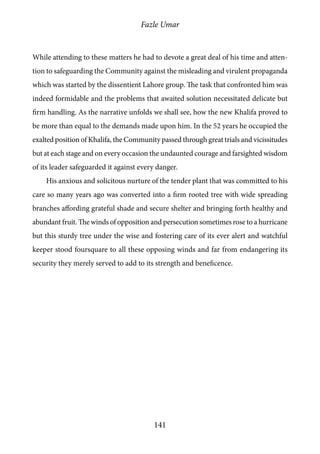


![Fazle Umar
144
Khilafat of Hadhrat Mirza Bashiruddin
Mahmud Ahmad [ra]
By Divine Grace the period of the Khilafat of Hadhrat Mirza Bashiruddin
Mahmud Ahmad [ra] extended over more than half a century and was crammed
with a succession of events that covered many aspects of individual, communal,
national and international life. A detailed history of the second Khilafat would require
many times the space that is available for this brief survey. We are thus compelled to
make a selection of certain events, which might serve as illustrations of the service that
Hadhrat Khalifatul Masih II [ra] rendered to the cause of Islam and of humanity.
Hadhrat Khalifatul Masih II [ra] was, against all outward circumstances,
under the Divine will, called to this great office at the age of 25. Among all things, the
enemies stressed on the point that he was too young and represented him as a mere
child of yesterday. They derided him and professed great concern that the destinies
of a Movement of great potential had unfortunately been committed into the hands
of an inexperienced young man. The record will demonstrate how mistaken was their
estimation of the capacities and high resolve of that young man, and how perfect and
justified was his reliance on the Grace and Mercy of God.
When he took up the reins as the Second Successor of the Promised Messiah
[as], the financial resources of the Sadr Anjuman Ahmadiyya had been reduced to
almost zero. A major portion of the prominent and leading people in the set up of
the Movement took up a position of uncompromising hostility. However, he gave no
importance to any obstacle placed in his path. In a spirit of utmost reliance on the
Grace and Mercy of God, he took charge at a time when he utterly lacked the material
means, of which at least a modicum of some sort is indispensable for implementing
spectacular policies and programmes.](https://image.slidesharecdn.com/fazl-e-umar-160102120102/85/Fazl-e-Umar-150-320.jpg)
![Fazle Umar
145
Though, with the exception of possibly fifty people, all those who were present
at Qadian on 14 March 1914 had made the covenant of Bai’at with him, yet it was not
known what the reaction of the Community at large would be to the question that
Maulvi Muhammad Ali had raised in his tract. The dissident group had announced
that they had the support of 95 per cent of the Community. It had yet to be seen how
far their claim was justified in fact. Such was the situation in the estimation of a secular
person who had no idea of the positive and powerful assets and resources to which
the newly elected Khalifa had access and which were wholly of a spiritual character.
His own state of mind at the time might be judged to some degree from the
address that he delivered to the large gathering of those who were present in Qadian
and had made the covenant of Bai’at on 14 March 1914. This was his first address to
the Community which followed immediately upon his election as the Khalifa. After
a long silent prayer in which everyone present joined, he spoke as follows:
“…I urge you to follow the example of the Companions of the Holy Prophet,
may Allah be pleased with them. They represented in their persons and conduct
the result of the prayers and perfect instruction of the Holy Prophet [saw]
. After his death the second consensus that took place was on the setting up of
the system of the truly guided Khilafat. If you study the history of Islam and
reflect upon it, you will find that the progress made by Islam during the time
of the rightly-guided Khalifas, began to decline when the Khilafat took on the
form of kingship, and Islam and the Muslims were progressively reduced to the
condition which you observe today…Therefore, so long as this system continues
in force Islam will continue to progress materially as well as spiritually.
I tell you truly that I have a fear in my heart as I find myself extremely weak.
We are told in the Hadith that we should not set a task for a slave which might
be beyond his strength. At this time you have sought to make me your slave,](https://image.slidesharecdn.com/fazl-e-umar-160102120102/85/Fazl-e-Umar-151-320.jpg)
![Fazle Umar
146
then do not set me a task that might be beyond my strength. I know that I am
weak and sinful. How can I claim that I would be able to guide mankind and
would spread truth and righteousness? Our number is small and the enemies
of Islam are legion, but we have high hopes in the Grace and Benevolence of
God Almighty and in His support of the humble.
Our united task is to give practical effect to the progress of the Movement and the
achievement of its purpose. Now that you have established a relationship with
me you should carry it on loyally. By God’s Grace we shall exercise forbearance
towards each other; but you will have to obey me in all good things. I repeat
that you must not act contrary to my directions in all good matters. If you make
obedience your rule and adhere strictly to this covenant then be sure that God
Almighty will lead us of His Grace and our united supplications will bear fruit.
Our first duty is to propagate Islam. We must make a united effort to win
the favour and Grace of God. I urge you repeatedly that having established a
relationship with me, after the Promised Messiah [as], you must fulfil the
obligations of that relationship loyally and remember me in your prayers. I shall
continue to remember you in my prayers. I have never made any supplication
in which I have not prayed for the members of the Movement. From now on
I shall do it still more. Be warned that you must do nothing contrary to your
covenant with God Almighty. Our supplication should be that we should live
as Muslims and die Muslims. Amen.”
Decline of the Dissident Lahore Group
That from his childhood onwards he was by Divine Grace enabled to lead a pure and
beneficent life is testified to by the fact that at an early age he began to have experience of
truedreams,visionsandrevelation.Whilehewasstillatschoolhereceivedtherevelation:](https://image.slidesharecdn.com/fazl-e-umar-160102120102/85/Fazl-e-Umar-152-320.jpg)
![Fazle Umar
147
“I shall place those who follow thee above those who reject thee, unto the Day
of Judgment.”
This was a clear indication that he would one day be called to a position of spiritual
authority in which he would be supported by many and would be rejected by others,
and those who accepted him would always be upheld above those who rejected him.
This has been fulfilled progressively ever since. Within a few weeks of his election as
Khalifa more than 90 per cent of the Community swore allegiance to him, and the
claim of his opponents that they had the support of 95 per cent of the Community
was thus falsified.
Still another asset that God Almighty, by His Grace, furnished to Hadhrat
Khalifatul Masih II [ra] was his very keen intelligence not only concerning matters
spiritual but of matters relating to every aspect of individual, communal and national
life. In the spiritual sphere he was bestowed deep and profound knowledge of the
Holy Qur’an which was manifested continuously in his speeches and writings and
more particularly in his two commentaries on the Holy Qur’an, Tafseer Sagheer and
Tafseer Kabeer. In the economic and political spheres also he displayed a penetrating
intelligence and a faculty of appraisal that was astonishing.
He was greatly favoured by God Almighty through the acceptance of his prayers,
which helped to strengthen his relationship of affection and devotion with the mem-
bers of the Community and contributed hugely to the spread of the Movement and
the expansion of its influence.
Numerous dreams of his relating to national and international events helped to
impress the minds of large numbers of people in positions of authority and influence
by their striking fulfilment.
The dissident group had formed an Association of their own which they called
Ahmadiyya Anjuman Ishaate Islam (Ahmadiyya Association for the Propagation of](https://image.slidesharecdn.com/fazl-e-umar-160102120102/85/Fazl-e-Umar-153-320.jpg)
![Fazle Umar
148
Islam), with Maulvi Muhammad Ali as its head. To start with they appointed four
of their leading members, Maulvi Muhammad Ali, Khawaja Kamal Uddin, Maulvi
Ghulam Hasan Khan, and Syed Hamid Shah sahib, Khalifatul Masih; but they soon
abandoned this ridiculous attempt at make-believe. Of these four gentlemen the last
named made his covenant of Bai’at at the hands of Hadhrat Khalifatul Masih II [ra]
within a few weeks. Years later Maulvi Ghulam Hasan Khan sahib also swore allegiance
to Hadhrat Khalifatul Masih II [ra].
Maulvi Muhammad Ali was given the title of Amir and in his sermons and
addresses began to stress his own concept of his functions and authority as Amir, which
was indistinguishable from the concept of the functions and authority of Khalifa as
set out by Hadhrat Khalifatul Masih I [ra]. The real distinction, however, was that
Maulvi Muhammad Ali, though he insisted upon it, was not accorded that sincere
and wholehearted obedience and reverence by the members of the dissident group
as the Community most willingly and cheerfully accorded to the Khalifatul Masih.
Hostility towards Hadhrat Khalifatul Masih II [ra] and fault finding with all
that he said and did, derived from suspicion of his motives and ill-will towards him,
remained for a long time a cardinal factor in the policies and activities of the group.
Their principal organ for giving expression to their policies, doctrines and ambitions
was the Paigham Sulh; but from time to time they published pamphlets, brochures
and booklets on matters of controversy between them and the Community. For
instance, Maulvi Muhammad Ali published his own version of the differences that
had arisen over the subject of Khilafat and the election of the Khalifa and called it The
Split. Hadhrat Khalifatul Masih II [ra] rejoined with a detailed and well-reasoned
account under the title The Truth About the Split, which established very clearly that
the entire responsibility for the split lay on Maulvi Muhammad Ali and some of his
close associates.](https://image.slidesharecdn.com/fazl-e-umar-160102120102/85/Fazl-e-Umar-154-320.jpg)
![Fazle Umar
149
The pattern that developed and continued over a number of years without inter-
ruption was that progressively the number and strength of the Community continued
to grow visibly and perceptibly, and a visible decline set in on the side of the dissident
group till their activities were reduced to insignificance.
Right in the middle of the acute period of the controversy, immediately after the
demise of Hadhrat Khalifatul Masih I [ra], the second Khalifa received the revela-
tion (Arabic): “He will shatter them.”
This prophecy has been strikingly fulfilled over the years. Fairly early they pre-
sented the spectacle, ‘Thou thinkest them to be united but their hearts are divided;
that is because they are a people without sense’ (The Holy Qur’an Ch.59:V.15). Sharp
differences manifested themselves between Maulvi Muhammad Ali and other leading
figures in the group, and the tensions thereby generated became so acute that in his
will Maulvi Muhammad Ali specified by name those of the group whose hostility and
rancour towards him had embittered his life, and gave the direction that not a single
one of them should take any part in his funeral rites. Thus was fulfilled the prophecy
of Hadhrat Khalifatul Masih II [ra], “He will shatter them.” Several persons of note
and a large number out of the bulk of their group had, even in the lifetime of Maulvi
Muhammad Ali, left the group and sworn allegiance to Hadhrat Khalifatul Masih II
[ra]. On the other hand large numbers of them gradually became indifferent and
merged into the orthodox body of Muslims. The second generation of the group, with
a few exceptions, lost all interest in religion and ceased to attach any importance to
higher moral qualities and spiritual values.
Some idea of the progress made by the Movement under the fostering care and
wise leadership and guidance of Hadhrat Khalifatul Masih II [ra] might be formed
on the basis of the attendance in the Annual Conferences of the Movement. In the
last conference under Hadhrat Khalifatul Masih I [ra] in 1913, the attendance was](https://image.slidesharecdn.com/fazl-e-umar-160102120102/85/Fazl-e-Umar-155-320.jpg)
![Fazle Umar
150
approximately three thousand. In the conference of 1964, the last one during the second
Khilafat, the attendance was over seventy-five thousand.
In the Annual Conference of the dissident group, the attendance seldom, if ever,
exceeded two thousand and then began to decline progressively so that in 1976 the
attendance did not reach even four hundred, of whom at least two hundred were
members of the Community.
Consolidation of the Movement
Even the first few years of his Khilafat, in which differences with the dissident
group continued acute and their activities claimed a sizeable portion of the time and
attention of Hadhrat Khalifatul Masih II [ra], his efforts were primarily directed
towards the consolidation of the Community and converting it into an effective instru-
ment for the achievement of the purpose for which it had been established, that is to
say, to bring about the supremacy of Islam over all other religions both through precept
and through example. While his addresses and writings aimed at the stimulation of
the higher moral and spiritual values in the hearts of the members of the Community
and their practical manifestation in action, he did not neglect any of the multifari-
ous factors that awaited his attention and had to be speedily attended to. One of the
most important of these was the organisation of the administrative machinery of the
Community, that is to say the casting of the Sadr Anjuman Ahmadiyya into an effec-
tive and practical mould. This he carried out with such farsighted effectiveness as has
successfully stood the test of trials and time. It is true that in the course of time his own
dynamism and the dynamism of the Community, which was continuously stimulated
under his fostering care, called for additional organs and institutions which were set up
when their need arose, in such manner that the possibility and risk of conflict between
the Sadr Anjuman Ahmadiyya and the new institutions was obviated altogether. The](https://image.slidesharecdn.com/fazl-e-umar-160102120102/85/Fazl-e-Umar-156-320.jpg)
![Fazle Umar
151
Khalifa’s comprehensive supervision and a continuous flow of advice and directions
contributed very largely towards keeping everyone alert and keen on doing his best.
Though this was an essential task and its successful performance was a great
achievement, yet it was only ancillary and adjectival to his main responsibility, for the
discharge of which he strove hard day and night. That responsibility was to maintain the
Community at the highest level of activity, both in respect of self improvement and in
respect of striving to carry the message of Islam to wider and wider circles by putting
forth all the needed effort and making all the required sacrifices. For this purpose he
called in aid all his great talents; he had recourse to continuous advice, exhortation
and admonition; he set a high and shining personal example and spent a good part
of his nights in supplication to the Divine, without Whose Grace and Mercy nothing
could possibly be achieved.
Promotion of the Welfare of the Whole of
Mankind
Yet that was not all. His horizon was not limited to the Community. His lord and
master, the Holy Prophet [saw], was in the words of the Holy Qur’an: “mercy for
the universe” (Ch.21:V.108). His father, the Promised Messiah [as], was a perfect
reflection of the Holy Prophet [saw]; the prophecy set out in the announcement
of 20 February 1886, concerning his own coming into being, described him as a sign
of Divine Mercy. His beneficence, therefore, comprehended the whole of mankind.
He was keenly interested in promoting the true welfare of all Muslims wherever they
might be, as they were the Ummat of his lord and master, the Holy Prophet [saw],
however much mistaken they might be in some of their beliefs and doctrines; he was
also keenly interested in promoting the true welfare of all his fellow countrymen, of
whatever caste or creed, and in promoting the true welfare of all his fellow human](https://image.slidesharecdn.com/fazl-e-umar-160102120102/85/Fazl-e-Umar-157-320.jpg)
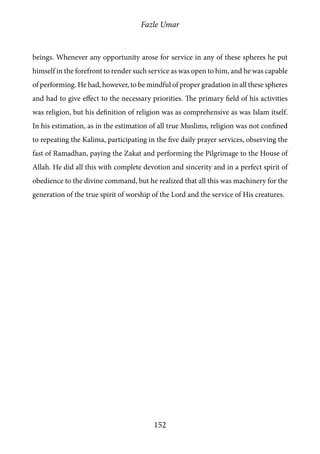
![Fazle Umar
153
Independence of India
During the second half of the 19th Century Muslim minds were apathetic, lazy and
divided. In the first half, by conquest, Sikhs had taken over many territories previously
ruled by Muslims. Then British military power, fuelled by the Industrial Revolution
in Britain, took over and the Indian Empire was born. Muslim religious leaders made
the problem more acute by their persistent preaching of hatred of the British and all
their works. Contacts with British officials and entry into government educational
institutions were largely shunned. The learning of English was held to be tantamount
to apostasy from the faith. The Muslims turned their backs on everything and chose
to sulk in their tents while they received no better than step-motherly treatment from
the British authorities.96
The Promised Messiah [as] had throughout his life, strongly advocated and held
that the Muslims in India were an entirely separate entity and hence promoted the two-
nation theory. He commanded his followers to keep away from the Hindu Congress.
The year 1905 was a milestone in the political activities of the Indian Muslims.
The reaction of the Hindus to the division of Bengal and East Bengal (roughly cor-
responding to the modern state of Bangladesh) by Lord Curzon, the Viceroy of India,
led the Muslims for the first time to realise the importance of their separate entity
from the Hindus.
The Hindus dominated commerce and controlled business all over India and also
held key positions in Government administration. They were not given due share in
the Councils, High Courts, Chief Courts, Municipal and District Boards.
To address this issue, the Viceroy of India appointed a Commission to deliberate
over the reforms in connection with admitting a much larger number of Indians in
the army and in the civil administration in executive posts. To keep quiet at this stage](https://image.slidesharecdn.com/fazl-e-umar-160102120102/85/Fazl-e-Umar-159-320.jpg)
![Fazle Umar
154
would have been suicidal for the Muslims. Hence a deputation of chosen leaders,
including notable Ahmadis, from all over India waited upon the Viceroy.
The Commission led by Lord Minto, the Viceroy of India, accepted the demands of
the Muslim deputation that the Muslims were a separate nation from the Hindus and
should be given due share in all posts in proportion to the population in the country.
This was the jubilant atmosphere in which the All-India Muslim League was founded
in Dacca on 30 December 1906.
The Hindus in the Bengal became very restless and engaged themselves in sub-
versive activities after the inauguration of the All-India Muslim League. In the last
General Gathering during his life, the Promised Messiah [as] advised his followers:
“You must have little to do with the Hindus. If the English leave this country
they would tear the Muslims into bits and pieces.” 97
The above views of the Founder of the Ahmadiyya Movement are a pointer to the
dire necessity of separate Muslim States like Pakistan. In his last book of the title “The
Message of Peace” (Paigham-i-Sulha), he supported the two-nation theory and threw
light on the importance of a separate organisation like the Muslim League. He said:
“Anyone can easily understand why the Muslims are sceptical about joining
the Hindus in the demand for their political rights and why they have avoided
joining the Congress although they entirely agree with the truth and necessity of
making these demands. They fully appreciate the political sagacity of the Hindus
and have, like them, asked for their rights. But they have demanded their rights
separately and refused to walk hand-in-hand with them. The reason for this,
gentlemen, is faith and nothing else”. 98
In obedience to the command of the Promised Messiah [as], the Ahmadis had
sincere sympathies with the Muslim League and during the ministry of the first Khalifa,
Hadhrat Maulvi Nooruddin [ra], (1908-1914) the attachment became still stronger.](https://image.slidesharecdn.com/fazl-e-umar-160102120102/85/Fazl-e-Umar-160-320.jpg)
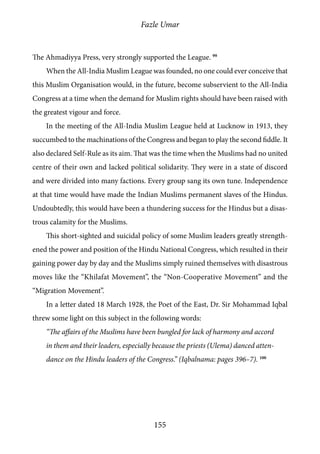
![Fazle Umar
156
Political Debut of Hadhrat Khalifatul Masih II [ra]
The First World War, which had been prophesied by the Promised Messiah [as]
some years earlier, broke out within less than five months of the election of Hadhrat
Khalifatul Masih II [ra] to his exalted office. As the war proceeded Indian political
leaders began to hope, and then to demand, that after the cessation of hostilities, India
should advance constitutionally to the status of a Dominion (to be part of the British
Commonwealth with independent self-government). In response to this demand His
Majesty’s Government announced in Parliament in August 1917, that the objective of
British policy in India was the attainment of Dominion status by India.
In pursuance of this declaration Mr Edwin Samuel Montague, Secretary of State
for India, visited India for the purpose of ascertaining public opinion on the shape
and measure of India’s advance towards Dominion status after the end of the war.
Representatives of political and sectional organisations were invited to Delhi to place
their views before His Excellency the Governor General, Lord Chelmsford, and the
Secretary of State.
Hadhrat Khalifatul Masih II [ra] also received an invitation to go to Delhi to
meet the Governor General and the Secretary of State and to present his views. He
prepared an address and went to Delhi with a delegation composed of certain leading
members of the Community. In the meeting one of them read out the English transla-
tion of the address which had been prepared by Hadhrat Khalifatul Masih II [ra]. He
himself had separate interviews with the Secretary of State and the Governor General
for the purpose of an exchange of views. The Secretary of State told him that he had
been much impressed with the address and sought clarification on certain points. He
had also taken careful note of the suggestions made in the address, two or three of
which he intended to incorporate in his report so that they should not be overlooked
when final proposals would be formulated. This was Hadhrat Khalifatul Masih’s debut](https://image.slidesharecdn.com/fazl-e-umar-160102120102/85/Fazl-e-Umar-162-320.jpg)
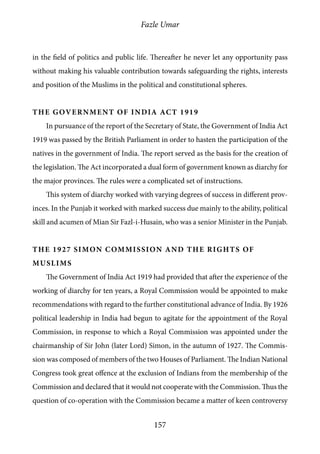
![Fazle Umar
158
in Indian political circles. In an effort to placate opposition to the Commission, it was
announced that the Commission would invite a committee of the Central Indian Leg-
islature to sit with it and to participate in its proceedings while the Commission exam-
ined witnesses, and when the Commission visited each province, a committee elected
by the Provincial Legislature should also sit with it and participate in its meetings.
Hadhrat Khalifatul Masih II [ra] came out very strongly in support of the
presentation of the Muslim case before the Commission, both at the provincial and
central levels. He made out a strong case in favour of cooperation; lest the Muslim
case should go by default. He did not profess to hope for any very favourable result
from the report of the Commission, but was anxious that the Muslim case should be
put clearly and forcibly before the Commission.
The very strong plea that Hadhrat Khalifatul Masih II [ra] made for coopera-
tion had considerable influence in persuading Muslims to cooperate in setting up the
Central and Provincial committees which were to work with the Commission.
Rights of Muslims and the 1928 Nehru Report
Parallel with the activities of the Simon Commission, the All India Congress
established a committee of ten members under the chairmanship of Pandit Moti Lal
Nehru for the purpose of proposing a constitution for India which should have the
support of all political parties and minorities, and which could be treated as the agreed
demand of the whole of India. The committee was known as the Nehru Committee.
Its report was published on 12 August 1928.
Hadhrat Khalifatul Masih II [ra] was much perturbed on reading the report
as the proposals embodied in it, if they were accepted and given effect to in the future
constitution of India, would place the Muslims of India completely at the mercy of
the majority and their future in India would be put in serious jeopardy. He carried out](https://image.slidesharecdn.com/fazl-e-umar-160102120102/85/Fazl-e-Umar-164-320.jpg)
![Fazle Umar
159
a penetrating analysis of the report which was published in seven instalments in the
Al-Fazl, and was subsequently issued in the form of a book entitled Muslim Rights
and the Nehru Report.
At the beginning the reaction of an important section of Muslim leaders and the
Muslim press was, on the whole, in favour of the Nehru Report. But the analysis of the
Report by the Khalifatul Masih alerted Muslim leadership to the dangers to which the
Muslims would be exposed in case those proposals were accepted. It was then freely
acknowledged that the keen intellect and the political foresight of Hadhrat Khalifatul
Masih II [ra] had served to rescue the Muslims of India from the serious hazard to
which their fortunes had been exposed by the Nehru Report.
Reaction to the Simon Commission Report and the
Round Table Conference
The report of the Simon Commission proved most disappointing and was univer-
sally condemned in India as a reactionary document. His Majesty’s Government was so
impressed by the force of this reaction that it authorised the Governor General, Lord
Irwin (later Lord Halifax) to announce on 31 October 1929 that Dominion status for
India was the immediate objective of His Majesty’s Government and for the purpose
of ascertaining Indian public opinion on the future constitution of India it proposed
to invite the representatives of British India and of Indian states for consultation and
advice to a Round Table Conference to be held in London. This announcement was
followed on 12 May 1930 by the intimation that the Round Table Conference would
be called together on or about 20 November 1930.
On this occasion also Hadhrat Khalifatul Masih II [ra] prepared and published
a well-reasoned analysis of the report of the Simon Commission and put forward
his suggestions with regard to the shape of the future constitution of India together](https://image.slidesharecdn.com/fazl-e-umar-160102120102/85/Fazl-e-Umar-165-320.jpg)
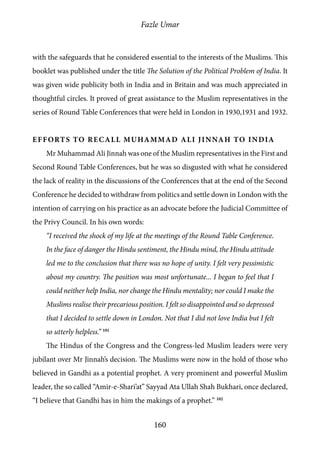
![Fazle Umar
161
It was this very leader who gave his ruling that, “Those who vote for the Muslim
League are swine and swine-eaters.” 103
Another prominent leader, Maulvi Habeebur Rahman of Ludhiana, President of
the Ahrar organisation believed that:
“Ten thousand Jinnahs, Shaukats and Zafars could safely be sacrificed at the
point of the shoe of Jawaharlal Nehru.” (Chamanistan by Maulana Zaffar Ali
Khan, pg.165). 104
By 1933, Hadhrat Khalifatul Masih II [ra] was so distressed at the prospect
facing Muslims in India, he felt very strongly that a person of the political sagacity and
iron nerve of Mr Jinnah was needed to secure for the Muslims a decent political future.
He, therefore, directed Mr A. R. Dard, Imam of the London Mosque, to get in touch
with Mr Jinnah and try to persuade him to return to India and take up the fight for
the cause of the Muslims. Mr Dard called on Mr Jinnah and had a long talk with him.
He found that the task assigned to him by the Khalifatul Masih was a very uphill one.
Mr Jinnah was most reluctant, but eventually changed his mind and agreed to return
to India and to place himself at the head of the political struggle of the Muslims for
safeguarding their position in an independent India. Mr Jinnah was approached from
time to time by certain leading figures among the Muslims of India who also urged
him to return to India. But there can be no doubt that what prevailed with him in
the end was the persistence of Mr Dard under the directions of the Khalifatul Masih.
When Mr Jinnah intimated his willingness to return to India, Mr Dard held
a reception in his honour at the London Mosque which was very well attended.
Mr Jinnah addressed the gathering on the India of the future. He started with the
announcement that Mr Dard’s persuasion had compelled him to enter the political
field again from which he had withdrawn some time back. He said, “The eloquent
persuasion of the Imam left me no way of escape.” His speech was widely reported.](https://image.slidesharecdn.com/fazl-e-umar-160102120102/85/Fazl-e-Umar-167-320.jpg)
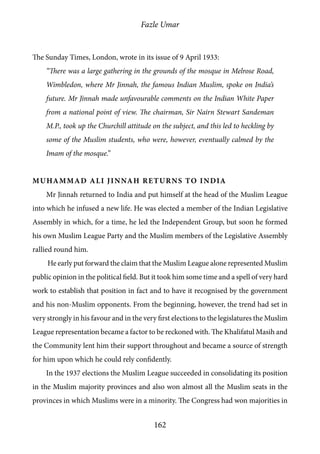
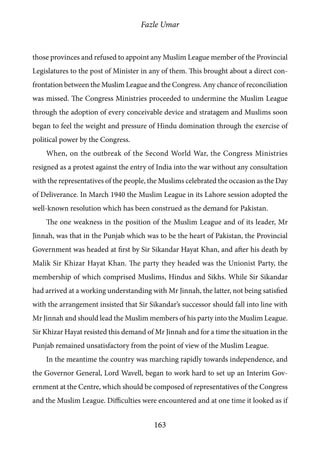
![Fazle Umar
164
the Muslim League might be bypassed in the formation of the Cabinet. This prospect
seriously disturbed Hadhrat Khalifatul Masih II [ra] who moved personally to Delhi
and was instrumental in creating a situation, in consultation with Mr Jinnah and with
the cooperation and assistance of His Highness the Nawab of Bhopal, in which the
way was opened for the Muslim League to be invited to join the Interim Government
on terms acceptable to Mr Jinnah.
The Cabinet Mission, 1946
In the spring of 1946, His Majesty’s Government sent out a Commission, com-
posed of three members of the Cabinet, to India to try to bring about a settlement
between the Congress and the Muslim League. The Commission became known
as the Cabinet Mission. It worked hard and unsparingly, and in the middle of the
summer put forward a plan which, to the surprise of everyone, was accepted by both
parties. Prime Minister Nehru, who was also President of the Congress, had, however,
second thoughts on some of the features of the plan and announced an interpretation
of certain paragraphs of the plan which the language was not capable of bearing. Mr
Jinnah was outraged by this subterfuge and announced that unless Mr Nehru made it
plain beyond doubt that the Congress would work the Cabinet Mission Plan according
to its plain and true import, the Muslim league would not join in working the Plan.
Thereupon, the Governor General, Lord Wavell, sent for Mr Gandhi and Mr Nehru and
tried hard to obtain from them the assurance that would satisfy Mr Jinnah. However,
Mr Gandhi and Mr Nehru took up the position that it was for them to interpret the
Plan and their interpretation must be accepted and given effect to. The situation again
became deadlocked, and Prime Minister Attlee summoned Mr Nehru and Mr Jinnah
to London towards the end of 1946 in the hope that he might be able to resolve the
deadlock. But his hope proved vain and it became necessary to have recourse to some](https://image.slidesharecdn.com/fazl-e-umar-160102120102/85/Fazl-e-Umar-170-320.jpg)
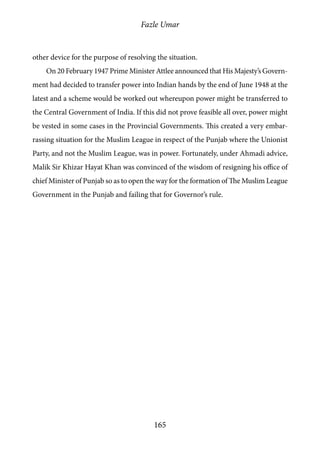
![Fazle Umar
166
The Shuddhi Movement
In the province of Uttar Pradesh (UP), India there was a large section of Muslims
who were known as Malkana Rajput. Hindu influence in their customs and beliefs
was widespread to the extent that they worshiped idols despite the fact that they were
Muslims. During 1922–23 the militant wing of the Hindu Arya Samaj devised a plan
to reconvert these people to Hinduism. These Hindus believed that the only way to
achieve Hindu–Muslim unity was to turn all the Muslims into Hindus.105
As a result
of this “Shuddhi campaign”, as it was called, scores of Malkana Muslims converted
to Hinduism. As soon as Hadhrat Khalifatul Masih II [ra] came to know of this
apostasy movement he immediately launched a counter campaign.
Thousands of Ahmadis offered themselves to do the missionary work for a period
of three months entirely at their own expense, at the expiry of which they would be
replaced by fresh batches of volunteers. They travelled to Uttar Pradesh and started the
missionary work with great zeal. Hadhrat Khalifatul Masih alerted the non–Ahmadi
Muslims against the gravity of the danger that threatened and appealed to them to
make common cause with the Ahmadis against the challenge of the Arya Samaj. He
made it quite clear that the Muslim effort should be directed towards strengthening
the faith of the Malkanas in Islam and that no sectional advantage should be sought
to be derived from the situation with which they were faced.
These volunteers rigorously worked there day and night. One particular feature
of the campaign was that it opened at the height of the dry summer season, and the
volunteers who perforce came from urban areas and were accustomed to the ameni-
ties available in towns and cities for the purpose of mitigating the extreme discomfort
resulting from the very high temperatures in the summer months, were called upon to
work in rural areas at unaccustomed tasks in conditions of extreme discomfort. Their](https://image.slidesharecdn.com/fazl-e-umar-160102120102/85/Fazl-e-Umar-172-320.jpg)
![Fazle Umar
167
food was mostly rough and unappetising, and cold drinking water was a luxury that
was not readily available everywhere.
The movement of apostasy petered out in due course. Thousands of Muslims
were saved from being converted to Hinduism. Those who did convert subsequently
decided to join the fold of Islam. The whole campaign while it lasted assumed and
maintained the character of the exercise of the highest moral and spiritual values. While
the outward emphasis was on hard labour, the inward emphasis was on eagerness in
winning the pleasure of God.
In contrast, the effort mounted by non–Ahmadi Muslims was half–hearted, spo-
radic, hesitant and lacking in willingness in the face of discomfort. It soon became
apparent and was freely acknowledged, that the campaign organised and set in motion
by Hadhrat Khalifatul Masih II [ra] was alone proving effective against the activities
of the Arya Samaj which were well supported with men and money. The Arya Samaj
had to beat a reluctant and rueful retreat. The non–Ahmadi leadership and the Press
expressed great appreciation of the stand Hadhrat Khalifatul Masih II [ra] had taken
throughout the campaign that he had organised and continued to direct over several
months till the object had been fully achieved.
The activities of the Community in the Malkana areas not only succeeded in
averting the immediate danger that had threatened but gave substantial sections of
the Community valuable training in the field of missionary work and inured them to
physical hardships.](https://image.slidesharecdn.com/fazl-e-umar-160102120102/85/Fazl-e-Umar-173-320.jpg)
![Fazle Umar
168
Trip to Europe
First Mission in the UK
Towards the close of the 19th Century, Dr. Leitner, Principal of the Oriental Col-
lege, Lahore, built the Shah Jehan Mosque and the Memorial House outside Woking in
Surrey at a distance of 24 miles from London by money donated by Indian Muslims.
This mosque was eventually handed over to the Rt Hon. Syed Ameer Ali. He agreed to
put Khawaja Kamal Uddin in charge of the Mosque and Memorial House in the spring
of 1913. The Mosque was to be used as a place of Muslim worship and the Memorial
House as the residence of the Imam.
As his work and responsibilities expanded he requested Hadhrat Khalifatul Masih
I [ra] that someone might be sent over to assist him in his work. In response to his
request Hadhrat Khalifatul Masih arranged to send Chaudhri Fateh Muhammad Syal
M.A. to England to assist Khawaja sahib in his work.
On the death of Hadhrat Khalifatul Masih I [ra], Chaudhri Fateh Muhammad
Syal swore allegiance to Hadhrat Khalifatul Masih II [ra], who directed him to move
to London and start the first Ahmadiyya Mission in England.
Some years later the house and grounds at 63 Melrose Road, London SW18, were
acquired as the headquarters of the Mission and it was decided to build a Mosque in
a part of the garden of 63 Melrose Road.
Conference of the Principal Religions of the
British Empire
A great Imperial Exhibition was held at Wembley, a few miles out of London, in
1924. It was expected to attract visitors from all parts of the British Empire and a few](https://image.slidesharecdn.com/fazl-e-umar-160102120102/85/Fazl-e-Umar-174-320.jpg)
![Fazle Umar
169
public-spirited persons, who took an interest in comparative religion, thought that it
would be a good opportunity to hold a “conference of the principal religions of the
Empire” to which representatives of those religions might be invited to deliver addresses
expounding the principles and teachings of their respective faiths.
Hadhrat Khalifatul Masih II [ra] accepted the invitation to participate in the
conference. However, the main and primary object of undertaking the long journey
by sea was to study personally the social, economic and political conditions in Europe,
which more than the logic and truth of Church Christianity stood in the way of Islam.
Referring to the invitation in a statement printed in the “Al Fazl” of 24 June 1924, Hadh-
rat Khalifatul Masih remarked that the office and position of the Khalifa is not one of
a lecturing preacher or missionary that he should feel constrained or called upon to
lecture now here and now there as the need arose. He also warned that the trip would
not suffice to win the allegiance of Europe to Islam. He admitted that extraordinary
changes sometimes did take place with extraordinary speed but these were never due
to mortal endeavour; they were brought about by the powerful hand of God.
Two Dreams
This statement of June 1924 also contains an account of two significant dreams of
Hadhrat Khalifatul Masih II [ra], one about three or four years prior to the occasion
and the other two or three months before. Huzur states: -
“I saw myself present in an assembly comprising prominent members of the
Parliament, Lords of the realm and Members of the Cabinet. The gathering
had the air of some important function and Mr. Lloyd George was addressing
the audience. While he was speaking, a remarkable change came over him and
he started pacing up and down in the hall. Unusual signs of agitation were
witnessed in him which gave the impression that his mind had given way under](https://image.slidesharecdn.com/fazl-e-umar-160102120102/85/Fazl-e-Umar-175-320.jpg)
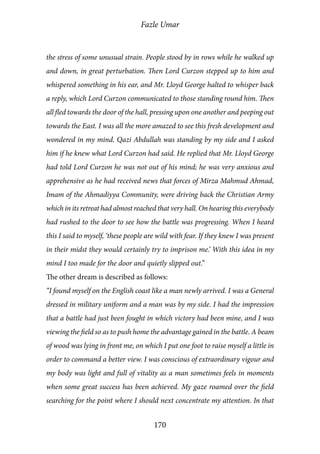
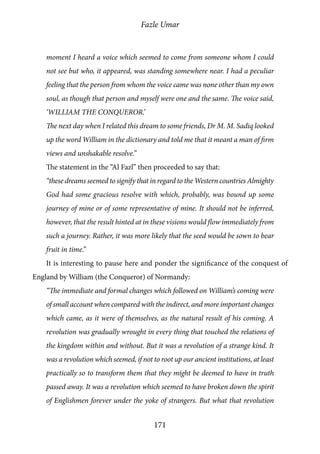
![Fazle Umar
172
really did was to call forth the spirit of Englishmen in a stronger and a more
abiding shape, and to enable us to bring back under new forms the substance
of the institutions which seemed for a moment to have passed away.” 106
This appraisal of the Conquest of England by William of Normandy is one on
which all historians agree, and its keynote is that changes which came in its wake
came silently and “of themselves”, so as to say, and they were thorough, deep, and
far-reaching in effect. The wonderful vision of Hadhrat Khalifatul Masih recounted
above gives us, thus, a clue as to the manner in which Islam would spread in Great
Britain and seem to “root up” its “ancient institutions” and to “break down the spirit
of Englishmen”, while in actual fact it would only call forth that spirit in a stronger and
more abiding shape and bring back, in new forms, “the substance of the institutions
which seemed for a moment to have passed away.” And the movement towards this
silent revolution would be initiated through a personal survey of the field by Hadhrat
Khalifatul Masih II [ra].
Journey to Damascus
This then was the primary object of Hadhrat Khalifatul Masih II [ra]in his jour-
ney to England, the occasion for which was provided by the Conference on Religions.
Another consideration that had weight with him was to fulfil a prophecy of the Holy
Prophet Mohammad [saw] with regard to the Promised Messiah [as], which the
Promised Messiah [as] had interpreted to signify that some successor of his would
journey to Damascus. The prophecy in the Hadith states that the Messiah in his second
advent would appear in Damascus “by the white Minaret”. On his journey to London
he had it mind to make a detour en route and pay a visit to that ancient city. A third
point he had in view was the publicity resulting from the journey and participation in
the Conference would make the Movement known to a much wider circle. 107](https://image.slidesharecdn.com/fazl-e-umar-160102120102/85/Fazl-e-Umar-178-320.jpg)
![Fazle Umar
173
On his part he immediately embarked upon a project to write a book setting forth
in some detail the principles and teachings of Islam. He wrote it in Urdu and it was
translated into English. The printing of the English translation was completed just in
time before he set out on his journey to England with a dozen companions. On his way
he stopped off at Port Said and visited, among other places, Jerusalem and Damascus.
While in Damascus, Hadhrat Khalifatul Masih II [ra] issued instructions that
enquiries should be made to find out if there was any white minaret in Damascus but
all efforts proved in vain. One morning Huzur was offering the morning prayers with
his companions. The moment the prayers finished, his eyes happened to alight on the
minaret of a mosque near the hotel. This minaret was white and it was to the east of
the hotel at which Hadhrat Khalifatul Masih was staying!
It should be remembered that the Holy Prophet Muhammad [saw] had seen in
a vision that the keys of the Roman and Persian Emperors were given to him but these
empires were subdued in the reign of his second successor, Hadhrat Omar [ra]. 108
Arrival in England
In London he took up his residence, along with his companions, at 6 Chesham
Place, SW1. His arrival in London was widely publicised in the press.
The conference was held at the Imperial Institute in South Kensington. Hadhrat
Khalifatul Masih II [ra] attended the conference at various times and thus had
opportunities of meeting a large number of people. On the day on which his paper
was to be read out he was seated on the dais with his companions and his paper was
read out by one of his principal followers, Hadhrat Chaudhry Muhammad Zafrulla
Khan [ra]. The great hall was absolutely packed with people and some people not
finding room inside the hall crowded the wide staircase that led down from the hall.
The address was listened to in absolute silence and with concentrated attention and](https://image.slidesharecdn.com/fazl-e-umar-160102120102/85/Fazl-e-Umar-179-320.jpg)
![Fazle Umar
174
when the reading was finished a deep sigh was heard to go up as if the audience had
been released from a spell, and everybody attempted to rush to the dais to shake hands
with the Khalifatul Masih, or at least approach close to him. The address received a
very good press also.
The book, Ahmadiyyat or The True Islam, by Hadhrat Khalifatul Masih II [ra]
was on sale at the Imperial Institute and on one occasion, when he was visiting the
Institute, a clergyman who had the book in his hand came up to greet him and said:
“I obtained this book of yours yesterday and started reading it after dinner. I
became so deeply interested that I went on reading it through the night and
by the time I had to come down to breakfast I had finished reading it. I have
been fascinated by it.”
The Afghan Martyrs
While the Khalifatul Masih and his party were still in London news arrived of
the tragic death by stoning of Naimatullah Khan, a young Afghan, who had studied
religion at Qadian and had returned to his own country after finishing his studies.
He was only 19 years of age and life spread out before his imagination in attractive
and alluring colours. His outstanding quality, however, was devotion to his faith. On
his way back to his country he stopped at Peshawar for a short while, where his host
asked him one evening:
“Naimatullah, you know that since the martyrdom of Sahibzada Syed Abdul
Latif sahib, more than a dozen of our people have been stoned to death in
Afghanistan under the orders of the Amir. Should you be confronted with the
same contingency, how will you behave?”
His reply was:
“Sir, if I said anything just now in answer to your question, my response would](https://image.slidesharecdn.com/fazl-e-umar-160102120102/85/Fazl-e-Umar-180-320.jpg)
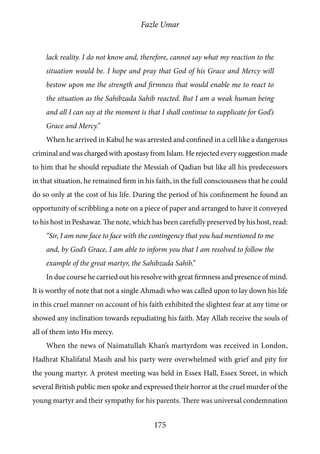
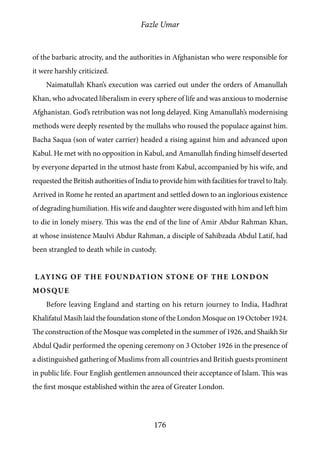
![Fazle Umar
177
Holy Prophet’s [saw] Day and Religious
Founders Day
In the late 1920s to the horror of Muslims, a graceless and shameless member
of the Arya Samaj named Rajpal published a most scurrilous and disgraceful book
concerning the Holy Prophet of Islam [saw], which he called Rangila Rasul (The
Flamboyant Messenger). The government prosecuted Rajpal for the offence of insult-
ing the memory of the Founder of a religion and thus provoking feelings of hatred
and contempt between the followers of Islam and Hinduism. Rajpal was convicted
and sentenced but was later acquitted by a High Court judge, who took the view that
the publication of the book, however offensive was its character, did not fall within
the scope of the relevant section of the Indian Penal Code. The judgment outraged
Muslims and within a short time a Muslim named Ilm Din assassinated him. Ilm Din
proudly confessed his guilt and was sentenced to be hanged. He went to his execution
cheerfully and the Muslims acclaimed him as a martyr.
The public excitement over the whole tragic affair had scarcely had time to subside
when an equally offensive article against the Holy Prophet [saw] was published in
a Hindu journal called Vartman of Amritsar. This type of performance was evidence
of the diseased mind of a section of the Hindu community, the appropriate remedy
for which had to be prescribed with care, wisdom and foresight. Hadhrat Khalifatul
Masih II [ra]considered the whole situation thoughtfully and came to the conclusion
that the entire responsibility for it did not lie upon the Hindus, and that the Muslims
also had been guilty of a serious default which should be set right as early as possible.
The immediate need was to obtain an authoritative clarification of the state of the
law regarding such offensive publications and in case of a loophole to have it filled by
legislative action. He drew up a public announcement calling upon the government to](https://image.slidesharecdn.com/fazl-e-umar-160102120102/85/Fazl-e-Umar-183-320.jpg)
![Fazle Umar
178
take prompt action to secure the desired result. This announcement was prominently
displayed in all the principal towns of the Punjab and evoked a wave of horror against
the repetition of Rajpal’s outrage by Vartman. The government fearing communal riots
decided that a Division Bench of the High Court should try the editor and publisher
of Vartman speedily, so that an authoritative construction of the relevant provision
of the law might be obtained as early as possible. The Division Bench overruled the
judgment of the single Judge in the Rajpal case and held that the action of the accused
amounted to an offence under the relevant provision of the law, and convicted the two
accused and sentenced them to a term of imprisonment. The Provincial Government
also moved the Government of India to put through an amendment of the particular
section of the Indian Penal Code so as to put it beyond all doubt that a publication of the
type of Rajpal’s book and the article in Vartman constituted an offence under the law.
The real remedy, however, that Hadhrat Khalifatul Masih II [ra] devised, was
to remind the Muslims that they had woefully neglected one of their principal duties,
namely, to present the life and character of the Holy Prophet [saw] in its true
colour to the non-Muslims. He proposed, therefore, that on a specified day in every
year public meetings should be held all over the country in which speeches should be
delivered by Muslims and non-Muslims on the life and character of the Holy Prophet
[saw]. He proposed that this scheme should be inaugurated on 17 June 1928.
He set up machinery at Qadian to make the scheme fully effective and appealed for
speakers to address the meetings to be held on 17 June. There was a most heartening
response to the appeal, not only on the part of Muslims but also of non-Muslims. The
meetings helped to clear the air to remove misunderstandings, to correct misrepre-
sentations and to create a new, wholesome and lovable image of the Holy Prophet
[saw] in the minds of non-Muslims throughout the country. These meetings have
since been repeated every year and have become a permanent feature of the efforts](https://image.slidesharecdn.com/fazl-e-umar-160102120102/85/Fazl-e-Umar-184-320.jpg)
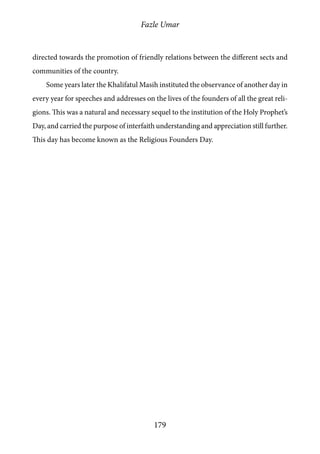
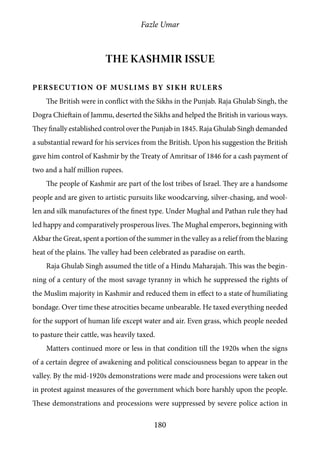
![Fazle Umar
181
which people were beaten up and occasionally shot down and killed. Matters came to
a head by 1930 when a series of riots took place which were mercilessly suppressed
entailing considerable loss of life. The Muslims of the Punjab, among whom Kash-
miris who had migrated from Kashmir into the Punjab held a high position and were
counted among the leaders, were deeply stirred by these happenings but were unable
to think of anything that could prove effective in helping their suffering and distressed
fellow Muslims in Kashmir.
The All India Kashmir Committee
Hadhrat Khalifatul Masih II [ra] was deeply touched by the plight of the
Kashmiri Muslims and decided to help them in early 1931. He invited Muslims of the
Punjab to help the Kashmir Muslims and also lobbied the government of Kashmir to
reform their draconian policies.
Hadhrat Khalifatul Masih II [ra] invited leading Muslims with a deep interest in
the Kashmir issue for consultation on 25 July 1931. They felt helpless as the British gov-
ernment was bound to shield the Maharaja because of the treaty relationship between
them. The Khalifatul Masih felt that despite all this some practical step must be taken
which should convince the people of Kashmir that a body in British India was taking
sympathetic interest in their affairs, and the Hindu Maharaja and his advisers should
be compelled to recognise that the people of Kashmir in their struggle for securing
their basic human rights had the support of a strong and active organisation across
the borders of the State. Finally it was decided that an All India Kashmir Committee
should be formed which should take all appropriate and feasible steps to secure basic
rights for the people of Kashmir, and the Committee’s activities should not cease till
the full achievement of this purpose. Agreement having been reached on the setting
up of the Committee all those who were present in the consultation expressed their](https://image.slidesharecdn.com/fazl-e-umar-160102120102/85/Fazl-e-Umar-187-320.jpg)
![Fazle Umar
182
eagerness to become members of the Committee and thus the Committee came into
being. Immediately thereupon Dr Sir Muhammad Iqbal, who was himself an eminent
Kashmiri, proposed that the Head of the Movement should be elected President of
the Committee. Huzur was elected its president on 25 July 1931 with many leading
Muslims including Sir Muhammad Iqbal as its members.
Achievements of the Committee under the
leadership of Hadhrat Khalifatul Masih II [ra]
The committee won many battles and achieved almost revolutionary results over a
two-year period under his vibrant leadership. The problems that confronted the com-
mittee and its President extended all the way from providing relief for the distressed, to
urging the officials of the Kashmir administration to perform their duties in a spirit of
helpfulness, sympathy and humanity, to providing legal aid for the very large number
of the people of Kashmir who were prosecuted on false charges and were made the
victims of police aggression and sometimes even of judicial repression.
To provide finances for all the multifarious activities of the Committee the Khali-
fatul Masih had to supplement the modest donations made to the Committee by its
well-wishers, and for this purpose he imposed a cess on all members of the Movement
in addition to the contributions that they made towards financing the Movement
itself. The incidence of the Kashmir cess was not at all heavy and the members of the
Movement paid the cess cheerfully for several years, even after the direct activities of
the Committee had been wound up. Thereafter the proceeds of the cess were utilised
for providing relief to the people of Kashmir in respect of their pressing needs.
The Maharajah was compelled to grant civil rights to the Kashmir Muslims which
they had been deprived of previously. Distinguished Muslim leaders from Kashmir,
like Shaikh Muhammad Abdullah frequently visited Qadian to seek political advice.](https://image.slidesharecdn.com/fazl-e-umar-160102120102/85/Fazl-e-Umar-188-320.jpg)
![Fazle Umar
183
They acknowledged orally as well as in writing that Hadhrat Khalifatul Masih II [ra]
came to the rescue of the Kashmir Muslims when help was needed desperately.
The enemies of Ahmadiyyat had taken notice that Ahmadis were becoming
popular among Muslim masses. This included some eminent Muslim leaders who
were seeking advice from the Head of the Movement. These leaders often followed his
advice exactly as told. This situation made others mad with jealousy. They raised the
theological issue of who is an Ahmadi and who is a non-Ahmadi among the members
of the committee. They incited Muslims against the members of the Movement.
Realising their wickedness Hadhrat Khalifatul Masih II [ra] handed in his res-
ignation as President of the All India Kashmir Committee. Nevertheless he continued
his relentless support for the cause of Kashmiri Muslims.
The Ahrar
A short time before the All India Kashmir Committee had been set up a new politi-
cal party had been formed in the Punjab called the Ahrar (the Free). Its membership
was confined to Muslims and its leadership was vested in persons whose only purpose
was to exploit every situation for their personal benefit. In their political outlook they
supported the policies of the All India National Congress and the bulk of the Muslims
of the Punjab looked upon them as the Muslim wing of the Congress. They were not,
however, firmly committed to any set of principles or policies. They trimmed their
sails according to the direction of the prevailing wind. The only policy to which they
consistently adhered was their proclaimed virulent opposition to the Movement. This
attitude of theirs was not inspired by any concern for religious doctrine or teaching
but had been prompted by the consideration that opposition to and hostility towards
the Movement would win them easy popularity among the bulk of orthodox Muslims.
When the All India Kashmir Committee was formed, the Khalifatul Masih](https://image.slidesharecdn.com/fazl-e-umar-160102120102/85/Fazl-e-Umar-189-320.jpg)
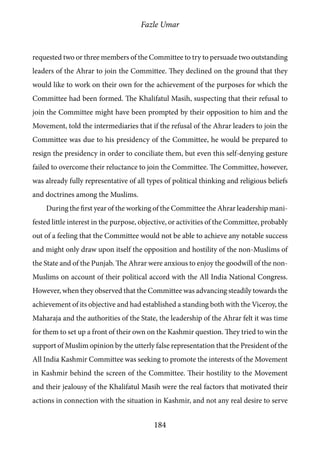
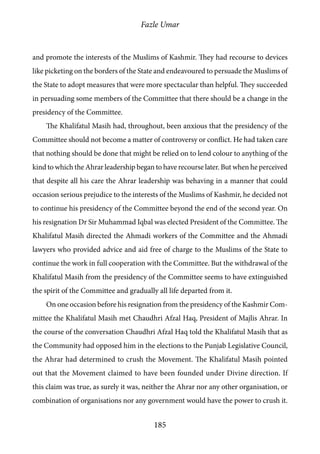
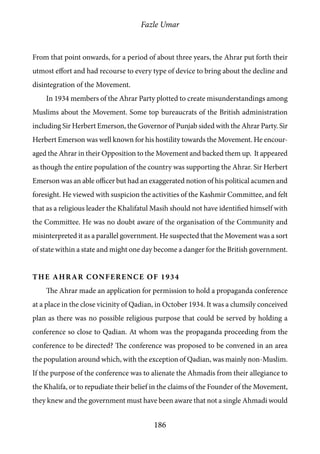
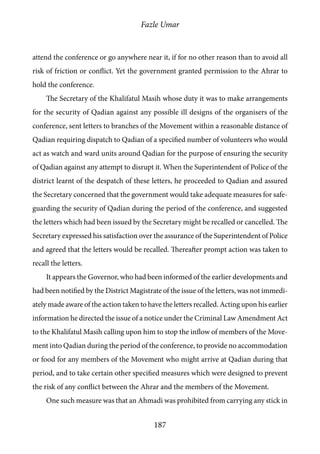
![Fazle Umar
188
his hand even though it was a tradition in the family of the Promised Messiah [as]
to never go out without a walking stick. Hadhrat Khalifatul Masih showed scrupulous
regard for the order and expected the members to obey it even though he did not
regard the considerations of the government to be right and proper. 109
Although the need for the issue of such a notice to anyone had disappeared in
consequence of the understanding reached between the Superintendent of Police and
the Secretary concerned, the issue of the notice was open to serious objection on several
grounds. The notice was directed to and was served upon the Khalifatul Masih, who
had not been concerned with the issue of the letters to which objection was taken by
the district authorities. The notice aimed at forbidding a legitimate activity, namely,
members of the Movement visiting Qadian, their religious centre, freely without let
or hindrance, at all times as they had been accustomed to, while no restriction was
placed on the movements of those who intended to foregather in the conference. The
issue of the notice created a grave situation as it affected the dignity and honour of
the revered Head of the Movement.
The conference was held in this strained atmosphere, which was rendered highly
explosive by the foul and fiery speeches made at the conference in which the Founder,
the Head and members of the Movement were slandered and reviled and provoked
beyond endurance. The situation was saved by the restraint observed by the members
of the Movement and by the ready and cheerful welcome extended to all those who
desired to visit Qadian and see places of interest including offices and institutions of
the Movement and observe their working. Such visitors were shown every courtesy
and were taken round to see and observe whatever they wished. Some of them later
joined the Movement.](https://image.slidesharecdn.com/fazl-e-umar-160102120102/85/Fazl-e-Umar-194-320.jpg)
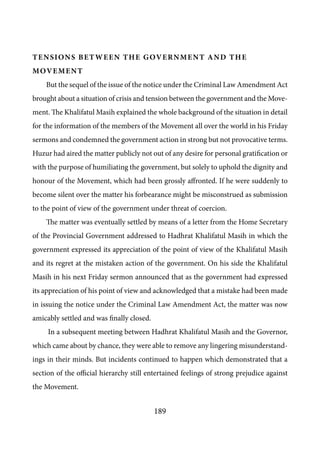
![190
When Sir Herbert Emerson’s term as Governor was approaching its end he was
granted an extension for two and a half years. He suffered a severe attack of internal
haemorrhage while playing golf on extended leave. Although he returned to robust
health, he was unable to resume the Governorship.
The Ahrar boasted to wipe out the Movement very soon. Right at this time when
the mischief was in its full steam, Hadhrat Khalifatul Masih II [ra] made the fol-
lowing announcement in one of his sermons:
“The ground is slipping from under the feet of the enemy. I can foresee their immi-
nent defeat.” 110
Soon after this announcement, in 1935 a controversy arose in which the Movement
was not directly involved but in which its sympathies were with the bulk of the Mus-
lims to whom it lent its moral support. The Ahrar ranged themselves on the opposite
side. Feelings rose high and the Ahrar became the subjects of disgrace on the part of
the Muslim masses. They rapidly lost favour and were no longer trusted or respected.
Their original leadership has passed on and they dragged along as a despised remnant.](https://image.slidesharecdn.com/fazl-e-umar-160102120102/85/Fazl-e-Umar-196-320.jpg)

![HadhratKhalifatulMasihII[ra]horse-ridinginPalanPur](https://image.slidesharecdn.com/fazl-e-umar-160102120102/85/Fazl-e-Umar-198-320.jpg)
![AhistoricalgroupphotoofthePromisedMessiah[as]withhiscompanions.standingfromright:unknown,unknown,unknown,HadhratShaikhGhulamHussain
[ra],HadhratMianBasharatAhmad[ra],HadhratSyedIrshadShah[ra],unknown,unknown,HadhratHakeemFazlDinBhairwi[ra],HadhratMianGhulam
MohammadKatib[ra],HadhratShaikhMohammadAkbar[ra],HadhratMianKhudaBaksh[ra],HadhratShaikhMolaBuksh[ra].sittingonchairsfrom
right:unknown,unknown,HadhratMunshiAllahditta[ra],HadhratMianNizamdin[ra],HadhratMasihMaood[as],HadhratHakeemHassamuddin[ra](on
hislapSahibzadaMirzaBashiruddinMahmmodAhmad[ra]),HadhratMianFazlDinZerger[ra](onhislapSahibzadaMirzaBasheerAhmad[ra]).sittingon
floorfromright:unknown,HadhratMistriShahabuddin[ra],HadhratMunshiMohammadAbdullah[ra],HadhratMianMohammadDin[ra],HadhratMunshi
RaheemBaksh[ra](onhislapHadhratMirMohammadIshaq[ra]),HadhratShaikhJanMohammadWazeerabadi[ra]andHadhratQaziZiaUddin[ra].](https://image.slidesharecdn.com/fazl-e-umar-160102120102/85/Fazl-e-Umar-199-320.jpg)
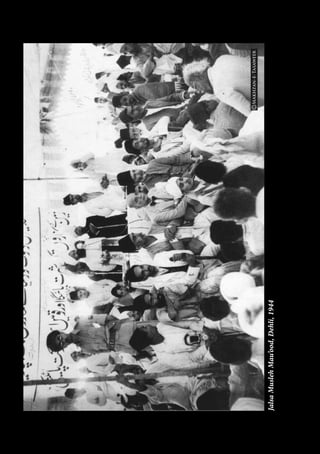
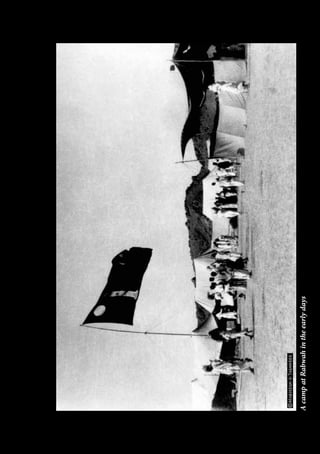
![ArarephotoofHadhratKhalifatulMasihII[ra]leadingprayerduringhisEuropeanTour,London,1954](https://image.slidesharecdn.com/fazl-e-umar-160102120102/85/Fazl-e-Umar-202-320.jpg)
![AnarrivalsceneofHadhratKhalifatulMasihII[ra]intheUK,1924](https://image.slidesharecdn.com/fazl-e-umar-160102120102/85/Fazl-e-Umar-203-320.jpg)
![BlessedchildrenofthePromisedMessiah[as].righttoleft:HadhratMirzaBashiruddinMahmudAhmad[ra],
HadhratMirzaBasheerAhmad[ra],HadhratMirzaShareefAhmad[ra],HadhratNawabMubarikabegum
sahiba[ra_ha]andSahibzadaMirzaMubarakAhmadsahib[ra].](https://image.slidesharecdn.com/fazl-e-umar-160102120102/85/Fazl-e-Umar-204-320.jpg)
![HadhratKhalifatulMasihII[ra]attheFoundationCeremonyofBaitulFazl,London,1924](https://image.slidesharecdn.com/fazl-e-umar-160102120102/85/Fazl-e-Umar-205-320.jpg)
![HadhratKhalifatulMasihII[ra]withentourageduringhisEuropeantour,1924.standingfromright:HadhratMianRehemDin[ra],HadhratChaudhry
MohammadShareef[ra],HadhratSahibzadaMirzaShareefAhmad[ra],HadhratAbdurRaheemDard[ra],sittingonchairsfromright:HadhratShaikhAbdur
RahmanMisri[ra],HadhratChaudhryFatehMohammadSyal[ra],HadhratKhalifatulMasihII[ra],HadhratNawabZulfiqarAliKhanGoher[ra],Hadhrat
HafizRoshanAli[ra],sittingonfloorfromright:HadhratBhaiAbdurRahmanQadiani[ra],HadhratDrHashmatullahKhan[ra],HadhratShaikhYaqoo
AliIrfani[ra].Note:HadhratChaudhryAliMohammad[ra]wasalsothepartofthisentouragebutwasnotpresentinthisphoto.ThisphotowastakeninItaly.](https://image.slidesharecdn.com/fazl-e-umar-160102120102/85/Fazl-e-Umar-206-320.jpg)
![HadhratKhalifatulMasihII[ra]leadingsalaatpriortolayingtheFoundationStoneofBaitulFazl,London,1924](https://image.slidesharecdn.com/fazl-e-umar-160102120102/85/Fazl-e-Umar-207-320.jpg)
![HadhratKhalifatulMasihII[ra]withesteemedcompanionsat“TheConferenceofReligionsWithintheEmpire”
heldattheImperialInstitute,London,1924](https://image.slidesharecdn.com/fazl-e-umar-160102120102/85/Fazl-e-Umar-208-320.jpg)
![TaalimulIslamCollegestaffwithHadhratKhalifatulMasihII[ra]attheopeningceremonyoftheCollegeBuilding,1954](https://image.slidesharecdn.com/fazl-e-umar-160102120102/85/Fazl-e-Umar-209-320.jpg)
![Hadhrat Musleh Mau’ood [ra] in his youth.](https://image.slidesharecdn.com/fazl-e-umar-160102120102/85/Fazl-e-Umar-210-320.jpg)
![Hadhrat Musleh Mau’ood [ra] at Talim-ul-Islam College, Rabwah](https://image.slidesharecdn.com/fazl-e-umar-160102120102/85/Fazl-e-Umar-211-320.jpg)
![Hadhrat Musleh Mau’ood [ra] returning after Jalsa Hoshiarpur](https://image.slidesharecdn.com/fazl-e-umar-160102120102/85/Fazl-e-Umar-212-320.jpg)
![This is the room in Hushiarpoor where the Promised Messiah [as] confined
himself whilst meditating and fasting for 40 days and 40 nights. It was here
that he received the revelation regarding The Promised Son (Musleh Mau’ood)](https://image.slidesharecdn.com/fazl-e-umar-160102120102/85/Fazl-e-Umar-213-320.jpg)
![Fazle Umar
208
Tehrike Jadeed (the New Scheme)
Out of evil came a great deal of good. In his three Friday addresses on 23 and
30 November and 7 December 1934, Hadhrat Khalifatul Masih II [ra] set forth a
scheme before the Community with regard to which he had already alerted it, which
made nineteen demands from the members of the Movement. Initially the operation of
the scheme was limited to three years, but before the expiry of the period it was made
permanent. He named the scheme Tehrike Jadeed (The New Scheme). To finance the
scheme he appealed to the Community to provide Rs 27,500 for the expenses of the
first year. The Community made a splendid response to his appeal and in addition to
all other contributions provided Rs 107,000 for Tehrike Jadeed which was nearly four
times the amount for which he had appealed.
His nineteen demands, which were subsequently raised to twenty-four, were aimed
mainly at rousing the spirit of sacrifice in the Community, stimulating their moral and
spiritual qualities and broadening the base of the Movement by carrying its message
far and wide. For instance, he urged the adoption of a simple, and in some respects
even an austere, mode of life in the matter of food, dress, housing, furnishings, etc.
He forbade attendance at cinemas, theatres, circuses and places of amusement gener-
ally. He urged the cultivation of the habit of manual labour. He made an appeal for a
certain number of dedicated workers. He urged the unemployed to occupy themselves
in some kind of work or to work without the usual requirements, or in return for a
meagre salary, for the Movement. He invited pensioners and people who had retired
from service to volunteer for work for the Movement. He urged everyone to occupy
themselves most of the time with earnest supplications to God seeking His help and
guidance and the bounty of steadfastness in His cause. He explained the purpose of
each of these demands. He predicted:](https://image.slidesharecdn.com/fazl-e-umar-160102120102/85/Fazl-e-Umar-214-320.jpg)
![Fazle Umar
209
“Even if you should all abandon me God will provide me with resources from a
hidden source. But it cannot be that what God Almighty told the Promised Mes-
siah, the scheme for which he has disclosed to me, should not happen. It is bound
to happen even if I am abandoned by everyone. In such a contingency God
will descend from heaven and will complete the construction of this mansion.”
On another occasion he said:
“We shall not coerce anyone, nor shall we embark on a campaign of civil dis-
obedience, we shall respect the law, and despite all this we shall discharge all
those responsibilities with which we have been charged by Ahmadiyyat. We
shall carry out all the obligations which God and the Holy Prophet [saw]
have imposed on us, and yet the purpose of our scheme will be achieved. The
Captain of the Ark of Ahmadiyyat will steer this Holy Ark between fearful rocks
and will bring it safe to port. This is my faith and I am firmly established in it.
The reason of those to whom the leadership of Divine movements is committed
is placed under Divine guidance; they are bestowed light by God Almighty, and
his angels guard them. They are supported by the gracious attributes of God.
When they pass on from the world and present themselves before their Maker,
the projects they embark upon continue to make progress and God Almighty
makes them successful and prosperous.”
The Community made an eager response to every one of the demands made by
the Khalifatul Masih and from the very start the Tehrike Jadeed began to produce very
encouraging results. In the beginning the Khalifatul Masih had made participation
in Tehrike Jadeed voluntary, but before the expiry of its initial period of three years
he made it compulsory upon the whole Community and made it permanent. Large
numbers of volunteers were trained to work in various capacities in the different
branches of the scheme. Literature needed for the exposition of the purposes, teach-](https://image.slidesharecdn.com/fazl-e-umar-160102120102/85/Fazl-e-Umar-215-320.jpg)
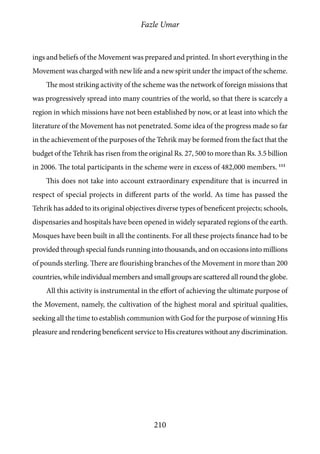
![Fazle Umar
211
Family Life
Polygamy
The impact of Western civilisation along with the Hindu culture and traditions
had influenced the Indian Muslim way of life in such a way that many of their practices
had no connection with true Islam. Hadhrat Musleh Mau’ood [ra] showed great zeal
and determination in his efforts to re-establish the Islamic civilisation. This is why he
hated all those practices which were inherited out of an inferiority complex or were
adopted under these strong influences.
On the subject of polygamy he encouraged members of his Community to breath
new life into this Islamic practice that had become unpalatable for the Muslim major-
ity. Through their beautiful example they should prove that polygamy is a practical
and commendable practice. He warned those Muslims whose misconduct had made
women suspicious of this beneficial and proper practice to the point where injustices
committed by the husband become the justification by some ignorant and godless
women to lose their faith that they will be answerable to God for weakening and
disgracing His Faith. 112
Islam permits a man, though it certainly does not enjoin or encourage, the taking
of up to four wives at a time under certain circumstances. According to the Holy
Qur’an, a man can marry again if his wife becomes a permanent invalid or suffers
from a contagious disease, or if she is unable to have children. Also, to protect orphans
left unprotected in wartime. Polygamy provides husbands for marriageable widows.
This becomes especially critical during wartime when many men may be lost in battle
leaving behind vulnerable widows and orphans. The husband must be able to deal
equitably between them, otherwise he must remain monogamous. 113
Hadhrat Musleh Mau’ood [ra] fulfilled the necessary conditions. To elaborate](https://image.slidesharecdn.com/fazl-e-umar-160102120102/85/Fazl-e-Umar-217-320.jpg)
![Fazle Umar
212
this point further he stated:
“I am not only in favour of polygamy but I also practice it. In my opinion,
to take more than one wife according to the dictates of Islam is (not only not
adulterous but rather) a sign of forbearance, endurance, sacrifice, selflessness
and righteousness of the highest order. A licentious person cannot take a second
wife under these rules and regulations.” 114
Hadhrat Syeda Rashida Begum (Umme Nasir)
umme nasir –“mother of nasir” i.e. mother of hadhrat mirza
nasir ahmad, khalifatul masih iii [ra]
The first marriage of Hadhrat Musleh Mau’ood [ra] was to Hadhrat Syeda
Umme Nasir in the lifetime of the Promised Messiah [as]. Although the choice of
the daughter-in-law was his, he clarified in the letter he wrote initiating the union to
Hadhrat Dr Khalifa Rashid Uddin that, “Mahmud seems happy with the engagement.”
This letter was written over a hundred years ago in 1902. By the common practice
and standards of the time, it seems strange to take into consideration the feelings of
the children. However, because the Promised Messiah [as] came to rectify the culture
and traditions, he proved by his actions the importance of acknowledging the feel-
ings of the children when choosing a spouse for them. Hadhrat Umme Nasir made
an outstanding sacrifice during difficult times to help launch the Al-Fazl newspaper.
Women’s love for jewellery is legendary. Her husband’s financial situation did not allow
for the jewellery to be replaced. These two factors made her sacrifice even more digni-
fied and beautiful. This is why Hadhrat Musleh Mau’ood [ra] always spoke highly
about this sacrifice. Purely a strong desire to serve one’s faith was the only criterion
Hadhrat Musleh Mau’ood [ra] considered when choosing a spouse which was quite
different from that sought by most husbands.](https://image.slidesharecdn.com/fazl-e-umar-160102120102/85/Fazl-e-Umar-218-320.jpg)
![Fazle Umar
213
Hadhrat Amtul Hai
His second wife was the daughter of Hadhrat Khalifatul Masih I [ra], Hadhrat
Amtul Hai. Huzur married her out of respect for the wishes of Hadhrat Khalifatul
Masih I [ra], who wanted his family to have some matrimonial ties with the family
of the Promised Messiah [as]. Beyond that the groom had a longing and desire to
educate the women of the Community through this union. Hadhrat Sahibzada Sahib
was always amazed by the love that developed between the two and he sometimes
mentioned to Hadhrat Amtul Hai that he had only married her as a favour to Hadhrat
Khalifatul Masih I [ra]. On the success of this marriage and rewards and blessings
which came from it, Huzur states:
“I never thought that my good intentions and the fulfilment of the desire of my
master and mentor could bear such fruits that would create immense comfort
and joy. I know of many marriages and I have married many times myself. In
my capacity as the head of a Community, I come across thousands of couples
and thousands of cases come to my attention. However, in all my years I have
never come across a more successful and joyful marriage.”
The real purpose of this marriage was to make arrangements for the education
and training of women. He taught her himself and prepared her for this task. He states:
“She was not particularly attractive…however, she had such a firm faith…
despite my weaknesses and thoughtlessness, I have always witnessed her unwav-
ering faith in the institution of Khilafat which few men seldom demonstrate.
I am proud that she married me when she was young and I had the chance to
educate and train her.”
When Hadhrat Amtul Hai passed away only a few days after his return from
Europe, he was deeply saddened by her death. It is natural to be grieved by the death
of a wife who was endowed with good qualities. However, his grief was made worse](https://image.slidesharecdn.com/fazl-e-umar-160102120102/85/Fazl-e-Umar-219-320.jpg)
![Fazle Umar
214
by the fear that his programme of education and training would be jeopardised. He
grieved for those left behind who were forever deprived of her intellectual talents.
Hadhrat Syeda Maryam (Umme tahir)
Umme Tahir — “Mother of Tahir” i.e. Mother of Hadhrat Mirza
Tahir Ahmad, Khalifatul Masih IV [rh]
One of the sons of the Promised Messiah [as], Hadhrat Sahibzada Mirza
Mubarak Ahmad was married to Maryam, the daughter of Hadhrat Dr Syed Abdul
Sattar Shah. This relationship was brought to an end upon the death of Hadhrat
Sahibzada Sahib. God Almighty had intimated to the Promised Messiah [as] that
Hadhrat Sahibzada Mirza Mubarak Ahmad would meet his Maker at a tender age.
According to the family custom of Hadhrat Dr Sahib, Maryam could only remarry
within the same family. It was considered inappropriate for her to marry anywhere else.
Maryam had the good fortune of becoming the daughter-in-law of the Promised
Messiah [as] in his lifetime. God Almighty had destined for her an immensely suc-
cessful and fulfilled life. She later married Hadhrat Musleh Mau’ood [ra], became
renowned for being the Umme Tahir, as well as for her service to humanity, selfless-
ness and immutable example of service to her faith. The narration of Hadhrat Musleh
Mau’ood [ra] about his marriage to Hadhrat Maryam sheds light on many aspects
of his life. On the death of Hadhrat Umme Tahir he wrote a lengthy article full of love
and admiration for his deceased wife entitled “My Maryam”.
He states that one day in 1917 or maybe 1918 he was returning to his apartment
when he noticed a thin, gaunt girl dressed in white. She quickly moved out of the way
behind a wooden wall when she saw him coming. He enquired about this girl from his
wife, Hadhrat Amtul Hai. She was surprised that he had not recognised her because
she was Maryam, the daughter of Dr Syed Abdul Sattar Shah. He replied that she had](https://image.slidesharecdn.com/fazl-e-umar-160102120102/85/Fazl-e-Umar-220-320.jpg)
![Fazle Umar
215
quickly moved out of sight and even if he had seen her he would not have recognised
her. Her husband had died in 1907 and this was the first time she had entered his
thoughts after his demise.
He began to enquire if there were any plans to get her married again. He states:
“I was told that according to the family custom they can only marry this widow
within the family of the Promised Messiah [as], otherwise the girl will remain
as she is. This was quite shocking to me. I tried very hard to get her married in
different places but my efforts only met with failure. Finally, I approached my
brothers in different ways to encourage one of them to marry Maryam so that
the girl’s life is not wasted however their response was also negative. Therefore,
in keeping with the dictates of the Promised Messiah [as] that one should
not be the cause of the ruin of anyone’s life and also because I was very close to
her two brothers, Syed Habibullah Shah sahib and Syed Mahmoodullah Shah
sahib, I decided I would marry Maryam myself.
“…Our marriage took place on 7 February 1921 in the Mubarak Mosque. Far
from being a wedding, it was more like a house of mourning. Everyone’s crying,
weeping and sobbing was audible during the prayers. On 21 February 1921 I
brought her home.”
“…In the beginning she was extremely thin and gaunt and some imperfections
in her features weighed heavy on my mind. Similarly, she spoke pure Punjabi
and I could not bear anyone speaking Punjabi in the house. She had a cheerful
disposition. She would deliberately add a few phrases of Punjabi when she spoke
Urdu just to vex me…When I travelled to England I was a bit displeased with
the late Amtul Hai and Maryam after their quarrel. However, on my return I
learned that it was mostly the fault of Amtul Hai. Because of this displeasure I
wrote a letter to Maryam in the first few days of the journey but Allah be praised,](https://image.slidesharecdn.com/fazl-e-umar-160102120102/85/Fazl-e-Umar-221-320.jpg)
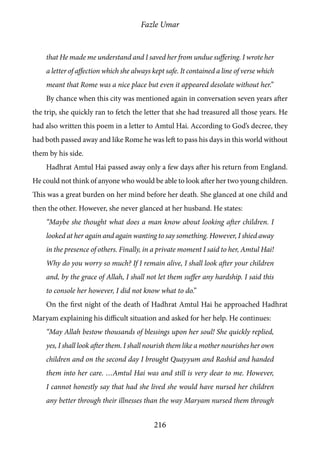
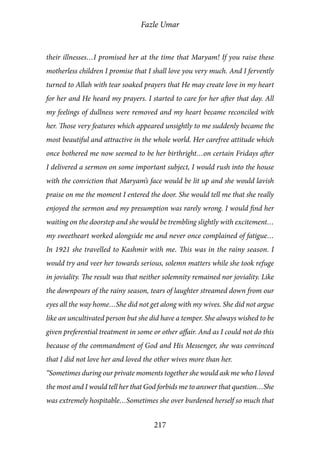
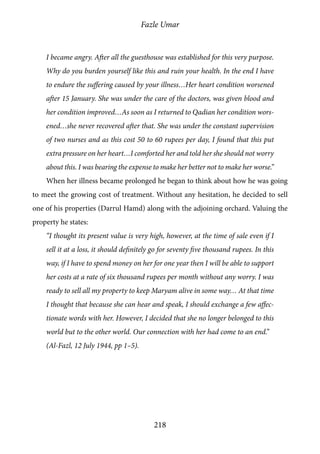
![Fazle Umar
219
Hadhrat Appa Sara Begum Sahiba
When Hadhrat Musleh Mau’ood [ra] married Hadhrat Appa Sara Begum his
considerations once again were its benefit to the Community and a strong desire to
promote the spiritual over the worldly. He announced the engagement on 12 April 1925
and led the marriage ceremony (Nikah) himself in which he elaborated the reasons
behind this undertaking.
He stated that this endeavour did not create that excitement observed in most
people. He did not have the stamina to take a young woman and train her to a level
where she could carry out the work of the Organisation according to his wishes. The
interests of the Community and his responsibilities as its Head made it incumbent
upon him to take another wife. Although he was unwilling, he pondered over it, sought
advice from friends and requested them to offer the Istikhara prayers seeking guid-
ance from God Almighty while offering them himself. Finally, his mind was diverted
towards the higher purpose. He states:
“…my own thought was turned towards this that to inculcate the habit of higher
learning among women and to create a strong bond between them and the
Organisation, I should marry a woman who should be educated and whom I
could train to carry out the duties of education.”
Some members suggested beautiful women others highly educated women
however, because the Organisation was in dire need of religious education, he settled
upon this engagement. However, he reiterated his love for the late Hadhrat Amtul
Hai. He stated:
“I have not forgotten my loss and to this day, I have not offered a single obliga-
tory prayer in which I have not prayed for the late Amtul Hai…Seldom is there
a soul who keeps alive the memory of the deceased. However, God has blessed
me with loyalty and faithfulness…I believe that to keep alive the memory of](https://image.slidesharecdn.com/fazl-e-umar-160102120102/85/Fazl-e-Umar-225-320.jpg)
![Fazle Umar
220
the deceased is an edifying grief, a delightful sadness and a gratifying hardship.
This grief is better than a thousand joys and this sadness better than a thousand
delights. The pain of love is not a pain but an elixir. The pain of faithfulness does
not burn rather it is like a kiln which cleanses the heart and leaves it shining
and polished. And the soul of man becomes free of all impurities as it breathes
at a superior blissful station where the air is remarkably pure and gentle. If I
was not burdened with the leadership of a Community. If through foolishness
or cleverness, I was not mindful of the progress of a small Community, far from
marriage, the very idea and its thought would have been a blow for my wounded
heart. But I am hopeful of the favours of Allah Almighty.
“…I believe this (marriage) is also not a source of happiness for the other party.
One cannot have high hopes from a man who is not very healthy, who is finan-
cially impoverished, who has no love for the world and whose first two wives
are alive…Therefore, I believe they are also making a sacrifice.”
He hoped God would bless this union because it was to be consummated to
promote some of the work of the Organization and prayed that it would also help the
weak and helpless female class whose rights had been quashed for centuries.
Hadhrat Aziza Begum Sahiba
On 1 February 1926, Hadhrat Musleh Mau’ood [ra] married Hadhrat Aziza
Begum sahiba, the daughter of Seth Abu Bakr of Jeddah, Saudi Arabia. In the Nikah
ceremony, Huzur again explained the background to the marriage. He stated:
“In 1914 when I got married to the late Amtul Hai, Abu Bakr, a businessman
from Jeddah wrote to me that ever since his daughter was born, it was his wish
to give her hand in marriage to me. However, he remained silent with the
apprehension that I may not prefer to take a second wife. However, now that I](https://image.slidesharecdn.com/fazl-e-umar-160102120102/85/Fazl-e-Umar-226-320.jpg)
![Fazle Umar
221
had taken a second wife he made his feelings known.
“I did not give him any reply but ever since I came of age I was always of the
opinion that the best way to fulfil the wish of the Promised Messiah [as] that
Arabic should be the second language of all Muslims was to marry Arab speaking
women so that the children may become fully exposed to it. Therefore, I decided
that I would take up this offer if possible and kept them informed of my inten-
tions. The final decision had been taken (in 1924), however, Amtul Hai’s illness
took a turn for the worse and she passed away within a few days. Hence, things
were put on hold…However, I saw some dreams during this time from which it
seemed that this marriage was ordained by God Almighty but because dreams
are open to interpretation, I paid no heed to them. As the Annual Gathering
approached I had completely removed the idea from my mind. However, I saw
similar visions and so did my mother (Amma Jan), who was staying in Shimla
in those days, from which it seemed that God Almighty ordained this union.
However, even then I did not pay too much attention to it but during the Annual
Gathering and after it a few people who had no knowledge about this affair
relayed similar visions. Therefore, I performed Istikhara, sought advice from
friends and most of them advised that in light of the promises made as well as
the dreams this marriage should also take place.”
Hadhrat Syeda Maryam Siddiqua Sahiba (Umme
Mateen)
Hadhrat Syeda Maryam Siddiqua sahiba daughter of Hadhrat Mir Mohammad
Ismail sahib married Hadhrat Musleh Mau’ood [ra] on 30 September 1935. Hadhrat
Muhammad Mufti Sadiq sahib performed the Nikah.
Their marriage was spread over a period of 30 glorious years. After the mar-](https://image.slidesharecdn.com/fazl-e-umar-160102120102/85/Fazl-e-Umar-227-320.jpg)
![Fazle Umar
222
riage, Huzur continued her education, provided guidance and took a keen interest
throughout her studies. When she had passed her BA exams, he turned her full atten-
tion towards religious education. He began teaching her the Holy Qur’an however he
was unable to get through all of it. In the beginning, he took lessons at home where
along with Hadhrat Umme Mateen he taught Aziza Amtul Quayyum Salma, Mubarak
Ahmad and Munawar Ahmad. Gradually upon the request of others, this took the form
of formal lessons in the mosque. The notes during these lessons have been published
as the Tafsire Kabir, the larger commentary of the Holy Qur’an. She never received
private tuition after this but did have the chance to listen to the Darse on the men and
the women’s side. She took extensive notes, which were later reviewed by Huzur. It
was her husband who had inculcated this habit of note taking and asked her to record
every word of the lesson. Gradually she picked up speed and could record his speeches
delivered in the Annual Gathering. He frequently used her services and after 1947
nearly all his letters, articles and speeches were dictated to her. The larger portion of
the manuscript of Tafsire Saghir, the shorter commentary of the Holy Qur’an, was
dictated to her by Hadhrat Musleh Mau’ood [ra].
Hadhrat Syeda Bushra Begum (Mehar Appa)
After the death of Hadhrat Maryam (Umme Tahir), in line with some prophecies
of the Promised Messiah [as], Hadhrat Musleh Mau’ood [ra] thought that God
might wish him to marry again to make it easier to look after the children. Hence, in
fulfilment of that wish Hadhrat Musleh Mau’ood’s [ra] last marriage was to Hadhrat
Syeda Mehar Appa daughter of Syed Aziz Ahmad Shah. Huzur announced the Nikah
himself on 24 July 1944 in which he detailed the need and reasons behind this marriage.
He explained that one day while he was flicking through a book of the Promised
Messiah [as] (Tadhkirah) which contains his dreams, visions and verbal revelations,](https://image.slidesharecdn.com/fazl-e-umar-160102120102/85/Fazl-e-Umar-228-320.jpg)
![Fazle Umar
223
by chance he opened it at a page where the word ‘Bushra’ appeared to him written in
bold letters. After observing this, his attention was diverted towards the daughter of
the late Mir Mohammad Isaac who was called Bushra. However, there was no ques-
tion of marrying her because Hadhrat Amma Jan (Huzur’s mother) had been a wet
nurse to Mir Mohammad Isaac.
Later he raised the issue with some members of the family of the late Hadhrat
Maryam (Umme Tahir). They also thought it would be appropriate for him to marry
again and if he was to marry from within their family that would be even better.
Thereafter, his attention was diverted to another woman by the name of Bushra who
was from among their family. As chance would have it, she was still single because of
certain ailments and was becoming too old for marriage. Hence, she was suited to the
role of looking after and caring for his children.
He enquired from his own side of the family and they also thought it was a good
idea. Huzur had always been very close to his sister, Hadhrat Nawab Mubarka Begum
and valued her opinion. She stated that everyone knew how close she was to Hadhrat
Maryam when she was alive. She had not recommended another marriage out of the
fear that people would accuse her of deceit if she advised marriage so soon after the
death of one whom she had loved abundantly when alive. She related a dream which
she had seen while Hadhrat Maryam was still alive.
He had loved Hadhrat Maryam dearly but all this advice along with fervent
prayers to the Almighty convinced him that he should ago ahead with this marriage
for the sake of her children. The benefits of this union bore even more succulent fruit
in the later life of Hadhrat Musleh Mau’ood [ra] when Hadhrat Umme Mateen and
Hadhrat Mehar Appa cared for the Imam of the Community with great devotion,
persistence, love and respect.](https://image.slidesharecdn.com/fazl-e-umar-160102120102/85/Fazl-e-Umar-229-320.jpg)
![Fazle Umar
224
Children of Hadhrat Musleh Mau’ood
[ra]
Hadhrat Syeda Mahmooda (Umme Nasir)
1. Hadhrat Mirza Nasir Ahmad, Khalifatul Masih III [ra]
2. Nasira Begum (Mother of Hadhrat Khalifatul Masih V [atba])
3. Mirza Mubarak Ahmad
4. Dr Mirza Munawar Ahmad
5. Amtul Aziz
6. Mirza Hafiz Ahmad
7. Mirza Anwar Ahmad
8. Mirza Zahoor Ahmad
9. Mirza Rafiq Ahmad.
Hadhrat Syeda Amtul Hai
1. Amtul Quayyum
2. Amtul Rashid
3. Mirza Khaleel Ahmad
Hadhrat Syeda Maryam (Umme Tahir)
1. Amtul Hakeem
2. Amtul Basit
3. Hadhrat Mirza Tahir Ahmad, Khalifatul Masih IV [rh]
4. Amtul Jameel](https://image.slidesharecdn.com/fazl-e-umar-160102120102/85/Fazl-e-Umar-230-320.jpg)
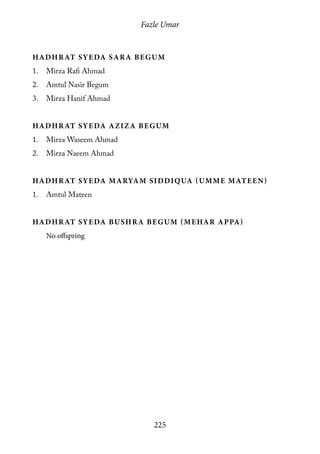
![Fazle Umar
226
Consolidation of the Movement
The part played by Hadhrat Khalifatul Masih II [ra] in affairs that were not
primarily of a religious character should not leave anyone under the impression that
his main interest at any time centred on those matters. It was characteristic of him
that whatever he undertook he carried through with full attention in a serious spirit,
mobilising all the resources that were needed for the purpose. Besides, the matters in
which he took a lead, though not at the centre of religion, were not outside its scope.
As has already been mentioned his definition of religion comprehended everything
that bore immediately or ultimately on the welfare of any section of mankind. This
was not a definition invented by him, but was the definition of Islam derived from
the Holy Qur’an and the example of the Holy Prophet [saw]. In giving practical
effect to his definition, however, he did not in the least overlook the gradations and
priorities that have been established by Islam for the coordination of all values affecting
human welfare. For him the moral and the spiritual always had top priority. He never
neglected the practical upholding of this priority in the least particular. In choosing the
immediate objective, in settling a policy, in adopting a procedure, he took the utmost
care that the true and ultimate objective, namely winning the pleasure of God, should
not be subordinated to, or laid aside even temporarily for the sake of anything else,
however tempting it might appear at the moment. At no time did he neglect in the least
degree the guidance needed by the Community and the constant supervision of the
conduct and behaviour of every member of it, in order to ensure that the Community
should continue to march steadily forward on the path that led to God and should
not be deflected a hair’s breadth in one direction or the other. For instance, whenever
he noticed a tendency on the part of anyone to exalt the Founder of the Movement
in a manner that might be misconstrued as placing him in juxtaposition to the Holy](https://image.slidesharecdn.com/fazl-e-umar-160102120102/85/Fazl-e-Umar-232-320.jpg)
![Fazle Umar
227
Prophet [saw] he snuffed it out instantly and made it quite clear, as the Promised
Messiah [as] had himself done repeatedly, that everything that was bestowed upon
him was due to his devoted obedience to the Holy Prophet [saw], and as a spiritual
reflection of the Holy Prophet [saw]. On the other hand, he constantly reminded
the Community that in the words of the Holy Prophet [saw], the Promised Messiah
was a just arbiter and that all his pronouncements were binding upon the Community
and not one of them could be contravened with impunity.
Advisory Consultative Council (Majlise
Mashawarat)
He laboured constantly to build up the organisation of the Community so as
to fashion it as an effective instrument for the achievement of the purposes of the
Movement. For instance, in 1922 he established the Advisory Consultative Council
(Majlise Mashawarat) which is normally convened once a year to submit its advice
to the Khalifa on such matters as might be committed to it for advice. It is composed
of elected representatives of every branch of the Movement in the country. Practical
considerations had at one time imposed the limitation of representation in the Council
to branches of the Movement in the country, but currently the International Advisory
Consultative Council meets whenever called to do so by the Khalifa, in the country
where he is resident.
The Khalifatul Masih himself presides over the deliberations of the Council, except
on the rare occasion when any matter involving the personal interest of the Khalifa
is the subject of consideration.
The Council also discusses the Annual Budget of the Movement and submits its
recommendations on it. After the session of the Council is opened with an address by
the Khalifatul Masih, committees are set up for the detailed consideration of the items](https://image.slidesharecdn.com/fazl-e-umar-160102120102/85/Fazl-e-Umar-233-320.jpg)
![Fazle Umar
228
on the agenda of the Council, and submit their reports to the Council for discussion
and the formulation of its recommendations. In the course of these discussions points
constantly arise bearing upon the true appreciation of moral and spiritual values. At
the conclusion of the discussion of each item the Khalifatul Masih sums up the points
that arise in the course of the discussion and pronounces upon them, furnishing the
needed guidance on every point. On the advice tendered by the Council and the recom-
mendations submitted by it the Khalifatul Masih normally announces his decision at
the end of his observations, but sometimes reserves the matter for further reflection.
He generally accepts the advice tendered or the recommendations made by a majority
of the Council, but if he is of the view that the advice or recommendation ignores or
runs counter to some principle the upholding of which is an obligation that cannot
be contravened, he sets forth an exposition of the principle involved and rejects the
advice or recommendation or announces his acceptance in a modified form which is
not open to objection on principle.
Every session of the Council proves a most exhilarating experience for the par-
ticipants on account of the opportunities of moral and spiritual training that it affords
for every participant. The discussions in the Council are carried on at a very high level
and compare very favourably with the proceedings and discussions of other bodies of
a comparable character outside the Movement.
The Auxiliary Organisations
Every section of the Community is organised into an Association for the purpose
of proper training in the exercise of moral and spiritual values and marching forward
towards the achievement of the purposes of the Movement.
Hadhrat Khalifatul Masih II [ra] was very aware of the religious and educational
needs of Ahmadi ladies. To this end he established the organisation Lajna Imaillah](https://image.slidesharecdn.com/fazl-e-umar-160102120102/85/Fazl-e-Umar-234-320.jpg)
![Fazle Umar
229
(Association of the Handmaidens of God) in 1922. A magazine, Misbah, was intro-
duced in 1926 solely for this organisation. Nasiratul Ahmadiyya (Female Helpers of
God) comprises all female children between the ages of 7 and 15 years.
The Nusrat Girls High School was established in 1928 and in 1951, Jamia Nusrat
or the Ladies College started functioning in Rabwah, Pakistan.
In December 1938 Majlis Khuddamul Ahmadiyya (the Servants of Ahmadiyyat)
was established. This organisation consisted of young men between the ages of 15 and
40. Atfalul Ahmadiyya (Children of Ahmadiyyat) was also set up to cater for the needs
of boys under the age of 15 years.
In 1940 Majlis Ansarullah (the Helpers of God) was also established for male
members of the Community over the age of forty.
These auxiliary organisations of the Community have remained in place from the
time they were established until today. Each of these associations has its own office
bearers and is constantly active in promoting the moral and spiritual values inculcated
by Islam. One feature of the training of all sections of the Community, which is thus
bound together in affectionate ties of brotherhood and sisterhood, is that all members
under the auspices of their particular association carry out without discrimination
programmes of manual labour, designed to uphold the dignity of labour. The female
sections also carry out programmes designed to stimulate their artistic faculties and
to train them in the various branches of domestic science and household duties.
Education and Training
From the very beginning of his Khilafat, Hadhrat Khalifatul Masih II [ra] was
very keen on promoting literacy and education in all sections of the Community. He
paid special attention to the education of women. As a result of his directions and the
methods that he adopted for the achievement of his purpose in this regard, the average](https://image.slidesharecdn.com/fazl-e-umar-160102120102/85/Fazl-e-Umar-235-320.jpg)
![Fazle Umar
230
standard of education among the men and women of the Movement is today consider-
ably higher than that prevailing among the sister communities in each region. This is
true not only in respect of the branches of the Community in Pakistan, Bangladesh
and India but also in the case of the branches of the Community in other backward
regions, more particularly in Africa.
The Madrassa Ahmadiyya, which had been established for religious instruction
was raised to the status of Jamia (Higher Seminary) designed to train scholars to serve
as missionaries of Islam in different parts of the world.
Islamic Solar Calendar
An Islamic solar calendar was introduced supplementing the current lunar
calendar for facilitating the comparative study of the history and progress of Islam.
Propagation of Islam
The Khalifatul Masih kept reminding the Community of the obligations that lay
upon it with regard to the propagation of Islam. For instance, he said:
“Today the way of promoting the progress of Islam through swords, or rifles,
or cannon, or naval vessels, or aircraft has been wholly blocked. Every citadel
that the companions of the Holy Prophet had constructed by shedding their
blood is being demolished and there appears no possibility of safeguarding those
citadels with swords, rifles, cannon and aircraft. But there is on the surface of
the earth a Community whose hearts are filled with the faith and the certainty
that these crumbling citadels will be restored not through cannon, swords, rifles
or aircraft, but through propaganda, education, admonition and exposition.
That Community is the Ahmadiyya Community. The renaissance of Islam will
be undertaken by that Community. The flag of the Holy Prophet [saw] will](https://image.slidesharecdn.com/fazl-e-umar-160102120102/85/Fazl-e-Umar-236-320.jpg)
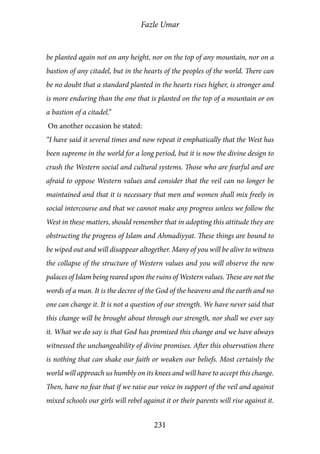
![Fazle Umar
232
Not only the girls and their parents but those who are giving currency to such
ideas will apologise to us on their knees. It will never happen that our women
may discard the veil and we may be put to shame and become remorseful in this
context. The advocates of these new-fangled ideas will come before us with heads
bent in shame and remorse and would confess that they had been following the
wrong path and that the right path is the one laid down by Islam. This is a divine
decree and no power, no government, no kingdom can obstruct its enforcement
… So prepare yourselves for these changes and keep supplicating God Almighty
and cultivate certainty and confidence. The day you are filled with certainty, all
your doubts and suspicions and apprehensions will disappear and you will find
yourselves standing firmly on a strong and high minaret of progress.”
25 Glorious Years as khalifa
In March 1939 Hadhrat Khalifatul Masih II [ra] completed 25 years of his
Khilafat. During this period the Movement had gone forward in leaps and bounds
and the message of Ahmadiyyat had been carried to the ends of the earth. It was felt
by some members of the Movement that this was a fit occasion for a celebration by
way of gratitude to God Almighty for all these numberless bounties and His guardian-
ship and protection of the Community throughout in the face of trials and dangers.
When this idea was submitted to the Khalifatul Masih, he signified his assent to such
a celebration not because of the completion of 25 years of his Khilafat but because of
the completion of the first 50 years of the Movement, adding that the completion of
the first century of the Movement should be celebrated with great éclat.
The celebration of the jubilee took place during the Annual Conference of 1939.
The whole proceeding, the addresses, the march to the site of the Conference, the illu-
mination of the white Minaret, etc., were carried through with great dignity and in a](https://image.slidesharecdn.com/fazl-e-umar-160102120102/85/Fazl-e-Umar-238-320.jpg)
![Fazle Umar
233
spirit of prayerful gratitude to the Divine for all His bounties. The flag of Ahmadiyyat
was adopted and raised for the first time.
In reply to the addresses presented to the Khalifatul Masih, he made a speech in
the course of which he outlined the reasons for holding such a celebration:
“Ever since the celebration was projected the feeling that it might become a
precedent for birthdays and other similar celebrations has troubled me. I was
afraid lest in consequence of this celebration the Community might get involved
in such ceremonies, as it is the purpose of Ahmadiyyat to wipe out…The first
feeling of reassurance was generated in my mind by the appreciation of one
aspect mentioned by Maulvi Jalal Uddin Shams in one of his articles that this is
an occasion of celebration also because the Movement has completed 50 years of
its life. Thus, I realised that this celebration can be attributed to the Movement
rather than to an individual and that I can myself join in this joyous event. The
second reassurance was generated in my mind when the poem of the Promised
Messiah [as] named ‘Ameen’ (written when Hadhrat Musleh Mau’ood finished
first reading of the Holy Qur’an) was being recited and I felt that this celebra-
tion is an occasion of proclaiming the fulfilment of a prophecy of the Promised
Messiah. I, therefore, felt that my participation in it is not improper.”
At the conclusion of his speech a cheque of the amount of Rs. 270,000 was pre-
sented to Hadhrat Khalifatul Masih II [ra] with the request that he might spend it
as he pleased.
In the Annual Conference of that year the Khalifatul Masih spoke on 28 and 29
December on the Islamic System of Khilafat in a very comprehensive way and in the
course of his speech said:
“The ever-fresh signs of God Almighty and His living miracles are sufficient proof
that God has made me Khalifa and there is no one who can stand in opposition](https://image.slidesharecdn.com/fazl-e-umar-160102120102/85/Fazl-e-Umar-239-320.jpg)
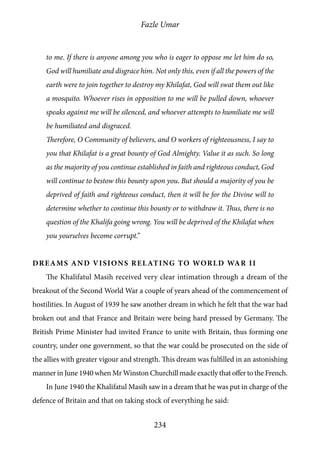
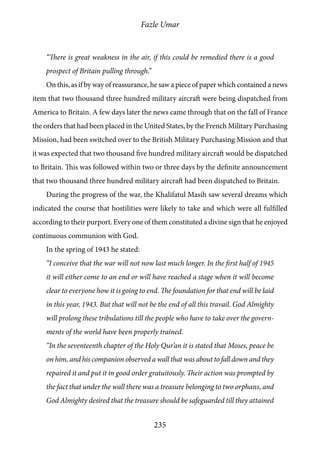
![Fazle Umar
236
their maturity. The present situation is that in this case the treasure that has to
be safeguarded can be preserved secure not by repairing a wall but by pulling
it down. God Almighty is pulling down these worldly systems gradually and
not at one stroke, because those to whom the rebuilding of this structure is to
be committed are being trained in the divine academy of engineering and have
not yet completed their training. If all the old structures were to be demolished
suddenly there would be a hiatus. That is why God Almighty is demolishing these
structures gradually. One wall is pulled down today and another is pulled down
tomorrow. One roof is blown up today and another is blown up tomorrow. One
room disappears today and another disappears tomorrow. In this way gradu-
ally and step by step God Almighty is pulling down, ruining and destroying all
the structures, all the mansions and all the materials of the world. He does not
design the complete ruin of these structures till those who are being trained in the
divine academy have completed their training and are ready to take over. This
is the way that God Almighty has opened for the progress of our Community.
This change is bound to come about one day, but it is approaching gradually so
that those who have to take over should be enabled to complete their training.”
Detailed Commentary on the Holy Qur’an
Hadhrat Khalifatul Masih II [ra] always worked very hard and never spared
himself. At the best of times he was in indifferent health and sometimes his health
broke down for weeks and months. Even during such periods he did not lay aside his
work altogether. His magnum opus was a detailed commentary on the Holy Qur’an
which he called Tafseer Kabeer (The Great Commentary). It is a most valuable exposi-
tion of the numberless verities comprised in the Holy Book and is a great milestone
in the history of the exegesis of the Holy Qur’an.](https://image.slidesharecdn.com/fazl-e-umar-160102120102/85/Fazl-e-Umar-242-320.jpg)
![Fazle Umar
237
The Promised Son
The attitude of Hadhrat Khalifatul Masih II [ra] concerning the series of
prophecies of the Promised Messiah [as] that were published in the announcement
of 20 February 1886, was that he refrained from making any positive claim of those
prophecies being fulfilled in his person, although he felt that probably this was the
case. In 1940 he stated in the course of a Friday sermon:
“I believe it is not necessary to make a claim in respect of a prophecy that relates
to a person who has not been commissioned by God. How many of the Reformers
whose names are entered in a list published after the approval of the Promised
Messiah [as], made such a claim? I have heard the Promised Messiah [as]
say that he thought Emperor Aurangzeb was the Reformer of his age. Did he
put forward any claim? Umar bin Abdul Aziz is revered as a Reformer. Did
he make any claim? Thus it is not necessary for a non-commissioned one to
make a claim.”
He did on one occasion state, “I have no doubt that the prophecy relating to the
Promised Reformer mentioned in the green announcement is related to me”, yet he did
not put forward a positive claim that he was the Promised Reformer till in the begin-
ning of 1944 it was revealed to him in a dream that he was the Promised Reformer.
In view of the grandeur of the dream he decided to make a public announcement
that he was the Promised Reformer. On 28 January 1944 he related his dream in detail
in the Friday sermon and announced that he was the Promised Reformer. He prefaced
his description of the dream with the observation:
“I wish to state something today which I find it difficult to set forth having regard
to my temperament, but as some prophethoods and Divine decrees are involved
in making this exposition I cannot refrain from making it despite my reluctance.”](https://image.slidesharecdn.com/fazl-e-umar-160102120102/85/Fazl-e-Umar-243-320.jpg)
![Fazle Umar
238
In his dream it was clearly conveyed to him that he was a reflection of the Promised
Messiah and his Khalifa. At the end of his exposition of the dream he stated:
“I wish to mention that when I woke up after the dream I kept thinking over it
and my thoughts were formulated in Arabic. The end of my thinking was that
God had clearly determined that truth had arrived and falsehood had vanished,
falsehood was bound to vanish (Ch.17: V.82). Today, when I was reading the
announcement of the Promised Messiah [as] of 20 February 1886, I found the
same words set out in it. Thus, God Almighty has revealed the reality to me and
I can affirm without the least hesitation that the prophecy of God Almighty has
been fulfilled, and that He has laid a foundation through the Tehrike Jadeed
in consequence of which the prophecy of Jesus that the virgins will accompany
the bridegroom into the citadel will one day be fulfilled in a grand manner. The
reflection of the Messiah will lead the virgins to the presence of God Almighty
and the nations who will have been blessed through him will proclaim joyously:
‘Hosanna, hosanna.’ They will then believe in Muhammad [saw] and will
have true faith in the first Messiah. At present they proclaim him the Son of
God, which amounts to reviling him. But it is decreed that the seed sown by
me will one day grow into such a splendid tree that the Christian peoples will
gather under it in order to seek blessings from the reflection of the Messiah and
will thus enter into the Kingdom of God, and the Kingdom of God will arrive
on Earth as it is in Heaven.”
In the course of his opening speech in the session of the Advisory Council of
1944, he stated:
“Every member of the Movement should realise that the revelation received by
the Promised Messiah [as], concerning me that I would grow up rapidly did
not mean that I would stand alone before the enemy hosts, but that, having](https://image.slidesharecdn.com/fazl-e-umar-160102120102/85/Fazl-e-Umar-244-320.jpg)
![Fazle Umar
239
regard to the importance of the work to be done, it would be my duty to advance
rapidly against the enemy, and when I do so, God Almighty will enable those
who believe in me also to advance rapidly. In the same way when God mani-
fested to me that the earth was being compressed under my feet and that I was
running rapidly ahead it meant that when I go forward rapidly God Almighty
will enable my sincere companions to traverse the earth quickly and to arrive
speedily at the ends of the earth.”
Thereafter, he put scheme after scheme before the Community and the Com-
munity made an eager response to every one of them.
Hadhrat Khalifatul Masih II [ra]personally announced the purport of his dream
in meetings called for this purpose in Hoshiarpur, Lahore, Ludhiana and Delhi. He
addressed a message on 14 February 1944 stressing the purpose of the meeting to be
held at Hoshiarpur on 20 February 1944. In this letter he stated:
“Brethren, peace be on you and the Mercy of Allah and His blessings. You have
read the announcement about the meeting to be held in Hoshiarpur. The only
purpose of the meeting is that at the place where the Promised Messiah, in the
face of very adverse circumstances, had announced a sign of divine Mercy,
whereby his name would be carried to the ends of the earth, an announce-
ment should be made that the prophecy has been fulfilled in grand style. This
is an occasion for the display of the fear of God and of righteousness and not
for worldly celebration. I, therefore, announce that only such people should
attend this meeting as are given to supplications, istighfar and praise of God,
and who remember God constantly. They should be determined that during
their sojourn at Hoshiarpur they would not speak without purpose, nor indulge
in vain talk, or laughter, or ridicule, but would maintain a serious mood and
would throughout be occupied in prayers and istighfar.](https://image.slidesharecdn.com/fazl-e-umar-160102120102/85/Fazl-e-Umar-245-320.jpg)
![Fazle Umar
240
“It should be kept in mind that boys and raw youths and those who are unable
to exercise full control over their tempers and those who soon begin to be rest-
less when they have to sit in silence, should not go to the meeting. Only those
should go to the meeting who are determined to observe silence throughout
and to devote their time to the remembrance of God or to the discharge of such
duties as are assigned to them. I admonish those who intend to participate in
the meeting that if they act in accordance with my advice, their participation
will be acceptable to God. Otherwise, all their effort will be vain, and they will
risk incurring God’s wrath.”
This admonition was taken so much to heart by those proceeding to Hoshiarpur
for the purpose of participating in the meeting that Maulvi Sanaullah sahib of Amritsar,
a bitter opponent of the Movement, was moved to comment in his paper, the Ahle
Hadees, of 10 March 1944:
“It appeared as if a host of the Companions of the Holy Prophet was proceeding
to the conquest of Mecca.”
In the meeting at Hoshiarpur Hadhrat Khalifatul Masih II [ra] concluded his
address with the declaration:
“I do not say that I am the only Promised One and that no other Promised
One will appear till the Day of Judgment. It appears from the prophecies of the
Promised Messiah that some other promised ones will also come and some of
them will appear after centuries. Indeed, God has told me that at one time He
will send me a second time to the world and I will come for the reform of the
world at a time when association with God will have become widespread. This
means that my soul will, at some time, descend upon someone who will possess
faculties and capacities like mine and he will, following in my footsteps, bring
about a reform of the world. Thus, promised ones will appear in their due times](https://image.slidesharecdn.com/fazl-e-umar-160102120102/85/Fazl-e-Umar-246-320.jpg)
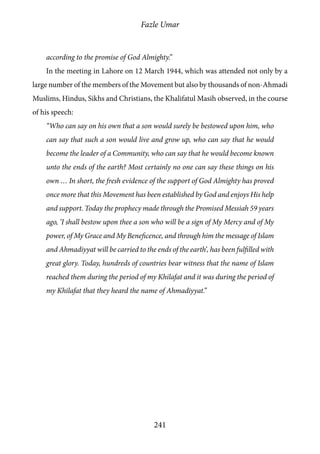
![Fazle Umar
242
Ta’limul Islam high school
Till 1897 there were two primary schools for boys in Qadian: one privately run
Arya School and the other Government School. Teaching staff of both schools consisted
of prejudiced Hindus who let no occasion go to lecture against Islam and criticize the
Promised Messiah [as] and his mission. Ahmadi students were obliged to attend
these schools and hear their blasphemous chattering. When this matter was brought
to the notice of the Promised Messiah [as], he was much grieved. He sought help
from Allah by prayers and supplication and after consultation with his companions,
announced to the Community that it had become imperative to start its own school.
The Promised Messiah [as] named the proposed primary school Ta‘limul Islam
School which was inaugurated on the 1 January, 1898, in two rooms of the guest house.
Within a span of three years the school was upgraded to the level of high school, and
moved to some other suitable spacious place.
Ta’limul Islam High School was still in its infancy when Maulvi Muhammad Ali
and party who were responsible for the management of the School, left Qadian in
1914. The school being no longer housed in its dilapidated building its custodians
might well boast of having constructed a magnificent edifice of which the Community
might well feel proud. It was indeed a grand and imposing building set in a picturesque
background, rich in environs, constructed at a tremendous cost that spoke volumes
for the generosity, and benevolence of the members of the Community.
The Lahore group had attracted the notice of the Community for their untiring
energy and selfless devotion with which they had been managing the whole show. Being
supported and encouraged in their plans they began to attach too much importance
to themselves and their schemes. Hence, in the minds of the Lahore Group the fate of
the Community was doomed when the Community elected Hadhrat Sahibzada Sahib](https://image.slidesharecdn.com/fazl-e-umar-160102120102/85/Fazl-e-Umar-248-320.jpg)
![Fazle Umar
243
as Khalifatul Masih II in 1914.
The educational institution would definitely sink into insignificance. The building
would pass over to Aryas or Christians whose arguments in favour of their faith and
attacks on Islamic teaching would remain unbaffled by the mediocre ability and intel-
ligence left behind. Hitherto all attention had been riveted on the school and almost
all those associated with its name were then considered to be huge intellectual giants
and all prophecies about the collapse of the Community bade fair to being fulfilled.
They left Qadian but their hopes never materialised. 115
During the lifetime of the Promised Messiah [as] the Ta’limul Islam High
School had been raised to an Intermediate College, but in consequence of a set of new
regulations of the University of the Punjab, compliance with which was beyond the
resources of the Community, the College classes had to be closed in 1905. The need of
a college had, however, progressively become more insistent due to the reasons cited
above and eventually the Ta’limul Islam College was restarted on 4 June 1944, but this
time the College was not limited to Intermediate classes. It was designed as a Degree
College. Sahibzada Mirza Nasir Ahmad sahib M.A. (Oxon.) was appointed the first
Principal of the College, a position that he held for 21 years, till he was elected to the
holy office of Khalifatul Masih.
It was preordained that the opening of the college should coincide with the
announcement of the claim and declaration of being the Promised Reformer by
Hadhrat Khalifatul Masih II [ra]. The college had some characteristic features which
were beautifully set down by Hadhrat Mirza Bashir Ahmad, M.A., in one of his articles
published in the Al Fazl. In the course of his article he says:
“The first peculiar feature of this college is that its inauguration coinciding
with the announcement of the claim of ‘Musleh Mau’ood’ by Hadhrat Amir
ul Momineen Khalifatul Masih, has fallen in a time, which may be called the](https://image.slidesharecdn.com/fazl-e-umar-160102120102/85/Fazl-e-Umar-249-320.jpg)
![Fazle Umar
244
beginning of a new era in the history of the Community. Beside other auspicious
movements, which are before the Community at this time, God has even made
our college a sign amongst the manifold signs of the new era. In other words
our college, from its very birth, is bringing the message of prosperity and bliss.
All praises be to Allah for this!
“The second peculiarity of this college is that it is coming into existence in the
last part of the present World War, at a time when the greatest statesmen of
the world are pondering over the New World Order, to be established after the
termination of the War. In this way our college is coming closely tied with two
great movements, one religious, the other secular and a Divine Community
which is used to seeing the Divine hand working in every matter, cannot ignore
its inauguration by putting it down as a mere chance…” 116
On the occasion of the opening of the College in 1944, Hadhrat Khalifatul Masih
II [ra] delivered a most learned and detailed address setting out the purpose and
objectives for which the College was being established, and the whole purpose and aim
of higher education and the proper means of their achievement. In the very beginning
of his address he observed:
“The establishment of the Ta’limul Islam College has a double purpose. One
purpose is to provide means of higher education without which no Community
can improve its cultural and economic conditions. So far as that purpose is
concerned the doors of the College will be open to all students irrespective of
caste and creed.
“Its second purpose is related to the influence of modern education upon
religion…The Professors of this college should charge themselves, among other
things, with the duty of repelling the objections raised against Islam on the basis
of their particular subjects, through those very subjects. Thus while the Professors](https://image.slidesharecdn.com/fazl-e-umar-160102120102/85/Fazl-e-Umar-250-320.jpg)
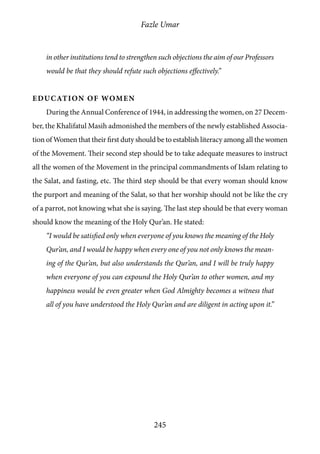
![Fazle Umar
246
Partition
The last phase of the struggle for the independence of India began in London in
the spring of 1945. In the Commonwealth Relations Conference in Chatham House, St
James’ Square, the Indian delegation was led by the President of the Indian Institute of
International Relations, Sir Chaudhry Muhammad Zafrullah Khan, who was a zealous
member of the Movement. In his two speeches on the opening day of the Conference,
17 February, he put forward so strong and well reasoned a plea urging Britain to move
forward realistically towards the independence of India that the British press as well
as British statesmen were convinced that India’s demand for independence could
no longer be ignored and that practical steps must be taken through constitutional
procedures to satisfy Indian aspirations. The immediate reaction of His Majesty’s
Government was to invite the Governor General of India, Lord Wavell, to London for
consultations. Lord Wavell returned to India armed with a formula for the indepen-
dence of India. He announced his scheme over the All-India Radio on 14 June 1945.
On 22 June 1945 Hadhrat Khalifatul Masih II [ra], in his Friday sermon, urged
Indian political leaders to take full advantage of the British offer. He concluded his
address with a strong plea that Indian political leaders should arrive speedily at an
understanding among themselves which should enable India to achieve independence
without much delay. He said:
“Here four hundred million human beings are held in bondage. Their outlook
has undergone a tremendous change, in consequence of which Britain has
announced that it is ready to bestow independence upon India, but Indian
political leaders are disputing with each other over matters of detail… We
are a small Community and observing this state of affairs we can do little to
improve it. But we can certainly supplicate the Divine: ‘Lord, do Thou open the](https://image.slidesharecdn.com/fazl-e-umar-160102120102/85/Fazl-e-Umar-252-320.jpg)
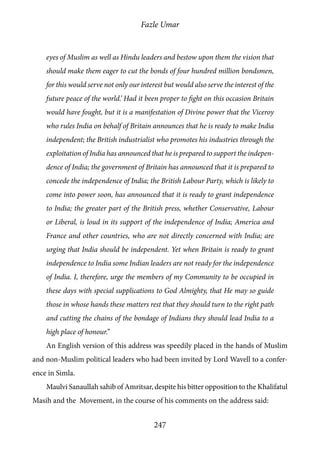
![Fazle Umar
248
“What the Khalifa of Qadian has said is well worth reading and listening
to. He has urged the leaders to work together in amity and co-operation. His
words display great and surprising courage. The speeches of the conference
leaders contained no stronger expressions. The eagerness to secure the freedom
of four hundred million Indians which is expressed in the Khalifa’s address is
not matched even in the speeches of Mr Gandhi.”
No agreement could be reached in the Simla conference, mainly due to the firm
refusal of the representatives of the Indian National Congress to recognise the Muslim
League as the sole political representative of the Muslims. The claim of the Muslim
League that it was the sole representative of the Muslims had been demonstrably
established in the elections to the legislative bodies in India.
Cabinet Mission Plan
Under the directions of Hadhrat Khalifatul Masih II [ra] the Community had
throughout lent its full and enthusiastic support to the Muslim League, and contin-
ued to do so throughout the troubled period that lay ahead. By the summer of 1946,
when the Cabinet Mission Plan was presented to Indian leadership, even the Indian
National Congress had to concede, and to reconcile itself to the position, that the
Muslim League was the sole political representative of the Muslims. When the Con-
gress leadership, after signifying its acceptance of the Cabinet Mission Plan, in effect
tore it up by proclaiming its own interpretation of some of its crucial clauses, which
was clearly inconsistent with the language of those clauses, and the strenuous efforts
of Lord Wavell to persuade Pandit Jawaharlal Nehru and Mr Gandhi to agree to give
effect to the clear meaning of those clauses were frustrated, and Prime Minister Attlee
made a last minute attempt to salvage the plan through his personal intervention, the
only representatives summoned by him to London were Mr Nehru and Mr Jinnah. Mr](https://image.slidesharecdn.com/fazl-e-umar-160102120102/85/Fazl-e-Umar-254-320.jpg)
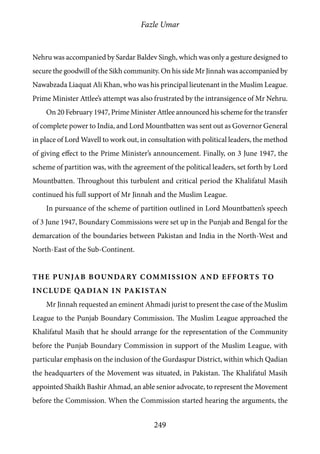
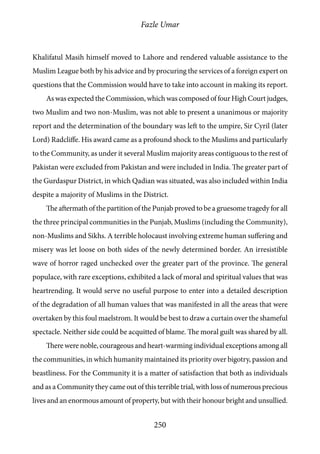
![Fazle Umar
251
The Community as a whole, and its individual members, rendered aid and assistance
to their suffering fellow beings without distinction of caste or creed, in every situation
in which they were capable of rendering assistance, at the risk, and sometimes even
at the cost, of their own lives, security and property. This was freely acknowledged on
all hands. So long as the Ahmadis were not expelled from the greater part of Qadian,
under police and military action, Qadian continued to serve as an asylum for Muslim
refugees who were being driven out of the areas which had been allotted to India and
were fleeing to Pakistan. When the turn of Qadian itself came, and the greater part of
it had to be evacuated, the Community exhibited an extraordinary spectacle of dis-
cipline, orderliness, steadfastness and courage. Despite all the adverse developments
that took place hourly after the announcement of the Boundary Award, the Khalifatul
Masih himself remained in Qadian, while the steady evacuation of sections of the
population of Qadian and of the records and valuables belonging to the institutions
of the Community proceeded in an orderly manner. It was a time of severe trial, and a
testing of faith and all sterling values. By the sheer Grace and Mercy of the Divine not
only was there no falling from grace, there were numerous instances of true heroism
and heartening and almost miraculous experiences of Divine help and protection.
As soon as Hadhrat Khalifatul Masih II [ra] arrived in Lahore he issued direc-
tions that it was an obligation upon every member of the Community to render every
assistance to such non-Muslims as were still in Pakistan. Many of them were exposed
to danger at the hands of Muslims who were incensed at the brutalities and horrors to
which Muslims in East Punjab had been subjected at the hands of the non-Muslims.
Train after train arrived from East Punjab crammed full with Muslim refugees, some
of whom had been cruelly murdered in the course of their journey by non-Muslim
mobs which ransacked the trains at different stops, almost all the survivors bearing
marks of injuries, many of them grievous; children with their eyes gouged out, their](https://image.slidesharecdn.com/fazl-e-umar-160102120102/85/Fazl-e-Umar-257-320.jpg)
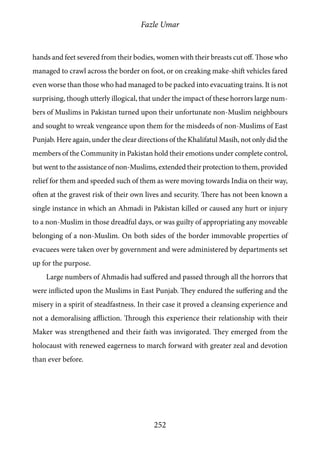
![Fazle Umar
253
Rabwah
The Muslim Community was very blessed to have a brave leader in Hadhrat Mirza
Bashiruddin Mahmud Ahmad [ra]. He alone had the courage and vision to save the
Community from dispersion and depravation during these difficult times. It was his
hard work, dedicated effort and extraordinary leadership that despite overwhelming
circumstances resulted in the foundation of the new city for the headquarters of the
Community. Thus a new city was born which would take its place on the map of the
world and serve as a beacon of light radiating the truth and beauty of Islam for future
generations.
Migration is among the traditions of the prophets. Many prophets and their com-
munities have undertaken migration in order to spread the religion of Allah throughout
the world. Our beloved Holy Prophet, Hadhrat Muhammad [saw] also migrated
after enduring 13 long years of hardship. As a result a new era of Islamic history began
and a new Islamic nation was born. Away from the oppressive confines of Mecca the
truth and beauty of Islam rose like a spiritual sun engulfing the world with its light and
radiance. During the era of the righteous Khalifas the advancement of Islam reached
its apex. Then at the beginning of the 14th Islamic Century in accordance with the
prophecies of the Holy Prophet [saw], Hadhrat Mirza Ghulam Ahmad [as] of
Qadian claimed to be the Promised Messiah. He established the headquarters of the
Community in Qadian and this blessed land became the flag bearer in the service of
Islam throughout the world. 117
On 18 September 1894 the Promised Messiah [as] had received the revelation
(Urdu): “The stigma of migration.” He himself and Hadhrat Khalifatul Masih II [ra]
had seen dreams and visions that revealed some of the aspects of the migration with
which the Community would be confronted. For instance, six years before the partition](https://image.slidesharecdn.com/fazl-e-umar-160102120102/85/Fazl-e-Umar-259-320.jpg)
![Fazle Umar
254
of the country Hadhrat Khalifatul Masih II [ra] saw in a dream that he was at some
place at a distance from Qadian and was worried by a recollection that Qadian had
been invaded. In his dream Sheikh Muhammad Naseeb, an Ahmadi resident of Qadian,
came to him and the Khalifatul Masih inquired from him what was the situation in
Qadian. The reply was that the enemy had occupied the greater part of Qadian but had
been checked just outside the central quarter of the town which contained the house
of the Promised Messiah [as], the two principal mosques, the offices of the Central
Association and the Heavenly Graveyard. On receiving this reply the Khalifatul Masih
II observed: “If the central quarter is secure, all is secure.” It so happened that after all
the upset and the taking over of the greater part of Qadian by the non-Muslims, with
the active assistance of the Indian army and police, the incursion was checked right at
the border of the central quarter. These revelations, dreams and visions were fulfilled
during the tribulations that followed in the wake of partition. 118
After the partition of British India the Community was forced to leave its head-
quarters. Hadhrat Khalifatul Masih II [ra] made the decision to leave India and
migrate to Pakistan. Under his leadership the majority of the Community migrated.
Only a handful of members (313 in number) remained behind who became known
as the Dervesh of Qadian, Derveshaane Qadian. 119
Once in Pakistan, Hadhrat Khalifatul Masih II [ra] set about the task of estab-
lishing a new headquarters. In order to keep the Community united and its adminis-
tration functioning he assigned various individuals the task of finding an appropriate
location for this purpose. In accordance with the Khalifa’s directives Ch. Aziz Ahmad
Bajwa inspected various locations. When he crossed the river Chenab in Chiniot, he
discovered the location which is now known as Rabwah. After exploring the area fur-
ther he believed that this isolated place would be suitable for the headquarters of the
Community. The piece of land he found was so barren and dry that it was incapable](https://image.slidesharecdn.com/fazl-e-umar-160102120102/85/Fazl-e-Umar-260-320.jpg)
![Fazle Umar
255
of supporting any agriculture. Mir Mohammad Nasir sahib sates:
“At that time Rabwah was absolutely barren, there was no water or electricity
or gas. There was nothing. Because of the sand and crystallised salt it was dif-
ficult to work the land. There was one tree and a broken bench on the site. On
that bench the words ‘Anjuman Khuddamul Islam Chiniot’ were written. Locals
as well as agricultural experts insisted that the soil at this location could not
support any vegetation. Plants could not be grown and sustaining any shade
bearing trees would therefore be impossible. They argued that it was therefore
totally unsuitable for the needs of the Community. Having heard these opinions,
Hadhrat Khalifatul Masih II [ra] decided to visit the location himself. So in
the company of a few people he travelled to the area and inspected it in detail.
That evening he returned to Lahore and announced that the land should be
bought immediately. Hadhrat Khalifatul Masih II [ra] appointed Nawab
Mohammad Deen to begin the process of acquiring the land and so the new
headquarters were born.” 120
After paying the designated price, the Community acquired the site which con-
stituted 1,034 acres and so the beginning of the new headquarters was born. 121
The
proposed town to be constructed on the barren, treeless site on which not a blade
of grass had ever sprouted, was named Rabwah, which is the name ascribed in the
Holy Qur’an to the region where Jesus [as] eventually found shelter (Ch23:V.51).122
Upon receiving permission from the government, Hadhrat Khalifatul Masih II [ra]
immediately appointed a committee to start planning the settlement of the new head-
quarters. For the official inauguration of Rabwah, Hadhrat Khalifatul Masih II [ra]
left Lahore on 20 September 1948 by car. After crossing the river Chenab bridge, he
got out of the car with his companions, turned towards the Kaaba and prayed, “O my
Lord make my entry a good entry and make me go forth a good going forth. And grant](https://image.slidesharecdn.com/fazl-e-umar-160102120102/85/Fazl-e-Umar-261-320.jpg)
![Fazle Umar
256
me from thyself a helping power.” (The Holy Qur’an, Ch.17:V.81)
He repeated this prayer many times with much feeling and emotion, got back
into his car and continued to the inauguration. The inauguration took place at the
location which is now enclosed by the Fazle Umar hospital. Contrary to other worldly
inaugurations this was humble and full of emotion and prayer. Hadhrat Khalifatul
Masih [ra] recited the prayer of Hadhrat Abraham [as] which he had recited at
the construction of the Kaaba.
After the inauguration the construction work and settlement effort began. At first,
tents were erected for temporary living quarters and office use. After this, temporary
buildings were constructed followed by permanent ones according to the planning
map. The lack of water resources initially presented a major challenge. Experts consid-
ered natural underground reserves unsuitable for human consumption and agriculture
but Hadhrat Khalifatul Masih II [ra] directed that efforts should continue and then
as had been indicated by an earlier vision of his, these reserves underwent a miraculous
change and became a usable source of fresh water.
Once the construction work had begun people started coming in droves to settle
here. Hadhrat Khalifatul Masih II [ra] divided Rabwah into seven neighbourhoods
and assigned names to each one. Similarly he named various streets. Thus the basis of
the town of Rabwah had been laid.
Rabwah which began as tents and adobe structures in 1948 was continuously
blessed by the presence of the successors of the Promised Messiah [as]. Rabwah
strived forward rapidly and before long the attention of the world turned towards it. It
acquired international attention as the headquarters of the Movement. The temporary
buildings of old were replaced by some of the best modern structures. Today Rabwah
is ranked among the best cities in Pakistan. This city which had its foundation laid by
the prayers of Abraham [as] is the recipient of constant rewards and blessings. Each](https://image.slidesharecdn.com/fazl-e-umar-160102120102/85/Fazl-e-Umar-262-320.jpg)
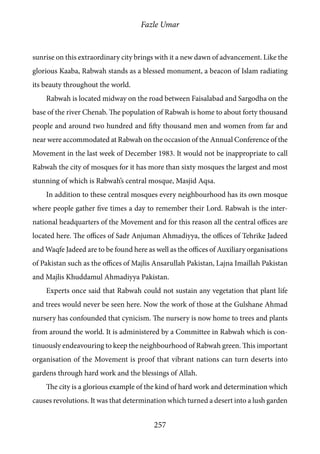
![Fazle Umar
258
and a desolate land into a populated organised settlement. This is a living city. Each
day in Rabwah heralds the dawn of greater advancement and from here each day the
trumpet call of Islam resounds further as the Community strives to convey its message
to the corners of the earth.123
All this has been consummated and has grown out of the seed sown by the Prom-
ised Messiah [as], and nurtured and guarded by his Successors more particularly by
Hadhrat Khalifatul Masih II [ra] during more than half a century of his Khilafat.](https://image.slidesharecdn.com/fazl-e-umar-160102120102/85/Fazl-e-Umar-264-320.jpg)
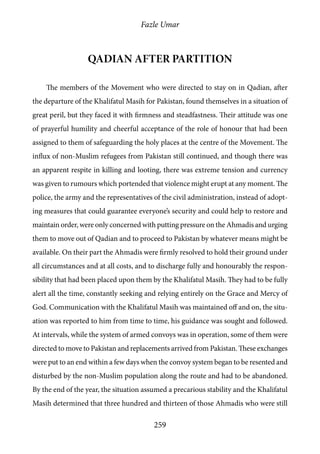
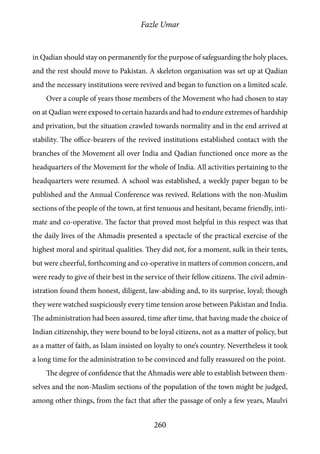
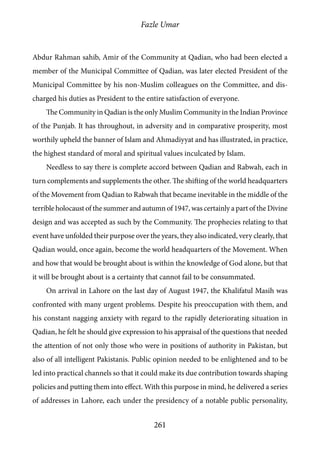
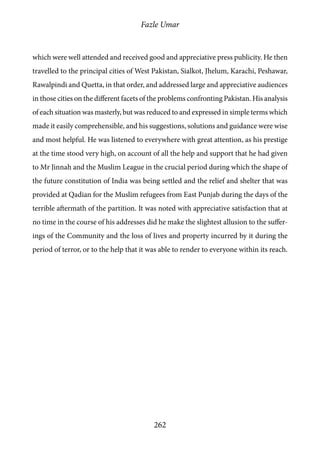
![Fazle Umar
263
Hadhrat Musleh Mau’ood’s [ra] services
for the Holy Qur’an
Hadhrat Mirza Bashiruddin Mahmud Ahmad [ra] wrote over 200 books and
pamphlets. Perhaps his greatest achievement was his outstanding contribution to lit-
erature. Although he had no worldly qualifications he clearly displayed the ability as
he was promised by Allah in both religious and secular knowledge, the fountainhead
of which he said was the Holy Qur’an.
Hadhrat Musleh Mau’ood [ra] flourished with rapidity and became an instru-
ment of establishing the superiority and status of the word of God, the Holy Qur’an, in
all the corners of the world. No scholar in the entire world could dare challenge him.
The enemies tried their level best to put obstacles in his way but Almighty Allah,
purely by His Grace, utterly humiliated them all, and established the steadfastness and
high resolve of Hadhrat Musleh Mau’ood [ra].
Angels Appointed for his Instruction
One of the roles of angels is the transmission of messages from God to human
beings. Their function is to give currency to and aid the dissemination of knowledge.
Angels are busy serving everything that exists on earth that has potentiality and are
helping everything attain its desired goal to its fullest extent. Be it a particle of dust
or a drop of water that enters an oyster shell, or the womb of a mother, through the
spiritual influence of these angels of God it is transformed into a ruby, a sapphire, a
diamond, a highly lustrous and large pearl, or a human being with great qualities of
head and heart like Hadhrat Musleh Mau’ood [ra].
When the creative individual bends all his efforts towards some great goal, the
same problems, which occupy his rational waking thoughts, will shape his imagery](https://image.slidesharecdn.com/fazl-e-umar-160102120102/85/Fazl-e-Umar-269-320.jpg)
![Fazle Umar
264
and pervade his dreams. Information is actively sought and analysed. In the second
phase when the paths of previously independent ideas intersect, the result is something
new, not predictable from our knowledge of the special laws governing each system
in isolation. There is something of the ‘flash of insight’ idea of creativity here. It is the
angels of God that sow the seed and one becomes suddenly conscious of a previously
unconscious idea.
Hence, one of the many functions of angels is not only to teach religious knowledge
but also secular knowledge even to individuals who are atheists. Authentic cases of
revelation are also reported outside the domain of religion where highly complex infor-
mation was conveyed through revelation to scientists and inventors such as Thomas
Edison, Elias Howe and Fredrich August Kekule. Thomas Edison had numerous
“Eureka!” moments as when he discovered the phonograph. Edison simply loved the
challenge of inventing. He was always looking for solutions to problems. Great ideas
frequently popped into his head like lightning bolts out of the blue. Angels excited and
stimulated his mind with knowledge, knowledge that he relished and savoured. Angels
help everything attain its desired goal to its fullest extent and therefore, prophets of God
and saints are taught religious knowledge because they have an affinity for the Divine.
Hadhrat Musleh Mau’ood [ra] explained that angels reveal messages in a strange
way. Angels influence man just as the mind of one person can activate another person’s
mind and direct it to think in accordance with his command. Ideas of one person can
be transmitted to another person’s mind without the employment of any material
medium. Hence, when angels descend with knowledge, it does not descend upon the
conscious mind but instead; the messages excite the subconscious machinery. This
is so that one can recall the messages with some concentration and thought as the
subconscious mind is a more permanent storage than the conscious mind.
Angels sometimes lodge information deep in the subconscious mind. Circum-](https://image.slidesharecdn.com/fazl-e-umar-160102120102/85/Fazl-e-Umar-270-320.jpg)
![Fazle Umar
265
stances are created to recall this memory and information moves from the subconscious
to the conscious mind. This information cannot be consciously recalled.
Allah Almighty effectively attended to the critical period of Hadhrat Sahibzada
Sahib’s development. We refer to the time when the adult goals are formed between
the ages of about twelve to eighteen. During adolescence there is a second refinement
of the mental system, an all but final reorganisation for adulthood. Career choices
are made, goals are set, and we decide who we want to be. Allah Almighty decided to
imbue Hadhrat Sahibzada Sahib with the finest curriculum and did so deliberately.
In 1907, an angel taught him the commentary of Surah Fatiha. From then onwards,
he was gifted with an amazing knowledge of the commentary of the Holy Qur’an.
Hadhrat Musleh Mau’ood [ra] recalls that he was around 17 years of age and had
just launched the Tashheezul Azhan magazine.
In a dream an angel appeared before him. Huzur states that this vision was a
strange spectacle. It began with the sound of a chime. This noise spread out to form a
vast landscape. A figure gradually began to emerge from within the plain and it became
obvious that it was an angel. The angel asked, ‘Shall I teach you the commentary of
Surah Fatiha?’
The Angel began to teach Huzur. When he reached iyakanahbodo (Ch.1:V.5) the
angel said, “none of the scholars wrote the commentary beyond this point but I shall
teach you the commentary beyond this verse.” The angel proceeded to teach him the
commentary of the rest of the Surah.
Upon reflection Huzur was led to infer that up to verse 5 requires human effort,
which terminates at this point. Man is unable to give commentary on those verses that
require God’s commentary and lie outside the knowledge of man.
Upon waking in the morning Hadhrat Sahibzada Sahib had forgotten what he had
been taught by the angel. Sometime after this vision, he was explaining to a group of](https://image.slidesharecdn.com/fazl-e-umar-160102120102/85/Fazl-e-Umar-271-320.jpg)
![Fazle Umar
266
friends on the way to a football game that Allah always blessed him with fresh insight
into Surah Fatiha each time he spoke on this chapter.
He was suddenly approached after the football game to speak at a gathering
organised by the Muslims. Huzur recalls that when he stood to speak, the only Surah
that kept coming to his mind was Surah Fatiha and he felt it was a trial in which he
was being forced to recite this chapter. He remembers his mind being completely blank
as he began reciting the first few verses. However, as he finished the last verse a new
insight immediately came to mind.
Hadhrat Sahibzada Sahib began to explain to the gathering the significance of
the last verse. When this chapter was revealed to the Holy founder of Islam, Hadhrat
Muhammad Mustafa [saw], he was addressing the disbelievers of Mecca. However,
the last verse teaches us to pray to save us from following in the footsteps of the Jews
and Christians even though it would have been appropriate to teach us to pray against
following in the footsteps of the disbelievers who were confronting the Holy Prophet
[saw]. This points to the fact that as polytheists of Mecca were to be destroyed
and annihilated, there was no need to teach a prayer concerning them. However, as
Jews and Christians were to survive till Judgement Day, hence a prayer was taught
relating to them.
In these circumstances, Hadhrat Musleh Mau’ood [ra] was most grateful to the
Gracious Lord who protected his honour. 124
In the Hadith, Surah Fatiha is referred to as the mother of the Holy Qur’an. Like
the microscopic ovum (fertilised egg) becomes mother to something far greater in
the form of a child, similarly the Surah Fatiha contains the blueprint of the whole of
the Holy Qur’an. 125
Hence, in this way Hadhrat Musleh Mau’ood [ra] was gifted with an amazing
knowledge of the commentary of the Holy Qur’an. Thereafter, he started the work of](https://image.slidesharecdn.com/fazl-e-umar-160102120102/85/Fazl-e-Umar-272-320.jpg)
![Fazle Umar
267
service to the Holy Qur’an. He became a challenge to the whole world and delivered
over three hundred talks on Surah Fatiha alone.
Pronouncement of Enemies
Allah had granted him a deep encyclopaedic intrinsic spiritual knowledge and
understanding of the Holy Qur’an, thus fulfilling the prophecy that through him the
glory of Islam and the dignity of the Qur’an would be convincingly established. He
had said that there were hundreds and thousands of truthful realities in the Holy
Qur’an, which Allah had disclosed to him with His special Grace through intuition
and revelation. 126
In a public gathering in Delhi in 1944, claiming himself to be the “Musleh
Mau’ood” (Promised Reformer) and reiterating his challenge about the interpretation
of the truths and wisdom of the Holy Qur’an, he declared:
“I do claim again that even if thousands of scholars assembled to compete
with me in writing commentaries of the Qur’an, yet the world would accept
and acknowledge that my commentary was unique in wisdom of divine truths
in depth.”
These were Hadhrat Musleh Mau’ood’s [ra] own pronouncements. One can
gauge the extent to which his enemies accepted these claims from the comments of
the Ahrar leader, Maulvi Zafar Ali Khan, Editor of “Daily Zamindar” Lahore, himself
an eminent Muslim leader and writer. Maulvi sahib had the misfortune of being an
opponent of Ahmadiyyat from a young age. However, when failure stared him in the
face after each fruitless endeavour, he searched for a reason for his lack of success. At
one time truth emanated from his lips and while addressing other opponent groups
he had to concede:](https://image.slidesharecdn.com/fazl-e-umar-160102120102/85/Fazl-e-Umar-273-320.jpg)
![Fazle Umar
268
“Listen with your ears wide open, you and your accomplices could never compete
with Mirza Mahmud till resurrection. Mirza Mahmud has the Qur’an with him, and a
deep knowledge of the Qur’an, What have you got? … You have never read the Qur’an
even in your dreams.” 127
On his death, in a condolence note written in Sidq-e-Jadid, Lucknow, it was
mentioned:
“May Allah reward the Imam Jama’at Ahmadiyya’s (Hadhrat Musleh Mau’ood)
effort towards world-wide publication of the Holy Qur’an and its wisdom and
also for the propagation of Islam in all the corners of the Earth and in lieu of
this let us overlook all other matters. The learned manner in which he has inter-
preted in detail, the truth and wisdom of the Holy Qur’an was really unique.” 128
The new definition of the wisdom of the Holy Qur’an, written in his Tafseer Kabeer,
bears undeniable evidence of the truth and validity of Hadhrat Musleh Mau’ood’s
[ra] claim. The age became convinced of the superiority of his Quranic knowledge.
One cannot elaborate on all the aspects of the services for the Holy Qur’an rendered
by Hadhrat Musleh Mau’ood [ra]. Hence, we will briefly touch upon some aspects
of how he occupied himself with this task.
His Life was the Holy Qur’an
Those who knew him testify to the truth of the claim that his sitting, standing,
walking, talking, his every gesture was completely in unison with the teachings of the
Holy Qur’an. His conversation, his speeches and all his writings were a commentary
of the Holy Qur’an. If one studies Huzur’s books from this point of view, one appreci-
ates that not a single book was penned by Huzur whose topic did not spring from the
Holy Qur’an.
He delivered masterly and instructive speeches for hours without interruption.](https://image.slidesharecdn.com/fazl-e-umar-160102120102/85/Fazl-e-Umar-274-320.jpg)
![Fazle Umar
269
Hadhrat Musleh Mau’ood [ra] spoke on the Holy Qur’an with such fondness. He
would recite, sometimes repeating parts of the verses in a voice steeped in emotion.
The audience were deeply affected, many with streaming eyes and convulsed hearts.
During the recitation one could see the signs of love and devotion, admiration and
attachment to the Holy Qur’an written on Huzur’s face. It was so completely enchanted
by the Holy Book that it appeared as if his face had disappeared and only the love of
the Qur’an remained.
For hours the congregation would sit encapsulated, listening with rapt attention
to those eloquent and scholarly speeches. His speeches were intellectual banquets at
which those present were regaled to their great delight and enjoyment. He stimulated
the intellects of those present, enlivened their faculties, incited them to climb moral
and spiritual heights and sent them home greatly enriched and determined to carry
out a spiritual revolution both inside themselves and in the world around them. No
one experienced any fatigue or burden and at the conclusion of the meeting the gen-
eral feeling was of regret that the banquet had not continued longer. This was not just
the view of Huzur’s followers and those loyal to him. Those who opposed him also
held this view. Those who were proclaimed great scholars, thinkers and poets in the
Eastern world also held this view.
Dr. Allama Iqbal had the good fortune to chair a gathering in Lahore in which
Hadhrat Musleh Mau’ood [ra] delivered a speech. In the closing remarks, Dr. Allama
Iqbal stated that it had been a long time since he had heard someone deliver a speech
that demonstrated such depth of religious knowledge. Dr. Iqbal was particularly
impressed with the profound commentary on the verses quoted by Huzur during the
speech. He went on to say that he did not want to speak for long as he did not want
to lose the feeling of delectable gratification, which Huzur’s speech had left upon his
heart. For this reason he brought his speech to a speedy end.](https://image.slidesharecdn.com/fazl-e-umar-160102120102/85/Fazl-e-Umar-275-320.jpg)
![Fazle Umar
270
Propagation of the Holy Qur’an Throughout the
World
It was not enough for Hadhrat Musleh Mau’ood [ra] just to write the com-
mentary and distribute it. Huzur created an organisation for the service of the Holy
Qur’an. This was a great undertaking.
It was necessary to train those scholars who were to convey the Qur’an. In fact,
an organisation was required to carry its message to the corners of the earth. There
was a need for such godly scholars who would not only possess the knowledge of the
Holy Book but could demonstrate the Holy Qur’an to be a life-giving message. No
dark clouds cast their shadows upon the souls of those who followed the Qur’an; on
the contrary their souls would continue to be bathed in the sunshine of heaven.
Hadhrat Musleh Mau’ood [ra] was able to create such beacons of light that pos-
sessed the spirit of sacrifice enabling them to promulgate the Qur’an in all directions.
In time they drew humanity with magnetism so mighty in operation that it created
in them a power to act upon the doctrines taught, as mere knowledge of the virtues
cannot make a man godly. Hadhrat Musleh Mau’ood [ra] realised that victory would
not be achieved solely on the basis of superior knowledge.
With the idea of creating great scholars, Hadhrat Musleh Mau’ood [ra] always
promoted a sense of love and respect for the Holy Qur’an in the Jamia Ahmadiyya
with extraordinary care and attention.
He prepared scholars who besides being knowledgeable about Islam and Ahmadi-
yyat were also excellent writers and speakers and worldly-wise. He called the youth of
the Jama’at to dedicate themselves for proper education in the Jamia and then be put
to service like Prophet Abraham’s birds for the service of the Holy Qur’an.
Huzur reminded the Jama’at time and again about sacrifice. They should sacrifice
only the best of what Allah has bestowed upon them, with a willing and cheerful heart.](https://image.slidesharecdn.com/fazl-e-umar-160102120102/85/Fazl-e-Umar-276-320.jpg)
![Fazle Umar
271
Such children were not to be dedicated that were academically, mentally or physically
weak. Those that did step forward were to have their names indelibly printed in the
annals of Islam forever.
Hadhrat Musleh Mau’ood [ra] had many children. He dedicated the lives of
all the boys to the service of Islam. One of his children, Hadhrat Mirza Tahir Ahmad,
Khalifatul Masih IV, recalled that when he finished his education, his august father sent
for him and explained that he only had children with the intention of them serving
the cause of Islam. This was what he expected from him in the future. Hence, he put
Hadhrat Mirza Tahir Ahmad [rh] through Jamia Ahmadiyya and also the Maulvi
Fazil degree course to help him in this task. He repeated this with all his children.
Hence, Hadhrat Musleh Mau’ood [ra] served with everything Allah had bestowed
upon him through all the means at his disposal.
Huge amounts of money were required for this endeavour. It was important to
establish a worldwide organisation and libraries were also needed to spread the teach-
ings of the Holy Qur’an across the world. Hadhrat Musleh Mau’ood [ra] eagerly
turned his attention to all these matters with great zeal and determination. With his
powers of oration he was able to stimulate and arouse members of the Movement to
heed his call and devote themselves to the service of the Qur’an. They responded to
their spiritual father in the fullest measure.
Children were educated under a huge burden of expense by the members. Some
by poor families whose only means of sustenance was what they happily gave up in
the way of Allah. They forsook the luxuries of this world; they kicked them aside and
repeatedly presented their children to Hadhrat Musleh Mau’ood [ra]. One is hard-
pressed to find examples of such untiring and persistent spirit of financial sacrifice
on the face of the planet. Their lives and their property were a ransom in the cause of
Allah. It is as a direct result of this spirit that today service is being rendered to the](https://image.slidesharecdn.com/fazl-e-umar-160102120102/85/Fazl-e-Umar-277-320.jpg)
![Fazle Umar
272
Holy Qur’an in every corner of the world and Ahmadiyya Missions are to be found in
over 175 countries. In 46 Islamic countries Missions were solidly established during
the Khilafat of Hadhrat Musleh Mau’ood [ra]. And around them active and sincere
Jama’ats exist till the present day.
If those Mujahideen had failed to reach these places and had they not inclined
their hearts to the service of the Holy Qur’an how could the prophecy of the Promised
Messiah [as] have been fulfilled about catching white doves, thereby enabling them
to walk in the footsteps of the Holy Prophet Muhammad [saw].
Translation of the Holy Qur’an into Many
Languages
Besides this, in his tenure as the Imam of the Jama’at, Hadhrat Musleh Mau’ood
[ra] had the Holy Qur’an translated into different languages in order to spread it
to all the nations of the world. Hence, translations were made in English, French,
German, Dutch, Danish and many other languages.
People from different parts of the world gave their opinions about the transla-
tions completed under Hadhrat Musleh Mau’ood [ra]. The famous Dutch Weekly
Newspaper, Dewaagsohel, in its 15 March 1954 issue wrote:
“In this edition the original Arabic text and its Dutch translation is given
together. In its introduction, written by Hadhrat Mirza Bashiruddin Mahmud
Ahmad, the universal teachings of the Qur’an has been presented as superior to
the teachings of Bible and Vedas. According to this introduction the prophecies
of the Old Testament are not about Messiah, instead these are about the Holy
Prophet of Islam.” 129
The Ahmadiyya Community continues to champion the cause of the Holy Qur’an.
The important task of translation continues to this day. The Holy Qur’an has been](https://image.slidesharecdn.com/fazl-e-umar-160102120102/85/Fazl-e-Umar-278-320.jpg)
![Fazle Umar
273
published with translation, and in some cases translation with commentary, in 70
languages.
Commentary of the Holy Qur’an by Hadhrat Musleh
Mau’ood [ra]
The fathomless ocean of Hadhrat Musleh Mau’ood’s [ra] knowledge is exposed
in his magnum opus, the Tafseer Kabeer, an exhaustive ten thousand page com-
mentary on the Holy Qur’an. In this astounding work, Hadhrat Musleh Mau’ood
[ra] uncovered his mastery in the field of history, philosophy, psychology, geology,
linguistics, medicine, astronomy, cosmology, Egyptology and many more. He pos-
sessed great versatility of mind and the range of his intellect was unmatched among
his contemporaries.
The Qur’an was infinite in possible meanings even as the physical world was
infinite in properties and attributes. Hadhrat Musleh Mau’ood [ra] clearly chal-
lenged the intelligentsia of the world that through the Holy Qur’an he would disgrace
all false knowledge as well as corroborate those natural laws, which are unanimously
proved to be universal and unchanging. The Qur’an passes verdict on all branches of
knowledge clearly stating its position. It’s concepts are not such as to be universally
accepted as truth today only to be proved false by the advanced intellectual enlighten-
ment of tomorrow.
The first thing that comes to light upon studying Huzur’s commentary is the
truth of the claim of the Holy Qur’an of being a world of knowledge. There is no such
knowledge in the world, whether new or ancient, scientific, political, economic or
social that is not mentioned in Hadhrat Musleh Mau’ood’s [ra] commentary. The
reader is given a tour through this world of wonders.
The world of external nature seems finite in comparison with the infinity of](https://image.slidesharecdn.com/fazl-e-umar-160102120102/85/Fazl-e-Umar-279-320.jpg)
![Fazle Umar
274
meaning which the Word of God holds within it. If external nature can yield new
knowledge from day to day, if philosophy and science can continue to advance, if
geology, archaeology, physiology, botany, zoology, astronomy, political science, politi-
cal economy, sociology, psychology, ethics, and other natural studies can be added
to daily, should not the Word of God yield more and more knowledge as we advance
from one period of history to another?
The ever-expanding spiritual universe of Hadhrat
Musleh Mau’ood [ra]
It is a practice of Allah that with time He continues to refine the conceptual facul-
ties of man, forever widening the horizon of his awareness. The unknown is forever
being transferred into the known. Allah enabled Columbus to discover a New World
and He expanded the heavens before Galileo. Galileo proudly announced to the world
that he had increased the horizon of human vision a hundredfold. Little did he know
that a day would soon dawn when man would perceive the universe enlarged a hundred
million times greater and vaster than what he observed.
The Hubble telescope beams back pictures of a myriad of galaxies and constella-
tions covering the vast expanse of space over unimaginable distances. Hadhrat Musleh
Mau’ood [ra] presented a spiritual universe, a universe with extraordinary constella-
tions that keep on expanding. In presenting the history of the universe, Huzur points
to a verse of the Holy Qur’an that sheds immense light upon the claim of this truth:
“And the heaven (whether material or spiritual) We built with (Our Own)
powers and indeed We go on expanding it.” (Ch.51:V.48)
The world of the unknown is boundless and fathomless, yet Allah will always
permit man access to the material universe in measured portions. Similarly, Allah will
create such righteous servants like Hadhrat Musleh Mau’ood [ra] who will expand](https://image.slidesharecdn.com/fazl-e-umar-160102120102/85/Fazl-e-Umar-280-320.jpg)
![Fazle Umar
275
the spiritual universe to broaden our horizons so that our vision is constantly enlarged
with the coming into view of that which previously lay beyond the curtain of darkness.
Perfect Sequence throughout the Holy Qur’an
In Hadhrat Musleh Mau’ood’s [ra] commentary we learn that there is a perfect
sequence throughout the Holy Book. The verses of each chapter and the chapters
themselves have a rational sequence. Every chapter, every verse in every chapter, and
every word in every verse, is in its ideal place. So perfect is the arrangement of words,
verses, and chapters that the internal arrangement of other books seems as nothing
compared with the internal arrangement of the Holy Qur’an. Huzur proved that every
Surah possesses a subtle connection with the one preceding it and the one following
it. For example, consider Surah Yunus, Surah Hud and Surah Yusuf.
Hadhrat Musleh Mau’ood [ra] stated that Surah Yunus deals with both aspects
of God’s dealing with man — His Punishment and Mercy. In Surah Hud, the Qur’an
discusses the first category and states that God destroyed the people of Hud so com-
pletely that no trace of them was left behind. So many instances of Divine punish-
ment of disbelievers have been cited in this Surah that the Holy Prophet Muhammad
[saw] is reported to have said, “Surah Hud has prematurely aged me.” (Manthur).
This was the magnitude of the sorrow created by this Surah.
Surah Yusuf, following on from Surah Hud, highlights the way in which God deals
with humanity with His Mercy. This Surah only deals with the life-story of Hadhrat
Yusuf [as] (Joseph) as it bears a very close resemblance to that of the Holy Prophet
[saw]. Hadhrat Yusuf [as] forgave his brethren for their excesses. This Surah left
such a deep impression of the extraordinary Mercy and Compassion of Allah that
with the fall of Mecca into the victorious arms of the Holy Prophet [saw], his bitter
enemies were given full and unqualified forgiveness. Hence, Surah Hud, which deals](https://image.slidesharecdn.com/fazl-e-umar-160102120102/85/Fazl-e-Umar-281-320.jpg)
![Fazle Umar
276
with God’s punishment has been placed before Surah Yusuf, which deals with His
mercy, because the enemies of the Holy Prophet [saw] were to be shown mercy
after they had been punished for their misdeeds. In this way, Hadhrat Musleh Mau’ood
[ra] demonstrated the perfect sequence through all the Surahs.
Safeguarding the status of all religions and
their Prophets
The commentary of Hadhrat Musleh Mau’ood [ra] safeguarded the high status
of all the Prophets of Allah. The earlier commentaries and especially the Bible defamed
the Prophets. Actions attributed to prophets by earlier Jewish scholars claiming they
were, God forbid, incestuous thieves and robbers are reprehensible in the extreme
and would not be tolerated even from ordinary men let alone Prophets. The followers
of these religions are still blindly following these Prophets. These scholars must have
entered these lies into the Book of Moses as a cover for their own sins. Such teachings
are ridiculous and depraved to the extreme.
Hadhrat Musleh Mau’ood [ra] through the Holy Qur’an put forward powerful
arguments in refutation of such filthy claims to prove the Prophets’ high credentials,
their worthiness as spiritual leaders imbued with righteousness and virtue.
Multi-sidedness of the Text
The truth contained in the verse “And the heaven We built with (Our Own) powers
and indeed We go on expanding it.” (Holy Qur’an Ch.51:V.48) becomes repeatedly
apparent in Hadhrat Musleh Mau’ood’s [ra] commentary. Huzur took a tiny verse
and presented a variety of meanings proving the multi-sidedness of the Holy Text.
Some meanings are superficial, some deeper and some deeper still. Whatever the
intellectual level of the reader, his background or experience, he can find in a given](https://image.slidesharecdn.com/fazl-e-umar-160102120102/85/Fazl-e-Umar-282-320.jpg)
![Fazle Umar
277
verse a meaning which will suit his understanding, and which he will find true and
relevant. The same words serve different purposes for different kinds of persons. The
Holy Qur’an has something important and relevant to impart to men of all intellectual
levels.
Huzur was able to demonstrate that not only do the words and verses of the Holy
Book follow an order appropriate to the subject in hand; their arrangement is appro-
priate from many other points of view. He shows how even a tiny verse of the Holy
Book holds within it a variety of meanings, each meaning appropriate for a particular
purpose or point of view. Such an arrangement is miraculous. It answers to the needs
of the general theme of the passage as well as the special themes, which one may find
beneath the surface. In this way, the Surah opens up and there are several doorways,
each doorway presenting a different scenario of the same chapter. For example, Hadhrat
Musleh Mau’ood [ra] elaborated upon Surah Ma’un. In the commentary of:
“Hast thou seen him who denies the Judgement (Arabic Deen)?” (Ch.107:V.2)
Hadhrat Musleh Mau’ood [ra] presented twelve different meanings of the word
“Judgement” in Arabic lexicon and his comments are spread over more than sixty pages
to show the breadth of meaning hidden in this verse. The possible meanings of “Deen”
can be requital or recompense, obedience, judgement or reckoning, ascendancy or
predominance, mastery or rule, plan, prayer, religious organisation, righteousness, state
or condition, Divine decree and also habit or custom. He drew on lexicons regarded
as standard not only by Muslims but also by Arabic speaking non-Muslims. In view
of the different meanings of “Deen” the above verse opens up many scenarios, it may
signify: He is indeed a very bad man:
1. Who has no faith in Divine reckoning;
2. Who disobeys and defies the organisation of the community to which he be-
longs;](https://image.slidesharecdn.com/fazl-e-umar-160102120102/85/Fazl-e-Umar-283-320.jpg)
![Fazle Umar
278
3. Who does not believe that good prevails over evil in the long run;
4. Who does not believe in Khilafat on the pattern of prophethood;
5. Who does not believe in Religion which is the source and basis of all morals;
6. Who does not give up evil ways and does not lead a righteous life;
7. For whom the doing of good deeds does not become a habit;
8. Who does not conform his conduct to the Divine decree i.e. does not develop
in him Divine attributes;
9. Who does not worship God with true and sincere devotion; and
10. Who has no plan in life i.e. who despairs of his future.
Thus the word “Deen” includes in its signification all those things, violation of
which results in complete moral ruin of individuals and nations.
Similarly, take the case of Surah Kauser:
“Surely, We have given thee an abundance of good, So pray to thy Lord, and
offer sacrifice. Surely, it is thy enemy who is without issue.” (Ch.108:Vs.2–5)
This Surah has three verses but Huzur’s comments are spread over one hundred
and fifty-seven pages. These are examples of how he expanded the universe of the Holy
Qur’an and took its subject matter to new heights.
Holy Quran – The Seal of all Books
Another compliment of the commentary of Hadhrat Musleh Mau’ood is the pride
with which he offered proofs of the greatness of the Holy Qur’an. Huzur proved the
Qur’an had distinctive characteristics that made it unique and superior to other reli-
gious books, particularly the Bible. This was not born out of prejudice. Christian and
Jewish writers had mercilessly maligned Islam; they concocted lies and fabrications
against the Holy Prophet [saw] and the Holy Qur’an for many centuries. They took
it as their birthright to use all means necessary to attack Islam. The Holy Qur’an deals](https://image.slidesharecdn.com/fazl-e-umar-160102120102/85/Fazl-e-Umar-284-320.jpg)
![Fazle Umar
279
with all other ideologies and religions. It incorporates in itself the best part of their
teaching, points to their weaknesses and supplies their deficiencies. In this age when
all obscure teachings have come to light it was Hadhrat Musleh Mau’ood who took up
the challenge and showed what the Qur’an had to teach about them. He returned to
this subject again and again. Those who care to follow his writings will not fail to be
captivated by the appeal and persuasiveness of the arguments he put forward.
Quranic Teachings in Line with Human Nature
The commentary of Hadhrat Musleh Mau’ood [ra] makes it clear that unlike the
Bible and other revealed books the Holy Qur’an is a teaching that transcends time and
space because its doctrines are related to the human psyche, which is unchangeable.
Hence, Islam is a universal religion and the Holy Qur’an is Khatam-al-Kutab, that is,
it is the Seal of all Books — it is not a collection of stories. Those who through their
own misunderstanding and the practice of hiding the truth, have referred to the Holy
Qur’an as a collection of stories, do not possess a nature that is capable of recognis-
ing true facts. It is the case that this Holy Book has turned even earlier stories into
a philosophy and this is a great service that it has performed for all the Books and
all the Prophets otherwise their words would have been laughed at today. It is also a
blessing of God that in this age of knowledge when the sciences of the physical world
and the study of specific natural qualities of things are advancing, God has established
a system for man’s attainment of heavenly knowledge and explanation of its truths.
At a time of moral decay and spiritual darkness prophesied by the Holy Prophet
[saw], when these matters did not have any significance greater than ordinary
stories that were being mocked in this age of science, God has presented matters in
the Holy Qur’an as a means of knowledge in the form of a philosophy.
In previous times the idea of heaven and hell was resented as an idea in a very](https://image.slidesharecdn.com/fazl-e-umar-160102120102/85/Fazl-e-Umar-285-320.jpg)
![Fazle Umar
280
simple form. Jesus [as] said to the thief that he will today go to heaven but no expla-
nation of the idea of heaven was given, he did not explain the reality of heaven at all.
As mentioned earlier, in one sense the Christians have even surveyed their heaven.
In contrast, the Holy Qur’an does not present any teaching in the form of stories but
always presents it in the form of knowledge.
Hence, the commentary of Hadhrat Musleh Mau’ood [ra] proved that the Holy
Qur’an had done a great service to the previous Books and to previous Prophets whose
teachings were in the form of stories by giving them a rational form. No person can
gain salvation from these stories and fables until he reads the Holy Qur’an because
such is the glory of the Holy Qur’an. The nature of heaven and hell is clearly explained
by Hadhrat Musleh Mau’ood [ra] throughout the commentary as the subject arises.
The commentary of Hadhrat Musleh Mau’ood [ra] proved to be of fundamen-
tal importance in his battle with other religions. With this, the victors became the
vanquished and the vanquished became the victors. The Holy Qur’an, thought to be
a dead book, became a living book again.
Teachings based on Rationality and Wisdom
The Promised Messiah [as] made an exceptionally important discovery of the
Holy Qur’an. Unlike the Bible, the Holy Qur’an never makes an assertion unless it also
points to the reason for that assertion. Hadhrat Musleh Mau’ood [ra] proceeded to
make a study of the Holy Qur’an, with this unique feature of the Holy Book in view,
to open the doors to many other important truths. With this master-key firmly in his
grip he found that thousands of assertions which were thought to be unsupported
by rational demonstration, and which devotees of the Holy Qur’an were supposed to
believe on authority as assertions of Almighty God, were found to carry their rational
basis with them. The advance of science and the general development of scientific](https://image.slidesharecdn.com/fazl-e-umar-160102120102/85/Fazl-e-Umar-286-320.jpg)
![Fazle Umar
281
methods have promoted in our time the type of mind, which accepts nothing on mere
authority. It was therefore impossible for people in our time to accept statements in the
Holy Qur’an unless they were accompanied by rational justification. With the emphasis
on the Holy Qur’an’s method of offering argument and assertion together, those who
loved the Holy Qur’an were amply satisfied through the extensive commentary of
Hadhrat Musleh Mau’ood [ra].
A Universal Teaching in line with the Laws of
Nature
Hadhrat Musleh Mau’ood [ra] proclaimed the beauty of the Holy Qur’an in
how it describes all the religions of the world as possessing the character of universal-
ity to some degree. This central core is bonded to human psyche and eternal truth.
He claimed that the Bible, for instance, was the word of God. However, it was not
immune from human interference, which corrupted that teaching at a later period.
The Prophet of the Bible, Hadhrat Moses [as] was not as glorious and majestic as
that of the Holy Qur’an. The Crown of God’s creation, the Holy Prophet, Hadhrat
Muhammad Mustafa [saw] was much greater in spiritual eminence than Prophet
Moses [as]. This difference in the manifestation of Glory is also apparent from the
revealed Book of each Prophet.
The Bible presents a completely false picture of the laws of nature. The Holy Qur’an
imparts knowledge about natural phenomena, which is both necessary and sufficient
for the spiritual advancement of man. The Word of God, which is revealed truth, and
the Work of God which is the material universe, must be in perfect unison with each
other. The Divine revelation can never be at odds with the laws of nature, both sharing
the Fountainhead of Eternal Wisdom.
To demonstrate the truth of the Holy Book, Hadhrat Musleh Mau’ood [ra] pre-](https://image.slidesharecdn.com/fazl-e-umar-160102120102/85/Fazl-e-Umar-287-320.jpg)
![Fazle Umar
282
sented scientific statements found in the Holy Qur’an. The Holy Qur’an was revealed
1,400 years ago and the purpose of such verses was to particularly address man of a later
scientific age, so that his belief in the existence of an All-Knowing Supreme Creator is
aided by the knowledge he has gained. Some of these scientific facts are given below
from the five volume commentary of the Holy Qur’an which is an English translation
of the commentary on the Holy Qur’an by Hadhrat Musleh Mau’ood [ra].
1) God has created everything in pairs.
“Holy is He Who created all things in pairs, of what the earth grows, and of
themselves, and of what they know not.” (Ch.36:V.37)
The verse reveals a scientific truth, viz., that God has created all things in pairs,
which was simply inconceivable at the time the Qur’an was revealed. Science has now
discovered the truth that pairs exist in all things, in the vegetable kingdom, and even
in inorganic matter. It has yet to unfold this truth in all its various details Even the
so-called elements do not exist by themselves. They depend upon other things for
their sustenance. This scientific truth applies to human intellect also. Until heavenly
light descends, man cannot have true knowledge, which is born of a combination of
Divine revelation and human intelligence.
2) Existence of Orbits
“And by the heaven full of tracks.” (51:9)
In the lexicon of Lane and Aqrab ‘track’ means the track of the stars, the streak
or track in the sky; the path or way.
Tracks or paths of heaven are the orbits of planets, comets, and the stars with
which the vault of heaven is strewn. These celestial bodies float, in their respective
orbits performing their allotted tasks regularly, punctually and unerringly, without
trespassing on one another’s sphere of action and all united forming a glorious harmony
of structure and motion. This discovery was made by the Holy Qur’an at a time when](https://image.slidesharecdn.com/fazl-e-umar-160102120102/85/Fazl-e-Umar-288-320.jpg)
![Fazle Umar
283
it was believed that the heavens were solid in their formation. Does not this fact alone
constitute an argument in support of the Quran being the revealed Word of God?
3) Influence and benefits of colour
“And He has pressed into service the things He has created for you in the
earth, varying in colours. Surely, in that is a Sign for people who take heed.”
(Ch.16:V.14)
…Colours, too, cast their influences upon man and work for his benefit. The effect
of colour upon the human body and mind is only a recent discovery of science. It is
a marvel of the Qur’an that it made clear reference to this effect more than thirteen
centuries before its discovery by scientists. The verse points out that not only differ-
ent objects in nature but also their distinctive hues and colours serve man’s physical
needs. It is no wonder then that God should have made similar or even greater and
better provision for his spiritual needs….
4) Sun produces light and moon reflects light
“Blessed is He Who has made in the heavens mansions of the stars and
has placed therein a Lamp producing light and a moon that reflects light.”
(Ch.25:V.62)
By alluding to the creation of the heavens, the sun, the moon and the stars that
embellish and beautify them, the verse draws attention to the spiritual heaven which
has its own sun, moon and stars. The Holy Prophet [saw] is the sun of the spiritual
firmament; the Promised Messiah [as] is the moon and the Holy Prophet’s [saw]
Companions and the learned and righteous savants among his followers are the stars
of this spiritual firmament. The Promised Messiah [as] reflected his spiritual light
from the Holy Prophet [saw].
5) Possibility of life in different solar systems and their coming together
“And among His Signs is the creation of the heavens and the earth, and of](https://image.slidesharecdn.com/fazl-e-umar-160102120102/85/Fazl-e-Umar-289-320.jpg)
![Fazle Umar
284
whatever living creatures He has spread forth in both. And He has the power
to gather them together whenever He pleases.” (Ch.42:V.30)
The verse embodies a unique testimony to the Divine origin of the Qur’an. It was
not possible for any human being, much less for an unlettered son of the desert, to say,
as far back as 1,400 years ago, when the science of astronomy was yet in its infancy,
that apart from our planet, life in some form or other existed in heavenly bodies. It
was reserved for the Qur’an to disclose this great and marvellous scientific truth as the
words of this verse, viz., “Whatever living creatures He has spread forth in both,” show.
Indeed the creation of the heavens and the earth and what living creatures exist in
them and the wonderful order that pervades the whole universe constitute an infallible
testimony to the knowledge and power of Almighty God Who has revealed the Qur’an
and Who would bring together the creatures of the heavens and the earth whenever
in His infallible wisdom He would deem fit. The reference in the last sentence of the
verse may be to the possibility of the creatures living on earth and in heavenly bodies
becoming united at some future time.
Only a few examples have been mentioned above along with the commentary of
Hadhrat Musleh Mau’ood [ra]. However, there are many, many others.
Rise of Atheism and Philosophy
In the contemporary age a lack of interest in religion is connected with the
progress that science and philosophy have made in our time. Copernicus and Galileo
proved that the whole universe was not revolving around the earth as accepted by the
Church. Doubts began to creep in soon after man was set on the path of discovering
new realities of nature after the Renaissance. However, in the new era observations
were made that were in glaring contrast to the observations made by the Bible. Dar-
winism, Mendel’s genetics, progress in physics, archaeology and astronomy all raised](https://image.slidesharecdn.com/fazl-e-umar-160102120102/85/Fazl-e-Umar-290-320.jpg)
![Fazle Umar
285
doubts about the existence of God. In philosophy, it fell to Descartes (1596 –1650) to
fight the rebellion against God during the Renaissance. However, a later generation
of philosophers, Rousseau, Nietzsche, Sartre and Marx denied the existence of God
altogether. The Tafseer Kabeer is a great work of Jihad against all secular philosophies.
In the world of ideas, never in human history was a religious teaching faced by
such a diverse blend of ideas – from philosophers, scientists, psychologists, sociologists,
historians, astronomers, and also from all other religions. Hadhrat Musleh Mau’ood
[ra] beat the clear favourites, by highlighting what the Qur’an had to teach about
their new discoveries. In psychology there was Freud, in biology there was Darwin,
in theology there was Wherry, Noldeke, Rodel and William Muir. These personalities
were renowned throughout the world and were created to attack the Holy Qur’an.
If the Holy Qur’an is the word of God, it is but fitting that we should have derived
newer and newer knowledge from it so that spiritual science should have kept pace
with natural science. The errors of natural science, its deviations from truth and its
exaggerations, should have been corrected, whenever and wherever necessary, by new
knowledge drawn from the Holy Qur’an. When natural knowledge seemed contrary to
the teachings of the Holy Qur’an, tending to cast doubt on its truth, we should have had
assurances from the Holy Qur’an itself that the teaching of the Divine Book is rational
and right, and the doubts raised by natural knowledge are due only to lack of reflection.
Unlike some purists that support one team and only one team, Hadhrat Musleh
Mau’ood [ra] did not totally condemn everything outside Islam. He not only brought
death to all false ideologies but also gave life to those parts that were rational and sup-
ported by the Holy Qur’an. Hence, Hadhrat Musleh Mau’ood [ra] truly deserved to
don the tunic of champions as he gave the spiritual sciences a new lease of life through
the Holy Qur’an. The weapons lay in the Holy Qur’an all along but there was none to
wield them.](https://image.slidesharecdn.com/fazl-e-umar-160102120102/85/Fazl-e-Umar-291-320.jpg)
![Fazle Umar
286
New World Orders
New World Orders were also making their debut. Capitalism was around for
some time and another, dialectical materialism, was taking shape. Hadhrat Musleh
Mau’ood [ra] showed the weakness in both systems. He elaborated on the perils of
interest-based economies and predicted the sudden end of Communism by presenting
a better system outlined in the Holy Qur’an. In the economic and political spheres, he
displayed a penetrating intelligence and a faculty of appraisal that was astonishing. A
poem of the Promised Messiah [as] comes to mind when reflecting upon Hadhrat
Musleh Mau’ood’s service for the Holy Qur’an:
There was a time when we thought the Holy Qur’an was alive, like the staff of
Moses: but when we gave a second thought to the matter, we found that not only was
it alive in itself, every single word in it had also the life-giving quality of a Messiah!
A Living Book – Speaks about the Past, Present and
Future
Hadhrat Musleh Mau’ood [ra] has used many different approaches to prove
that the Holy Qur’an is a living book. One approach he took for this purpose was to
illustrate how the Qur’an speaks in detail of events relevant to the contemporary age.
It is not an old book locked in antiquity but a living book painting a vivid picture of
important world events, past, present and future. Below we present a few samples
from the extensive five volume English commentary by Hadhrat Musleh Mau’ood
[ra] to prove this claim.
1) Invention of the Press
“And when the books are spread abroad.” (Ch.81:V.11)
The reference clearly seems to be to the vast circulation of newspapers, journals
and books and to the system of libraries and reading rooms and such other places](https://image.slidesharecdn.com/fazl-e-umar-160102120102/85/Fazl-e-Umar-292-320.jpg)
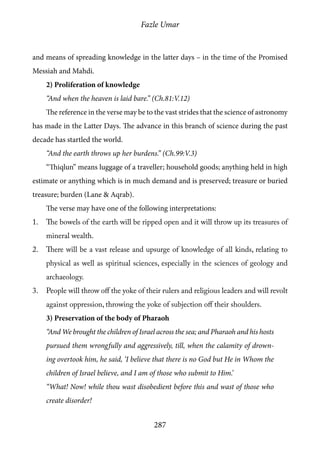
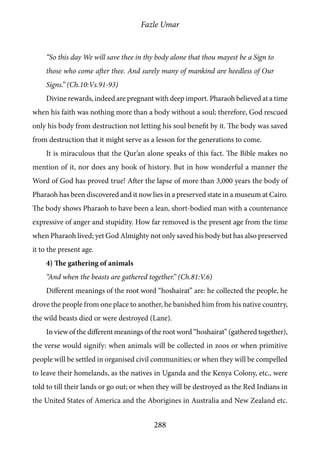
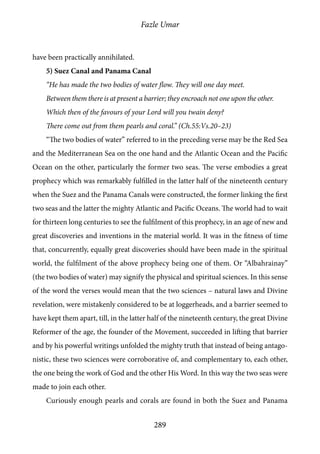
![Fazle Umar
290
Canals. Spiritually speaking, the verse would signify that physical sciences and Divine
revelation both contain treasures of inestimable value.
6) Cosmic Rays
Hadhrat Musleh Mau’ood [ra] commenting on chapter 55 verse 32 states,
“The verse seems to hold a severe warning to the USA with its allies, and
Communist Russia with its satellites…From the way these two great powers
are behaving, it seems that the world is perilously standing on the brink of an
abyss. Any day they may be locked into mortal conflict, completely destroying
man’s accumulated labours of centuries spent in developing arts and sciences,
and inevitably rendering life on earth practically extinct.”
In his other writings he predicted the sudden collapse of Communism, the
inevitable rise of Russia after the fall and its resumption of hostilities against the USA.
“O company of Jinn (Capitalists) and men (Proletariat)! If you have power to
go beyond the confines of the heavens and the earth, then do go. But you cannot
go save with authority.
Which then, of the favours of your Lord will you twain deny?
There shall be sent against you a flame of fire, and smoke; and you shall not be
able to help yourselves.” (Ch.55:Vs.34–36)
It (verse 34) may point to the making of rockets, Sputniks etc., by means of which
the Russians and the Americans seek to reach heavenly bodies. They are told that at
best they can reach only those planets which are visible to human eye. Beyond that
their efforts shall fail. God’s universe is unfathomable.
Different meanings of the root word “Showaazun” (flame) are: He abused such a
one and accused him, he became excited; his anger became enkindled, flame or fire
without smoke; heat of fire or sun; flame of fire; thirst or vehement thirst. (Lane &
Aqrab)](https://image.slidesharecdn.com/fazl-e-umar-160102120102/85/Fazl-e-Umar-296-320.jpg)
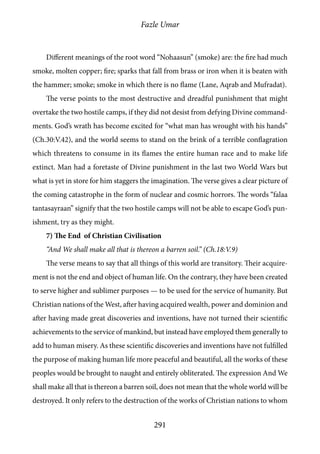
![Fazle Umar
292
these verses particularly apply.
Since a similar expression viz., “saeedan joroza” (barren ground) used in verse
41 of this Surah in connection with the parable of “two gardens” clearly applies to the
works of Western nations, as shown by the context, the expression “saeedan joroza”
(barren ground) must also be taken as applying to them. The words “saeedan joroza as
shown under Important Words mean, a land without herbage or a land of which the
herbage has been cut or eaten. Now “herbage” in Quranic terminology stands for the
works of men, and according to this sense of the word, the verse would mean that all
the progress that the Western nations were to make and all their handiworks, their lofty
and stately buildings, the beautiful scenery of their land and all their pomp, glory and
grandeur would be destroyed. This means that a terrible visitation is in store for them.
Hadhrat Musleh Mau’ood [ra] also discussed the creation of new modes of
transport such as steamships, trains, planes and automobiles, advance of communica-
tions by aircraft and the bombs they would carry and creation of weapons more pow-
erful than atomic bombs. For a thorough discussion of the machinations of Western
Powers and their eventual destruction by their own nuclear weapons, the reader is
referred to the commentary of Hadhrat Musleh Mau’ood [ra] on Surah Al-Lahab,
Chapter 111. One can go on and on giving quotation after quotation from the ocean
of knowledge reaped by Hadhrat Musleh Mau’ood [ra] from the Holy Qur’an.
8) The creation of the State of Israel
“And after him We said to the children of Israel, ‘Dwell ye in the land; and when
the time of the promise of the latter days comes, We shall bring you together
out of various peoples.’” (Ch.17:V.105)
…In the present verse a promise has been held out to them (Jews) that they will
be gathered in the Holy Land at the time of the fulfilment of “wadul aakhirat” “the
promise of the Latter Days”…from all parts of the world. This is what is happening](https://image.slidesharecdn.com/fazl-e-umar-160102120102/85/Fazl-e-Umar-298-320.jpg)
![Fazle Umar
293
now in Palestine…“the promise of the Latter Days” applies to the time of the Promised
Messiah [as].
“And already have We written in the Book of David, after the exhortation, that
my righteous servants shall inherit the land.” (Ch.21:V.106)
By “the land” is meant Palestine. It is worthy of note that even Christian com-
mentators themselves have interpreted the phrase “inherit the land” or “inherit the
earth” in the Psalms as meaning “inherit Canaan”.
In our own time the country of the name of Palestine has altogether ceased to exist
and on its ruins the State of Israel has been built. But this great historical event, too
has taken place in fulfilment of a Quranic prophecy highlighted by Hadhrat Musleh
Mau’ood [ra]. But this is only a temporary phase. The Muslims are destined to win
it back. Let the whole world know that sooner or later—sooner rather than later—
Palestine will revert to Muslim possession. This is a Divine decree and nobody can
alter God’s decree. God’s “righteous servants”, the followers of Hadhrat Muhammad
Mustafa [saw] shall definitely inherit this land. Neither America’s atomic bombs
nor their hydrogen bombs can avert God’s decree.
During his final illness, people began to say that God forbid, Hadhrat Musleh
Mau’ood [ra] had lost his mind. How wrong they were. In this precarious state of
health he started the monumental task of writing his interpretive and free-flowing
shorter commentary of the Holy Qur’an in Urdu, the Tafseer Sagheer. The long hours
of gruelling intellectual work resulted in his serious sickness for a second time in 1958.
During the last session of the Annual Conference on 29 December 1944 Hadhrat
Musleh Mau’ood stated:
“I was a person who possessed no secular knowledge, yet God of His Grace,
appointed angels for my instruction and by this means made me aware of such
meanings of the Qur’an as were beyond the imagination of a human being. The](https://image.slidesharecdn.com/fazl-e-umar-160102120102/85/Fazl-e-Umar-299-320.jpg)
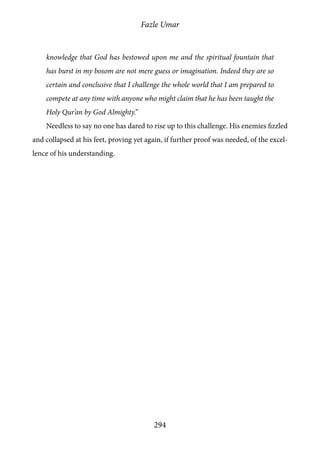
![Fazle Umar
295
Efforts of Hadhrat Musleh Mau’ood
[ra] to promote education
Pakistan has a poor educational record. According to a recent survey its literacy
rate is 35%, as against this, Ahmadis have 99% literacy rate and it is because of their
love of knowledge that they follow a saying of Holy Prophet [saw]: In pursuit of
education even if you have to go to China, go and pursue it. Ahmadis followed this
command of their beloved in spirit and in letter.
An Extraordinary Scheme — A Detailed Syllabus
for all Ages and Abilities
As well as the great body of righteous and upright Ahmadis, the first historic
annual gathering in Rabwah also consisted of such men who participated solely to
witness with their own eyes the decline and death of the organisation and the unity
of the Community. However, the organisation of the gathering and its proceedings,
particularly the exhilarating speeches of Hadhrat Musleh Mau’ood [ra] became a
source of disappointment and frustration for these people. It was in that very gather-
ing where Hadhrat Musleh Mau’ood [ra] persuaded the ladies to work tirelessly in
trying to raise the standard of belief and faith of the succeeding generations. He stated:
“Only such women are worthy of respect who do not give birth to a child but to
a lion. Who do not give birth to a human but to an angel. This was exactly what
the Companions did and this is the true example and true guidance for you.”
(Misbah Magazine, May1950).
The new headquarters were established through great hardship and the first gath-
ering was held during a state of great helplessness. However, even during these difficult
times Huzur did not deem it sufficient just to give praise to his Lord. He wasted no](https://image.slidesharecdn.com/fazl-e-umar-160102120102/85/Fazl-e-Umar-301-320.jpg)
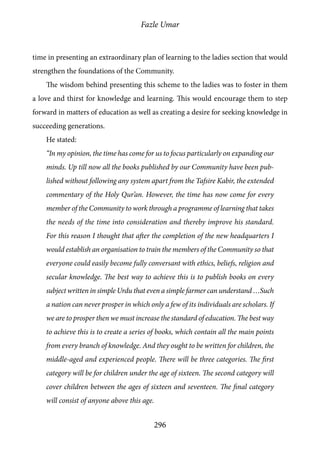
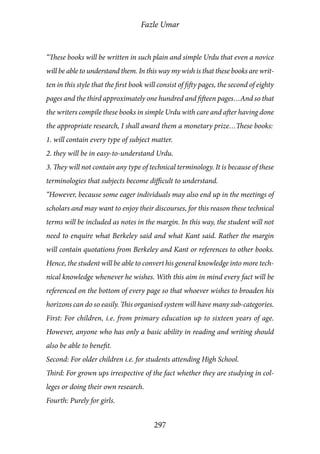
![Fazle Umar
298
Fifth: Purely for boys.
Sixth: Purely for men.
Seventh: Purely for women.
Eighth: For the wife.
Ninth: For the husband.
Tenth: For the good citizen.
“In my opinion keeping in mind the different needs the series of books ought to
discuss the following topics.”
Thereafter, Hadhrat Musleh Mau’ood [ra] presented a comprehensive list of
topics for each category. One can appreciate how much time and thought he had given
to this project by considering just one category.
In the third category, he included:
1. History of Ancient Religion
2. History of Hinduism
3. History of Buddhism
4. History of Zoroastrianism
5. Other Reformers like Aristotle, Confucius etc.
6. Ancient History of the World
7. Ancient History of the Arabs
8. Ancient History of India
9. Ancient History of various parts of Pakistan
10. History of North Africa before the Advent of Christ
11. History of Greece before 3rd Century (CE)
12. History of Iran before the Midian and Persian Kings
13. History of Iran after the Midian and Persian Kings up till Hadhrat Umar [ra]
14. Life of Muhammad [saw] (Hadhrat Musleh Mau’ood [ra] stated that his](https://image.slidesharecdn.com/fazl-e-umar-160102120102/85/Fazl-e-Umar-304-320.jpg)
![Fazle Umar
299
own book covers this subject)
15. History of the Khulafa
16. The Life of the Promised Messiah [as]
17. History of Ahmadiyyat during the lifetime of the Promised Messiah [as]
18. The Life of Hadhrat Khalifatul Masih I [ra]
19. History of Ahmadiyyat during the lifetime of Hadhrat Khalifatul Masih I [ra]
20. History of Ahmadiyyat during the lifetime of Hadhrat Khalifatul Masih II
[ra]
21. History of Ahmadiyyat in Afghanistan
22. History of Ahmadiyyat (the companions of the Promised Messiah [as])
23. History of the Great Companions of the Holy Prophet [saw]
24. History of the Great Companions of the Promised Messiah [as]
25. History of the Great Female Companions of the Holy Prophet [saw]
26. History of the Great Female Companions of the Promised Messiah [as]
27. History of India during the Islamic Period in 3 Parts A. Before the Reign of
Afghanis B. During the Reign of Afghanis C. During the Reign of Mughals.
28. Muslim Missionaries of India
29. History of Muslim Saints
30. History of Islam and Europe
31. Arab History from 4th Islamic Century
32. History of the Preaching and Propagation of Islam in West Africa
33. History of Abyssina (Ethiopia)
34. History of Central and Southern Africa over the last 1000 years
35. History of Rome A. Before the Advent of Christ B. After the Advent of Christ
C. After the Advent of the Holy Prophet [saw]
36. History of Constantinople A. Up to the Advent of the Holy Prophet [saw]](https://image.slidesharecdn.com/fazl-e-umar-160102120102/85/Fazl-e-Umar-305-320.jpg)
![Fazle Umar
300
B. After the Advent of the Holy Prophet [saw] till the conquest by Muslims
37. History of Spain before and after conquest by Muslims
38. History of Sicily before and after conquest by Muslims
39. History of Southern Rome during the Islamic Period
40. History of China during the Islamic Period
41. History of the Philipines and the surrounding Islands during the Islamic Period
42. History of Indonesia before and after the arrival of Islam
43. History of Ceylon before and after the arrival of Islam
44. History of Bukhara and the surrounding area before and after the arrival of
Islam
45. History of Russia from the beginning to the 15th Century and from the 15th
Century to the present day which should throw light on its relationship with
Islam
46. History of Marxism
47. History of Bolshevism
48. History and Geography of North America
49. History and Geography of South America
50. History of the Islands of Australia and New Zealand etc.
51. History of the Prophets of Allah. (Al-Fazl, 21 June 1961).
Hadhrat Musleh Mau’ood’s [ra] love for seeking knowledge was infectious and
rubbed off on the members of the Community. He repeatedly tried to increase and
maintain the interest of the Community in this rewarding pursuit. The Community had
to leave Qadian in a situation of great peril. For many people, the migration proved to
be a gruesome tragedy full of extreme suffering and misery. However, the education
and training of the Community was at the forefront of his mind even during those
turbulent times.](https://image.slidesharecdn.com/fazl-e-umar-160102120102/85/Fazl-e-Umar-306-320.jpg)
![Fazle Umar
301
He advised the Community about what to do in the event of a tragedy occurring in
Qadian. They were to buy an extremely cheap piece of land in Sheikhupura or Sialkot
near the railway station and create a village to serve as the headquarters. The village
should have simple buildings unlike the more elaborate constructions of Qadian.
Educational institutions like the school and college, the Madrassa Ahmadiyya and
Jamia Ahmadiyya ought to be established as a matter of urgency. He advised that the
emphasis should always be on religious education and its practice and efforts should
be made to create as many eminent scholars as possible.
Hadhrat Musleh Mau’ood [ra] sent out inspectors to review the educational
needs of the Community. He instructed that every Ahmadi boy ought to be in educa-
tion and those who are not, their parents must be compelled to educate them. The
Community would help in the cost of books or payment of fees.
Bearing in mind the difficulties and perils of studying in a non-Islamic envi-
ronment, he established a college equipped with every kind of facility. Here they
could learn in an environment free from the moral poisons of the outside world. He
instructed that money be collected within each village to provide scholarships to any
outstanding boys and girls.
He warned the Community that the absence of knowledge leads to the death of
a people. The primary reason for the decline and downfall of the Muslims was their
inability to replace their dead scholars with fresh blood. When Abu Bakr [ra] passed
away, a second Abu Bakr was not born to take his place. Hence, he wanted to create
many scholars within the Community so that when one died a second and a third
were ready to take the place of the first.](https://image.slidesharecdn.com/fazl-e-umar-160102120102/85/Fazl-e-Umar-307-320.jpg)
![Fazle Umar
302
Efforts to Improve the Education of Women
Hadhrat Musleh Mau’ood [ra] firmly believed that a nation could not make
any progress unless its women were well educated. When he occupied the office of
Khilafat, there was only a primary school for girls in Qadian. He instructed his wives
and children to teach the women the translation of the Holy Qur’an and Hadith.
He argued that the importance of educating women was growing so fast that the
changes taking place in the world or yet to take place about which the Holy Qur’an fore-
warned, because of them the idea that women were created as a plaything was fading
rapidly. The Bible promoted the idea that woman was created for the pleasure of man.
However, on the other hand it has to be said that although men and women are
equal in the sight of God, but in view of the differences in their nature, they have
been assigned different roles for the smooth functioning of human society. As long
as women possess the unique ability to bear children and to nurture them, the role of
men and women cannot be equal. He believed these considerations needed careful
attention while planning or proposing any schemes.
In 1925, he intended to make provisions to educate women in secular and reli-
gious knowledge. He was mocked by some people for starting Arabic classes for girls.
However, by the Grace of Allah, these Ahmadi girls were the first to pass the exams
at the Fazil level in large numbers in the whole of India.
There was no High School, so arrangements were made to teach them to High
School level. This also proved successful and for the first time seven Muslim girls went
onto pass the entrance exams. The Nusrat Girls High School was established in 1928.
After migration, although the Community was under financial strain, a Girls
School was established upon arrival in Rabwah and later in 1951, a college for girls
was also established (Women’s College). This became a unique institution amongst
the women-only colleges of Pakistan. Ahmadi girls were thus enabled to get university](https://image.slidesharecdn.com/fazl-e-umar-160102120102/85/Fazl-e-Umar-308-320.jpg)
![Fazle Umar
303
education close to their homes. Religious instruction was also given in these schools.
The Jamia Ahmadiyya
The Madrassa Ahmadiyya was established in the time of the Promised Messiah
[as] to promote religious education. When some eminent members of the Commu-
nity tried to close this educational facility Hadhrat Musleh Mau’ood [ra] opposed
their plans with all his might and breathed new life into it. For a period of time he was
the headmaster of this school and took great care to ensure the pupils were offered
the best education and training.
To back up the work of the Madrassa Ahmadiyya, the Jamia Ahmadiyya was
established in 1928. In the Jamia, pupils were taught languages such as English,
German, Sanskrit, Persian, Russian and Spanish. It was important for them to be
fully conversant in the language of the country in which they were to be stationed to
spread the message of Islam.
After the partition, on 29th November 1948, Hadhrat Musleh Mau’ood [ra]
travelled to Ahmad Naggar where he proclaimed that the Jamia Ahmadiyya was
established and functioning in Ahmad Naggar according to Divine Will. He stated:
“You have come here as the frontline troops. Those of you who have dedicated
your lives for the sake of your faith are like the children of Hadhrat Ishmael
who colonised the barren valley. This is not coincidental. The Ta’limul Islam
College found its place in Lahore and the High School was based in a house
in Chiniot. However, the Madrassa Ahmadiyya and the Jamia Ahmadiyya
are established in Ahmad Naggar, which is a part of Rabwah. Rather this is
according to Divine Will.”
On this occasion, Huzur recorded a comment as a form of advice in the Jamia
register,](https://image.slidesharecdn.com/fazl-e-umar-160102120102/85/Fazl-e-Umar-309-320.jpg)
![Fazle Umar
304
“I shall say that which was said by the Holy Prophet [saw] on the occasion
of the Battle of Uhud. ‘Allah alone is High and Honoured’”
(Al-Fazl 25 December 1948)
It was the wish of Hadhrat Musleh Mau’ood [ra] that this institution would
grow to be among the greatest colleges of the world. God Almighty heard his prayers
and blessed this institution with great success according to his wishes. The professional
scholars and preachers of this college proved to be successful in their proselytising,
education and training efforts across the world. Moreover, to cope with the needs and
requirements of an ever-expanding Community, 14 branches of the Jamia have now
been established in countries all over the world.
The Ta’limul Islam (T.I.) College After Partition in
Lahore
Hadhrat Khalifatul-Masih II [ra] stayed in Rattan Bagh, Lahore, to supervise
interests of the Community, as Lahore was the capital city and officials were easily
approachable there. Most of the college staff had migrated to Pakistan, a few were
directed to stay back, so as to protect college equipment from looting and destruction
by the hands of refugees who were pouring into Qadian, and to supervise the safe
evacuation of women and children to Pakistan. Muhammad Munir Khan Shami, a
Ta’limul Islam College B.Sc. student, who was on guard duty, was martyred by a band
of Sikh looters.
Most of Hadhrat Khalifatul-Masih II’s [ra] time was consumed in solving
problems concerning settlement issues of migrant families. However, despite his preoc-
cupation, how keenly he was interested to get the college reopened is evident from the
events that follow. College Principal Sahibzada Mirza Nasir Ahmad sahib, who stayed
back in Qadian, was summoned to migrate and instructed to expedite efforts to find](https://image.slidesharecdn.com/fazl-e-umar-160102120102/85/Fazl-e-Umar-310-320.jpg)
![Fazle Umar
305
a suitable building for the college. Dr. Abdul Wahid, director Fazle Umar Research
Institute and Chaudhry Muhammad Ali were to assist him in the quest.
Strong determination of Hadhrat Musleh Mau’ood
[ra] to reopen the college
A College Committee was reorganized to consolidate efforts to locate a suitable
building as soon as possible, and look for ways to generate necessary funds for running
the college. The financial position of the Community was already debilitated because
of relocation. Most of the members had lost their jobs and businesses, and were not
in a strong enough financial position. Having this situation in mind, the Committee
was reluctant to recommend appealing to members of the Community for the funds.
The Committee was unanimous about putting off the college issue for the time being.
They presented their apprehensions in a meeting with Hadhrat Musleh Mau’ood [ra].
On hearing the Committee’s concern, Hadhrat Musleh Mau’ood [ra], became
emotional and exclaimed in a loud voice, “You are worried about funds! I am worried
for our youth. The college will reopen and will never close.” He instructed them to
speed up efforts to find a suitable place for the college anywhere in Pakistan, and to
grab it and start the college.
The Committee visited many different sites in Pakistan. Moreover, members in
Multan and Dera Ghazi Khan were requested to locate some suitable building in their
area for the purpose.
Meanwhile the college office started functioning in the “Cement Building” in
Lahore. The office superintendent and two of his colleagues started enrolling stu-
dents while sitting on the floor of the office, as there were no chairs available. Sixty
students were enrolled, mostly old students from Qadian. During next few months
the college shifted from one building to another, vacating one after the other because](https://image.slidesharecdn.com/fazl-e-umar-160102120102/85/Fazl-e-Umar-311-320.jpg)
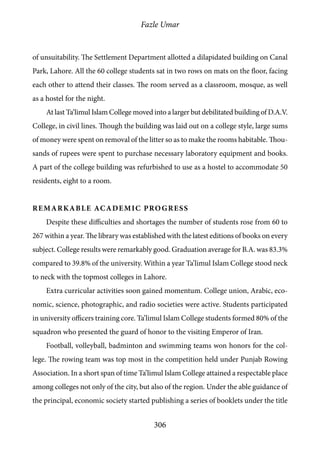
![Fazle Umar
307
“Young Economist,” later replaced in 1950 by “Al-Manar” as college magazine. The
college magazine was soon acknowledged as a standard publication. The Principal’s
message on the eve of the publication of the fist issue was, “With trust in God and
Faith in the ultimate triumph of your mission, march on!”
The first convocation of Ta’limul Islam College, Lahore, was held on 2 April 1950.
Hadhrat Musleh Mau’ood [ra] graced the occasion and delivered an important
presidential address.
Hadhrat Musleh Mau’ood [ra] particularly advised the outgoing graduates, to
never to stay at one point, and to continue to progress. He referred to the divine law
prevailing in nature that nothing rests; there is a continuous change in nature. He
advised them to be ever ready for a long unending struggle, and keep trying to move
forward, by seeking help and guidance by praying. He stressed that the desired results
of highest quality are achieved only by taking appropriate steps at the appropriate time,
by using appropriate means. He reminded them never to forget the training which
they have received during their stay in their alma mater.
Anti College Forces
Burning in the fire of jealousy over the rapid progress of Ta’limul Islam College,
the anti-college forces started brewing conspiracies. The foul thinking anti-Ahmadiyya
forces could not digest the Community’s contribution to the service of humanity. They
started a series of intrigues and tried day and night to get the allotment of D.A.V.
College building cancelled. Their satanic minds tried continuously by creating issues,
never wanting to let the college function in a peaceful atmosphere. They tried their
utmost to get Ta’limul Islam College uprooted from the building and get it moved to
some other smaller building. However, despite these unstable conditions, the college
progressed rapidly by the Grace of God and the number of students jumped to 500](https://image.slidesharecdn.com/fazl-e-umar-160102120102/85/Fazl-e-Umar-313-320.jpg)
![Fazle Umar
308
within a short period of time.
First All Pakistan Inter-Collegiate Debate
Despite opposition, the college rapidly progressed in curricular and extra cur-
ricular activities. The first All Pakistan Inter-College debate was held in February 1950.
Teams of Ta’limul Islam College speakers took part in debates held in other colleges
around, despite anti-Ta’limul Islam College slogans and hooliganism when Ta’limul
Islam College students rose to speak, they continuously brought honors for their col-
lege. This success was repeated in the sports events.
Ta’limul Islam College during the turbulent year 1953
The year 1953 is remembered in the history of Pakistan as a year of widespread
political turmoil in which the city of Lahore was specially implicated. Political issues
bent them into an anti-Movement by politicians and the Mullahs. An Ahmadi college
student Jamal Ahmad, who was passing by, was martyred by an unruly mob in Bhati
Gate area, Lahore. Lawlessness continued until Marshal Law was promulgated by Gen-
eral Muhammad Azam Khan to control the situation. Sahibzada Mirza Nasir Ahmad,
Principal Ta’limul Islam College, was arrested at a petty pretext to please the Mullahs.
Ta’limul Islam College at Rabwah
Since migration from India, The Community had been looking and praying to
seek help from God for guidance to get a suitable site to establish the Community’s
headquarters in Pakistan. The present site on the bank of the River Chenab was
decided, and the land was obtained on lease from the government. Hadhrat Musleh
Mau’ood [ra] wanted the college to be shifted to Rabwah as soon as possible, where
the foundations of college buildings had already been laid. As soon as the college and](https://image.slidesharecdn.com/fazl-e-umar-160102120102/85/Fazl-e-Umar-314-320.jpg)
![Fazle Umar
309
hostel buildings were completed, the college was shifted. There was no underground
water at the college site, so a 2,000 feet long underground pipe from another location
supplied water for use in the college and hostel. Soon well-equipped science labora-
tories were completed for FSc. and BSc. Honours classes.
Inauguration
Hadhrat Musleh Mau’ood [ra] graced the inauguration ceremony of Ta’limul
Islam College, Rabwah, on 6 December 1954. Hadhrat Musleh Mau’ood [ra] in
his presidential address outlined the college charter. Salient features of which were:
• There is no discrimination regarding religion, cast or creed in this college. Stu-
dents from all religions are welcome. However, it will be binding on them to
spend their lives according to the teachings of whatever religion they profess.
• College authorities expect that each and every student will pray according to the
teachings of his religion. He will be reminded if he fails to do so.
• College authorities consider that reminding a person to pray and abide by his reli-
gious teaching is not interfering in his religion.Hypocrisy is not to be encouraged.
• College authorities will not tolerate strikes, staying away from classes and dem-
onstrations at any pretext. Doors for dialogue with authorities will remain open if
any such situation arises.
Library
The College library was acclaimed one of the best in the region. Latest additions
of text books were available. All well known magazines and journals were subscribed.
Students were encouraged to read books. Hadhrat Chaudhry Muhammad Zafrullah
Khan donated his personal collection of books.](https://image.slidesharecdn.com/fazl-e-umar-160102120102/85/Fazl-e-Umar-315-320.jpg)
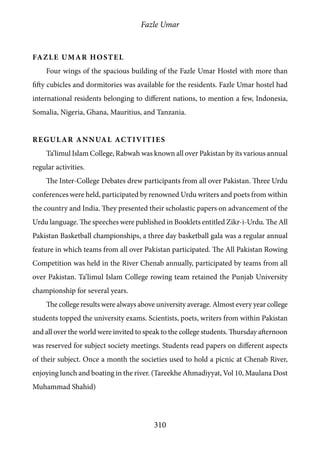
![Fazle Umar
311
Postgraduate Degree College
A scheme to bifurcate Ta’limul Islam College into Inter (old campus) and Post-
graduate College (new campus) was launched during the years 1961-62. The college
started postgraduate classes in advanced physics and became the only institution in
the Province, apart from the Punjab University itself, which provided instruction in
advanced physics at the Masters level. The college has a brilliant record in that respect.
Since the start of these classes many of the candidates it has sent up for the Master of
Science Degree in Physics have passed the examination in the First Division and some
of them have established distinguished records.
Thus, though the College encountered a series of vicissitudes during the first
decade of its existence, yet under the wise and devoted guidance of its Principal and
the constant supervision of Hadhrat Musleh Mau’ood [ra], it marched forward
from success to success and established a high and enviable record of academic and
athletic achievement.
The Fazle Umar Research Institute
Hadhrat Musleh Mau’ood [ra] set up a Science Research Institute to prove that
the deed of God embodied in the laws of nature totally corroborate the teachings of
Islam and Ahmadiyyat. This was the purpose of the college and the research institute.
The students would focus on the study of nature to disprove the deceptive claim of
the Europeans that the laws of nature stand contrary to the teachings of the Holy
Qur’an. Their research would prove the ability of the Qur’an to correctly discuss all
important events of the past present and future from the beginning of the universe
to its ultimate end.
The schools and colleges of Rabwah ceased to provide a high standard of educa-
tion when they were nationalised by the government in 1972. Today these institutes](https://image.slidesharecdn.com/fazl-e-umar-160102120102/85/Fazl-e-Umar-317-320.jpg)
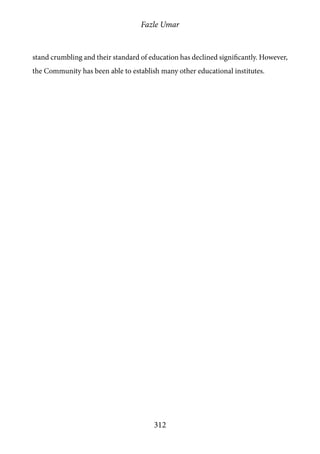
![Fazle Umar
313
The forward march of Ahmadiyyat
Hadhrat Khalifatul Masih II [ra] moved from his temporary residence in
Rattan Bagh, Lahore to his permanent residence at Rabwah on 19th September 1949
and was now able to devote his full attention to the establishment of the new World
Headquarters of the Movement, pulling together all the threads that bound the Com-
munity and restarting the forward march of the Movement which had been so griev-
ously interrupted by the tragic events that followed upon the partition of the country.
The finances of the Community had fallen into a certain degree of inevitable disarray
and were speedily reorganised on a firm basis and henceforward went on multiplying
themselves in a surprising manner. In April 1949, the Annual Conference of the Move-
ment had already been held in Rabwah, and most of the institutions of the Movement
were re-established in Rabwah in the course of the year. Of the principal institutions,
only the Talimul Islam College continued in the D.A.V. College building in Lahore,
awaiting the construction of its own building at Rabwah. This took another five years.
After the move of the Khalifatul Masih to Rabwah, everything began to hum as of
yore and all the branches in Pakistan and abroad became firmly knitted together once
more unobstructed and freely circulating under his guidance.
The Movement had established footholds in British East Africa, as it was then,
in the time of the Promised Messiah [as]. The footholds became linked together
in the course of time, and during the Second Khilafat burgeoned into a network of
active branches.
In the early years of the Second Khilafat, branches of the Movement had been
established in the British colonies of West Africa and were doing very good work.
Indeed, they were making such rapid progress that Christian missionaries in West
Africa, and those interested in the spread of Christianity in the West African states,](https://image.slidesharecdn.com/fazl-e-umar-160102120102/85/Fazl-e-Umar-319-320.jpg)
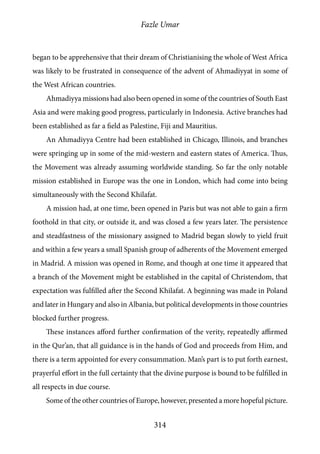
![Fazle Umar
315
Under the dynamic direction of Hadhrat Khalifatul Masih II [ra] missions were
also established in Switzerland, Germany, the Netherlands, Denmark and Sweden.
These missions made such good progress that mosques were built during the Rabwah
period of the Second Khilafat in Zurich, Frankfurt, the Hague and Hamburg. All this
activity has stemmed from the initiation of the Tehrike Jadeed by Hadhrat Khalifatul
Masih II [ra] in 1934.](https://image.slidesharecdn.com/fazl-e-umar-160102120102/85/Fazl-e-Umar-321-320.jpg)
![Fazle Umar
316
Hadhrat Musleh Mau’ood [ra] and the
system of Wasiyyat
The gap between the rich and the poor is the widest it has ever been in the history
of mankind and continues to grow ever wider concentrating wealth into fewer and
fewer hands. Religion cannot cater for man’s moral and spiritual needs in isolation
without considering his individual, social, political and economic needs.
The Promised Messiah [as] laid the foundation of a New World Order by intro-
ducing a scheme, called “Wasiyyat” (a Will or testamentary direction). According to
it, the testator promises, on his own free will, to lead a life of righteousness dedicated
to the service of God and mankind and paying at least one-tenth (or a maximum of
one-third) of his income and property. If he owns a house or some other property,
anywhere in the world, he must pay one-tenth of its valued price. Upon the death of
such a person, his case will be reviewed and circumstances permitting he shall be
buried in the Bahishti Maqbara (Heavenly Graveyard).
This is not an innovation thought up by the founder of the Community. The Holy
Qur’an clearly mentions the concept of Al-Wasiyyat (The Will) in the following words
“Surely Allah has purchased of the believers their persons and their property in return
for the heavenly Garden they shall have…” (Ch. 9:V.111) This verse is amplified by the
verse of The Holy Qur’an, “you cannot attain to righteousness unless you spend out
of that which you love…” (Ch.3:V.93) The word used in this verse for righteousness is
Al-Birra, which means goodness and righteousness of a high order. It means that one
must be prepared to sacrifice everything that one holds dear in order to attain true
faith which is the essence of all righteousness.
The Holy Qur’an says, “When Paradise is brought nigh” (Ch.81:V.14). Hadhrat
Khalifatul Masih II [ra] in a sermon delivered on 26th August 1932 in explaining](https://image.slidesharecdn.com/fazl-e-umar-160102120102/85/Fazl-e-Umar-322-320.jpg)
![Fazle Umar
317
this verse noted, “Allah has blessed us with a great opportunity. Paradise has been
made approachable. The system of Al-Wasiyyat is our path to this.”
Tehrike Jadeed—the Forerunner to the Wasiyyat
Scheme
One can judge the importance given by the Community to this system from a
book entitled, “The New World Order of Islam”, that is based on the lecture delivered
by Hadhrat Musleh Mau’ood [ra] at an Annual Gathering. He argues that the slo-
gans being raised about the various ‘isms’ and organisations around the world are
all worthless. Starting with the philosophy behind the creation of the Tehrike Jadeed
scheme, Hadhrat Musleh Mau’ood [ra] states:
“As I have indicated, however, this scheme requires time before it matures. It
must await the years when the greater part of the world will have accepted
Ahmadiyyat. Our present income is not adequate even for the efficient running
of the Centre. God therefore inspired me with the idea of the Tehrike Jadeed
as a means of establishing a central fund, which may be utilised towards the
more intensive propagation of Ahmadiyyat. The Tehrike Jadeed therefore is a
symbolic offering of faith to God indicating that as time is not yet ripe for the
universal establishment of the new order based upon Al-Wasiyyat, we proceed
to construct a humble model of it by means of the Tehrike Jadeed, so that
pending the establishment of the system based upon Al-Wasiyyat we should be
able to utilise the funds obtained through the Tehrike Jadeed for the spread of
Ahmadiyyat, and this in turn should enable us to carry on into effect, on an
ever wider scale the objects of Al-Wasiyyat.
“It is obvious that as Ahmadiyyat spreads, the system based upon Al-Wasiyyat
will embrace wider and wider circles and the national fund will continue to](https://image.slidesharecdn.com/fazl-e-umar-160102120102/85/Fazl-e-Umar-323-320.jpg)
![Fazle Umar
318
grow. Things always move slowly at first but soon gather speed and momentum.
It is true that the funds collected by means of wills are at present not very large,
but as Ahmadiyyat goes on spreading faster and faster, these funds will also
grow. By a natural process they will go on multiplying, so that the day of the
complete establishment of the new order will come nearer and nearer.
“In short, though Tehrike Jadeed had in point of time been inaugurated after
Al-Wasiyyat, it is in effect its forerunner. In other words, it is an Elijah to the
Messiah of the new order and it proclaims the ultimate supremacy of the message
and principles of the Promised Messiah [as]. Every person who participates in
the Tehrike Jadeed helps to foster the system of the Wasiyyat and every person
who does this helps in the establishment of the new order.
Wasiyyat – To Establish Peace & Security
Throughout the World
“To sum up, the system of Al-Wasiyyat comprises within itself the whole social
and economic system of Islam. They are mistaken who think that the fund estab-
lished by the Wasiyyat can be used only for the verbal propagation of Islam. This
is not correct. The Wasiyyat contemplates both verbal propagation and practical
establishment. It no doubt includes missionary effort, but it equally includes the
complete establishment of the system under which the needs of every human
being should be looked after in a dignified manner. When this system attains
maturity, it will provide not only for missionary work but will also help abolish
want and distress by making adequate provision for the needs of all individuals.
An orphan will not have to beg, nor will a widow have to ask for charity, nor a
needy person to suffer anxiety. The system will be a mother to children, a father
to youth and will afford security to women. Under this system, not by means of](https://image.slidesharecdn.com/fazl-e-umar-160102120102/85/Fazl-e-Umar-324-320.jpg)
![Fazle Umar
319
compulsion or coercion, but out of real affection and goodwill, a brother will
be eager to help his brother. Nor will such sacrifice be in vain. Every giver will
be recompensed many times over by God. The rich will not suffer loss nor will
the poor suffer privation. Nation will not fight nation, nor class will contend
against class. The system will put everyone under an obligation.
“I assure you that the new order will not be inaugurated by Mr. Churchill or
Mr. Roosevelt. Declarations like the Atlantic Charter will accomplish nothing.
They are full of defects and shortcomings. New orders are always established in
the world by Prophets raised for the purpose by God. They have no bitterness
against the rich, and no bias for the poor.
“They are neither of the East, nor of the West. They are the Messengers of God
and proclaim the teachings which furnish the foundations of true peace. Today
also, peace will be established only through the teachings of the Promised Mes-
siah [as]the foundations of which were laid in Al-Wasiyyat in 1905. We should
all realise the significance of Al-Wasiyyat, and remember the fundamentals to
which I have drawn attention in the course of this address.”
(The New World Order of Islam, by Hadhrat Musleh Mau’ood [ra], pg.136–
139 ).
Wasiyyat — An International Institution which
Continues to Spread Throughout the World
The Promised Messiah [as] originally established the Bahishti Maqbara in
Qadian. However, as the Community grew and prospered Heavenly Graveyards began
to appear all over the world. Hadhrat Musleh Mau’ood [ra] established the Heav-
enly Graveyard in Rabwah, Pakistan soon after partition. This is where the graves of
Hadhrat Musleh Mau’ood [ra] and Hadhrat Khalifatul Masih III [ra] are located.](https://image.slidesharecdn.com/fazl-e-umar-160102120102/85/Fazl-e-Umar-325-320.jpg)
![Fazle Umar
320
Many Companions of the Promised Messiah [as], and many devoted servants of his
heavenly Community are buried here.
Hadhrat Musleh Mau’ood [ra] sent a message to the members of Ahmadiyya
Jama’at, USA and enjoined upon them to join the sacred institution of Wasiyyat. He
also indicated that several burial plots would be purchased for these Moosian in dif-
ferent parts of the country in the following words:
“Once you have studied the whole document carefully (referring to Al-Wasiyyat
written by the Promised Messiah [as]), you will fully grasp its grand purpose
and objective but I also request Brother Khalil Ahmad Nasir that he should
arrange that the purpose and objective of Al-Wasiyyat should be explained to
you by representatives of the Movement in detail at your respective centres. In
compliance with the spirit of Al-Wasiyyat, the Ahmadiyya Association of the
United States of America will arrange the purchase, as early as possible, of a
suitable plot of land in some central locality which may be dedicated as the place
of burial of those who make their wills in compliance with the conditions set
out in Al-Wasiyyat and the rules promulgated from time to time by the Head of
the Movement and the Central Ahmadiyya Association and Tehrike Jadeed. I
am convinced that once this project is put into effect in the United States, it will
quickly gather force and thousands of your country men, maybe even millions,
will in due course join this scheme and thus swell the number of those who shall
continuously devote their efforts and substantial portions of their income and
properties to the objects mentioned in Al-Wasiyyat.
As the number of such sincere and devoted Ahmadis increases it may become
necessary to establish similar burial places in different parts of the country, and
this shall be done from time to time as necessity shall require.”
(Review of Religions, January 1956, p.8–14).](https://image.slidesharecdn.com/fazl-e-umar-160102120102/85/Fazl-e-Umar-326-320.jpg)
![Fazle Umar
321
In accordance with the instructions of Hadhrat Musleh Mau’ood [ra], the Jama’at
has established graveyards for the Moosies at thirteen locations in USA.
Every bygone day is a witness to the fact that every single word of the prophecy
mentioned earlier was fulfilled and continues to be fulfilled. After the establishment of
the system of Wasiyyat, the sincere members of the Jama’at have donated their proper-
ties amounting to millions of pounds to the Jama’at, and this trend is still continuing.
Even the enemies of Ahmadiyyat have acknowledged this fact. Hence, during the
Khilafat of Hadhrat Musleh Mau’ood [ra], a Pakistani newspaper noted:
“The third aspect of the Qadiani (i.e. Ahmadiyya) Organisation is that system
of propagation which has made this Jama’at an international Jama’at. In this
context the reality should be clearly understood that all the Jama’ats in India,
Kashmir, Indonesia, Israel, Germany, Holland, Switzerland, America, England,
Damascus, Nigeria, African regions and Pakistan accept Mirza Mahmud as
their Khalifa. And some of their Jama’ats and individuals in some other coun-
tries have donated millions of rupees worth of properties to Sadr Anjuman
Ahmadiyya Rabwah and Sadr Anjuman Ahmadiyya Qadian.”
(Al- Mimber, Lyalpur, 2nd March 1956, page 10).
The manifestation of this sacred system of Wasiyyat worldwide are clear for all
to see. The institution of Wasiyyat, by the Grace of Allah, is now established in 75
countries throughout the world.](https://image.slidesharecdn.com/fazl-e-umar-160102120102/85/Fazl-e-Umar-327-320.jpg)
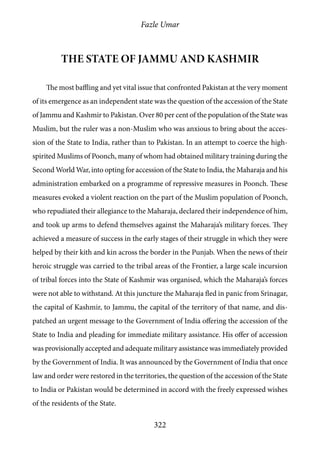
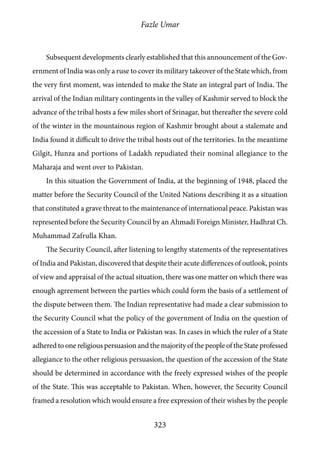
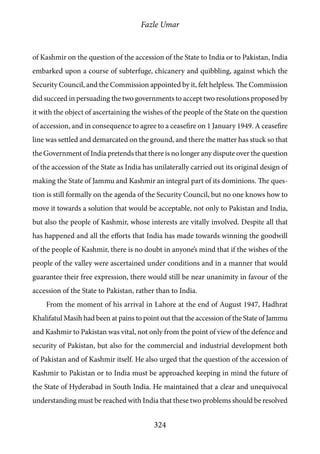
![Fazle Umar
325
by the application of the same principle to both, that is to say, it should be agreed that
the question of accession of the two states should be determined either according to
the wishes of the respective rulers in each case, or according to the freely expressed
wishes of the people of each State. His own inclination was in favour of securing the
accession of Kashmir to Pakistan and not in any way obstructing the accession of
Hyderabad to India. Unfortunately, his strong pleas on that behalf were ignored by
the authorities in Pakistan with dire consequences in the long run.
The Furqan Battalion
Towards the end of April 1948 it was realised that India had decided to seek a
solution of the problem of Kashmir through the use of military force, and military
intelligence indicated that India was making preparations for a military advance in
strength all along the line in Kashmir. The Prime Minister of Pakistan received a report
from the Commander-in-Chief of the Pakistan forces which stressed the perilous
situation in which Pakistan would be placed in case of a military advance in force by
India along the Kashmir border. The report concluded with a strong recommendation
that Pakistan should post its regular forces along the border of Kashmir in sufficient
strength to block the advance of the Indian forces. Acting upon the advice of the
Commander-in-Chief, the Prime Minister, who also held the portfolio of defence,
authorised military dispositions to be made along the Kashmir border in conformity
with the recommendation of the Commander-in-Chief, so that from the first week of
May 1948 the regular forces of both Dominions were engaged in combat against each
other along the Kashmir border.
Hadhrat Khalifatul Masih II [ra] was not content with offering well reasoned
advice to the Administration of Pakistan. He made a substantial contribution in terms
of men and money towards the struggle that Pakistan was now waging with India over](https://image.slidesharecdn.com/fazl-e-umar-160102120102/85/Fazl-e-Umar-331-320.jpg)
![Fazle Umar
326
the accession of Kashmir. The number of Ahmadis serving in the Pakistan forces at
the time, both as officers and other ranks, was much higher than their proportion in
the population. Those of them who were serving in the units that were engaged in
combat on the Kashmir border established an enviable record of good service and
outstanding achievement in battle. The Community had suffered terribly in respect of
personnel and resources in the tragic aftermath of the partition. Nevertheless, under
the directions of the Khalifatul Masih, an entire battalion of Ahmadi volunteers was
organised and was placed at the disposal of the Commander-in-Chief, for deployment
on the Kashmir border in the late spring of 1948. It was called the Furqan Battalion
and continued in active service on the Kashmir front till the cessation of hostilities on
1st January 1949. The entire cost of maintaining the Battalion at the front was borne
by the Community.
In a Friday sermon delivered by Hadhrat Mirza Tahir Ahmad, Khalifatul Masih
IV [rh] on March 8, 1985 at the Fazl Mosque, London elaborated on the role played
by the Community in Kashmir. He stated that at the time when organised efforts were
being made by Pakistan for the freedom of Kashmir and the freedom forces were
struggling on their own, Jama’at-e-Islami was issuing terrible fatwas and propagating
that it was not jihad anymore. In other words, an oppressed country where the lives of
Muslims were at stake, where Muslim countries from around the globe started taking
steps to protect them; at that time, a fatwa was being published from Jama’at-e-Islami
instructing not to go near Kashmir since it was not jihad.
WhenHadhratMuslehMau’ood[ra]announcedthearmedstruggleforthelibera-
tion of Kashmir, some of the Ahmadis living in villages thought that it was an ordinary
scheme and that it would not matter if one did not participate in it. They thought that if it
were a religious scheme or a question of Community services then they would be ready
but in the matter of Kashmir there were other Muslims who could fight for it.](https://image.slidesharecdn.com/fazl-e-umar-160102120102/85/Fazl-e-Umar-332-320.jpg)
![Fazle Umar
327
Hadhrat Musleh Mau’ood [ra]was very concerned when no one put their names
forward from the villages. He sent a message, and the person delivering the message
told the villagers that they could not imagine how concerned Hadhrat Musleh Mau’ood
[ra] was about Kashmir. He added:
“I have brought the message of Huzur saying, ‘get up and offer your sacrifices
for the Islamic World.’”
The person who carried the message at that time said that
“a lady stood up and said, ‘I am astonished and filled with shame to see that
the message of the Khalifa is before you and you are not moving. I have got
one son and I offer him with the prayers that God Almighty should grant him
martyrdom, and I should not see his face again.’”
This is the sense of honour that was being shown by the Ahmadi mothers. Hadhrat
Musleh Mau’ood [ra] narrated this incident in his speech and said:
“Look! I tell you, taking God as my witness, that a cry immediately issued from
my heart when I heard about it: O Allah if a sacrifice of human blood has been
decreed for this cause, then I beg that you take my son as a ransom for the son
of this lady.”
Such was the enthusiasm with which the Ahmadiyya Muslim Community fought
the jihad of freedom for Kashmir.
The sons of the opponents of Ahmadiyyat were sitting miles away from the battle-
fields. Hadhrat Musleh Mau’ood [ra] not only made the announcement of jihad but
also sent his sons to the Kashmir Front, for which they suffered many difficulties on
the war front. Some of them suffered with dysentery, some became weak because of
starvation, but Hadhrat Musleh Mau’ood [ra] never called them back due to these
severe illnesses. I remember that some of the children expressed extreme pain, their
conditions being critical and the circumstances unfavourable, as well as some suffering](https://image.slidesharecdn.com/fazl-e-umar-160102120102/85/Fazl-e-Umar-333-320.jpg)
![Fazle Umar
328
with bloody dysentery. They wrote that they should be allowed to come back. Hadhrat
Musleh Mau’ood [ra] ordered them to stay back in the same condition and that they
were to serve their country and the nation.
Looking at such selfless services of the Ahmadiyya Muslim Community, some
God fearing non-Ahmadi people felt it too and they testified about the sacrifices of
Ahmadis during that time. One Hakim Ahmad Din, President Jama’at-ul-Masha’ikh
Sialkot wrote in his magazine Qa’id-e-A’zam—January 1949:
“Currently out of all the Muslim organisations, the Qadiani sect of Ahmadi
Jama’at is number one. They have been organised from the beginning, are punc-
tual in prayers and fasting etc. Their missionaries are successful not only here
but outside in foreign countries as well. They played a major role in the success
of Muslim League for the creation of Pakistan. In the struggle for Kashmir the
kind of sincere and wholehearted participation shown by Ahmadi Jama’at along
the side of Kashmir’s Mujahidin and the sacrifices shown by this Jama’at cannot
be observed, in our opinion, in any other Muslim Jama’at that has shown such
kind of courage and steadfastness. We are thankful to the Ahmadi elders in
all of these matters and pray that God Almighty may bless them with greater
capacity to help their country, nation and religion.”
The Battalion established a high reputation for discipline, courage, bravery and
an eager spirit of service and sacrifice, an appreciation of which was conveyed by the
Commander-in-Chief in his letter to Hadhrat Musleh Mau’ood [ra], when the Bat-
talion was disbanded.](https://image.slidesharecdn.com/fazl-e-umar-160102120102/85/Fazl-e-Umar-334-320.jpg)
![Fazle Umar
329
The disturbances of 1953
The first grave crisis encountered by the Movement was the death of its Holy
Founder on 26 May 1908. By the Grace and Mercy of Allah, the Movement negotiated
it successfully through the unanimous election of Hadhrat Maulvi Nooruddin sahib
as Khalifatul Masih I.
An even graver crisis arose in March 1914 on the death of Hadhrat Khalifatul
Masih I [ra]. For a while it threatened to rip the Community apart right down its
middle. Again, by the Grace and Mercy of Allah, it was surmounted by the wisdom,
sagacity, tact, foresight and prayers of Hadhrat Khalifatul Masih II [ra].
Sir Herbert Emerson and the Ahrar combined to confront the Movement with a
third crisis twenty years later, in the autumn of 1934. The Grace and Mercy of Allah
again came to the rescue of the Movement, and the blessed initiation of Tehrike Jadeed
opened the way for further and faster progress of the Movement.
Hadhrat Musleh Mau’ood [ra] used all the means at his disposal to fight for the
creation of Pakistan, a stance contrary to most of the other religious communities. Both
after the creation of Pakistan and historically [before Pakistan] it is a fact that no other
Islamic movement or religious movement has put forward such wonderful efforts as the
Ahmadiyya Muslim Community in the history of the Kashmir Liberation Movement.
Besides, such was the exalted station of Hadhrat Musleh Mau’ood [ra] that no one
could equal or surpass him with respect to the way he organised his Community, the
coordinated expansion of its missionary work, his moral and spiritual upbringing of
the Community and his knowledge and deep insight of the Holy Qur’an.
The success of the Community particularly in these areas and the removal of all
obstacles, thereby demonstrating God’s help and support for the Community, were
enough to perplex its enemies. Hence, to try and reinstate their lost goodwill they](https://image.slidesharecdn.com/fazl-e-umar-160102120102/85/Fazl-e-Umar-335-320.jpg)
![Fazle Umar
330
cooked up another deadly plot in 1953. This time the situation was much more dan-
gerous than the one in 1934.
There were widespread demonstrations and anti-Ahmadiyya riots throughout
West Pakistan, leading to an almost complete breakdown of law and order. The
enemies held political rallies, street marches, and published inflammatory articles in
the newspapers. Murder, grievous hurt, arson and large-scale destruction of business
and property were let loose against the members of the Community. The ruling party
in the province of Punjab also joined hands with the militants.
When the situation of the Community reached a life and death point, Hadhrat
Musleh Mau’ood [ra] announced:
“God Almighty has established the Ahmadiyya Community. If these people win
then we admit we were on the wrong path, but if we are on the right path, then
they will assuredly fail”.
(Al-Fazl, February 15th, 1953).
The leading troublemakers were the Ahrar and the ulema (learned scholars), who
had consistently opposed the creation of Pakistan. Maulana Abu Ala Maudoodi, the
founder of the Jama’at-e-Islami, became their voice. The Ahrar who had no political
career in Pakistan because of their anti-Pakistan stance during partition, tried to use
this issue to seek some political standing in the newly established Muslim state by
exploiting people’s religious feelings, a fact that was later established by a court of
inquiry set up jointly under Justice Mr. Muhammad Munir and Justice Mr. M. R.
Kayani to investigate the causes of the disturbances. This enquiry was published as
the Munir report.
Yet again, the Grace and Mercy of Allah enabled the Community to weather the
storm. The situation changed so dramatically and suddenly that this mischief also
fizzled out. The ringleaders were humiliated. Those who had intended to wipe out the](https://image.slidesharecdn.com/fazl-e-umar-160102120102/85/Fazl-e-Umar-336-320.jpg)
![Fazle Umar
331
Jama’at were themselves wiped out from the face of the earth. The Community con-
tinued to successfully move forward despite the great suffering and severe opposition.
The history of Ahmadiyyat bears witness to the fact that no one remembers the
erstwhile opponents of Ahmadiyyat. Yet through the blessings of Khilafat, Ahmadi-
yyat is flourishing in the world and millions of people devotedly profess the faith of
Ahmadiyyat, or the true Islam.
Explaining the objectives of the Ahrar, the Munir Report states:
“…that their object was to create dissensions among Muslims and to undermine
public confidence in the stability of Pakistan, that the agitation [of 1953] was
clearly designed to destroy Muslim solidarity by fomenting internecine dissen-
sions under the cloak of religion…”
(Report of the Court of Inquiry, constituted under Punjab Act II of 1954 to
enquire into the Punjab Disturbances of 1953, printed by the Superintendent,
Government printing, Punjab, 1954, p. 148)
On p.259 of the same Report, it is written:
“The conduct of the Ahrar calls for the strongest comment and is especially
reprehensible—we can use no milder word—for the reason that they debased
a religious cause by pressing it into service for a temporal purpose…”
(Report of the Court of Inquiry, constituted under Punjab Act II of 1954 to
enquire into the Punjab Disturbances of 1953, printed by the Superintendent,
Government printing, Punjab, 1954, p.259).
On 19 October 1953 Hadhrat Musleh Mau’ood [ra] opened the Offices of
Tehrike Jadeed as well as the Offices of Sadr Anjuman Ahmadiyya in Rabwah. Bear in
mind that these offices were being opened after the bloody disturbances and shame-
fully evil instigations in which the opponents of Ahmadiyyat had made every effort
to wipe this godly Community off the face of the earth. The opening of these offices
was a very effective and beautiful answer to the opposition, enmity and the hail of
abuse suffered during these disturbances. Unaffected, the members of this Community
would continue their virtuous and beneficent work which God had ordained for them.](https://image.slidesharecdn.com/fazl-e-umar-160102120102/85/Fazl-e-Umar-337-320.jpg)
![Fazle Umar
332
Attempt on the life of Hadhrat
Khalifatul Masih II [ra]
In March 1954 Hadhrat Mirza Bashiruddin Mahmud Ahmad, Khalifatul Masih
II [ra] completed forty years of his Khilafat. It will be appreciated that from the
moment of his election to his sacred and exalted office, the Khalifatul Masih had been
continuously preoccupied with problems of a baffling variety and volume calling for
the exercise of the highest qualities of astonishing diversity, however, on no occasion
was he found wanting. If he had confined himself entirely to urging the Community
towards the maintenance of a high standard of moral and spiritual qualities, that in
itself would have been a full-time occupation, calling for the very best that any human
being could put forth. Under his wise and fostering care, reinforced by his continuous
humble and earnest supplications to the Divine, in all seasons and at all hours, but more
particularly during the latter part of the night, the Community had grown vastly in
numbers and was now spread all around the globe. Its constant care and supervision,
the provision of comfort and consolation for different sections in diverse situations of
trial and tribulation, the constant urging towards higher achievement in all walks of
life, the demand for the upholding of the highest moral and spiritual values, imposed
upon the Khalifatul Masih a heavy strain which, but for the Grace and Mercy of God,
would have destroyed a lesser person within the space of a few years. His high and
sterling qualities and characteristics had, however, been presaged in glowing and
superlative terms by God Himself in the prophecies set out in the announcement of his
revered father of 20 February 1886. Every one of them was illustrated and fulfilled in
an astonishing manner, in the face of the most adverse combination of circumstances
during the course of more than half a century of his Khilafat. To the members of the
Movement he was, at all times, a deeply loving father to whom they could look at all](https://image.slidesharecdn.com/fazl-e-umar-160102120102/85/Fazl-e-Umar-338-320.jpg)
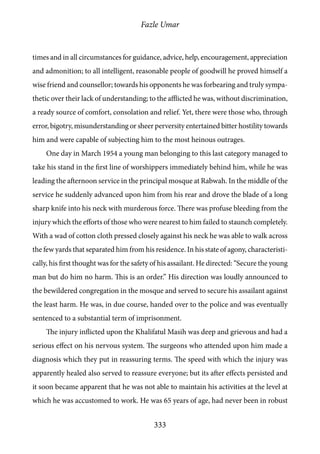
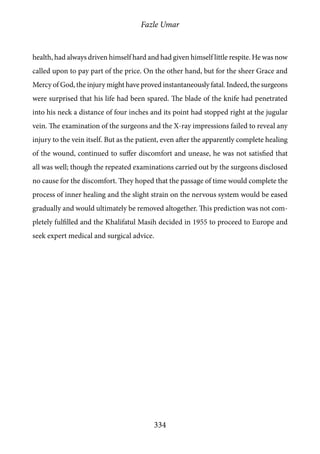
![Fazle Umar
335
Trip to Europe for medical treatment
In an enchanting message to the members of the Community, Hadhrat Musleh
Mau’ood [ra] gave details about his illness and the doctor’s advice to seek treatment
in Europe. Thereafter, betraying an extraordinary attachment and devotion to his
beloved Community he stated:
“Every human being who is born must also die. In the moments when I felt
my soul ebbing away, I was not sad about leaving this world. I was sad over
leaving you people forever. And I could see that such a man does not yet exist
in our Community who can watch over you like a father. My mind could not
bear any burden at the time but I kept praying during those moments that O
my Lord who is my true Father and my Heavenly Father, I am not worried for
my children who will be orphans. I am only worried for that Community which
was established by the one commissioned by You after so many centuries. It
will be orphaned. If You can comfort me with the assurance that You will cater
for their orphaned state then these moments of suffering will become bearable.
However, how can you expect this from me when the enemies of these hundreds
of thousands of spiritual children that you have granted me are present in
every nook and corner and satanic spears are repeatedly being raised for their
extermination? When there is nobody after me to absorb the blows from these
lances, then please tell me how I should tolerate this reality.”
It is therefore quite apparent that this trip was for the treatment and well being
of Huzur. However, every moment of Huzur’s life testifies that his contentment and
tranquillity was connected to the progress and spread of Islam and this trip was no
exception.
In May 1955, Huzur first arrived in Beirut, Lebanon where he visited the ancient](https://image.slidesharecdn.com/fazl-e-umar-160102120102/85/Fazl-e-Umar-341-320.jpg)
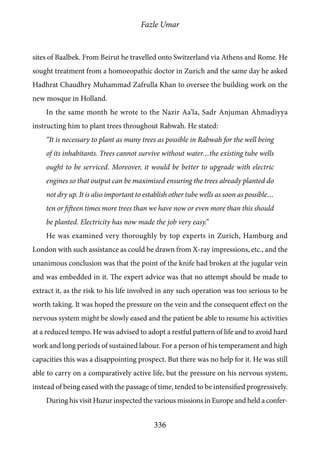
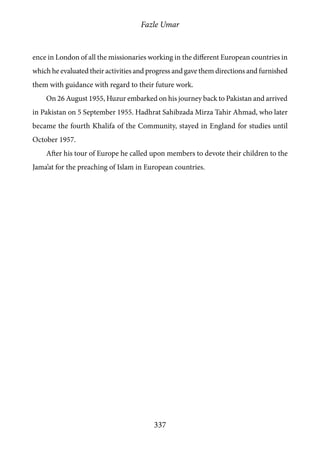
![Fazle Umar
338
The Fazle Umar
One of his prophetic titles was Fazle Umar, indicating his spiritual affinity to
Hadhrat Umar [ra], the Second Successor of the Holy Prophet [saw]. The
Khalifatul Masih not only became the Second Successor of the Promised Messiah
[as], the spiritual reflection of the Holy Prophet [saw], but several of the projects
undertaken by him, and his achievements in diverse spheres, bore a close resemblance
to the achievements of Hadhrat Umar [ra], even the almost fatal tragedy to which he
was subjected by his assailant was identical with the tragedy that brought the Second
Khilafat of the Holy Prophet [saw], to a sudden and premature end. Hadhrat Umar
[ra] was also attacked in the middle of the Prayer service that he was leading by a
non-Muslim who had worked up some grudge against him and who inflicted with a
dagger severe injuries upon him which proved fatal.](https://image.slidesharecdn.com/fazl-e-umar-160102120102/85/Fazl-e-Umar-344-320.jpg)
![Fazle Umar
339
The Electoral College
Having in mind the crisis with which the Movement had been confronted on the
demise of Hadhrat Khalifatul Masih I [ra], he had already established an Electoral
College for the election of a Khalifa, when the sacred office should become vacant by
the Khalifa’s death. The college was composed of the following, subject to the essential
qualification that every elector must be a member of the Movement and should be a
supporter of Khilafat:
1. The surviving sons of the Promised Messiah [as].
2. The President of the Sadr Anjuman Ahmadiyya.
3. All Secretaries of the Sadr Anjuman.
4. The Director General and the Directors of Tehrike Jadeed.
5. The President of Waqfe Jadeed.
6. The Principal of the Ta’limul Islam College.
7. The Headmaster of the Ta’limul Islam High School.
8. The President of the Jamia (Theological Seminary).
9. The President of Ansarullah.
10. The President of Khuddamul Ahmadiyya.
11. Representative of Lajna Imaillah (The Ladies Organisation).
12. Missionaries who had worked abroad for a minimum period of three years.
13. Missionaries who had worked within Pakistan or India for a minimum period
of five years.
14. Amirs of circles in Pakistan.
15. Members who had joined the Movement in the lifetime of the Founder of the
Movement.](https://image.slidesharecdn.com/fazl-e-umar-160102120102/85/Fazl-e-Umar-345-320.jpg)
![Fazle Umar
340
Waqfe Jadeed (The New Dedication)
The history of the Community’s financial sacrifices is indeed splendid and envi-
able. Hadhrat Musleh Mau’ood [ra] had already demonstrated great foresight and
leadership with regard to the extraordinary success of the Tehrike Jadeed Scheme that
started in 1934. In those days he was a young man whose infectious zeal and enthusiasm
energised every member of the Community into action. In 1958, Huzur continued to
suffer discomfort and unease from the knife attack, the pressure and strain upon his
nervous system only intensified with each passing day. However, despite old age, severe
illness, multifarious responsibilities and continuous preoccupation with problems of a
baffling variety, this pious leader presented an extensive programme for the spiritual
progress and education of the Community, a Community that was trying to get back on
its feet after suffering a huge setback as a result of the Partition. He once again proved
to the world the elevated and supreme nature of Divine assistance provided to God’s
elect compared with worldly leaders and self-appointed saints. The importance and
benefits of this scheme can be judged from Huzur’s own proclamation:
“I want such young men whose hearts yearn to march in the footsteps of Hadhrat
KhawajaMo’eenUddinandHadhratSha’haabUddin.Justasyoungmenarededi-
cating their lives under the scheme of Tehrike Jadeed, they ought to dedicate their
livessothattheymaybeabletoeducateMuslimsundermydirectinstruction…Our
country (Pakistan) is well populated but spiritually barren and desolate…Hence,
I want the young members of the Community to be bold and sacrifice their lives
for this purpose…and go out and create new Rabwahs and new Qadians…They
need to go out and settle in designated places where, according to instruction, they
may educate the people by teaching them the Holy Qur’an and Hadith and prepare
students who can carry on this work in new areas…”](https://image.slidesharecdn.com/fazl-e-umar-160102120102/85/Fazl-e-Umar-346-320.jpg)
. He was connected to this
scheme in the capacity of Nazim (Manager) Waqfe Jadeed for many years. He states:
“The reason for creating the Waqfe Jadeed scheme was because of poor train-
ing and moral decline which for many reasons had grown to dangerous levels
especially after the India-Pakistan partition. Hadhrat Musleh Mau’ood [ra]
because of his God given wisdom and intellect sensed this danger with great
intensity. This could have taken a formidable form if not checked in the nick of
time and become out of control. And before we could spread Islam in foreign
lands and in other faith communities, there was this danger that God forbid;
we ourselves would be in need of guidance anew. In this state, those very people
who we would call to Islam would neglect our message and say to us with great
contempt, ‘Physician heal thyself!’.”
The other reason for this scheme was much older than this immediate and urgent
need. It was connected with a wish of the Promised Messiah [as]. The following words
of the Promised Messiah [as] make it quite clear that he wished to start a scheme
like the Waqfe Jadeed within India. He states:
“It is the wish of this humble servant that for the spread of Islam, an excellent
programme should be set up such that within the country of India, everywhere
our representative preachers and speakers are calling God’s creation to the truth](https://image.slidesharecdn.com/fazl-e-umar-160102120102/85/Fazl-e-Umar-347-320.jpg)
![Fazle Umar
342
so that the teachings of Islam reach everyone on the face of the earth. However,
this intention cannot be fully accomplished by this old and deficient servant.”
(The Victory of Islam)
Viewed from this angle, it would not be incorrect to say that the Waqfe Jadeed
was initiated to fulfil an intention of the Promised Messiah [as] The intentions of a
Prophet are not like the intentions of ordinary men. Their inclinations and aspirations
are according to the Will of God Almighty and based on deep wisdom. Hence, on the
one hand it was the wish of the Promised Messiah [as] and on the other the creation
of those conditions which desperately necessitated the scheme of Waqfe Jadeed.
Regarding the background of Waqfe Jadeed, Hadhrat Mirza Tahir Ahmad [rh]
states:
“May Allah send down countless blessings upon Hadhrat Musleh Mau’ood
[ra] because he fulfilled all the desires of the Promised Messiah [as] or he
laid the foundations for their fulfilment during his lifetime. The foundations
of Waqfe Jadeed were also destined to be laid by his blessed hands. Therefore,
in 1958 on the occasion of Eidul Adha, he announced the establishment of this
scheme:
“From Peshawar to Karachi we should cast the net of reformation and rectitude.
The truth is that if we are going to encircle East and West Pakistan for the sake
of reformation and rectitude, we will need in excess of 10 million rupees.”
He continued:
“It is necessary to cast a big net so that through it our teachings can reach every
dweller in every village and every town.”
Hence this was the large net cast by the hands of Hadhrat Musleh Mau’ood [ra]
which was given the name Waqfe Jadeed, The New Dedication.
The primary objective of the scheme was for the education and training of rural](https://image.slidesharecdn.com/fazl-e-umar-160102120102/85/Fazl-e-Umar-348-320.jpg)
![Fazle Umar
343
Ahmadi Communities to divert them from decline towards progress. Just as Ahmadi-
yyat was founded to breath new life into Islam, in the same way Waqfe Jadeed was
initiated to raise the standards of physical, moral and spiritual states of members living
in remote communities lying outside the direct gaze of the headquarters to an exalted
station and breathe fresh life into them. On his initial assessment Hadhrat Mirza
Tahir Ahmad [rh] (Khalifatul Masih IV) discovered that religious awareness in
the rural areas of Pakistan was in a dire state. Mu’allumeen (religious teachers/tutors)
were trained and posted to the rural parts of Pakistan to counter this state of affairs.
An arduous task achieved by making huge sacrifices.
The Mu’allumeen were provided education and training. An elementary religious
school was set up within the department of Waqfe Jadeed for this very purpose. Apart
from basic religious education the students were brought up to date with various
branches of secular knowledge. They were familiarised to a certain degree in subjects
which included mathematics, geography, history, sociology, economics, politics, agri-
culture, chemistry and physics. Similarly, they were taught housekeeping and domestic
duties including how to wash and iron clothes. Hence, in 1965 by the grace of God
Almighty eighteen Mu’allumeen successfully completed this course and began serving
the Community in the rural areas.
The first duty of a Mu’allam after being posted was to assess the situation and pro-
vide feedback to the headquarters. This report detailed the numbers of men, women
and children in the village, how many knew the obligatory prayers with translation,
the number who could read the Holy Qur’an with or without translation and whether
they read it daily, number who offered prayers in congregation, numbers well versed
with the fundamental teachings of Ahmadiyyat such as the death of Jesus, the concept
of the Seal of the Prophets and the validity of the Promised Messiah [as].
Thereafter, he works day and night to improve the situation and provides figures](https://image.slidesharecdn.com/fazl-e-umar-160102120102/85/Fazl-e-Umar-349-320.jpg)
![Fazle Umar
344
to the headquarters outlining the improvements made each month in the areas of
education and training.
Apart from these duties he is also entrusted to spread the message of Ahmadiyyat
within a five-mile radius and particularly educate the Christian and Hindu commu-
nities on the blessings of Islamic teachings. This task is not just work intensive but
requires a large degree of tact and wisdom. The Mu’allam must also try and improve
the financial contributions of members while increasing the activity within the auxil-
iary organisations of Khuddamul Ahmadiyya, Ansarullah and Lajna Imaiallah. In the
same way, improving literacy also falls into their domain. Many Mu’allumeen are the
village doctors and chemists or homoeopathic doctors in areas where these services
are lacking. In some areas, primary and middle schools had been established offering
education like any other state school.
This institution began to yield beneficent results on a large scale within a short
time. There was an extraordinary increase in financial contributions born out of a
spirit of sacrifice created and nurtured through education and training. Daily recita-
tion of the Holy Qur’an with translation also increased significantly. In many areas,
congregational prayers became firmly established and the numbers offering prayers
also doubled.
Prior to 1986 the project was intended mainly for the rural communities of Paki-
stan. However Hadhrat Khalifatul Masih IV [rh]broadened the scope of this project
and now all the countries of the world are within the scope of this plan. (Source: “A
Brief History of Movement In Islam”, www.alislam.org/library/history/ahmadiyya/72.
html). The Annual donation by members into this fund has grown since its inception
in 1958. In 2008, the overall donations received stood at £ 2,575,000. 130](https://image.slidesharecdn.com/fazl-e-umar-160102120102/85/Fazl-e-Umar-350-320.jpg)
![Fazle Umar
345
The Auxiliary Organisations
The efforts of Hadhrat Musleh Mau’ood [ra] to strengthen the administrative
machinery of the Community was an ongoing concern. His comprehensive advice
and supervision kept everyone alert and keen on doing his best. His main objective
was to maintain the Community at the highest level of activity, both in terms of self-
improvement and in respect of striving to spread the message of Islam. In this respect,
the creation of the auxiliary organisations was a huge boost in fulfilling his objective.
The Khuddamul Ahmadiyya
Advising men between the ages of fifteen and forty years of age he stated:
“I am reminding Khuddamul Ahmadiyya that they should set such a high
example that the spirit of Islam is kept alive generation after generation. Islam
in itself is a complete faith. However, even the most flavoursome juice needs a
glass. Similarly, the soul of Islam requires a glass in order to spread to it others.
Our Khuddamul Ahmadiyya are those glasses in which the spirit of Islam will
be kept intact and through them it will be passed onto others.” (Al-Fazl, 15
Dec. 1955).
Reminding them about hard work, perseverance and sacrifice he stated:
“Today I am reminding the young men of the Community that they ought to
develop the habit of hard work and sacrifice. And they must impress it upon
their minds that a nation will never progress until its elite as well as its common
people are in the habit of hard work and sacrifice. In the world, difficulties
and trials appear in many different shapes and forms. But the response to all
of them can only be the same. And that is to overcome these difficulties with
perseverance and courage. However, this spirit is only created when the youth](https://image.slidesharecdn.com/fazl-e-umar-160102120102/85/Fazl-e-Umar-351-320.jpg)
![Fazle Umar
346
respond accordingly after understanding their responsibilities. i.e. the greater
the responsibilities the harder they should work. (Al-Fazl, 16 May 1961).
In October 1949, Hadhrat Musleh Mau’ood [ra] took over the responsibili-
ties of the head of the Khuddamul Ahmadiyya organisation. Commenting upon this
change he stated:
“I have taken this step to lure the youngsters more and more towards our faith.
As far as organisation and security of the headquarters is concerned Khuddamul
Ahmadiyya has done a good job. But the reason for its formation — to create
genuine religious devotion in the hearts of the youth — has not been fulfilled.
The truth is that the sole interest of godly Communities is spirituality. If there
is any deficiency in this then the true purpose is completely lost. For this reason
I have taken over the leadership myself so that I can supervise them directly.”
(Al-Fazl, 10 Jan. 1950).
Regarding Education he advised the youth:
“I advise our youth that they should not seek education for the purpose of gaining
employment. Employment is not the means by which the nation is nourished
rather the employees live off the wealth of the State. If you become tradesmen,
work in industry or become inventors then you provide for the State. And it is
true that the hand that gives is better than the hand that receives. No doubt the
service industry is important but we should not all turn our attention towards
it. As far as possible we ought to try and take up a trade or a profession so that
the country can develop and progress.” (Al-Fazl, 14 Dec. 1952).
The Atfal Section
In July 1940, Hadhrat Musleh Mau’ood [ra]instructed the Khuddamul Ahmadi-
yya organisation to create the “Atfalul Ahmadiyya” which should consist of boys](https://image.slidesharecdn.com/fazl-e-umar-160102120102/85/Fazl-e-Umar-352-320.jpg)
![Fazle Umar
347
between the ages of eight to fifteen years. He states that these boys are the nursery
of the Khuddamul Ahmadiyya organisation. In the future, these very children will
shoulder the responsibilities of the Organisation. Therefore, right from the start they
should be trained so that when the time comes they may deem themselves capable of
taking on the important responsibilities that will devolve upon them as members of
the Khuddamul Ahmadiyya organisation. In childhood the child’s mind is like a clean
slate and hence can be easily moulded.
The importance of Auxiliary Organisations within
the Community
In the presence of the Sadr Anjuman Ahmadiyya, the Majlise Mashawarat and
the Anjuman Ahmadiyya Tehrike Jadeed why did Hadhrat Musleh Mau’ood [ra]
create auxiliary organisations and what was their purpose?
Hadhrat Musleh Mau’ood [ra] himself explained the reasons behind this on
different occasions. He stated:
“If the Atfalul Ahmadiyya organisation becomes established everywhere, if
the Khuddamul Ahmadiyya organisation becomes established everywhere, if
the Ansarullah Organisation becomes established everywhere then the whole
Community becomes entwined…In such an Organisation every individual
becomes visible to the Community. One can discover his competencies and his
level of interest in religious matters. In a way we also obtain a census of the
Auxiliary Organisation. No doubt members attended the various gatherings
of the Community before this. However, there were no limitations incumbent
upon the members. And neither was there any strictness about observing who
was absent and the reasons behind their absence.
However, as similar age groups have all been gathered together because of this](https://image.slidesharecdn.com/fazl-e-umar-160102120102/85/Fazl-e-Umar-353-320.jpg)
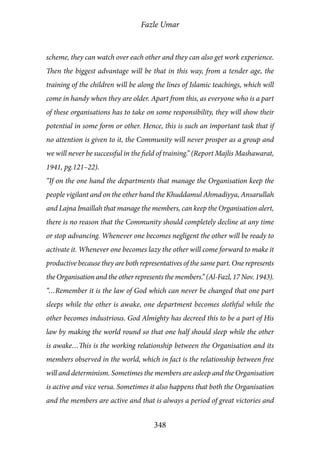
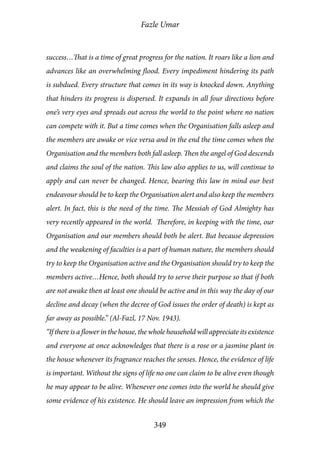
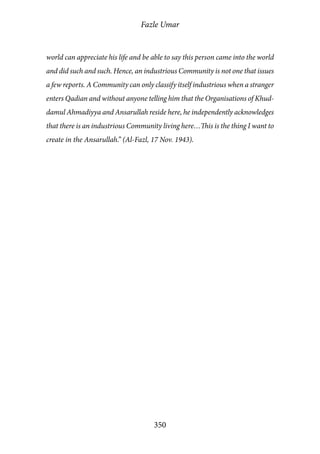
![Fazle Umar
351
Writings of Hadhrat Musleh Mau’ood
[ra]
The Fazle Umar Foundation realising the need and importance of these spiritual
and scholarly treasures and respecting the desires and persistence of the members
of the Community, issued the books of Hadhrat Musleh Mau’ood [ra] under the
name of “Anwarul Uloom” and his sermons under the name of “Khutbaate Mahmud”.
Some of these books are already in the possession of our readers. It is important
to confess that the task of summarising and introducing the books and writings of
Hadhrat Musleh Mau’ood [ra] is no easy task. His writings are such a collection of
spiritual and scholarly treasures that it is only possible to appreciate their worth after
studying them. This spiritual legacy, which is an exposition and commentary of the
Holy Qur’an, demonstrates the most elevated status of the Holy Qur’an as Khatamul
Qutb, the Seal of the Books. It clarifies the unparalleled pre-eminent position of the
raison d’etre of creation, Hadhrat Muhammad Mustafa [saw]. Only after studying
his writings can one become conscious that one can only truly benefit from them by
studying them constantly. As he states:
“After taking the seat of Khilafat, Allah Almighty revealed the secrets of the
Holy Qur’an to me in such abundance that that the Muslim Ummah will be
compelled to study my books and benefit from them.”
When considering his huge contribution as a writer it is important to bear in mind
that Hadhrat Musleh Mau’ood [ra] was not leading the life of a retired gentleman
who spent all his time engrossed in studying and researching his subject matter. On
the contrary he was the head of a worldwide, dynamic and growing Community who
had to keep in touch with hundreds of thousands of its members and provide them
with guidance even in their very personal affairs. Every member of the Community](https://image.slidesharecdn.com/fazl-e-umar-160102120102/85/Fazl-e-Umar-357-320.jpg)
![Fazle Umar
352
because of their devotion and affection thought themselves very fortunate that they
knew Hadhrat Musleh Mau’ood [ra] personally. It was because of this love that
Ahmadi parents requested the Khalifa to name their newborn children. They requested
him for prayers even before the birth and from then on they involved Huzur in every
good news as well as bad. Seeking Huzur’s attention and prayers in all matters bestowed
peace and tranquillity on the members.
The protection and guidance of the Community during opposition and persecu-
tion, making programmes for the benefit and progress of the Community, successfully
implementing these programmes and keeping watch over them was an ongoing and
permanent responsibility.
The scattered members of the international Community believed that requesting
Huzur for prayers was an efficacious means to alleviate their difficulties. Even those
who did not belong to the Community thought it beneficial to seek his prayers. In this
way he received hundreds of letters daily. He read and replied to every letter and even
offered advice if required. He thought it imperative to try and provide for the needs
detailed in any correspondence to the best of his ability.
The mere fact of leading the five daily prayers took up a lot of time. It was also his
practice to rise in the early hours of the night to offer prayers with deep humility. Day
and night the work was unending. In times of peace as well as times of crisis, these
tasks never went away. From a young age his health had never been good and he was
always ensnared by some illness or malady.
In such a situation, his faith inspiring scholarly books, sermons and articles are
nothing short of a miracle. It is evident that just this single contribution was accord-
ing to God’s Grace, decree and will. It was through the blessings of his anointed soul
that the honour of Islam and the true rank of the Word of God were demonstrated.](https://image.slidesharecdn.com/fazl-e-umar-160102120102/85/Fazl-e-Umar-358-320.jpg)
![Fazle Umar
353
Jalsa Salana Speeches
It was the practice of Hadhrat Musleh Mau’ood [ra]to give the inaugural address
on the occasion of the Jalsa Salana, the annual gathering. In this address he usually
outlined the importance of the gathering as well as the means to attain maximum
benefit from the blessed occasion. His speech on the second day of the Jalsa Salana
highlighted the blessings and favours that God Almighty had bestowed on the Com-
munity over the past year.
On the final day he typically spoke on some intellectual subject. Since 1924, he
began to address the ladies separately about matters relating to training in high morals.
Huzur’s speeches were the heart and soul of the Jalsa Salana. All year members of the
Community eagerly awaited the Jalsa Salana and along with the countless other bless-
ings of the Jalsa, these speeches were most eagerly anticipated.
The most salient feature of Huzur’s speeches was his ability to explain the most
difficult and intricate matters in the most simple and easy language. For this reason
the audience was captivated throughout his speeches that often lasted many hours.
The concept of God, how to develop a relationship with God, angels and divine
decree, the essence of dreams and visions, the economic system of Islam and the New
World Order are the titles of the speeches which themselves clearly betray their own
importance and significance.
“Excellences of the Holy Qur’an” and “The
Spiritual Tour”
Every speech of the Jalsa Salana has its own merits. However, the series of lectures
under the heading of “Excellences of the Holy Qur’an” and “The Spiritual Tour” possess
an incomparable lustre and sparkle. The Excellences of the Holy Qur’an consists of
several lectures. The first was delivered in the Jalsa Salana of 1928 and the final one in](https://image.slidesharecdn.com/fazl-e-umar-160102120102/85/Fazl-e-Umar-359-320.jpg)
![Fazle Umar
354
the Jalsa Salana of 1936. For every student of the Holy Qur’an, they contain priceless
gems of beauty necessary to learn about the mysteries and secrets of the Holy Qur’an.
The series of lectures called “The Spiritual Tour” (Sair-e-Ruhani) began in 1938
and the final (twelfth) lecture was delivered in the Jalsa Salana of 1958. These spiritu-
ally exhilarating speeches are a sign of God’s help and support for Hadhrat Musleh
Mau’ood [ra]. They are an unprecedented collection of his powers of speech,
reflecting his intuitive and spiritual condition, insight and power of observation and
the variety and diversity of the knowledge of the seen and the unseen. Commenting
upon these speeches he says:
“Tomorrow is my literary lecture …if after listening to it someone claims that
these are things that appear before us everyday then although he would be
correct, however, if he looked at the arrangement then he will see that this sub-
ject has not been thought by anyone before. He will feel that the Holy Qur’an
contains this excellence whereby it throws up new insights. I am someone who
deeply ponders over the Holy Qur’an. However, looking at the arrangement of
this subject, even I am baffled that such subjects can arise from those very verses
which we come across daily.”
These are some of the speeches on the diverse subjects which comparing physi-
cal and spiritual matters against each other presented the splendour of the spiritual
universe.
1. Archaeological finds
2. Magic and Charms
3. Mosques
4. The fort of the Holy Qur’an
5. Tombs, sepulchres and mausoleums
6. Meena Bazaar](https://image.slidesharecdn.com/fazl-e-umar-160102120102/85/Fazl-e-Umar-360-320.jpg)
![Fazle Umar
355
7. Minarets
8. Public Hall of Audience
9. The Cabinet, Privy Councils
10. Offices and Departments
11. Canals
12. Gardens
13. Free Public Kitchens
14. Libraries and Bookshops
The New World Order of Islam
This book is a translation of an address delivered by Hadhrat Musleh Mau’ood
[ra] to an Annual Gathering on 28 December 1942. In the preface, Mr M. Aslam
summarises the subject matter of the book in the following words:
“The Address answers the question — how does Ahmadiyyat, the True Islam,
propose to deal with the problem of social inequality in the world? The Ahmadi-
yya solution is the solution of Islam shaped under Divine guidance for present
day needs by the Promised Messiah [as]. It builds on Islamic teaching and
emphasises the progressive nature of that teaching.
“The social teaching of Islam was expounded — by Hadhrat Musleh Mau’ood
[ra] himself — in 1924 in his ‘Ahmadiyyat, the True Islam’, and has since
become well known. It consists of the statutory prohibition of interest, the tax
of Zakat and the division of inheritances. It also includes general instructions
regarding voluntary contributions by individuals which leaders of Islam from
the earliest times have organised in different ways and devoted to the service
of society.
“The Promised Messiah [as] has instituted among his followers a system of](https://image.slidesharecdn.com/fazl-e-umar-160102120102/85/Fazl-e-Umar-361-320.jpg)
![Fazle Umar
356
voluntary consecration of properties by individual Ahmadis to the needs of Islam
in the widest sense of the term. The institution was promulgated by him in his
book, ‘Al-Wasiyyat’ (The Will) in 1905, and since then willing away portions of
properties and income to the Ahmadiyya organisation has become a common
practice with Ahmadis.
“Hadhrat Musleh Mau’ood [ra] has announced in his address that the social
order of Islam built on the pillars of its economic teaching will continue to grow.
It will grow through the Wasiyyat, the institution of willing away properties and
incomes inaugurated by the Founder of Ahmadiyyat in 1905. The institution
of Wasiyyat, therefore, answers the question which many Muslims and Non-
Muslims seem to be asking today: Is Islam progressive? It also answers the wider
question: Is religion progressive?
“The Ahmadiyya solution of the problem of inequality, it is as well to say, will
spread in the world at the rate at which Ahmadiyyat spreads. The pace cannot
be forced, as Ahmadiyyat is obliged under Islamic teaching to use only one
method for its propagation — the method of argument and honest conviction.
Those who accept the general principle of this solution but think its establishment
throughout the world will take too long can assist in the solution by applying
its principles in their own way.
“Until however, the scheme of Wasiyyat becomes reasonably effective, another
scheme known to Ahmadis as the Tehrike Jadeed (The New Scheme) will take
its place. This scheme was announced by Hadhrat Musleh Mau’ood [ra] in
a series of Friday sermons in 1934. Its nineteen clauses may be summarised as
an organised effort for the promotion of discipline, simplicity and voluntary
sacrifice by Ahmadis for the conservation of a Central Fund, devoted ultimately
to strengthening and promoting the work which Ahmadiyyat is doing for the](https://image.slidesharecdn.com/fazl-e-umar-160102120102/85/Fazl-e-Umar-362-320.jpg)
![Fazle Umar
357
spread of Islam and its institutions.
“The Tehrike Jadid, therefore, is a forerunner of the New World Order of Islam
and is intimately connected with it. This is why the address begins and ends
by references to it.”
Hadhrat Musleh Mau’ood [ra] explained that the Tehrike Jadeed had a uni-
versal aspect. It would grow to fulfil a great Islamic purpose and serve to strengthen
the foundations of human society. He then proceeded to explain the setting of the
Tehrike Jadeed so that its significance could be properly understood. Again through
his unique ability to explain difficult concepts he introduced the thought of the time in
the simplest terms. He examined the changes going on at the time and how they were
likely to affect the future. He began by discussing the increasing gap between the rich
and the poor and the attempts to alleviate poverty. He discussed secular movements
such as democracy, Socialism, Marx, Lenin and Martov, Bolsheviks and Mensheviks,
Principles of Bolshevism and the reactions to it of Nazism, Fascism and Falangists,
dangers of Socialism, Communism and its defects. He then moved onto schemes put
forward by the religions of Judaism, Christianity and Hinduism to solve the problem
of social inequality. The rest of the book is dedicated to the principles laid down by
Islam to promote social and economic equality.
The Economic System of Islam
On February 21, 1945, Huzur delivered a historical lecture on the topic of “The
Economic System of Islam”, under the auspices of Ahmadiyya Intercollegiate Associa-
tion, Lahore. This lecture created a great stir in the literary world. This lecture has since
been translated into many different languages of the world including English, French
and German. An influential organ of the Spanish Ministry of Industry and Commerce,
“Information Commercial Industrial” wrote about it in its October, 1946, issue:](https://image.slidesharecdn.com/fazl-e-umar-160102120102/85/Fazl-e-Umar-363-320.jpg)
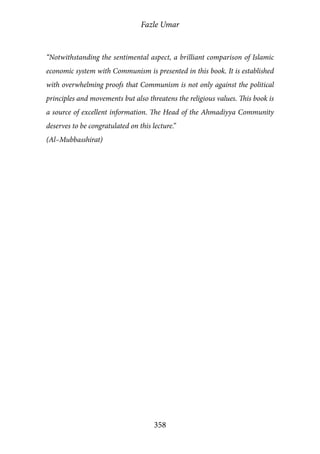
![Fazle Umar
359
Services and contributions in the
international arena
After the creation of Pakistan, Hadhrat Musleh Mau’ood [ra] delivered many
speeches about the stability and empowerment of Pakistan. On one such occasion
Huzur addressed a meeting on the topic of “Pakistan and its Future”, under the chair-
manship of Mr. Malik Feroz Khan Noon. At the end, in his presidential remarks, Mr.
Noon, said, “Mirza sahib has a limitless treasure of knowledge in his mind. He has told
us a lot of things in this brief time and has analysed the topic in real depth.”
In short, Almighty Allah, by His Grace, had given him excellence in every field
of knowledge. Hadhrat Musleh Mau’ood [ra] used every opportunity to promote
the rights, liberty, welfare and interest of Muslims and yet the biased politicians and
the crooked Ulema, are doing their level best to spread misconceptions against the
Community.
One illustrious aspect from the splendid life of Hadhrat Musleh Mau’ood [ra]
that shone far brighter than any other was his overriding passion and desire to help
Muslims and the cause of Islam. It would not be an exaggeration to say that all his
projects, plans, schemes and tireless activities, the first and the last, were solely for the
benefit of Islam. Without doubt, every day of his busy and hectic life bore testimony
to this fact.
Irrespective of which part of the world they hailed from, to whichever colour,
race or school of thought they belonged, he felt the Muslims ought to be unified. He
always thought about how they could be united, see eye to eye and be protected from
the mischief making plots and intrigues of their enemies. How could they be made to
renounce the non-Islamic customs and conditions and made to embrace Islamic ideals?
How could they be rescued from the misfortune of division and suspicion to present](https://image.slidesharecdn.com/fazl-e-umar-160102120102/85/Fazl-e-Umar-365-320.jpg)
![Fazle Umar
360
a firm, compact and solid front to the forces of evil? How can they remove their lazi-
ness, sloth and indolence, their mental and intellectual confusion and anxiety to firmly
place themselves once again at the forefront of the advanced nations of the world?
Firstly, there was no such scheme presented at the national level and even if there
was some movement then it is no more than shedding tears over the destruction of
the nation or poems lamenting their fate. If on the individual level some cultured and
sincere well wisher makes efforts for the welfare of the nation, the rug is pulled from
under him by issuing him with edicts of infidelity.
In this commotion all efforts of reformation died their own death and their
remains were speedily torn apart and devoured by the vultures of selfishness and greed.
However, because the All-Powerful God Almighty intended to keep the light of the
Holy Qur’an burning bright, He appointed an unknown and obscure admirer of the
Holy Prophet Muhammad [saw] as captain of the ship of the renaissance of Islam.
He turned defeat into victory by presenting the Quranic teachings based on reason
and logic with great skill and highlighted their brilliant arrangement and system. The
enemies of Islam, who had marched ahead intoxicated with the conviction of success,
now perplexed and astonished were once again forced to beat a hasty retreat. This
jihad by the pen, through argument and by financial means, this struggle through
peaceful propagation continued with great success. This jihad continued unabated in
all directions. It prospered by leaps and bounds throughout the Khilafat of Hadhrat
Musleh Mau’ood [ra] and the work of publishing and preaching spread throughout
the world. Reflecting on the state of the world of Islam he stated:
“Nowadays Islam is passing through dark days. India, Palestine, Egypt and
Indonesia - in all these places the entity of Islam is in grave danger. Whatever
is happening in India is there for all to see. The Russian government is creating
its influence in Iran. Therefore, the Iranian government is having to deal with](https://image.slidesharecdn.com/fazl-e-umar-160102120102/85/Fazl-e-Umar-366-320.jpg)
![Fazle Umar
361
a very dangerous situation. The Dutch government is using every weapon at
its disposal to enslave the people of Indonesia. In Malaysia, the Chinese are
being suppressed. From India to Iran, then from Palestine, Egypt to Indonesia,
in all these countries the Muslims are surrounded by danger from all sides.
Therefore, every Ahmadi ought to pray particularly hard during these times.
The non-Ahmadi Muslims also ought to be encouraged to pray fervently. Apart
from this there is no other option open to the Muslims.”(Al-Fazl, 10 Dec 1946).
Although because of his direct links with India and Pakistan, the attention of
Hadhrat Musleh Mau’ood [ra] was constantly drawn to resolving their issues, it
would be incorrect to assume that he limited himself to this geographical area.
The Holy Lands (Sacred Places)
In 1935, while delivering the weekly Friday sermon Hadhrat Musleh Mau’ood
[ra] spoke in most fervent tones about the Holy Places of Islam:
“We consider these places most sacred and holy. We consider these places to be
the manifestation of the Glory and Majesty of God Almighty. And we consider it
our good fortune to sacrifice our most treasured possessions for their protection.
And we believe that whoever ogles at Mecca even once, God Almighty will blind
that person. If God Almighty ever utilises human beings for this purpose then
our hand will be the foremost in bursting that malicious optical instrument.
“Many years ago, when Lord Chelmsford was the Viceroy of India, there was a
commotion among the Muslims that the British offered eminent Arabs financial
help to bring them under their influence. When this noise reached a crescendo
the Indian government announced that they did not give any financial assistance
to the Arabs. The Muslims were pleased to hear this. However, I looked into this
further and discovered that although the Indian government did not help the](https://image.slidesharecdn.com/fazl-e-umar-160102120102/85/Fazl-e-Umar-367-320.jpg)
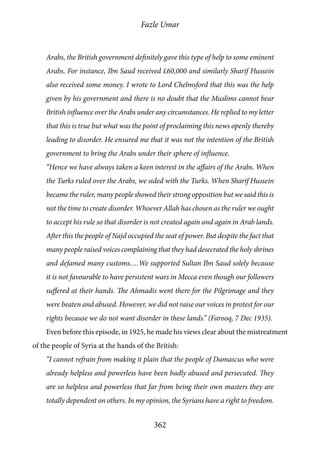
![Fazle Umar
363
It is their country and they should be its rulers. They should not be governed by
foreigners. The injustice is further polarised because the people of Syria helped
the Allied Forces in the last war. They helped under the precondition that they
would be given the freedom to govern their own country…Hence, it is not the
right of the British nor of any other power to rule over the Syrians and neither
is it the right of the French to forcefully occupy this country.” (Al-Fazl, 12 Nov
1925, pg 8).
In 1935, a British company signed a mining agreement with the Saudi government.
The Saudis were not a wealthy nation; this was before the discovery of Black Gold
(oil). In India there was a great uproar against this agreement and it gave the Mullahs
opposed to the Saud regime a chance to carry out propaganda against them in the
Indian press. Hadhrat Musleh Mau’ood [ra], because of his deep love and respect
of the lofty principles of Islam took a position based on wisdom and far-sightedness.
He stated:
“An agreement has been signed between a British firm and Ibn Saud. Sultan
Ibn Saud is a sensible monarch but because he is not acquainted with European
history, he does not understand European terms and expressions. Once before
when he was about to sign a treaty with Italy, I advised the Sultan through a
member of his team to be very careful when making the treaty. The Europeans
have a habit of using very soft words, however their meanings are very harsh.
The agreement with the British has now been published. I have read the agree-
ment and I think some mistakes have been made. The conditions agreed to mean
that some outside governments could interfere with the affairs of the Arabs.
Allah Almighty knows that after reading this I was very distressed even though
we had good cooperation with the British…However, whether it is the British
or another government we cannot be lenient when it comes to affairs of the](https://image.slidesharecdn.com/fazl-e-umar-160102120102/85/Fazl-e-Umar-369-320.jpg)
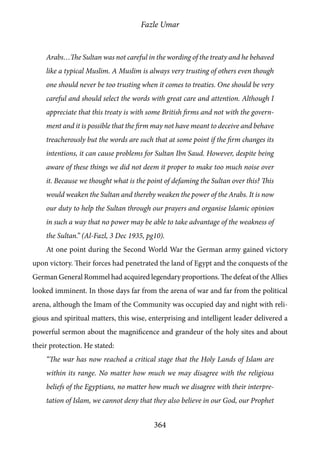
![Fazle Umar
365
[saw] and in our Holy Book. The vast majority of them have a strong sense
of honour for the God of Islam, for the Holy Book of Islam and for the Holy
Prophet Muhammad [saw]. This nation is in the forefront when it comes
to the dissemination and safeguarding of Islamic literature. Today, the books
of Hadith like Bukhari and Muslim that are taught in our schools are printed
in Egypt. The rare books of Islam are also printed in Egypt and the Egyptian
nation has contributed beneficently for the cause of Islam. This nation forgot
their mother tongue and made Arabic their own language. They ignored their
own ancestry and became a part of the Arabs and today there is no difference
between the two nations. In Egypt, the Arabic language, Arab civilisation and
Arab customs are in vogue and the religion of Muhammad [saw] is in
fashion. Hence, the difficulties and destruction of Egypt should be a cause of
concern for all Muslims no matter which sect he belongs to and no matter how
numerous his religious contentions are with the Egyptians.
“Right next to Egypt starts that holy tract of land whose every particle is more
precious to us than our very own lives. It is that holy place where lie the remains
of our beloved master, in whose streets the blessed feet of Hadhrat Muham-
mad Mustafa [saw] used to tread, in whose graves his loving and devoted
companions are slumbering sweetly under Divine Grace…It is the valley which
houses that home which we refer to as the House of God and towards which we
turn at least five times a day when offering our prayers…This holy land is only
a few hundred miles away and nowadays it is only at a distance of four or five
day’s journey by motor vehicles and tanks. These places have no defences. The
treasures of Islam lie behind unlocked doors. In fact one ought to say there are
not even any walls. And as the enemy inches towards these places the heart of
a Muslim begins to tremble.”](https://image.slidesharecdn.com/fazl-e-umar-160102120102/85/Fazl-e-Umar-371-320.jpg)
![Fazle Umar
366
The Independence of Lebanon
In November 1943, Lebanon presented a Bill to parliament to change the consti-
tution so that Lebanon could enjoy complete independence from France. However,
instead of following the constitution, France arrested all the ministers including the
Prime Minister through the use of force and coercion and took them to an unspecified
location. They introduced Martial Law and used French troops to disperse the enraged
protestors. The army took over from the Arab police. Along with Beirut, a dangerous
situation also developed in Tripoli. Demonstrations took place. Apart from the 20
Lebanese delegates the French army also arrested many other distinguished leaders.
On this issue Hadhrat Musleh Mau’ood [ra] stated:
“The countries of Syria and Lebanon were once under Turkish rule and the
Turks gave them every kind of freedom which any occupied State can be given.
When the previous war broke out the Europeans said to these nations that we
would grant you independence if you rebel against your occupiers. Hence, these
nations stood up and behaved treacherously towards their leaders and prepared
to fight them thinking that this would result in independence. However, when
the war ended and the land of Arabia and Syria was painted red with their
blood, some areas were given over to the British to patrol and some areas were
handed over to the French. Now this second war has come and right from the
start of this war France was defeated. Because the lands of Syria and Lebanon
were under the French government which had connections with Germany, the
Allied Powers became worried that Germany and her ally France might make
these areas a permanent base and start to spread discord in their areas. Hence,
they took the very clever step of attacking these areas and the Commander of
the Independent French detachment announced that Lebanon had demanded
independence for a long time. However, the French government was not willing](https://image.slidesharecdn.com/fazl-e-umar-160102120102/85/Fazl-e-Umar-372-320.jpg)
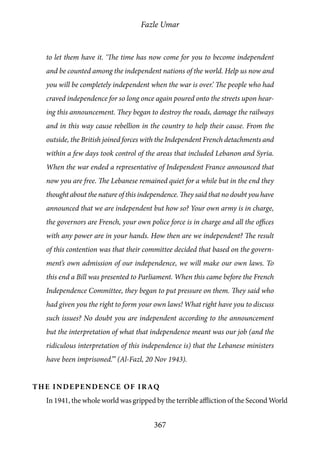
![Fazle Umar
368
War. Fierce battles were being fought against one another even far from the battlefields.
In Iraq, the Iraqis caused a commotion because of Nazi intrigues thereby creating the
possibility of the holy places being placed in grave danger. They sided with the Axis
Powers against the Allies. Hadhrat Khalifatul Masih II [ra] delivered a speech on
Lahore Radio which was full of priceless advice for Iraq. He stated:
“The current unrest in Iraq is a cause of great anxiety for the Muslims of the
whole world and for the Indians. Baghdad, the capital of Iraq, its port, Basra
and the centre of its oil wells, Mosul are places that Muslims are fully acquainted
with from their childhood. The achievements in the arts and sciences by the
government of Banu Abbas are a happy memory for all Muslims…I can speak
for myself and definitely state that in my childhood Baghdad and Basra were far
more alluring and charming than London and Paris because they were familiar
to me right from the start. As I grew a bit older the study of Hadith introduced
me to Imam Ahmad bin Hanbal, Islamic Jurisprudence to Imam Abu Hanifa
and Imam Yousaf, Sufism to Junaid, Shibli and Syed Abdul Qadir Jilani, History
to Ibn Qayyim, Art of Lecturing to Nizam Uddin Toosi, Literature to Mubrad,
Sibuya, Jarir and Farzooq, Politics to Haroon, Mamoon and Malik Shah. These
men, who were and still are peerless in their own disciplines, were introduced
to my senses one by one in such a way that contemplating their excellences
filled my heart with hopes and expectations and occupied my mind in sublime
thought. The appearance of unrest in the land of Iraq with its charming sites,
which produced these phenomenal oceans of excellence, should only fill the
hearts of Muslims with sadness. Can the possibility of the bombardment of the
tombs of thousands of these revered men, who are attached to us not physically
but spiritually, leave us indifferent?
“Iraq houses the sacred places of the saints of both the Sunnis and the Shias.](https://image.slidesharecdn.com/fazl-e-umar-160102120102/85/Fazl-e-Umar-374-320.jpg)
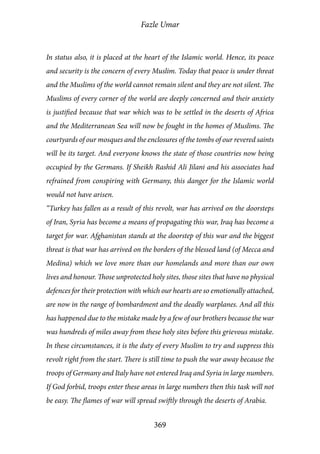
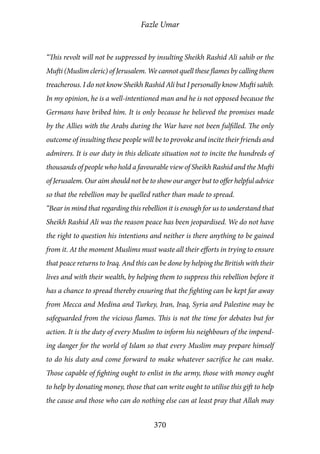
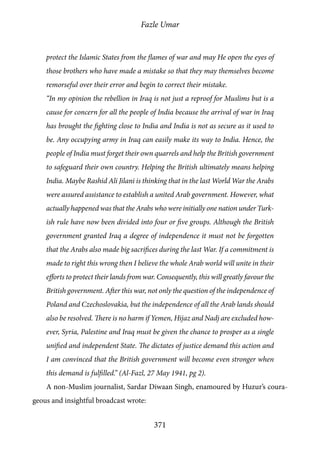
![Fazle Umar
372
“The worst character trait of a subject people and a colonised State is that its
members become devoid of truthfulness, morality and courage and the traits of
flattery, sycophancy, falsehood and cowardice become prominent. In the eyes of
the British subjects, Rashid Ali of Iraq may be wrong or his war with the British
may be seen as inappropriate. However, it cannot be denied that this man is
fighting for the political freedom of his country and under no circumstances can
he be labelled as a traitor of Iraq. But consider the character of the supporters
and leaders of our country. Whenever they speak about the Prime Minister of
Iraq, all of them proclaim Rashid Ali to be a traitor. And if a leader discusses
the War, the first thing he does is label Rashid Ali a traitor. The character of our
Ministers and leaders has become so vile under colonialism that they believe
this false flattery and sycophancy is a real service to their country and govern-
ment. Side by side with this foolish sycophancy of our Ministers and leaders,
the moral courage, magnanimous character and frankness of the leader of the
Ahmadiyya Community of Qadian that he displayed last week in his radio
broadcast will be keenly observed with pleasure and delight.” (Riyasat, 2 June
1941, quoted in Al-Fazl, 7 June 1941).
The Palestine Issue
For the world of Islam the establishment of the State of Israel is like a running
cancerous sore which the opponents of Islam established through the plotting and
intrigue of the colonial powers. The Middle East has been plagued by wars, discontent
and many kinds of hardships and suffering. Since its creation these afflictions and suf-
ferings have not only persisted but increased day by day as Israel marches forward in
its abuse, malevolence and transgression. Hadhrat Musleh Mau’ood [ra] saw right
through this extremely dangerous intrigue from the very start. In 1945, after present-](https://image.slidesharecdn.com/fazl-e-umar-160102120102/85/Fazl-e-Umar-378-320.jpg)
![Fazle Umar
373
ing the commentary of the second Ruku of Chapter 38 he stated:
“These verses were revealed to me while I was offering my prayers yesterday
and I was told that they contain a prophecy about the present age. In reality,
the kingdom of the Jews was established through Prophet David [as]. This is
why allegorical terms such as the ‘Throne of David’ and the ‘Kingdom of David’
are in fashion. Then it is also mentioned that Jesus [as] will sit on the throne
of David [as]. The Holy Qur’an mentions a prophecy in these verses about the
latter days which is allegorical as well as a vision. Here, God Almighty revealed
that the descendents of David [as]or the followers of David [as](who include
the Jews and the Christians) would control over 99% of the world while only
1% will remain in the hands of the followers of the Holy Prophet Muhammad
[saw]. However, these people will still create mischief to try and gain pos-
session of the remaining 1%… Europeans use the term ‘Mandate’ to describe
all those countries which they acquired after the last War. Mandate means
security, guarantee or responsibility and today this term is used for Palestine.
Hence, these verses state that the Jews and Christians will demand the land of
Palestine from the Muslims. Therefore, President Truman is sending telegrams
that Jews should be given a homeland in Palestine. He controls a country that
is 5.1 million square miles in area but he will not allow Jews to settle in his
homeland. The area of Palestine is twenty-four to twenty-five thousand square
miles or even if one assumes it is fifty thousand square miles then the ratio is
ninety-nine to one. And it is in this 1% where they are pushing to settle the
Jews…They feel no shame in making these demands and no one in the world is
asking them why when America owns 99% more land, or when Australia own
99% more land, or when the British who hold 99% more land in their colonies,
none of them are ready to house the Jews, and they are asking those who control](https://image.slidesharecdn.com/fazl-e-umar-160102120102/85/Fazl-e-Umar-379-320.jpg)
![Fazle Umar
374
a tiny 1% to settle the Jews in their homeland.” (Al-Fazl, 31 Oct 1945, pg 2).
The echoes of this statement made by Hadhrat Musleh Mau’ood [ra] in the
light of the teachings of Holy Qur’an were heard in the corridors of the American
government and a member of the United States Senate wrote to his Foreign Secretary:
“I want to state that America should play no part in setting up any kind of
State in Palestine. If we intend to create a Jewish State in Palestine then we will
have to defend this State from all those Powers who are opposed to its creation.”
This scheme received the greatest momentum from the United States. A corre-
spondent of the “News of the World” issued in Jerusalem, spoke against the United
States and Britain:
“With the creation of the Jewish State in Palestine, Britain will have all bases
which it needs and with the help of which it can be a guardian of the Suez
Canal. In this situation Palestine could become another British colony. Contrary
to this, if they follow the 1939 White Paper then in this situation the Jews will
bind their future with the future of Arabs and they will promote the removal
of the British from the Middle East and India. Not only have the people of the
United States and Britain been misled over the issue of Palestine but so have the
responsible officers about the relocation of every Jew from Europe into the deserts
of Palestine. From every ten Jewish families living in America if one family was
granted permission to give refuge to a single Jew then President Truman’s issue
is resolved for one hundred thousand Jews. The Jewish families will not decline
from providing refuge. President Truman ought to remove the restrictions over
the entry of Jews into America. Every Allied country ought to permit the entry
of Jews according to their capacity.” (Al-Fazl, 3 Nov 1945, pg 2).
Whilst issuing these reports a headline in the “Shahbaaz News” read, “Why are
Jews not resettled in America.”(Al-Fazl, 3 Nov 1945, pg 2).](https://image.slidesharecdn.com/fazl-e-umar-160102120102/85/Fazl-e-Umar-380-320.jpg)
![Fazle Umar
375
In this way, God Almighty created the means to widely publicise the honest and
straightforward advice given by Hadhrat Musleh Mau’ood [ra] to the President of
America.
The Palestine issue was becoming ever more complicated and entangled day by
day. The world powers instead of meeting the demands of justice nourished the seed
of Zionism in view of their own selfish interests through outright tyranny and oppres-
sion. Huzur, in light of this painful reality stated:
“That day which the Holy Qur’an and the Hadith warned about centuries before,
that day about which the Old and the New Testament warned about, that day
which was described to be particularly painful and dreadful for the Muslims
it seems has finally arrived. The Jews are again being settled in Palestine. The
United States and Russia who are preparing to wipe each other out seem to be
strange bedfellows on this issue. And the strange thing is that they were also
united over the issue of Kashmir. They were both in favour of the Indian Union
and now they are both in favour of the Jews over the Palestine issue. Why is there
unity over these issues? Why do these two enemies become united against the
Muslims? There can be many reasons for this however one reason may be more
apt which is also in our favour. That is they may both visualise their plans being
ruined with the progress of Islam. This is akin to the reaction of dogs that gather
together when they smell the presence of a lion. Maybe this is the way they gather
together. Maybe both of them with their foresight sense the signs of the progress
of Islam, maybe the lion of Islam which appears sleeping to our eyes, is moving
towards wakefulness, maybe a light shiver in its mane, invisible to its friends
is very apparent to the enemy. If this is the case then the dangerous situation
is pointing towards the progress in the future however, side by side the huge
responsibility on the shoulders of the Muslims is also being presented to them.”](https://image.slidesharecdn.com/fazl-e-umar-160102120102/85/Fazl-e-Umar-381-320.jpg)
![Fazle Umar
376
After mentioning instances of the opposition of the Jews to Islam, trying to rouse
the sense of honour of the Muslims he stated:
“Does this issue only affect the Arabs. It is patently clear that the Arabs do not
possess the power to deal with this issue and neither does it solely affect the
Arabs. This is not the issue of Palestine it is the issue of Medina, this is not the
issue of Jerusalem it is the issue of Mecca itself. This is not the issue of Tom, Dick
or Harry it is the issue of the dignity of Hadhrat Muhammad [saw]. The
enemies despite their disagreements have gathered together in their opposition
against Islam. Will the Muslims, despite a myriad reasons for unity, not come
together on this occasion. The wealth of America and the schemes and trickery
of Russia are both gathered against the poor Arabs. How can Arab tribes oppose
those powers that could not be checked by the might of Germany? The time
has come for us to decide whether we should die one by one, or work together
diligently for victory. I think the time has come when Muslims must decide to
either be defeated during this effort or completely wipe out the mischief-mongers
opposed to Islam. The air force of Egypt, Syria and Iraq is no more than a hun-
dred planes however the Jews can build up a fleet ten times larger than this with
great ease. And maybe Russia will offer them its airbase as a gift.”
Finally, Huzur explained the future modus operandi to all the Muslims:
“Today, our objectives cannot be achieved through resolutions but only through
sacrifice. If the Muslims in Pakistan really want to do something then they ought
to hand over at least 1% of their property to their government. With just this
1% Pakistan can raise at least 1 billion rupees for this cause. And with this 1%
much can be done to alleviate many of the present difficulties of Islam. Once
Pakistan takes this step the other Muslim countries will also follow her example
and fifty to sixty billion rupees will definitely be collected with which, despite](https://image.slidesharecdn.com/fazl-e-umar-160102120102/85/Fazl-e-Umar-382-320.jpg)
![Fazle Umar
377
European opposition, tools and implements can be bought for Palestine. We
will be able to buy goods if we are willing to pay more than the market price.
The integrity of the Europeans has a price even though it may be dear. They can
definitely be bought though it may be at inflated prices. Hence, I am alerting
the Muslims to be aware of these tense times and remember that the words ‘The
disbelievers have become one nation’ is being fulfilled word for word. The Jews,
the Christians and the atheists have stood up to finish the power and might of
Islam. In the past, the European countries attacked the Muslims one by one but
now the World Powers have attacked as a unified group. Let us all join together
to oppose them because we have no contention over this issue. Hence, we must
reduce the period of this prophecy as much as we can through our beliefs, our
sacrifices, our unity, our prayers and our humility and once again bring closer
the establishment of the government of Hadhrat Muhammad [saw] in
Palestine. I think that if we can do this we will turn the ever-growing tide of
opposition to Islam, in favour of Islam. Christianity will move towards decline
and decay and Muslims will once more step towards greatness and glory. This
sacrifice may cleanse the hearts of the Muslims and their hearts may incline
towards belief. Then may they become indifferent to the love of the world, may
they incline towards the respect and veneration of God and His Messenger
[saw] and His faith. And their lack of faith may change into faithfulness,
their infidelity into fidelity, their lethargy into alertness and their misdeeds may
be dislodged one after another.” (Al-Fazl, 20 May 1945, pg 3-4).
This article was widely publicised as a tract in different languages. The Arab World
liked it very much. An Iraqi newspaper wrote:
“We have received a tract which was printed in Baghdad in which, mention is
made of a passionate address made by Hadhrat Mirza Mahmud Ahmad, the](https://image.slidesharecdn.com/fazl-e-umar-160102120102/85/Fazl-e-Umar-383-320.jpg)
![Fazle Umar
378
Head of the Ahmadiyya Community, Qadian that was read in Lahore, Pakistan
after the announcement of the formation of the so-called Israeli State. The title
of the address is ‘‘The disbelievers have become one nation’. We would like to
show our appreciation for their religious pride and fidelity for publishing this
useful tract.” (Daily Al-Shoora Baghdad 18 June 1948, Al-Fazl 17 July 1948).
Apart from this, Huzur’s very timely warning and advice was also praised in the
editorials and leading articles of many other Arab newspapers and magazines including
Al-Yaum, Alif Ba, Al-Fiha and Al-Akhbar. Syrian Radio broadcast a summary of this
tract thereby informing more and more people about the true solution to this problem.
The issue of Palestine remains unsettled to this day. The Palestinians, driven
from pillar to post, are leading a miserable life. The cruelties of the Israelis continue
unchecked. Muslim blood is being shed. Even the life and honour of women and
children is at risk. However, no one has paid attention to the unity and collective
sacrifice that the Muslims were called to. This issue will definitely be resolved. The
Holy Land will forever return into the hands of the “righteous worshippers” (The Holy
Qur’an Ch.21:V.106). However, this will only happen through collective sacrifice and
heartfelt prayers which a man of God advised some time ago. All other efforts have
led to nothing but failure and disgrace.
Beneficial advice for a better future
Hadhrat Musleh Mau’ood [ra] delivered an address entitled “The state of the
world of Islam and its future” to a gathering chaired by one of Pakistan’s most respected
Judges, the Honourable Justice S.A. Rahman in which he offered the following price-
less advice:
1. When Europe has an issue with an Islamic country, it gives that country a sepa-
rate status by itself. In this situation, why do not the Islamic countries work](https://image.slidesharecdn.com/fazl-e-umar-160102120102/85/Fazl-e-Umar-384-320.jpg)
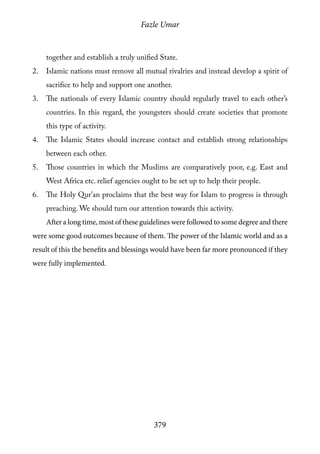
![Fazle Umar
380
Illness and demise
The health of Hadhrat Khalifatul Masih II [ra] entered upon a prolonged
process of slow but progressive decline and the end came on 8 November 1965. His
demise shook the Movement to its foundations. Every member of the Movement was
overwhelmed with grief, the depth and intensity of which were beyond measure. The
shock was bewildering and baffling. It seemed that the vacuum thus created would
be hard, if not impossible, to fill. Everyone, however, realised that the Divine Will was
supreme and no human being was immortal.
The members of the Community converged in large numbers upon Rabwah for
the purpose of seeking comfort and consolation from each other’s company and to
pay their tribute of love and devotion to the sacred memory of the holy one who had
guided the destinies of the Movement for more than half a century and had given freely
of his love, sympathy and support to everyone without discrimination.
The election of Hadhrat Khalifatul Masih III [ra]
The President of the Sadr Anjuman Ahmadiyya, in conformity with the constitu-
tion of the Electoral College, convened a meeting of the College on 8 November for
the purpose of electing the new Khalifa. The interval between the demise of Hadhrat
Khalifatul Masih II [ra] and the meeting of the Electoral College was spent by
everyone in humble and earnest supplication to the Divine, that the members of the
Electoral College may be rightly guided in their choice of the Successor to Hadhrat
Khalifatul Masih II [ra].
The College met in a deeply prayerful mood and Sahibzada Mirza Nasir Ahmad
sahib, eldest son of the departed Khalifatul Masih, who had been Principal of the
Ta’limul Islam College for 21 years, was elected Khalifatul Masih III by an overwhelm-](https://image.slidesharecdn.com/fazl-e-umar-160102120102/85/Fazl-e-Umar-386-320.jpg)
![Fazle Umar
381
ing majority of the Electoral College. As soon as the choice of the 206 members of the
Electoral College became known it was universally felt as if comfort and consolation
were descending upon every heart from heaven.
Hadhrat Mirza Nasir Ahmad [rh] then spoke to the Jama’at and took the
pledge of allegiance of all those present, which numbered approximately five thousand
members, at ten thirty in the evening.
The funeral prayers over the beloved departed, led by the newly elected Khalifa,
and his burial later on the same day were a deeply moving experience for everyone,
which was born of conflicting emotions: of grief and bereavement on the one hand
and steadfast submission to the Divine Will, and a firm resolve to march forward in
earnestness, giving of one’s very best on the other. The bonds of brotherhood were felt
to be gaining in strength, and the urge towards greater uprightness and righteousness
in every sphere appeared to be the prevailing mood.
Acknowledgment of the Services of Hadhrat
Musleh Mau’ood [ra] upon his Demise
Hadhrat Musleh Mau’ood [ra] was a source of mercy and blessings for his fol-
lowers as well as non-believers and the wise and learned in the world were aware of
his status and value. Therefore at his demise not only the press and non-believers in
his own country but people from all over the world acknowledged his services and
mourned his death.
At the news of his passing away, the President of Pakistan, Field Marshal Moham-
mad Ayub Khan, sent the following condolence telegram:](https://image.slidesharecdn.com/fazl-e-umar-160102120102/85/Fazl-e-Umar-387-320.jpg)
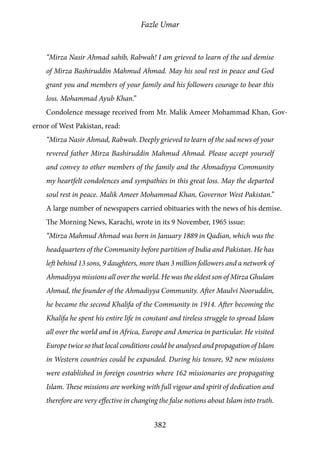
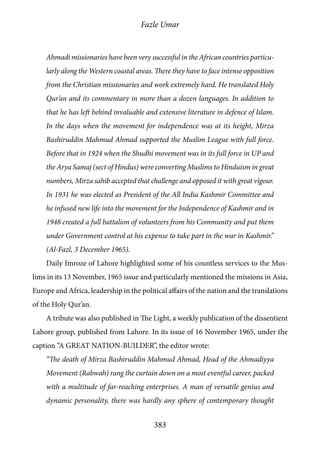
![Fazle Umar
384
and life during the past half century, from religious scholarship to missionary
organisation, even political leadership, on which the deceased did not leave a
deep imprint. A whole network of Islamic missions and mosques scattered over
the world, the deep penetration of Islamic preaching in Africa, transplanting the
long-entrenched Christian Missions, are a standing monument to the imagina-
tive planning, organisational capacity and unflagging drive of the deceased.
There has hardly been a leader of men in recent times who commanded such
deep devotion from his followers, not only when alive, but also after death,
when sixty thousand people rushed from all parts of the country to pay their
last homage to their departed leader. In the story of the Ahmadiyya Movement
the Mirza Sahib’s name will go down as a Great Nation Builder, who built up a
well-knit Community in the face of heavy odds, making it a force to be counted
with. We offer the bereaved family our deep condolences in their great loss.”
The fulfilment of every aspect of the grand prophecy of the Promised Messiah
[as] set out in the announcement of 20 February 1886, in the person of Hadhrat
Khalifatul Masih II [ra], furnishes irrefutable proof of the truth of the Promised
Messiah [as]. From whatever point of view it is approached, the impossibility of
the prophecy having been the product of the workings of a human mind becomes
patent. The prophecy is studded with innumerable contingencies the non-fulfilment
of a single one of which would have demonstrated its falsehood, had it been an impos-
ture. The fulfilment of the whole cluster of the grand predictions comprised in the
prophecy leaves no room for a shadow of doubt that the prophecy was made under
Divine direction and its fulfilment firmly establishes the existence of God, the truth
of the Holy Prophet of Islam, the divine origin of the Holy Qur’an, the truth of the
Promised Messiah [as] and the righteousness of Hadhrat Khalifatul Masih II [ra],
and that he was the Divinely appointed Successor of the Promised Messiah [as]. His](https://image.slidesharecdn.com/fazl-e-umar-160102120102/85/Fazl-e-Umar-390-320.jpg)
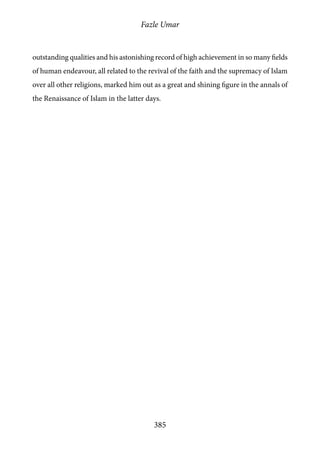
![Fazle Umar
386
Endnotes
1 ‘New World Order of Islam’ by Hadhrat Musleh Mau’ood [ra], about the
author.
2 Ahmadiyya Bulletin, UK, Feb/March 2005, pg. 19,20. Introduction based
on ‘Hadhrat Musleh Mau’ood’, speech by Mohammad Azeem Akseer sahib,
MTA Studios, Pakistan
3 Seerat Masih-e-Mau’ood by Hadhrat Maulvi Abdul Karim, pg.30–31.
4 Seerat Masih-e-Mau’ood by Hadhrat Maulvi Abdul Karim, pg.12–13.
5 Al-Fazl 1 April 1958 pg.3.
6 Al-Fazl 18th June 1925 pg.7.
7 ‘A Life Sketch of the Promised Messiah’ by Amatul-Hadi Ahmad, Review of
Religions, December 1996, pg.23.
8 Tareekh Ahmadiyyat Vol. 5 pg.21.
9 A Character Sketch of the Promised Messiah [as] by Hadhrat Maulvi Abdul
Karim, ed. 1924.
10 Ahmad the Guided One, Iain Adamson, pg. 241–242.
11 Seerat Masih Mau’ood, pg.342.
12 Seerat Masih Mau’ood, pg.342.
13 Quotations from ‘Al-Hilal (USA), 2003, Issue 1, Story of My Tā’ī, pg.28.
14 Seerat Ummul Momineenra Muz’affa Sheikh Mahmud Ahmad sahib Arfani,
Part 1, pg.394-395.
15 Al-Fazl, Lahore, 18 February 1947.
16 Al-Fazl, Qadian 11 March 1939.
17 Al-Fazl, 23 August 1914, pg.5.
18 Al-Fazl, 6 June 1924, pg.8.](https://image.slidesharecdn.com/fazl-e-umar-160102120102/85/Fazl-e-Umar-392-320.jpg)
![Fazle Umar
387
19 Al-Hakam, Jubilee Number, December 1939, translation from ‘Fazl-e-Omar’
by A.Q.Niaz, pg.41-43.
20 Sawaneh Fazl-e-Omar Vol I pg.306-308
21 Mahmud Ke Amin, Translation from ‘Basic knowledge about Islam, Ques-
tions-Answers, B.A. Hayat, pg. 55-56.
22 Seeratul Mahdi by Hadhrat Mirza Bashir Ahmad, Vol.3, pg.112.
23 Speech of Hadhrat Musleh Mau’ood [ra], Jalsa Salana 1944, pg.77-84.
24 Al Fazl, 3 November 1954.
25 Tafseer Kabeer, Vol. 3, pg.834.
26 Al Fazl, 3 July 1922.
27 Al-Fazl, 13 Dec. 1920.
28 Al-Fazl, 3 Dec. 1938.
29 Al-Fazl, 3 Dec. 1938.
30 Al-Fazl, 5 November 1938.
31 Al-Fazl, 20 January 1928.
32 Al-Fazl, 26 February 1931 pg.9.
33 Al-Fazl, 5th October 1928.
34 Tafseer Kabeer, Surah Kauser, pg.476-477.
35 Al-Hakam, Jubilee Number, December 1939.
36 Al-Fazl, 30 July 1941.
37 Ahmadiyyat the Renaissance of Islam pg.212-214.
38 Al-Hakam, July 1939.
39 Al-Fazl, Qadian, 4 April 1925.
40 Manuscript narration Hadhrat Hakeem Deen Mohammad sahib, Darul
Rehmat wasti, Rabwah.
41 Ahmad the Guided One, Iain Adamson, pg.243.](https://image.slidesharecdn.com/fazl-e-umar-160102120102/85/Fazl-e-Umar-393-320.jpg)
![Fazle Umar
388
42 Al-Fazl Lahore, 18 February 1948.
43 Al-Fazl, 4 March 1927.
44 Incidents narrated by Mirza Ahmad Beg, Sahiwal.
45 Al-Hakam, 22 March 1908.
46 Tareekh Ahmadiyyat, Vol. 3 pg.231.
47 Al-Hakam, 10 October 1902.
48 Al-Fazl, 4 July 1924.
49 Maqtoobaat Ahmad, Vol. 5 pg.318.
50 Tehrike Ahmadiyyat, Vol. 3 pg. 479, Vol. 5 pg. 74.
51 Badr Qadian, 18 November 1909, Tehrike Ahmadiyyat, Vol. 3 pg.320.
52 Al-Hakam, Jubilee Number, December 1939, pg. 66.
53 Al-Fazl, 25 January 1940.
54 Al-Fazl, 16 February 1965.
55 Al-Fazl, 16 February 1968.
56 Account of Hadhrat Mirza Ahmad Beg sahib.
57 Al-Fazl, 22 January 1920.
58 Al-Fazl, 16 February 1965.
59 Tadhkirah, the dreams, visions and verbal revelations vouchsafed to the
Promised Messiah [as] pg.756.
60 Kalaam-e-Mahmud.
61 ‘Taqdir Ilahi’, speech by Hadhrat Musleh Mau’ood, Jalsa Salana, 1919
pg.189,190.
62 Ahmad the guided one, pg.313.
63 Tazkirah, 3rd Edition, pg.356.
64 Al-Fazl 19th January 1962, related by Hadhrat Nawab Mubaraka Begum
sahiba.](https://image.slidesharecdn.com/fazl-e-umar-160102120102/85/Fazl-e-Umar-394-320.jpg)
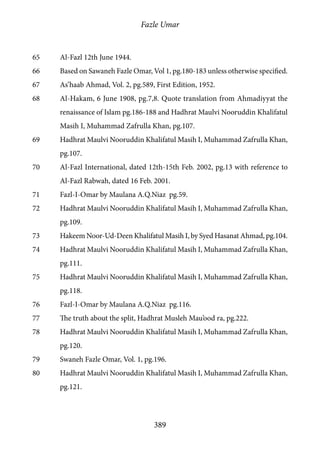
![Fazle Umar
390
81 Hadhrat Maulvi Nooruddin Khalifatul Masih 1, Muhammad Zafrulla Khan,
pg.122-123.
82 Ahmadiyyat, the renaissance of Islam, Muhammad Zafrulla Khan, pg. 200.
83 Ahmadiyyat, the renaissance of Islam, Muhammad Zafrulla Khan, pg.207.
84 Al-Fazl, article on Ansarullah by Hadhrat Mian Mahmud sahib, 23 July 1913).
85 Al-Fazl, 30 July 1913.
86 The truth about the split (online document) by Hadhrat Musleh Mau’ood
[ra].
87 Hakeem Noor-Ud-Deen Khalifatul Masih I, by Syed Hasanat Ahmad, pg.135,
136.
88 Al-Fazl, 4 July 1924, Memories of days gone by, Hadhrat Musleh Mau’ood.
89 The Al-Fazl, 8 April 1914.
90 Hadhrat Maulvi Nooruddin Khalifatul Masih I, Muhammad Zafrulla Khan,
pg.177.
91 The Truth about the Split by Hadhrat Musleh Mau’ood [ra], 4th Edition,
pg. 298.
92 Sawaneh Fazle Umar, Vol. 1, pg.237-238.
93 Hadhrat Maulvi Nooruddin Khalifatul Masih I, Muhammad Zafrulla Khan,
pg.131.
94 Sawaneh Fazle Omar, Vol. 1,pg.241-243.
95 Hadhrat Maulvi Nooruddin Khalifatul Masih I, Muhammad Zafrulla Khan,
pg.203-208.
96 The agony of Pakistan, Muhammad Zafrulla Khan pg.1.
97 Akhbar Alhakam: 10 January, 1908.
98 Paigham-i-Sulha: pages 28-29.
99 Badr, 5 October 1911.](https://image.slidesharecdn.com/fazl-e-umar-160102120102/85/Fazl-e-Umar-396-320.jpg)
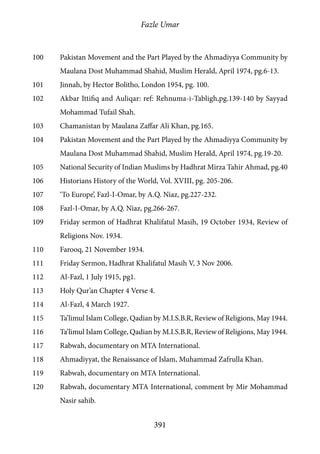
![Fazle Umar
392
121 Rabwah, documentary MTA International.
122 Ahmadiyyat, the Renaissance of Islam, Muhammad Zafrulla Khan.
123 Rabwah, documentary MTA International.
124 Sawaneh Fazl Umar, Vol 2, pg. 256-259.
125 Al-Fazl International, 14-20th March 2003, explanation of the term ‘mother
of the book’ by Hadhrat Mirza Tahir Ahmad.
126 Tafseer Kabeer, Vol. 6, pg. 483.
127 Ek Khofnak Saazish, by Moulvi Mazher Ali Azhar, pg. 196.
128 Sidq-e-Jadid Lucknow, Vol. 51, Nov. 18th 1965.
129 Tehrik-e-Jadid and Foreign Missions.
130 Friday Sermon, Hadhrat Khalifatul Masih V [atba], 9 Jan 2009.](https://image.slidesharecdn.com/fazl-e-umar-160102120102/85/Fazl-e-Umar-398-320.jpg)
![393
Glossary of Important Terms
For the benefit of our readers, some important Islamic terms are explained below.
Allah: Allah is the personal name of God in Islam. To show proper reverence to Him,
the Muslims often add “Ta‘āla,” “the Most High,” when saying His holy name.
Ahmadiyya Muslim Jama’at (also referred to as the “Movement” or “Community”):
The Community of Muslims who have accepted all the claims of Hadhrat Mirza
Ghulam Ahmad [as] of Qadian as the Promised Messiah and Mahdi. The Commu-
nity was established by the Promised Messiah [as] and is now under the leadership
of his fifth khalifa, Hadhrat Mirza Masroor Ahmad [atba]. The Community is
also known as Jama’at-e-Ahmadiyya.
Ahmadiyya Anjuman-e-Isha’ate-Islam: A group of Ahmadi Muslims who, during the
time of the Promised Messiah [as] accepted all the claims of the Promised Messiah
[as] including that of being an Ummati Nabi — a Prophet subordinate to the Holy
Prophet [saw] and within his ummah. They also took a pledge of allegiance at the
hand of the first khalifa of the Promised Messiah [as], Hadhrat Maulvi Nooruddin
[ra], but did not accept the khulafa who followed him. Ahmadiyya Anjuman-e-
Isha’at-e-Islam is also known as Lahore Group of the Ahmadiyya Muslim Community,
and Ahl-e-Paigham.
Amir: Leader.
Ansarullah: the Helpers of God, organisation for male members of the Community
over the age of forty years.
Atfalul Ahmadiyya: Children of Ahmadiyyat, organisation of boys under the age of 15.](https://image.slidesharecdn.com/fazl-e-umar-160102120102/85/Fazl-e-Umar-399-320.jpg)
![394
Bai’at: Pledge of allegiance.
Bahishti Maqbara: Heavenly Graveyard.
Bukhari: The most authentic book of Ahadith.
Darsul Qur’an (Darse): Exegesis (explaining the text) of the Qur’an.
Dervesh: A down-to-earth person, a person looking after the holy places.
Eid-ul-Adha: The festival of sacrifices.
Fatwa: A legal opinion or ruling issued by an Islamic scholar.
Hadith: A Saying of the Holy Prophet Muhammad [saw]. The plural is “ahadith.”
Hafiz: A person who has memorised the entire text of the Holy Qur’an.
Hajji: A person who has performed the pilgrimage of Kaaba in Mecca.
Hakeem: A philosopher or a practitioner in natural medicine.
Hadhrat: A term of respect used for a person of established righteousness and piety.
HolyProphet[saw]: A term used exclusively for Hadhrat Muhammad, the Founder
of Islam (may peace and blessings of Allah be upon him).
Holy Qur’an: The Book sent by Allah for the guidance of humanity. It was revealed
to the Holy Prophet [saw], over a period of twenty-three years.
Huzur: Your Holiness; His Holiness
Imam: The Arabic word “Imam’ means a leader.](https://image.slidesharecdn.com/fazl-e-umar-160102120102/85/Fazl-e-Umar-400-320.jpg)
![395
Istikhara: Seeking guidance from God in a matter, by making niyya (intention) and
reciting a specific prayer after Isha prayer in late evening.
Istighfar: Seeking forgiveness from Allah.
Jalsa Salana: Annual Gathering
Jihad: Literally meaning ‘to strive.’
Jama’at: The Arabic word “Jama’at” means a community. In this book the word “Jama’at”
specifically refers to the Ahmadiyya Muslim Jama’at.
Jamia: University, a theological seminary or training college for missionaries.
Kaaba: The cube shaped, sacred shrine of Islam at Mecca.
Khalifa: Caliph is derived from the Arabic word “khalifa,” which means successor. In
Islamic terminology, the word righteous “khalifa” is applied to any of the four Khu-
lafa who continued the mission of Hadhrat Muhammad [saw], the Holy Prophet
of Islam. Ahmadi Muslims refer to a successor of the Promised Messiah [as] as
Khalifatul Masih. Khulafa is the plural of Khalifa. Khalifatul Masih I: Hadhrat Hajji
Hakeem Maulvi Nooruddin [ra], the first successor to the Promised Messiah [as].
Khalifatul Masih II: Hadhrat Mirza Bashiruddin Mahmud Ahmad [ra] the second
successor to the Promised Messiah [as]. As well as Hadhrat Musleh Mau’ood and
Hadhrat Khalifatul Masih II, Hadhrat Mirza Bashiruddin Mahmud Ahmad [ra] is
referred to as Hadhrat Sahibzada Sahib, Mian Sahib or Mian Mahmud sahib in this
biography.
Khuddamul Ahmadiyya: the Servants of Ahmadiyyat, organisation of young men](https://image.slidesharecdn.com/fazl-e-umar-160102120102/85/Fazl-e-Umar-401-320.jpg)
![396
between the ages of fifteen and forty years.
Khataman-Nabiyyin: Seal of the Prophets, a title bestowed upon the Holy Prophet
[saw] in the Holy Qur’an. The noun form of the concept is called Khatm-e-
Nubuwwat.
Khilafat: The institution of Successorship in Islam.
Khilafat-e-Ahmadiyya: Khilafat established in the Ahmadiyya Muslim Jama’at after
the demise of the Promised Messiah [as].
Khilafat-e-Rashida: Khilafat established in Islam after the demise of the Holy Prophet,
Hadhrat Muhammad [saw].
Lajna Imaillah: Association of the Handmaidens of God, a ladies organisation for
women over fifteen years.
Mahdi: The literal translation of this word is “the guided one”. This is the title given
by the Holy Prophet [saw] to the awaited Reformer of the Latter Days.
Madrassa: School.
Mujaddid: Reformer.
Mujahid (pl.Mujahedeen): One who strives in the way of Allah.
Majlis: Association, organisation.
Moosi: participant in the Wasiyyat scheme (pl. Moosian).
Musleh Mau’ood: Hadhrat Mirza Bashiruddin Mahmud Ahmad [ra] is also called](https://image.slidesharecdn.com/fazl-e-umar-160102120102/85/Fazl-e-Umar-402-320.jpg)
![397
Musleh Mau’ood (the Promised Reformer) because he was born in 1886 in accordance
with the prophecy of the Promised Messiah [as] regarding the birth of a righteous
son who would be endowed with special abilities, attributes, and powers.
Mu’allam: (pl. Mu’allumeen) Religious teachers, tutors.
Muslim Hadith: The second most authentic book of Ahadith.
Mufti: Muslim cleric
Nikah: To perform matrimonial rites, i.e. religious procedure for marriage, public
declaration of getting married.
Nasiratul Ahmadiyya: Female Helpers of God, organisation comprising all female
children between the ages of seven and fifteen years.
Nazim: Manager
Nazir Aa’la: Chief Secretary.
Promised Messiah: The Founder of the Ahmadiyya Muslim Jama’at, Hadhrat Mirza
Ghulam Ahmad [as] of Qadian. He claimed that he had been sent by Allah in accor-
dance with the prophecies of the Holy Prophet [saw] about the coming of a Mahdi
and Messiah from among the Muslims.
Qibla: The House of God in Mecca towards which Muslims face while offering Prayers.
Rasul: Messenger [of God]. The noun form is “Risalat”, indicating Messengership.
Rukhstana: A reception given at the time of setting out of a girl as bride.](https://image.slidesharecdn.com/fazl-e-umar-160102120102/85/Fazl-e-Umar-403-320.jpg)
![398
Ruku of Holy Qur’an: Each Part of the Holy Qur’an is split into Rukus. Each Ruku
comprises of several verses.
Sadr Anjuman Ahmadiyya: An institution established by the Promised Messiah [as]
to run administrative matters of the Ahmadiyya Muslim Jama’at.
Sahib: Mr. or Esquire, implying respect.
Sahibzada: Son of a respectable person.
Salat: Islamic prayer service comprising the five obligatory daily prayers.
Shariah (Shari’at): Religious law.
Surah: Chapter of the Holy Qur’an.
Ta’lim: Education.
Ulema: Scholar
Ummah: Followers.
Waqfe Zindagi: A person who has devoted his life to the cause of Ahmadiyyat.
Wasiyyat: Testamentary Direction; Will](https://image.slidesharecdn.com/fazl-e-umar-160102120102/85/Fazl-e-Umar-404-320.jpg)

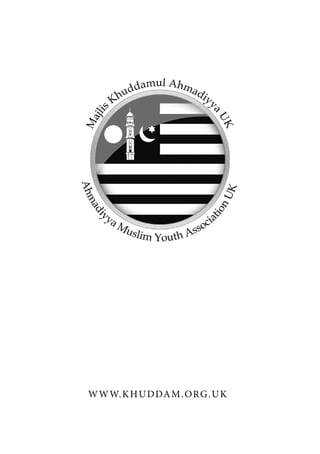

![“Who can say on his own that a son would surely be bestowed upon him,
who can say that such a son would live and grow up, who can say that he
would become the leader of a Community, who can say that he would
become known unto the ends of the earth? Most certainly no one can say
these things on his own… In short, the fresh evidence of the support of God
Almighty has proved once more that this Movement has been established by
God and enjoys His help and support. Today the prophecy made through
the Promised Messiah 59 years ago, ‘I shall bestow upon thee a son who will
be a sign of My mercy and of My power, of My grace and My beneficence,
and through him the message of Islam and Ahmadiyyat will be carried to
the ends of the earth’, has been fulfilled with great glory. Today, hundreds
of countries bear witness that the name of Islam reached them during the
period of my Khilafat and it was during the period of my Khilafat that they
heard the name of Ahmadiyyat.”
Hadhrat Mirza Bashiruddin Mahmud Ahmad [ra]
Khalifatul Masih II
12th March 1944
www.khuddam.org.uk 9 780855 259952
ISBN 978-0-85525-995-2](https://image.slidesharecdn.com/fazl-e-umar-160102120102/85/Fazl-e-Umar-408-320.jpg)